- Work with us
- Privacy Policy
- Meet the Team

PLANNING A TRIP TO GREECE
Planning a trip to greece.
Planning a trip to Greece can be both incredibly exciting and completely overwhelming. We’ve done it multiple times and yet each year presents new challenges as we flesh out the best Greece itinerary to include new places to discover and old favourites.
Most people want to include Greek Island hopping but what about Athens and the rest of the mainland? How do get there and then get around? Where are the best places to stay and what are the ideal places to see in Greece? Are there Visa requirements? What about Insurance? How far out should I book? What will the weather be like? What to pack!?
These are just some of the questions you will ask yourself when planning a trip to Greece and here is our planning guide to help you!
Disclaimer: This post contains affiliate advertising links. This means that if you click through any of the links on this page and decide to make a booking I get a small commission, at no extra no cost to you. This helps fund the running costs of this site.
For heaps of great planning tips and advice make sure you join our Facebook Group too!

Basic Facts about Greece
It consists of 132,000 sq kilometres of land including 227 inhabited islands. The population is just under 11 million people.
The religion is East Orthodoxy ( Christian) , they drive on the right hand side of the road and the calling code is +30.

Passports and Visas
Greece is a member of the European Union and as such all residents of the 26 countries that have signed the Schenghen Agreement do not require a visa.
Other countries such as Singapore, Australia and the USA also do not require one but several countries do. Check the official Government website to be sure.
In 2025 the EU is expected to introduce the requirement for many visitors to complete an ETIAS. Applications are not yet being accepted so keep an eye on the official website .

When is the best time to visit Greece?
We believe there is never a bad time to visit Greece but most people will say the ideal time is May, June, September and October, when the weather is great and it is shoulder season for tourists.
Peak season is July and August and Easter. Orthodox Easter runs for a full week and is the most important holiday of the year. It’s an incredible time to visit with many celebrations across the nation.
More information on this is available here .

How to get to Greece
It is also common for visitors to arrive by sea on both cruise ships and private yachts and charters as well as by train, road and even on foot!

What are the best places in Greece to see
Greece has many incredible destinations and is considered home to some of the most beautiful and interesting sites in the world. There are 18 UNESCO World Heritage Sites with another 16 under consideration.
Most people want to see the Greek Islands and particularly the much-photographed islands of Santorini and Mykonos in the Cyclades Group of islands.There are actually several island groups – the Cyclades , the Dodacannese , the Saronic islands , the Sporades Islands , the Northern Aegean islands and Crete so island hopping in the Greek Islands is popular but does require some research.
Some islands are very romantic and are great for couples whilst others are great for families and many are perfect for solo travellers . Some islands are notorious Party Islands while there are many beautiful lesser-known islands in Greece that really deserve more attention.
There are also some incredible things to see on the mainland including Athens – ancient sites like Delphi and Ancient Olympia as well as places of considerable natural beauty and wonder such as Meteora and Mt Athos . The Peloponnese peninsula is becoming more popular and is thought by many to be the ‘real Greece’.
It is easy to organise your own visit to Greece, using the various tips, links and articles on this website. Some people prefer to have it all organised for them and join tours and that’s fine too.

How many days in Greece do you need?
The fifty million dollar question. Many people will probably say the best length of time to spend in Greece is 3 months, or even FOREVER, but of course that is not viable for most visitors.
We have a number of suggested itineraries for Greece but as a general rule of thumb would say you need the following minimums ;
- Greece – 4 days. And you will likely only see Athens and a day trip somewhere else.
- Greek Islands – 5 days, which will give you 2 islands.
- Athens and islands – 7 days
- Crete – 7 days.
Ideal minimum – 2 weeks. Perfect duration 4-6 weeks ( or forever).

Itineraries for Greece
One of the biggest challenges most people face when planning a trip to Greece is landing on the best itinerary. One that maxismises their time, caters to their interests and stays within their budget.
Many first timers will do the Greek Golden Triangle of Athens-Santorini-Mykonos although some may also venture on to popular spots like Crete , Rhodes and Corfu . Then what? With over 220 populated islands and 131,000 km of area there are so many places to go and things to do you can get TOTALLY overwhelmed.
These are some of the itineraries that we suggest and you can also download our FREE 7 DAY itinerary too!
Greek Island Hopping itineraries
3 days in Athens
7 days in Greece
2 weeks in Greece
10 days in Greece
3 weeks in Greece
3 days in Santorini
Athens, Santorini and Mykonos Itinerary
Our favourite guided tours

Transport in Greece
Transport around the country varies and can be at times woefully inadequate or exceptionally good. Whilst private drivers are not as common nor as affordable as in come countries, they do exist. The train and bus network is not as modern or efficient as those in say, France or Italy but the Ferry network is probably the most extensive and effective, in the world.
In Athens taxis drivers, like many cities, can be a bit hit-and-miss so it pays to have the details of a trusted one. For private transfers, we use and recommended these drivers , and if you use the Promo code “GTS” when you book through this link you will receive a further 10% off!
For other transport options to and from Athens airport, read our article HERE.
The ferry network is the most extensive and efficient in the world. For bookings we use Ferryhopper and we invariably hire a car at each destination even if it’s just for a day or two. Driving in Greece , outside the big cities, is relatively easy, especially on the islands. Be sure to have access to some good maps and do not rely on Google!
In some places, especially Santorini, you will see Donkeys available to ride. We urge you to learn more about that and other transport alternatives on the island too.
To fly between destinations, which is often quicker and cheaper than ferries, we use Aegean/Olympic , although sometimes Skyexpress and even Ryanair will be a good choice. Schedules for ferries, trains and planes are often not available until a few months in advance.
Another popular choice of course is sailing and we have a complete sailing the Greek Island guide to get you started. Cruises are also very popular but be warned the big ships go into ports that can get very crowded, many with over 10,000 passengers a day. Do research on Cruise Critic first to get as much information as possible.

Tours in Greece
There are many tours to and around Greece. Some focus solely on Greece whilst other may combine other countries such as Italy or Turkey . Some last only a few hours in a single destination whilst other can be your entire holiday. Some move at a frenetic pace whilst others embrace a slow approach to exploring Greece. Some appeal to young people on a tight budget whilst others appeal to wealthy retirees – and everything in between.
Our preferred Private Transfer guys also do some great trips from Athens and can meet you at your hotel or at Pireaus port. They can customize tours to suit your interests and can cater for groups in their brand new Mercedes vans.
We’ve also partnered with a couple of large tour companies that we believe represent good value and have solid reputations. Tour Radar offer great tours between 2 days and 6 weeks from a number of providers including Busabout, Contiki, Insight Vacations, and Trafalgar.
Get your Guide are great for doing local activities and day trips, including boat trips and food tours.
For a full list of our recommendations see our Tours in Greece article.

Accommodation in Greece
We try and support businesses in Greece that are family owned and run when booking accommodation in Greece . This isn’t always possible but when we do we generally use Booking.com. They often allow free cancellation and have the largest portfolio in the country with everything from B&Bs to All Inclusive resorts.
Greek hotels are famous worldwide for their hospitality and amenities. Many are small family run properties that have been in families for many generations and are quite different to what you may be used to at home. Tariffs almost always include a generous breakfast and many rooms have small kitchens. Laundry is usually inexpensive and it’s great to have a connection with locals who are available 24/7 to organise anything you need including car hire, restaurant bookings and more.
Sometimes it is more convenient to stay in private Villas and apartments, especially if you are a larger group. We recommend Vrbo/Stayz who have a great range of quality properties across Greece.
There is some very unique accommodation in Greece and it can be very special to stay in a converted windmill, fishing hut, cave house or Ottoman Mansion. Even Glamping tents, farms and boats!

Like anywhere the locals appreciate your efforts to learn a few useful phrases of Greek , even if its just the basics like Hello, thank you and Goodbye.
It is a relatively easy language to learn with many Greek words used in English and other languages today. The difficulty of course is in the delivery.

Greek Culture
Without a doubt one of the main things visitors to Greece enjoy the most is the Greek Culture . There are a number of things that make it really stand out including the world-famous Greek Hospitality but there’s also the unique architecture, food , dancing, music and more.
When you return home for the first time, or even if you have visited countless times, you will probably be looking for ways to stay connected to the culture and even explore it further.
We have a lot of resources including a whole page on the Greek Culture as well as a Recipe page , and an article full of reading suggestions , one with our recommended Greek Playlist and another about movies set in Greece as well.
If you’re a history buff then be sure to check out this article on Greek Mythology and where to see the most amazing archeological sites.

What to pack for a holiday in Greece
.First and foremost you need to pack light. When you’re dragging your bag over narrow cobblestones, up and down ferry gangplanks, and putting it in the back of small rental cars you will be VERY glad of this.
I have a small hardcover Lojel bag which I adore -it’s waterproof and takes a beating. I can usually use it as carryon on the planes but it can also expand if I do some shopping and I can then check it in. It has come in handy as both a table and a chair at times too! There are similar ones on Amazon such as the Hanke and Level8 Grace – both with front opening compartments.
There are some wonderful shops in Greece so if you love shopping you can pack mostly essentials and pick up many things there. As I often say they are the inventors of sandals and togas and their shoes and kaftans to this day are gorgeous. There are a LOT of great things to buy !
Things you will need for much of the year are swimwear, sunscreen, insect repellent,light natural fiber dresses/shorts/shirts/tops, toiletries and shoes. There are lots of steps so you need good walking shoes – flipflops/thongs, reef/surf shoes and a pair of sneakers. I usually buy a hat when I get there and give it away when we leave, the same goes for a cheap towel or two. It also pays to have a reusable shopping bag that can double as a beach bag.
Read more about what to pack for Greece including toiletries and electronics in our complete packing guide for women and there is now one for men too.
You may also want things like hairdryers/styling irons, heels, and an evening clutch but I have found these things rarely get used, if ever. Things are casual in Greece, especially in summer. It’s not unusual to see people swim over to dinner from their boats on the islands!

Money in Greece
The official currency of Greece is the Euro . Do not try and pay in other currencies.
Cash is still very much appreciated and credit card facilities in remote areas may be scarce. Legally you must always be given a receipt including and clearly showing, the local taxes.
Tipping is not expected in Greece as Europe does not have a tipping culture. If, however, you would like to tip for great service it is always appreciated. 10% is a respectable amount.

Don’t leave home without insurance!
It’s important to make sure you are covered, not just for medical expenses ( some people may have cover for this with their health insurance in certain countries) but also for lost baggage, flight and ferry delays and cancellations, theft, and emergencies, including something that happens back home while you are away.
Medical treatment in Greece is very good but facilities sometimes are not, so you want to be sure you are covered for the best care in the best clinics and hospitals.
Also, be sure to read the fine print about things such as ‘adventure sports’ which can include ATV and Scooter hire as well as para-sailing and scuba diving. You can often add these at an extra cost but some policies won’t cover them at all.
If you are from the USA we recommend doing a comparison on Travel Insurance Masters.

Stay connected
WiFi is widely available for free throughout Greece. Almost all cafes and tavernas offer it as do hotels, airports and many popular attractions.
Many travellers either choose to buy cheap local ‘burner phones’ on arrival, local SIM cars or use their home carrier. We have a deal with Vodaphone for $5 in many countries including Greece although even this can end up being expensive on a long trip.
Another option is to get an e-SIM. Airalo is the world’s first eSIM store that solves the pain of high roaming bills by giving travelers access to eSIMs for over 200 countries/regions and visitors can get connected anywhere in the world as soon as they land.
Regardless of which method you use make sure you take note of important contacts and emergency numbers in Greece.
Further reading: Frequently Asked Questions about Greece
(tipping, toilet paper, drivers permits, safety and more)
Start booking your trip now!

BOOK FLIGHTS

BOOK A SAILING TRIP

BOOK TICKETS TO SITES AND MONUMENTS

BOOK A TOUR

BOOK FERRY TICKETS

GET INSURANCE
You may also like
A complete guide to ano syros, day trips from santorini to other islands, day trips from naxos, why you must see the greek wedding show santorini, 7 day itinerary greece, cape sounion from athens & the temple of poseidon, a complete guide to magical mystras greece, how to get to olympia greece and what to see, 37 of the best mainland greece beaches, 3 weeks in greece, the best greek islands for diving and snorkeling in greece.
- 3 Other destinations
- 4.1.1 First civilisations
- 4.1.2 Dark Ages
- 4.1.3 Classical Greece
- 4.1.4 Hellenistic and Roman eras
- 4.1.5 Arrival of Christianity and rise of Byzantine Empire
- 4.1.6 Medieval Greece
- 4.1.7 Ottoman rule
- 4.1.8 Enlightenment and revolution
- 4.1.9 19th to mid-20th century
- 4.1.10 Modern Greece
- 4.2 Climate
- 4.3 Holidays and festivals
- 4.4 Visitor information
- 6.1 Entry requirements
- 6.2 By plane
- 6.3 By train
- 6.6 By boat
- 7.2 By train
- 7.4 By rental car
- 7.5 By boat
- 7.6 By plane
- 7.7 By taxi
- 7.8 By boat
- 8.1 Cultural heritage
- 8.2 Islands
- 8.3 Seaside resorts
- 10.1.1 ATMs
- 10.1.2 Cards
- 10.1.3 Money exchange
- 10.2.1 Arts and crafts
- 10.2.2 Bargaining
- 10.2.3 Business hours
- 10.2.4 Costs
- 10.2.5 Kiosks
- 10.2.6 Markets
- 10.2.7 Tipping
- 10.2.9 In general
- 11.1 Vegan and vegetarian
- 11.2 Popular local dishes
- 11.3 Cover fee
- 11.4 Fast food
- 12.4 Liquor
- 12.5 Coffee
- 12.6 Iced tea
- 14.1 Modern Greek courses
- 16.1 Crime and theft
- 16.3 Photography restrictions
- 16.4 Antiquities
- 16.6 Traffic
- 18.1 Health care
- 18.2 Sexually transmitted infections
- 18.3 Natural dangers
- 19.1 Social etiquette and breaches
- 19.2 Sensitive issues
- 19.3 Religion
- 19.4 Obscene gestures
- 19.5 Smoking
- 20.1.1 Mobile internet
- 20.1.2 Calling
- 20.2 Internet
Greece ( Greek : Ελλάς , Hellas or Ελλάδα , Ellada ) is a country with a captivating history and culture that has influenced the world for thousands of years.
Ancient Greece , home to one of Europe's first urban civilizations, was the origin of Western culture. Travelers from all over the world visit Greece to view its rich cultural past and magnificent natural settings, which include majestic mountains and beaches.
Greece offers everything, whether you're a history buff, a sun seeker, or just searching for an amazing trip.
Regions [ edit ]
Greece is both a mountainous and coastal country, with countless islands spread over the Ionian and Aegean seas.
Cities [ edit ]

Major cities include:
- 37.983972 23.727806 1 Athens (Αθήνα, Athína ) — the capital and largest city, known for the Parthenon
- 35.516667 24.016667 2 Chania (Χανιά) — surrounded by beaches and the Samaria National Park
- 35.316667 25.39 3 Chersonissos (Χερσόνησος) — party capital of Crete in the summer
- 35.333333 25.133333 4 Heraklion (Ηράκλειο, Irákleio ) — Crete's largest city and main hub with the archaeological site of Knossos
- 40.941 24.403 5 Kavala (Καβάλα) — romantic port city in East Macedonia with many sights and ferry port to the North Aegean Islands.
- 38.25 21.733333 6 Patras (Πάτρα) — third largest city in Greece, known for its wine production
- 36.433333 28.216667 7 Rhodes (Ρόδος, Ródos ) — impressive medieval structures, nightlife and beaches
- 40.65 22.9 8 Thessaloniki (Θεσσαλονίκη) — second largest city, the main city in the central Macedonia region
- 39.366667 22.933333 9 Volos (Βόλος) — coastal port with nice museums and architecture
Other destinations [ edit ]
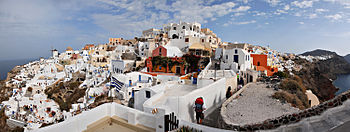
- 35.309722 24.893333 1 Crete (Κρήτη) — the largest island in Greece
- 39.583333 19.866667 2 Corfu (Κέρκυρα, Kérkyra ) — large island with many attractions
- 38.4823 22.5013 3 Delphi (Δελφοί) — site of the famous oracle of Apollo, major archaeological site
- 39.714167 21.631111 4 Meteora (Μετέωρα) — hilltop monasteries
- 40.157222 24.326389 5 Mount Athos (Άθως, Áthos ) — semi-independent republic, home to many Orthodox monasteries (access restricted)
- 37.45 25.35 6 Mykonos (Μύκονος) — world famous, sophisticated holidays
- 37.638 21.63 7 Olympia (Ὀλυμπία) — sanctuary dedicated to Zeus, site of the ancient Olympics
- 36.166667 28 8 Rhodes (Ρόδος, Ródos ) — island with ancient monuments, as well as beaches
- 36.416667 25.433333 9 Santorini (Σαντορίνη or Θήρα, Thira ) — a volcanic island known for its beautiful views, towns and sunsets
See also the UNESCO World Heritage sites in Greece
Understand [ edit ]
Visitors are drawn to the country's beaches and reliable sunny summer weather, its nightlife, historical sites and natural beauty. In 2018, Greece received 33 million visitors, more than three visitors for each of the country's residents.

The majority of visitors come to Greece from other European countries, although tourists from other world regions have been increasing in number. The vast majority of visitors visit from April through to October. Peak season is between May and September when approximately 75% of all tourists arrive. Most of the tourists and tourism industry are concentrated in Crete , the Dodecanese , Cyclades , and Western Greek Islands , and to a lesser extent the Peloponnese and the Halkidiki peninsula in Macedonia . There are still many rewarding areas in the country free of large-scale tourism.
Many first-time visitors arrive in Greece with specific images in mind and are surprised to discover a country with such regional and architectural diversity. The famous whitewashed homes and charming blue-domed churches only characterise a specific region of the country (the Cyclades Islands). Architecture varies greatly from one region to the next depending on the local history. Visitors will find Neoclassical architecture in the cities of Ermoupolis and Nafplion , Ottoman-influenced buildings in Grevená and Kozáni, whitewashed Cycladic homes on the island of Paros , and pastel-coloured baroque homes and churches on Corfu . The nation's terrain is just as varied as its architectural heritage: idyllic beaches, towering mountain ranges, wine-producing valleys, vast stretches of olive orchards in the south, and lush forests in the north. Greece's historical sights are just as varied; the country is littered with just as many medieval churches and castles as classical ruins and temples.
It borders Albania , North Macedonia , Bulgaria , and Turkey .
History [ edit ]
Greece boasts a very long history, with the Greek language being spoken in the country and throughout the Mediterranean region for nearly 4000 years.
First civilisations [ edit ]
The country's first inhabitants are now referred to as the Pelasgians. Little is known about them, but it is believed that they were a primitive people. The first advanced civilisations in Greece are known as the Cycladic in the Cyclades Islands , and the Minoan in Crete and Santorini . The Minoans had a written language which remains undecipherable to archaeologists, which is one of the most interesting and profound historical mysteries.
Dark Ages [ edit ]
Greek-speaking Indo-European peoples arrived in the country from somewhere to the north, around 1700 BC, and slowly invaded the entire country from the north all the way to Crete , as well as the west coast of Asia Minor (now Turkey ), absorbing the native peoples. Their arrival may have been responsible for ending the Cycladic and Minoan civilisations and brought the country into what is now referred to as the Dark Age of ancient Greece; although it is now understood among historians that civilisation in Greece remained sophisticated and advanced during this time. The first Greek-speaking civilisation, Mycenean, was centred in the Peloponnese region. As they do today, many ancient Greeks made a living from the sea. They were accomplished fishers, sailors and traders and the sea has profoundly shaped Greek culture.

Classical Greece [ edit ]
The rise of the Greek city-states occurred in the period 1200 to 800 BC and heralded the Golden Age of Greece, which lasted many centuries and spurred several scientific, architectural, political, economic, artistic, and literary achievements. Athens , Sparta , Corinth , and Thebes were the most prominent of the city-states (with Athens being the most prestigious), but there were several other advanced city-states and colonies that had developed across the Aegean basin. Greek settlements were also established in southern Italy and other coastal areas of the Mediterranean colonised by Greeks. The legacy of Greek Civilisation from this time period made a major impact on the world and continues to influence us to this day with the development of democracy, philosophy and theatre.
Hellenistic and Roman eras [ edit ]
The epicentre of Greek Civilisation shifted, during the 4th century BC, from southern Greece to northern Greece. The northern Macedonian kingdom, under Alexander the Great , conquered all of Greece, and proceeded eastward, conquering all the way to South Asia with the intent of expanding the Greek empire. The empire broke up after Alexander's death, and Greece was eventually annexed by the growing Roman Empire . Although weakened politically, Greek culture continued to flourish under Roman rule and indeed heavily influenced Roman culture.
Arrival of Christianity and rise of Byzantine Empire [ edit ]
Christianity arrived in Greece with the preachings of St. Paul during the 1st century AD, and eventually spread throughout Greece and the Roman Empire. In the 4th century, Roman Emperor Constantine the Great legalised Christian worship and declared it the state religion of the empire. He moved the capital of the empire from Rome to Byzantium (present-day Istanbul), which he renamed Constantinople. Internal divisions eventually divided the Roman Empire into a western half (the West Roman Empire) and an eastern half (East Roman Empire.) The West was eventually invaded and sacked by invaders from northern Europe, while the East survived for another millennium as the Byzantine Empire with Constantinople as its capital.
Medieval Greece [ edit ]
Greece's medieval history is dominated by the Byzantine Empire which revolved around Christianity, Greek Language and Roman law. It was a powerful force in the Mediterranean basin for centuries, engaging in trade, politics, and the spread of Christianity. The empire collaborated with Rome during the Crusades against the Muslims. However, during the 13th century, the Crusaders turned on the Byzantine Empire itself and sacked Constantinople. With a weakened Byzantine Empire, Frankish and Latin invaders arrived and occupied various parts of Greece. Over the following centuries, the Byzantine Empire began to regain strength and reconquer lost territory, but received a final blow in the 15th century when a growing Ottoman Turkish Empire to the east captured Constantinople.
Ottoman rule [ edit ]
With the capture of Constantinople, Greece fell under Ottoman Turkish rule , but vigorously retained its Greek-speaking Christian culture. However, many Greeks fled the country, establishing Greek communities elsewhere in Europe; these communities would later influence the Greek Revolution.
Enlightenment and revolution [ edit ]
The Italian city-states of Genoa and Venice competed with the Ottoman Turks for control of various areas of Greece and managed to conquer various islands and coastal areas, bringing pan-European movements such as the Renaissance (and later the Enlightenment) to places in Greece such as Crete, Corfu, and parts of the Peloponnese region. In the 18th century, the Enlightenment, both in Venetian/Genoese-occupied areas of Greece and from Greek communities abroad, led to an awakening among prominent Greeks and gave birth to the goal of an independent, unified, and sovereign Greek state. The Greek Revolution finally broke out on the 25th of March, 1821, and led to a long war against the Ottomans for independence. The Greek Revolution gained attention across Europe, with Russia , Britain , and France sending military aid to assist Greece.
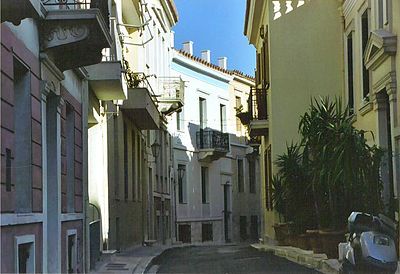
19th to mid-20th century [ edit ]
The nation finally achieved its independence from the Ottoman Empire in 1829. The newly-independent Greek State was briefly a republic, before becoming a monarchy at the will of major European powers. During the second half of the 19th century and the first half of the 20th century, Greece gradually annexed neighbouring islands and territories with Greek-speaking populations. The country sided with the allies during World War I . Despite declaring neutrality during World War II , the country was invaded by Mussolini's forces on 28 October 1940. Greek forces victoriously pushed the Italians out of Greece, but the Germans then came to their aid, occupying the country until its liberation toward the end of the war. Civil war broke out in 1946 between communist rebels and royalists, the former supported by Yugoslavia (until the Tito-Stalin rift of 1948) and the latter by the West. The communist rebels were defeated by the royalists in 1949. The second world war and the civil war that followed had left the country war-torn, forcing many people to flee the country in search of a better life abroad.
Greece joined NATO in 1952; rapid economic growth and social change followed. A right-wing military dictatorship staged a coup in 1967, disbanding all political parties, suspending political liberties and forcing many prominent Greeks into exile, including Communists, who played an active part in the Greek Parliament before and after the junta. King Constantine II and his family also fled the country. Democracy returned in 1974, and a national referendum abolished the monarchy, creating a parliamentary republic.
Modern Greece [ edit ]
Greece joined the European Community in 1981, which later became the European Union (EU) in 1992. The country's tourism industry – which had begun to take off during the 1960s – began to flourish, bringing 5 million annual visitors to the country in 1980 (a figure that eventually grew to over 17 million by 2007). The country suffered serious economic stagnation in the 1980s, but began to experience remarkable economic growth in the 1990s, fuelled by heavy investment, entrepreneurship, trade, and EU aid.
By the early 21st century, Greece had seemingly achieved stability and prosperity, with a high standard of living. An influx of immigrants began in the late 1980s, transforming Greece, once an immigrant-sender, into an immigrant-receiving country. Foreign-born residents, most of them undocumented and coming from various parts of the world (Eastern and Central Europe, Middle East, South and Southeast Asia, and Africa) are estimated to number at least 1 million, or equivalent to 10% of the population. In 2004, the nation stepped into the global spotlight as it successfully hosted the Summer Olympic Games in Athens, to the defiance of critics. Greece however, has borne the brunt of the late-2000s recession and related 2010 European sovereign debt crisis.
The main issues facing Greek society are a high and growing level of bureaucratic corruption, high unemployment, sluggish economic growth and widespread poverty. As a by-product of the ongoing economic depression, there has also been a rise in extremism. Particularly worrying is the rise in support for Golden Dawn, a violently xenophobic opposition party that has often been described as neo-Nazi, some of whose members of Parliament have been arrested for beating foreigners in the street, and which has reportedly gained a considerable degree of control over some Greek police forces. This is unlikely to affect most travellers, but if you could be mistaken for a refugee or illegal migrant to Greece, think twice about whether now is the right time to visit (also refer to § Stay safe ). As of 2020, this party has been declared a criminal organization, and has ceased to exist, with most of its important members found guilty in court and sentenced to prison.
Climate [ edit ]
Despite its small size, Greece has a varied climate.
Most of the country, including all coastal areas, enjoys a so-called Mediterranean climate, almost identical to much of California. Summers are hot and dry with a 7-month period of near-constant sunshine generally from April until November. The remainder of the year is characterised by a relatively cold, rainy period which generally starts sometime in November and lasts until late March or early April. Sporadic rains do occur during the dry season, but they tend to be rare, quick showers. The country’s Ionian Coast and Ionian Islands tend to receive more annual precipitation than the rest of the country. The islands in the southern Aegean and parts of the southeastern mainland are the driest areas of the country.
The most pleasant weather occurs in May–June and September–October. The warmest time of the year starts in mid-July and generally lasts until mid-August, when the annual meltémi winds from the north cool the country. Mid-July to mid-August is the height of summer, and the midday sun tends to get very strong; during this time, most Greeks avoid heavy physical activity outdoors between 13:00 and 17:00. It is best advised to get in tune with the local way of life by waking up early, doing all sightseeing and errands in the cool morning hours, and then spending the afternoon in the relaxing shade or at the beach. In fact, the bulk of tourists arrive in Greece during the height of summer, to do just that! For visitors from more northerly climates, the off season from November through February can be a rewarding time to see Greece. It will not be beach weather, but temperatures are mild. The much added bonus is that there will be very few other tourists and reduced prices.
Summer evenings tend to be very rewarding. As strong as the sun may get on a summer afternoon, the low levels of atmospheric humidity in most areas of the country prevent the air from trapping much heat, and temperatures tend to dip to very pleasant levels in the evenings. But even during midday, high temperatures actually tend to be quite comfortable as long as the time is not spent doing a lot of walking or other physical activity. (Athens, however, can still be uncomfortably warm during summer afternoons due to the predominance of concrete in the city, an effect similar to New York City.) Coastal areas near open waters (away from tightly-closed bays and gulfs), especially on many of the islands, tend to be quite breezy, and can be quite cold at night.
While the Mediterranean climate characterises most of the country, two other climate systems are present. One is the cool Alpine climate which is found on mountainous areas of the country's interior, including many high-altitude valleys. Another system is the Continental climate found on the interiors of north-central and northeastern Greece, which gives those areas very cold winters and warm, relatively humid summers.
Greek weather forecast given here
Holidays and festivals [ edit ]

The following are national public holidays:
- New Year's Day - 1 Jan
- Epiphany - 6 Jan
- Clean Monday (First day of Lent) - movable
- Independence Day and The Annunciation - 25 Mar
- Holy Friday - movable
- Pascha Sunday - movable
- Pascha Monday - movable
- May Day / Labour Day - 1 May
- Pentecost Sunday - movable
- Pentecost Monday - movable
- Dormition of the Theotokos - 15 Aug
- WWII Day / "OHI(no) Day" - 28 Oct
- Christmas - 25 Dec
- Boxing Day - 26 Dec
The nation's three most important holidays are Christmas, Pascha, and the Dormition. Christmas tends to be a private, family holiday, but lights and decorations adorn city squares across the country. Dormition is a major summer festival for many towns and islands. Pascha weekend is perhaps the most flamboyant of all holidays; religious processions on Holy Friday and the following Saturday evening culminate in exuberant fireworks at midnight, Easter morning.
Contrary to most national holidays in other countries, Independence Day in Greece is a very sober holiday. There is a school flag parade in every town and village and a big armed forces parade in Athens.
Although not an official holiday, pre-Lenten carnival - or apókries - is a major celebration in cities throughout the country, with Patras and Xanthi hosting the country's largest and most famous events. Carnival season comes to an extravagant ending the weekend before Lent begins, with costumes, float parades, and various regional traditions.
In addition to nation-wide holidays and celebrations, many towns and regions have their own regional festivals commemorating various historical events, local patron saints, or wine harvests.
The Greek Orthodox Church uses a different method to determine the date of Easter from the Roman Catholic Church and the Protestant churches. Therefore, Greek Orthodox Pascha and, derived from that, Holy Week and Pentecost usually fall one or two weeks later than their Roman Catholic and Protestant counterparts, but they do sometimes coincide (as in 2010, 2011, 2014, 2017 and 2025).
Visitor information [ edit ]
- Visit Greece
Talk [ edit ]
Greek is the official national language and is the native tongue of the vast majority of the population, although the English speaking visitor will encounter no significant language problem. English is the most widely studied and understood foreign language in Greece, followed by French , Italian , and German . Basic knowledge of English can be expected from almost all in the tourism industry and public transport services. Learning a few Greek terms, such as "hello" and "thank you" will be warmly received.
The Latin and Cyrillic alphabets were derived from the Greek alphabet and about half of Greek letters look like their Latin counterparts, and most Greek letters resemble their Cyrillic counterparts. With a bit of study it's not too hard to decipher written names. You'll find that place names on road signs throughout the country are often transliterated into Latin letters (some signs, especially on the newer roads, are even outright translated into English).
As true throughout Greece, you will find multiple spellings for the same place because of the transliteration from the Greek to Roman alphabet and because Greek grammar rules change the word's spelling depending on whether it is the subject or object of a verb, or to indicate possession (each of these also change the pronunciation), and because of the language reform in 1976. You will see road sign and place names on maps that spell the same place different ways. Sometimes a place will be spelled how it is pronounced, sometimes it will be spelled using Roman letter substitutions. So you will see Heraklion, Iraklion, Heraklio and Iraklio for Ηράκλειο and Rethymnon, Rethymno, Rethimnon and Rethimno for Ρέθυμνο.
Get in [ edit ]
Entry requirements [ edit ].
Greece is a member of the Schengen Agreement . See Travelling around the Schengen Area for more information on how the scheme works, which countries are members and what the requirements are for your nationality. In summary:
- There are normally no immigration controls between countries that have signed and implemented the treaty.
- There are usually identity checks before boarding international flights or boats entering the Schengen Area. Sometimes there are temporary border controls at land borders.
- A visa granted for any Schengen member is valid in all other countries that have signed and implemented the treaty.
Citizens of Antigua and Barbuda, the Bahamas, Barbados, Mauritius, Saint Kitts and Nevis and Seychelles are permitted to work in Greece without the need to obtain a visa or any further authorisation for the period of their 90 day visa-free stay. However, this ability to work visa-free does not necessarily extend to other Schengen countries.
For detailed regulations applied to your country, refer to the Greek Ministry for Foreign Affairs .
By plane [ edit ]

Athens' Elefthérios Venizélos International Airport , near the Athens suburb of Spáta, is the country's largest, busiest airport and main hub, handling over 28 million passengers annually as of 2023, with flights from all over Europe, the Middle East and, mostly during the summer, from Canada, the U.S., Australia and East Asia. Other major international airports in terms of passenger traffic are, in order of passengers served per year, Nikos Kazantzakis Airport (Heraklion), Macedonia Airport (Thessaloniki), Diagoras Airport (Rhodes) and Kapodistrias Airport (Corfu). There are a lot of airports in general in the country and almost every significant island has one. The bulk of international flights usually land in Athens, Thessaloniki and Crete but during the high season (April-November) there are abundant flights to a lot of islands and lesser-known airports on the mainland.
Aegean Airlines , is the largest greek airline and owns most of the domestic market, whilst also operating a lot of international routes from Greece. Sky Express is the second biggest airline in Greece and operates domestic routes and also international routes by request.
Athens is also well-served by airlines from all over Europe, the Middle East, North America, and Southeast Asia, with flights from their respective hubs.
The presence of low-cost carriers in Greece's international market has increased tenfold within the past decade, offering service to Athens and Thessaloníki from several other European locations, such as Easyjet, Transavia, Norwegian Air, Wizz Air, and Vueling. Ryanair in addition to regular services to central airports also offers service to smaller airports in Greece.
By train [ edit ]
As of 2022, there are no long-distance international passenger services to Greece. Before the Covid-19 pandemic, there used to be overnight trains from Belgrade , Bucharest and Sofia to Thessaloniki . International trains might be resumed but there is no confirmation on when. An exception to this is that from November 2022 a regional service between Florina and Bitola in North Macedonia will commence.
Travelers with an Interrail pass may obtain a discount on certain ferry crossings from Italy.
By car [ edit ]
Greece can be entered by car from any of its land neighbours. From Italy, ferries will transport cars and passengers to Greece (see by boat section). From western Europe, the most popular route to Greece was through Yugoslavia. Following the troubles in the former Yugoslavia during the 1990s, most motorists from western Europe came overland by Italy, and then took a trans-Adriatic ferry from there. Although the countries of the former Yugoslavia have since stabilized, and Hungary-Romania-Bulgaria form another, albeit a much longer, alternative, the overland route through Italy now remains the most popular option.
By bus [ edit ]
There is international bus service in Greece mostly from Thessaloniki, with some companies also having routes starting from Athens. All of the balkan countries (except Bosnia and Croatia ) can be reached from the Greece, along with Turkey , Hungary and Germany .
By boat [ edit ]
From Italy , main sea routes of the Adriatic connect the ports of Venice , Ancona , Bari and Brindisi of Italy to Patras and Igoumenitsa in mainland Greece. Several ferries also connect Italy to the Ionian Islands , though mostly during summer months. Trip duration varies from a minimum of about 8 hours Brindisi to Igoumenitsa, to a maximum 26 hours from Venice to Patras. Multiple ferries depart for Greece daily.
From Turkey there are ferries from Marmaris to Rhodes , from Çeşme (near Izmir ) to Chios , from Bodrum to Kos , from Kusadasi to Samos . From July 2019 a ferry sails overnight between Lavrio near Athens and Çeşme in Turkey, operated by Aegean Seaways [dead link] .
There are also ferries connecting Piraeus (Athens) and Rhodes to Alexandria ( Egypt ), Larnaca and Limassol ( Cyprus ), and Haifa ( Israel ).
When traveling with own boat, Greece can be a quite difficult country to visit:
- It's needed to pay a special boating tax (TEPAI). It should be paid the latest on the day of arrival to Greek waters. The fine for not having paid the TEPAI tax is quite high. The TEPAI can be paid through the URL. This fee should be paid for each calendar month one stays in Greece, so be careful not to arrive at the very end of a month.
- A boat with an EU-flag may need documentation that VAT is paid. As Polish flag-of-convenience has become common in the Mediterranean sea, boats with Polish flag will frequently be asked to produce such documentation.
- If the boat has an EU flag and is sailed directly from a Schengen country it's not needed with any check-in, but it's mandatory to have an updated crew list on board at all times.
- It's mandatory to have a good liability insurance, and some officials will demand that they explicitly states that the coverage is in accordance with Greek laws. It's apparently not possible to buy extra insurance in Greece, unless being a resident of Greece - so if you can't obtain insurance explicitly valid for Greece in your home country, you may end up stuck at some port, not being allowed to leave - even with insurance documents that already was approved in several harbours.
- Boats with flag from outside the EU needs to check-in in a valid port of entry, should buy a transit log and has it stamped by the port police in every harbour visited(!), both on entry and departure.
At the plus side, most officials have a pretty laid-back attitude, many harbours are for free or costs 10-15 EUR for a night even for a relatively big boat, particularly outside the season it can be easy and cheap to stay in a harbour.
Get around [ edit ]

A frequently asked question of travellers in Greece is whether they should rent a car. The primary advantage of having a car is that you can cover a lot more ground per day if you're travelling in rural areas or on the larger islands: you can get almost anywhere in Greece by bus, but some isolated villages may only have one or two buses per day, and having your own car means you don't have to wait in the summer heat for the bus to come. Almost all archaeological sites are accessible by bus, but at some of the more remote, less famous, sites, the bus may drop you off up to a mile away from the site, while with a car you can almost always get right to the site via at least a rough road.
On the other hand, going car-free in Greece is not only possible, but offers significant advantages, while driving involves a number of disadvantages. Though many people find driving in Greece easy and even pleasant, others are concerned by the high accident rate (one of the highest in Europe), the national reputation for risky driving, and the presence of many twisty mountainous roads, sometimes hugging the side of a cliff. Gas is as expensive as anywhere. (For more on driving conditions in Greece see below.) Driving in Athens and other big cities can be a frustrating, and sometimes hair-raising, experience, and finding parking can be very difficult. And having a car greatly restricts your flexibility when island-hopping, since only the larger, and usually slower, ferries offer car transport, which must be paid for in addition to your passenger ticket. Travelling by bus is not only cheaper but offers a greater chance of striking up conversations with both locals and other travellers than going by car. Language is not usually a problem for English speakers in using public transit: wherever there is significant tourism in Greece bus schedules are posted in English, and bus drivers and conductors, as well as taxi drivers, will understand at least enough English to answer your questions
Public transport can be supplemented by taxis (see below), which in many places, especially the islands, offer fixed rates to various beaches, which can be affordable especially if the price is shared among several people. And on many islands it's possible to get places by walking, which can be a pleasant experience in itself.
Intercity buses are a very popular option for domestic travel. KTEL is the national government-subsidized network of independent businesses which cooperate together to form a dense route system serving almost the entire country. The system is efficient, reliable, and relatively inexpensive. It serves both long and short distances, including routes from major cities to islands near the mainland, such as Corfu and Cephalonia (in such cases, the ferry crossing is included in the price of the bus ticket).
As KTEL companies operate independently, the quality of information available online greatly varies between each one. Most companies now support online booking, at least for routes between major cities.
The railway system in Greece is very underdeveloped compared to other European countries and most of the rail traffic is in the Athens - Thessaloniki corridor and in the suburban railways of these cities. The three other lines (Thessaloniki - Florina, Lamia - Trikala and Thessaloniki - Serres) usually have one or two trains running per day and are non-electrified with low speeds, so it is usually better to take a bus than a train. There are however multiple projects underway to greatly improve the country's railways scheduled to complete in phases from 2025 to 2027. Tickets can be booked via the Hellenic Train [1] website.
Exploring the country by car can be an extremely rewarding experience, allowing you to explore the incredibly scenic and varied terrain of the country's coastlines, interior, and islands, at your convenience. Roads are usually well-marked and well-maintained, and billions of euros are being poured into expanding the nation's network of multi-lane freeways. Because of the rapid expansion and improvement of the nation's road system, it is advised to have the most updated road map(s) possible. Many of the newer motorways are toll roads, and fees can be expensive. Road signs in Greek are usually repeated with a transliterated version in the Latin alphabet.
Drivers who do not hold an EU driving licence must carry an international driver's permit obtained in their home country. This may not be required when renting a car, but will certainly be required if the driver is involved in an accident or pulled over by the police for a traffic citation. Insurance policies may be void if the driver is a non-EU driver without an international permit.
Petrol prices are steep, but relatively inexpensive in comparison with many other EU countries.
For those used to driving in North America, driving in Greece can be a challenge. To them Greek (and other European) drivers might appear aggressive. Also the nation's topographic reality poses challenges by forcing many narrow roads in mountainous regions to take several twists and turns. Roads in towns and villages can be surprisingly narrow as well. If cars meet on a narrow stretch of road it is customary for one driver to find a spot to pull over and let the other driver pass. At times, one driver will need to back up for the other. Adherence to this practice is expected and failure to do so will bring the ire of your fellow drivers. Drive slowly through villages and small towns, because there are often pedestrians in the roadway. Another major difference between driving in North America and Greece is the range of speeds at which vehicles travel, particularly on the highways. While speed limits are as high as 120 km/h (75 mph), some vehicles will be travelling as slowly as 60 km/h (40 mph). Other vehicles will travel at speeds well in excess of the posted limits and can come up from behind very quickly.
By rental car [ edit ]
Car rental offices are present throughout Greece, especially in major cities and in highly touristed areas. About 90% of rental cars are manual, for automatics it is advised to reserve one in advance. Some companies use vehicle classification scale from A to Z instead of the four-letter SIPP/ ACRISS codes. Often rental terms restrict taking the vehicle on ferries.
Larger car rental companies in addition to well known names like Avis/Budget, Europcar, Hertz/Firefly, Enterprise and SixT include Abbycar , AutoUnion , Kosmo Car Rental and Caldera .
Cheaper companies such as Greennmotion achieve lower cost by not having a real rental desk at airport, lesser trained and knowledgeable staff, instead having sign-and-greet, then a shuttle bus to bring customers to their "airport office" which is some distance away, so their lower prices are not without drawbacks. And online reviews have noted some companies' propensity to deceive customers thru bait and switch, hidden and/or inflated charges.
Shoulder season starts from June 1, peaking at July. The rental companies' ratings on broker sites such as Rentalcars.com, Autoeurope.com are not necessarily indicative of their quality of service.
So beware of unreasonable rental conditions and unscrupulous agencies trying to attribute existing damages to new renters and inflating repair costs, make sure to do your due diligence, read terms and conditions and inspect the cars very carefully and note down the smallest irregularities before signing, as it is in their interest to not fully inform you of hidden damages.

The frequency, reliability and availability of Greek ferries are largely dependent upon the time of year. For instance, during the winter off-season (January to March), the weather on the Aegean can be extremely rough and boats are often kept in port for days at a time. This type of delay is extremely unpredictable (it is not a decision of the ferry companies, but rather, that of the port authority) and determining when a boat in harbour will actually set sail is near impossible. Therefore, travellers in off-season should build some flexibility into their schedule and not plan on departing an island in the morning and catching a flight home in the afternoon. On the opposite end of the spectrum, ferries in August fill up due to the National Holiday (15 Aug), so travellers should plan ahead. If you would like to track your ferry and get information such as live estimated times of arrival you can download the NISEA app [dead link] which provides all that information for free.
As for routes, during high-season there are extensive connections from Athens and quite a few in-between islands for "hopping." Again, in the winter, some of these ferries run once, maybe twice a week.
Visitors to Greece planning to travel by ferry should be aware of some potential complications. First, it can't be assumed that you can get from any given island to any other island every day of the week. The Greek ferry system is basically a hub-and-spoke system, with the spokes radiating from Piraeus out to the various island groups. As a result, boats within the groups are fairly frequent, but less so between the groups. Sometime islands which are geographically close together are in different groups: for instance, the Western Cyclades ( Serifos , Sifnos , Milos ) look very close on a map to the Central Cyclades ( Naxos , Paros , Mykonos ,) but these groups are on different spokes, meaning you can usually in summer get from one island to another in the same group on any day, but boats between the groups, e.g. Naxos to Sifnos , may be significantly less frequent. Second, trying to find advance information on ferry schedules can be frustrating: unfortunately there exists no single official comprehensive source for Greek ferry schedules either in print or on line, though there are a number private sites run by travel agents or other businesses which claim to give comprehensive schedules, and many of the individual ferry companies have web sites giving their schedules, in some cases offering the ability to book and pay for tickets on line. Ferry schedules are also always posted at the boat ticket offices in departure ports. Next, though getting a ticket usually isn't a problem, some boats to the most popular destinations, especially those leaving at the most convenient times, do sell out in high season or on holiday weekends. Finally, though ferries nowadays usually run on schedule, weather, strikes, and mechanical breakdowns still can occasionally delay them. None of these problems are insuperable, but they do mean you shouldn't try to micromanage your ferry itinerary too strictly in advance: be flexible, and always have a backup plan. And it's always a good idea not to count on taking a ferry from the islands to get back to Athens the same day your plane leaves, even if boat schedules theoretically should enable you to do this: this will probably work, but there's enough of a chance it won't to make it prudent to plan on getting back to Athens at least one day before your flight.
There are three ports in Athens: the main port Piraeus and outlying Rafina and Lavrio port. These serve all islands, but central Cyclades islands such as Tinos and Mykonos , it is often better to leave from Rafina .
Ferries are about the one thing in Greece that leave on time so be prompt . New "fast ferries" are cutting distance times in half but prices are slightly more expensive. Sometimes, it is more practical to fly, especially to Crete or Rhodes . However, flights are usually more expensive. Santorini is 8 hour slow boat from Athens but the entrance view from the boat is spectacular.
The major ferry companies operating in Greece include:
- Aegean Speed Lines (Cyclades)
- ANEK Lines (Crete and international)
- Blue Star Ferries (Italy-Greece and Aegean Islands and Crete)
- Hellenic Seaways (Cyclades, Argosaronic, North Aegean, Sporades)
- ANES Ferries (Saronic, Sporades, Rodos Symi Line)
- Saronic Ferries (Saronic Gulf)
- Seajets (Aegean Islands)
- Minoan Lines (Italy-Greece and Crete)
- SAOS Ferries (Aegean Islands and northern mailand)
- Superfast Ferries (Italy-Greece)
- Ventouris Ferries (Italy-Greece)
- Zante Ferries (Cyclades)
- Golden star Ferries (Cyclades, Sporades)
- Levante Ferries [dead link] (Ionian Islands)
- Kefalonian Lines (Ionian Islands)
Schedules and web sites for some very local ferry services may be found on the destination pages for the relevant islands or ports, or you can also decide to rent a sailing boat, motor boat, catamaran or a gulet and explore Greece from a deep blue sea.
Due to the limited train routes and lengthy travel times using the bus or ferries, flying is worth a consideration for travel between the mainland and the islands, as well as the far reaching major destinations at or near the mainland such as Corfu , Thessaloniki , Kalamata , Patras , and Kavala . In fact, should you book your tickets far in advance, these can cost similar to or even cheaper than the ferries! Most of Greece are reachable within an hour's flight from Athens or Thessaloniki.
The nation's domestic air travel industry is dominated by Olympic Air , Sky Express , Aegean Airlines and low-cost carrier Ryanair . These airlines offer an extensive route network within the country, including services connecting several islands and the mainland.
By taxi [ edit ]
There are many taxis in Greece. Over ten years ago, getting one could be quite a challenge, but not any more. You hail taxis on the street like in any other large city.
Transport from the airport to the center of Athens is fixed cost from the taxi line that is outside exit 3 in the arrivals level. Day time fare from 05:00–00:00 cost €38 Night time fare from 00:00–05:00 cost €54
If you need a taxi from the ferry at night from Piraeus, it might not be easy. The drivers who wait outside sometimes are looking to take at least three different individuals going in the same direction so they can charge three fares! If you are two or three people, only one person should hail the cab and then if the driver agrees to take you, have the other(s) jump in. In Greece you don't pay "per capita", unless of course the other passengers are strangers to you and you just happened to stop the same taxi. In this case you pay separately -for example you, your wife and you pay one fare, and the others pay also one fare (one fare for each "group", no matter how many there are in the same company). If you are 4 friends, you pay one fare.
The taxi situation has improved since the debt crisis in Greece, but being a tourist might make you vulnerable to "extra" charges (see also the section about the cost of living).
Many major cruise ships visit the islands and there is also the option of hiring your own boat from any main harbour such as Athens, Kos and Lefkas.
For those sailors with experience, the Greek Islands provide an idyllic sailing experience with mostly moderate winds and calm waters. An exceptional sailing opportunity with a chance to visit many places in one go. Be aware of the "Meltemi" phenomena though, strong winds coming with little warning.
There are several yacht charter companies where one can rent a boat skippered or not.
See [ edit ]
Few countries can pride themselves on a heritage as important to Western civilization as Greece. A range of first class historic landmarks remind one of the days when the great Greek emperors and writers made their mark on the development of science, literature and democracy. No less than 17 of those monuments are listed as World Heritage Sites . However, the many charming little islands, sandy beaches and picturesque whitewashed coastal towns are at least as much a reason to come for the millions of tourists that this Mediterranean country receives each year.
Apart from that Greece offers a distinct and wonderful flora and fauna, with the odd tortoise appearing on the side of the road more often than you would expect.
Cultural heritage [ edit ]

World famous are the iconic Parthenon in the bustling capital Athens and the splendid site of Delphi , where the mighty emperors sought the prophecies of the most prominent oracle in the ancient Greek world. There's the temple of Apollo at Bassae and the gorgeous old city of Rhodes , once overlooked by the Colossus of Rhodes. The archaeological site of Olympia is the birthplace of our modern Olympic Games and the place from where the Olympic flame is sent around the world. The many Eastern Orthodox monasteries of Meteora are just stunning to look at, built high on natural sandstone rock pillars. At the small town of Vergina the ancient site of Aigai was found, and many valuable artifacts were discovered in several untouched tombs, one of them being the tomb of Philip II of Macedon, father of Alexander the Great. Proudly situated on Mt. Taygetos is the ancient town of Mystras , close to (and often mistaken for) ancient Sparta . Another great site is the island of Delos , not far from the popular holiday destination Mykonos . According to myths, this is where Apollo and Artemis were born. The island used to be the main Panhellenic sanctuary and is now dotted with archaeological remains.
Some major sights are nicely located on one of the beautiful Greek islands, allowing for a delightful combination of sightseeing and relaxing on one of the many fine beaches. Patmos is a lovely example, boasting the historic centre Chora , the Monastery of Saint John the Theologian and the Cave of the Apocalypse , but also some pleasant sea side restaurants with pretty views. Corfu has the same characteristics, being a popular holiday destination with good beaches and an impressive historic town centre. The beach towns of Samos , just a stone's throw away from the Turkish mainland, are a good place to try the islands local wines (famous in the ancient world!). On the island are also the World Heritage Temple of Hera , the remains of the fortified port of Pythagoreion and the famous Tunnel of Eupalinos , a 1 km long subterranean aqueduct built in the 6th century BC. Although not an island, the ancient Mount Athos is in the north of Greece, on the peninsula of Chalkidiki . It's one of the country's most popular tourist regions with excellent beaches, numerous other ancient sites and many charming villages.
If you still want more of the historic stuff, admire the massive Sanctuary of Asklepios at Epidaurus or the Archaeological Sites of Mycenae and Tiryns . The Monasteries of Daphni ( Athens ), Hosios Loukas (Beotia) and Nea Moni (on the island of Chios ) complete the World Heritage listings for Greece.
Islands [ edit ]

When it comes to Greece's famously gorgeous islands, it's hard to take your pick out of the 6000 options you have, 227 of them being inhabited. Their rocky coast lines, sandy beaches, charming villages, sheltered bays and many yacht harbours make them extremely popular among all kinds of travellers. The large island of Crete is a highly popular tourist destination, with landscapes varying from great sandy palm beaches to snow-covered high peaks and stunning river gorges and a good deal of night life in its main tourist towns. If you're looking to party at night, lovely Mykonos or Ios are good options too. The volcanic island of Santorini is one of the most romantic picks and offers some spectacular views. Its whitewashed capital of Fira is dramatically situated on the edge of a 400m high cliff, overlooking a beautiful blue lagoon. Other popular ones are Lesbos , Paros , Lefkada and Kos . The National Marine Park on Zakynthos is the primary nesting ground for loggerhead sea turtles in the Mediterranean. The rugged, green hills and valleys of Kefalonia boast a number of vineyards, and the island's cliffs and beautiful beaches make it a tourist hotspot. For a slightly more authentic and less touristy experience, try Syros , Amorgos or any of the other small and less developed islands. But if you want to live the way of life in Cyclades , Andros is one of the most original places to visit.
Seaside resorts [ edit ]
Greece measures 16,000 kms of its coastline within the waters of the Mediterranean basin. Its seaside resorts include coastal scenery, sandy beaches and a variety of stone-built villages.
Do [ edit ]
Greece offers not only well-known beach and water sports activities but also highly rewarding hiking areas and opportunities for religious and archaeological tourism.
Beaches : In addition to the numerous islands, particularly Crete , Rhodes , Corfu , and Kos , the most famous mainland beaches can be found in Chalkidiki , Epirus , and the Peloponnese . For nude beaches in Greece, see here. The most popular islands for naturist (nudist) beaches include Crete, Zakynthos, Rhodes, Gavdos, and Antiparos.
Archaeological Tourism : The most renowned archaeological sites are located in Attica (Athens), the Peloponnese, and the islands of Samos, Delos, and Crete.
Religious Tourism : The centers of religious tourism are Mount Athos and the sites that the Apostle Paul visited during his travels, especially Philippi . The Via Egnatia in northern Greece is part of the pilgrimage route to Jerusalem.
Hiking : The most popular hiking areas are Mount Olympus , the gorges in Crete , the national parks in Epirus , and the less-known Rhodope Mountains .
Sailing : With its more than 1400 islands, Greece is one of the most attractive sailing destinations in the world. You can find countless secluded coves, cozy fishing villages with small ports, or lively promenades in larger harbor towns for evening entertainment, shopping, or making necessary repairs. There are marinas and berths along the coasts, which are still relatively inexpensive compared to France, Italy, or Croatia. While there are only a few marinas, there are small town harbors on the islands that often charge very reasonable fees. However, they do not offer services like showers, toilets, or washing machines. Water and fuel are available in most harbors, but you have to take care of it yourself by inquiring around the harbor. Power connections are almost never available in the small harbors. The harbors are usually situated in the town centers, allowing you to stroll through the streets in the evening or enjoy Greek specialties in local restaurants. The most popular sailing areas in Greece include the Ionian Islands , the Cyclades , the Saronic Gulf Islands , the Dodecanese , and the Sporades . The North Aegean Islands are less known, but the distances between islands are greater, which means fewer boats are typically present, making it easier to find anchorages. The Ionian Islands are ideal for novice sailors due to mild winds and short distances. The best times for sailing in the Aegean are spring and autumn, as July and August can bring strong Meltemi winds, reaching up to 8 Beauforts, which are more suitable for experienced skippers.
Buy [ edit ]
Money [ edit ].
Greece uses the euro , like several other European countries . One euro is divided into 100 cents. The official symbol for the euro is €, and its ISO code is EUR. There is no official symbol for the cent.
All banknotes and coins of this common currency are legal tender within all the countries, except that low-denomination coins (one and two cent) are phased out in some of them. The banknotes look the same across countries, while coins have a standard common design on the reverse, expressing the value, and a national country-specific design on the obverse. The obverse is also used for different designs of commemorative coins. The design of the obverse does not affect the coin's acceptability.
The euro replaced the drachma in January 2002.
ATMs [ edit ]
ATMs are present almost everywhere, with MasterCard/Cirrus and Visa/Plus being the most widely accepted cards. Many ATM machines may not accept 5-digit pin numbers; ATM card-users with 5-digit pins are advised to change their pin to 4 digits before leaving home.
ATMs usually charge €2.50–3 in addition to what your bank demands. This is added to the withdrawn amount and invoiced to your bank, but not dispensed. Thus, the larger the amount withdrawn, the less the fee percentage-wise.
Cards [ edit ]
You may get better exchange rates by using credit or debit cards directly, instead of exchanging cash. MasterCard, Visa, Maestro and Eurocard are widely accepted across the country in retail stores, hotels, and travel/transportation agencies (including ferry, airline, and car rental agencies), but are not accepted in some restaurants. Local souvenir shops usually require a minimum purchase before allowing you to use your card and may not accept it for special sales or deeply discounted items.
Money exchange [ edit ]
Common particularly in larger cities and in any touristed area. In addition to hard currency, they also accept traveller's cheques. There are also automated currency exchange machines in some areas of the country, particularly in Athens airport. Most banks will also exchange euros for some currencies—such as US dollars and UK pounds —often at better rates than currency exchanges. Banks' commission fees for these exchanges are usually structured so that it's more economical to change larger sums than smaller. Usually, only the larger, international-standard hotels will exchange money for their guests.
Branches of the Greek bank Alphabank will exchange Euro American Express Travellers Cheques and US$ American Express Travellers Cheques into euros at their usual bank rates without fee or commission.
When changing money in large amounts at a bank or currency exchange, it's a good idea to ask for mostly smaller notes, and nothing larger than a €50. Many businesses are reluctant to accept notes of larger than €50, partly because of a scarcity of change, partly because larger notes have a history of being counterfeited.
Shopping [ edit ]
Arts and crafts [ edit ].
Artisan craftsmanship has a millennia-old tradition, but it is advisable to leave the beaten track and drive especially in the islands a few kilometres into the interior to get good goods at good prices.
Bargaining [ edit ]
One can bargain on many things, especially on clothing, souvenirs etc. You can also try different spots for what you are interested in buying and see the different prices that the specific item is sold, and pick the cheapest.
Business hours [ edit ]
Greece is in the Eurozone. Outside the tourist resorts and apart from the large supermarkets, a long lunch break is usually from about 14:00 to 17:00 . Then the shops open again until 20:00 and sometimes even longer.
Costs [ edit ]
Prices are horrendous relative to wages. Petro l cost €1.8-2.1/litre as of May 2023. A packet of cigarettes about €4-5. A loaf of bread cost about €1. A coffee in a bar €3-5, a bottle of beer in a small bar about €4-5, a shot of spirits about €4-8. You can buy much cheaper water, cheese, milk, ham, fruits, soaps, health care products, et al. in a supermarket such as Lidl, but bread is cheaper in bakeries.
Public transport ticket is €1.20 for a ticket that's valid for 90 minutes irrespective of number of transfers in the metro area and €5 or more for destinations out of Athens (for distances greater than 20-30 km). The buses and trains in the cities stop at night; then you need a taxi, ride hailing apps are Beat and TAXI 18300 . The minimum charge was €3 and €0.80/km, double at night and also double when your destination is outside the city limits. Since June 2022 Beat also adds an additional €1.2 charge for calling a taxi through the app. There is an extra charge of €3 if you get a taxi from the airport -ask to see the official card with the specific costs for baggages etc. that all the taxis must have. You can eat cheap if you eat "souvlaki" (pork or chicken pieces) for €2 each stick but usually one person needs two of them. Taverna s are much cheaper then restaurants to get lunch or dinner -you can eat in a taverna spending €12-20 per person. The main dish usually costs €7-12, the salad €7, the coke €2, the "cover charge" depending on the area. If you need clothing , bath suit or shoes, bags, tea shirts etc., the cheapest shops (but by no means the best) are the Chinese which you can find almost in every block in the cities. A ticket to a cinema costs around €8 per person, with €5-8 for a drink or snack in the intermission. Seashores are usually free but around Athens many of them charge €4-5 per person. Sometimes in free beaches you pay extra (if you want) in order to use the umbrella or other facilities. Tipping is usually an extra 10%, but if you get a €3 coffee in a bar, you shouldn't leave 0.20 because it will be considered an insult. Greeks in this case leave either nothing or at least 0.40-0.50 for a €2 charge. If you like Greece and decide to rent an apartment, don't say you are a tourist, because they will ask you for more -they'll think you don't know the prices. Find a Greek to trust and let them negotiate on your behalf. Greeks pay for two rooms €250-400 in middle class areas, up to €700 for expensive areas (rarely) or down to €180 (also rarely) in areas you don't really want to live in. Electricity costs about €60-100 a month. For a single person who doesn't work and keep the air conditioning or the heat on all day long, and uses washing machine once a week, cooks every day and needs hot water on daily base, he gets to pay €80-100 a month. Tap water is about €7-10 a month. Internet and phone at home costs about €25-40 a month. An acceptable pair of shoes, about €40 (although there are shoes that cost €15 or €300), trousers €20-80. Hairdressers cost €8-40, usually around €20 if you want to leave satisfied. If you cook at home, potatoes cost €1-2/kg, olive oil €4.5-6/litre, cooking oil for frying €4/litre, tomatoes €1-3 (depending on the season), meat €5-12/kg, fresh fishes €10-20/kg in the fish market (the frozen meats and fishes are much cheaper), and the fruits (also depending on the season) €1-5. (All prices in this section as of Feb 2019)
Kiosks [ edit ]
There are newsstands (períptero) in every corner of the city, where newspapers, magazines, chilled drinks, confectionery, snacks, tobacco and ice cream can all be bought.
Markets [ edit ]
Greece farmers markets (Laikí Agorá) take place at least once a week in every town. Here agricultural products of the region but also the things of daily life are offered. They have a very special flair that you should not miss. Standowners in the big markets are vociferously promoting their products, while the small rural markets are comparatively quiet. One is rarely addressed by the sellers. But there are many other things to discover in the markets. For example olives. Stalls offer the wide selection of pickled olives. It‘s allowed to taste before you buy what you like most. Also very nice are the stalls that offer nuts. A very wide selection of nibbles, you can buy here. Again, tasting is allowed. Of course, there is also a part that offers clothes, shoes, fabrics and jewellery. Here you get the known plagiarism, but also products from Greece.
Supermarket chains are Skvalenitis , Masoutis , AB Vasilopoulos , Market In and Economy Market , smaller mini marts include OK Market .
Tipping [ edit ]
Traditionally tipping in restaurants is not customary in Greece. Rounding of the bill used to work both ways, up or down to the nearest note amount. A tip was considered insulting, and the best way to show appreciation was to come back. In touristy areas this has almost completely vanished, but off the beaten track it is still alive.
Tipping is certainly not based on a predetermined percentage. Customers usually leave a tip on the table, varying from a few coins to large amounts of money, according to how satisfied they are by the service, but usually something like €1-2. Tipping taxi drivers is uncommon.
Many restaurants bring you a bottle of water and charge you without your having ordered it. Thus, if you do not like this approach, kindly refuse the bottle of water if it is a fresh and newly opened one. Tap water is generally free.
VAT [ edit ]
Value Added Tax is charged on most items, usually included in the item's price but some shops offer "Tax Free" shopping to non-EU residents. This means that non-EU residents can ask for a VAT refund at their port of exit in the EU. Ask for your voucher before leaving the shop and show that along with your items to the customs officer upon departure from the EU.
In general [ edit ]
Things you might buy at home but are (usually) fresh in Greece include olive oil, fruits (watermelon, cantaloupe, peaches, grapes, strawberries, etc.), feta cheese , and some breads and sweets that are local (see the "Eat" section). As for drinks, "Retsina" and "Tsipouro" are also local, but the first has a peculiar taste and the second is really strong, like "ouzo" and "raki". Don't mix those four with other drinks if you buy some for back home. It's nice to buy small statues and miniatures of ancient Greek art, but search for the cheap ones in various shops - you can almost always find them in half the price. Shops that cater to tourists are always more expensive - a local you can trust could be of great use. Buy definitely a hat for the sun if it's summer and sunblock (see the "Natural dangers" section).
Eat [ edit ]
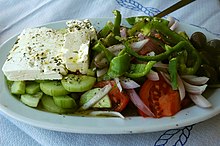
Greek cuisine is a blend of indigenous traditions and foreign influences. Neighbouring Italy and Turkey have left a major impact on Greek cuisine, and there are shared dishes with both of these nations. The traditional Greek diet is very Mediterranean, espousing vegetables, herbs, and grains native to the Mediterranean biome. Being a highly maritime nation, the Greeks incorporate plenty of seafood into their diet. Greece is also a major producer and consumer of lamb; beef, pork, and especially chicken are also popular. Olive oil is a staple in Greek cooking, and lemon and tomatoes are common ingredients. Bread and wine are always served at the dinner table.
The cuisine in Greece can be radically different from what is offered in Greek restaurants around the world. Greek restaurants abroad tend to cater more to customer expectations rather than offer a truly authentic Greek dining experience. One example is the famous gyros (yee-ros), a common item on Greek menus outside Greece. While it is a popular fast-food item in Greece today, it is a foreign import adapted from the Turkish döner kebap after World War II. It is considered by Greeks as junk food. It is never served in the home and is generally not found on the menus of non-fast-food restaurants.
Greeks live to eat, and eating out is Greece's national pastime and a rewarding experience for visitors; however, not knowing where to go or what to do can dampen the experience. In the past, restaurants that catered mostly to tourists were generally disappointing. Thankfully, the nation's restaurant industry has grown in sophistication over the past decade, and it is now possible to find excellent restaurants in highly-touristed areas, particularly areas that are popular with Greek tourists as well. Thus, it remains a good idea to dine where Greeks dine (Go search them at the times Greeks dine: 21:00-23:00). The best restaurants will offer not only authentic traditional Greek cuisine (along with regional specialities) but Greece's latest culinary trends as well.
A good sign of authenticity is when you get a small free dessert when you ask for the bill. Bad signs are when desserts are listed on the menu, large posters depicting food are seen outside or when a waiter is standing outside yelling for clients to come in or taking your plates away while you are still sitting at the table (traditionally everything is left on the table until the customer is gone, even if there is hardly any space left).
Restaurants serving international cuisine have also made a presence in the country, offering various options such as Chinese, French, Italian, and international contemporary.
Vegan and vegetarian [ edit ]
Restaurants catering strictly to vegans and vegetarians are practically non-existent outside of Athens. However, there are many vegan and vegetarian dishes in Greek cuisine. As a vegan, you'll probably end up ordering fava every time you go to a taverna but do ask the waiter if there are other vegan dishes on the menu or if the chef could make a vegan-friendly version of a particular dish. In cases when someone is not familiar with the concept of veganism, you may ask if the food you're ordering is νηστίσιμο (nistisimo), i.e. appropriate for people who fast for religious reasons. Such food may still contain honey or even seafood, so make sure to ask.
A number of vegan restaurants have opened in and around Athens. Falafel places are also becoming quite popular. There are also many shops with healthy food and a vegan shop , all in addition to ubiquitous fruit and veg shops.
But also do not miss the numerous stalls on the side of the road selling delicious local fruits, vegetables and produces.
Popular local dishes [ edit ]

The traditional fast foods are gyros (γύρος, "GHEER-ohs", not "GY-rohs" as in "gyroscope"), roast pork or chicken (and rarely beef) and fixings wrapped in a fried pita; souvlaki (σουβλάκι, "soov-LAH-kee"), grilled meat on a skewer; Greek dips such as tzatziki (τζατζίκι), made of strained yoghurt, olive oil, garlic and finely chopped cucumbers and dill or mint; and skordhalia (σκορδαλιά), a garlic mashed potato dip which is usually served with deep fried salted cod.
With its extensive coastline and islands, Greece has excellent seafood. Try the grilled octopus and the achinosalata (sea-urchin eggs in lemon and olive oil). By law, frozen seafood must be marked as such on the menu. Fresh fish, sold by the kilogram, can be very expensive; if you're watching your budget, be sure to ask how much your particular portion will cost before ordering it.
Greek salad (called "country salad" locally, "horiatiki"), a mix of tomatoes, cucumber, feta cheese and onion – all sliced – plus some olives, and occasionally green bell pepper or other vegetables, usually garnished with oregano. Traditionally it is dressed only with olive oil; vinaigrette or lettuce are added only in the most tourist-oriented restaurants. It is the typical summer salad.

Also consider:
- moussaka , a rich oven-baked dish of eggplant, minced meat, tomato and white sauce
- pastitsio , a variety of lasagna
- stifado , pieces of meat and onion in a wine and cinnamon stew
- spetzofai , braised sausage with pepper and tomatoes, a hearty dish from the Mt. Pelion region
- sahanaki , fried semi-hard cheese
- paidakia , grilled lamb chops, are also popular. (They tend to have a gamier taste and chewier texture than North American lamb chops, which you may or may not like.)
- creamy peppered cheese , eggplant salad or fried zucchini
- fasolada , dry beans stew, sometimes considered Greece's national dish. A variety with a larger bean cultivar is known as "Gigantes".
Fried potatoes (often listed on menus as chips ) are a naturalized Greek dish, found almost everywhere. They can be very good when freshly made and served still hot. Tzatziki is usually a good dip for them, though they are still good on their own.
For dessert, ask for baklava , tissue-thin layers of pastry with honey, cinnamon and chopped walnuts; or galaktoboureko , a custard pie similar to mille feuille. Other pastries are also worth tasting. Another must-try is yoghurt with honey: yoghurts in Greece are really different from what you used to see at Danone stores: to start with, genuine yoghurt in Greece has 10% of fat. Fruit such as watermelon is also a common summertime treat.
For breakfast , head to local bakeries ( fourno ) and try fresh tiropita , cheese pie; spanakopita , spinach pie; or bougatsa , custard filled pie, or even a ""horiatiko psomi", a traditional, crusty village type bread that is a household staple, and very tasty on its own too. All are delicious and popular among Greeks for quick breakfast eats. Each bakery does own rendition and you are never disappointed. Go to the next Kafeneion with them and have it there with a Greek coffee to be local.
A popular drink is a frappe made with instant Nescafé, water, sugar, and sometimes milk. It is frothed and served over ice.
Cover fee [ edit ]
It's common to charge a cover fee in restaurants officially (i.e. stating it in a receipt), such as €0.30 to €2 per person, but if it's tending towards €2 you should really consider eating somewhere else.
Fast food [ edit ]
McDonald's and Domino's pizza have made a significant presence in Greece over the past 15 years. However, they face strong competition from the popular local chains and they are not really popular with natives, especially outside Athens.
Goody's [dead link] is the most popular fast-food chain in the country, offering a large variety of fast food meals, with numerous outlets throughout the country. A hamburger with Coke costs €3-5. Everest is a chain which specialises in hand-held snacks. Also in Thessaloniki you can find Subito . Flocafé is gaining popularity through its coffee and dessert items. There are also many independently-owned fast food businesses that offer typical fast food items, such as gyros. Many of these small businesses tend to be open late at night, and are popular with younger crowds on their way home from a night out.
Drink [ edit ]
Those wishing to booze in Greece would be well advised to stick to the traditional domestic Greek products discussed below, which are freely available, mostly cheap by European standards, and usually of good quality. Any imported, non-Greek alcoholic beverages are likely to be very expensive if genuine and, if cheap, may well be "bomba," a locally distilled alcohol with flavourings which sometimes, especially in island bars catering to young people, masquerade as whisky, gin, etc. If you drink it, you'll be very sorry. Drink in respectable places where you can see the bartender mix your drink.
Water [ edit ]
A glass of water is traditionally served with any drink you order; one glass for each drink, especially with any form of coffee. Sometimes you even get a glass of water first and then you are asked what you want to drink. Sometimes you might as well get a bottle instead of just a glass. In touristy areas you might have to ask for a glass of water if you want one. If you don't get water with a coffee you just stepped into a tourist-trap. Also, if you did not explicitly ask for a bottle instead of a glass, and they try to charge you for it you should refuse.
Tap water in most places a tourist would visit is drinkable; if in doubt, ask your hotel. But often though drinkable it doesn't taste very good, especially on some small islands (as it is imported in and heavily chlorinated), and many visitors, like many Greeks, prefer bottled water. By law, water prices in shops must remain within acceptable limits, making it much cheaper than in Anglosphere nations. A half litre of bottled water costs (July 2022) €0.50 if you buy it on the street, and €0.15 if you buy it from the supermarket.
Wines [ edit ]
To be able to purchase or drink alcohol in Greece, by law, you must be 17 and photographic ID will be asked for infrequently, especially in venues that sell food (many independent fast food outlets will serve alcohol).
Greece, an ancient wine producing country, offers a wide variety of local wines, from indigenous and imported grape varieties, including fortified and even sparkling wines. Greek wines are generally not available on the international market, as production is relatively small, costs are quite high and little remains for export. However, in the past decade Greek wines have won many international prizes, with the rise of a new generation of wineries. Exports are rising as well.
Wine ( Krasi : κρασί / oenos : οίνος) is most Greeks' drink of choice.
Almost every taverna has "barrel wine," usually local, which is usually of good quality and a bargain (€6-8/litre, but check this before ordering when you are in a touristy area.).
If they have it, try also the Imiglyko (Half-Sweet) red, even if sweet wine is usually not your preference, it is different from anything you know.
Retsina is a "resinated wine" with a strong, distinctive taste that can take some getting used to; the flavour comes from pine resin, which was once employed as a sealant for wine flasks and bottles. The most well-known and cheap-n-dirty is "Kourtaki Retsina".
Bottled wines have gotten increasingly more expensive; some that the beginner may find worth trying are whites from Santorini and reds from Naoussa and Drama. All wines and alcoholic beverages are cheaper in the super markets, but then you can't consume them in a bar, unless you keep them hidden in small bottles and use them very discretely.
Beer [ edit ]
Even if beer ( bira : μπύρα) is consumed all around the country, don't come to Greece for the beer. The only local varieties widely available are Mythos and Alpha, but Greeks drink mostly Northern European beers produced under license in Greece like Heineken and Amstel. Heineken is affectionately known as "green"; order it by saying "Mia Prasini."
On the quality front, there is also a microbrewery/restaurant called Craft (2 litre jug also available in large supermarkets), and new organic beer producers like Piraiki Zythopoiia.
Liquor [ edit ]

The most famous indigenous Greek liquor is ouzo (ούζο), an anise-flavored strong spirit (37.5%), which is transparent by itself but turns milky white when mixed with water. Mainlanders do not drink ouzo with ice, but tourists and Greek islanders generally do. A 200 ml bottle can be under €2 in supermarkets and rarely goes above €8 even in expensive restaurants. Mytilene (Lesbos) is particularly famous for its ouzo. A few to try are "Mini" and "Number 12," two of the most popular made in a middle-of-the-road style, "Sans Rival," one of the most strongly anise-flavored ones, "Arvanitis," much lighter, and the potent "Barba Yianni" and "Aphrodite," more expensive and much appreciated by connoisseurs.
Raki or tsikoudia is the Greek equivalent of the Italian grappa , produced by boiling the remains of the grapes after the wine has been squeezed off. It is quite strong (35-40% of alcohol) and in the summer months it is served cold. It costs very little when one buys it in supermarkets or village stores. The raki producing process has become a male event, as usually men are gathering to produce the raki and get drunk by constantly trying the raki as it comes out warm from the distillery. One raki distillery in working order is exhibited in Ippikos Omilos Irakleiou in Heraklion , but they can be found in most large villages. In northern Greece it is also called tsipouro (τσίπουρο). In Crete, raki is traditionally considered an after-dinner drink and is often served with fruit as dessert.
Coffee [ edit ]
Coffee (kafes: καφές) is an important part of Greek culture.
The country is littered with kafetéries ( kafetéria singular) which are cafes that serve as popular hangouts for Greeks, especially among the under-35s. They tend to be pretty trendy -yet relaxed- and serve a variety of beverages from coffee, to wine, beer, spirits, as well as snacks, desserts, and ice cream. In the pleasant months of spring, summer, and fall, all kafetéries provide outdoor tables/seating and they are busiest with customers in the late afternoon and evening hours. Several kafetéries also double as bars.
Kafeneia (coffee houses) are ubiquitous, found even in the smallest village, where they traditionally served a function similar to that of the village pub in Ireland. Their clientele tends to be overwhelmingly men over 50, however everyone is welcome, male or female, young or old, Greek or foreigner; and you will be treated extremely courteously. However, if you're not interested in cultural immersion to this extent, you may find the kafeneia pretty boring.
Traditionally, coffee is prepared with the grounds left in. It is actually a somewhat lighter version of Turkish coffee but in Greece it's only known as Greek coffee - " ellinikós kafés " or simply " ellinikós ." Despite being slightly lighter than the original Turkish coffee, it remains a thick, strong black coffee, served in a small cup either sweetened or unsweetened. If you don't specify, the coffee is usually served moderately sweet. Greek coffee traditionally was made by boiling the grounds and water on a stove in a special small pot called a "briki." More and more now days it's made by simply shooting steam from an espresso machine into the water/coffee mixture in the briki, resulting in an inferior drink. If you find a place that still actually uses a stove burner to make their coffee, you can be sure it's a traditional cafe.
During the hot summer months, one of the most popular coffees at the kafetéries is frappé (φραπέ): shaken iced instant coffee. This is actually an original Greek coffee and can be really refreshing, ordered with or without milk, sweetened or unsweetened.
Coffee can also be made espresso-style, French press (mainly at hotels), and with modern filter technology. The latter is sometimes known as Γαλλικός: gallikos ("French") which can lead to some confusion with the press method. It is best to ask for φίλτρου: filtrou , which refers unambiguously to filter coffee. It is best not to ask for black coffee , as it is unlikely that anyone will understand what you are asking for.
Espresso freddo or cappuccino freddo have gained much popularity the last decade, and these are the most popular coffees throughout Greece. Espresso freddo is simply espresso + ice; cappuccino freddo refers to espresso + ice + chill milk foam. They may be served from mousse containers, not prepared to order; be careful to check.
Iced tea [ edit ]
In mass-sector taverns and cafe, iced tea typically means instant; ask twice if you prefer brewed ice tea.
Sleep [ edit ]
If you enjoy the local traditions and charm, unhurried rhythm of living, small, family-run pensions are the best way to enrich your experience. Owners and personnel there are friendly and open-minded, compared to the impersonal service you normally encounter in large hotels.
If you have a bigger budget, renting a villa is a luxurious and splendid idea. They are normally near or on the beach and provide more space and a great view.
In Greece hotels, especially in the islands but also even in Athens and other big cities, tend to be simple establishments. Rooms are typically small, and bathrooms smaller, with the shower often a hand-held sprayer; if there is a bath-tub, it's often a sit-bath. Sometimes in the most basic places shower curtains are lacking. Closets are often inadequate, and sometimes there is only a wardrobe. On the plus side, such hotels typically have a balcony (though sometimes tiny) or veranda, either private or a large one shared by all the rooms (but these are usually spacious enough not to feel cramped.) Standards of cleanliness are usually good, even in the simpler places. Those who want more luxurious accommodation can usually find it in cities and on the more popular islands but should check the hotel's quality in reliable sources to be sure of what they're getting.
Most Greek hotels now, even the smaller ones, have websites and will take bookings by email, though sometimes fax is a more reliable way to communicate. There are also numerous Greek and international hotel booking services which will make bookings, and sometimes these are cheaper, or have rooms available when the hotel itself says it's sold out. If you're not really particular about choosing a hotel, you can usually find a place on a walk-in basis without too much trouble on all but the most crowded islands, where rooms can be difficult to find at the peak of the season, and even in the shoulder season on weekends and major holidays. If you do get stuck for a room, try a local travel agency (preferably one endorsed by a reputable guidebook) or alternatively, ask at a cafe whether the owner knows of any rooms for rent; often they do.
On some islands, though this varies from place to place, the owners of accommodations will meet arriving ferries to offer rooms. Often they'll have a van there to transport you from the port, and will have brochures to show you. These places are perfectly legitimate, they're sometimes among the best value places. You can negotiate prices, especially when there are a lot of them trying to fill their rooms, and prices in the range of €20-25 for a room or even a studio is not uncommon in mid-season. But they could be anywhere from a few steps away from the port to a mile out of town, so before accepting such an offer it's best to be sure you get a good idea of its location.
Places listed in the guide books tend to be booked up in advance and usually get more expensive as soon as they know they are in there!

Greek rooms typically have air conditioning nowadays. If this is important to you, ask before booking. Some rooms in old traditional buildings with thick stone walls may not need it. Televisions are also common, though the picture may be too fuzzy to be much use, and if you get the set to work you may find it receives programs only in Greek. Room phones are rare in the less expensive places.
The main problem you're likely to encounter with a Greek hotel room is noise. Anything on a road is likely to suffer from traffic noise, and even at hotels not on a major road you may find that that "footpath" outside is used as a superhighway by Greece's notoriously loud motorbikes. And tavernas and clubs nearby can be loud. If you're concerned about noise, it makes sense to choose your hotel's location carefully. The quietest ones are likely to be in an old part of the town or village accessible only by stairs which counter the prevailing "if I can drive it there I will drive it there" car and motorbike philosophy.
In addition to hotels, almost every popular Greek destination offers self-catering accommodations called studios or sometimes apartments —the terms are pretty much interchangeable. Often these are run by hotels: a hotel may include some self-catering units, or the managers of a hotel may also run a separate building of self-catering apartments. Though not listed very often in travel guides, these studios are most certainly a viable option for many travellers. Typically, a studio consists of one large room, usually larger than a hotel room (though sometimes there are multiple rooms,) with a sink, small refrigerator, and two-burner hot-plate. They usually have a private balcony or veranda, a television, and air conditioning, though rarely a room phone and almost never internet access. In contrast to a hotel, they lack a front desk, there is no breakfast or other food service, and there may be maid service only once every two or three days. Studios are often in quieter and more scenic locations than hotels. For those who don't require the full services of a hotel, studios can be an attractive alternative offering better accommodation for the money, and the chance to economize on food by preparing some meals yourself.
Learn [ edit ]
Being the cradle of Western civilisation, Greeks take education very seriously. Many of the world's greatest minds (e.g. Aristotle, Pythagoras, Plato, Democritus) were from Greece, many Greeks have university degrees, and the country sends many students to universities all over the world.
Although this all sounds impressive, Greece isn't a popular destination for foreign students yet. The Greek government is trying to change that, however. Greek universities charge low tuition fees for all students, including international students.
The Greek educational system is known for being notoriously difficult, competitive, and painstaking; Greek parents often complain that children get too much homework, and the national Panhellenic exams (known as Apolytirion and are akin to A-Levels in the United Kingdom ) are widely criticised for being extremely difficult and gruelling.
If there's one thing that attracts students to Greece, it's the affordable cost of living. Costs in Greece are much lower compared to other European countries. Athens is remarkably cheaper to live in than say, Oslo in Norway .
The most prestigious univeristies in the country are as follows: The Aristotle University of Thessaloniki , National Technical University of Athens , and the National and Kapodistrian University of Athens .
Students from EU countries may enter many sites for free. Students from other countries have their entrance fees reduced. So take your International Student Identity Card with you.
Modern Greek courses [ edit ]
For those interested in learning modern Greek , there are several schools offering courses in language instruction for foreigners. Most of these are designed for English speakers, but some schools have courses for people with other first languages. Some schools are in Athens, some in Thessaloniki (among them the very good school of Modern Greek language in the Aristotle University of Thessaloniki) while others have centers in the islands offering a residential program that combines language study with a vacation. Some offer individual tutoring in addition to classes. Some well established programs are The Hellenic Culture Centre [dead link] (an associate of The Ikarian Centre,) and The Athens Centre .
Work [ edit ]
Citizens of European Union or EFTA member countries work in Greece without any restrictions, while citizens of non-EU/EFTA countries, including the United Kingdom, need a work permit to work in Greece.
Finding a job in Greece can be a difficult endeavour. There are not enough jobs for people (the unemployment rate in Greece is quite high) and many Greeks have moved abroad for employment opportunities.
Despite being a developed country, wages in Greece are rather low.
Stay safe [ edit ]
Crime and theft [ edit ].
Violent crime and theft rates are low; public disorder is rare, and public drunkenness is generally frowned upon. Visitors should rest assured that this is a safe and friendly destination, but it is always advisable for foreign tourists to exercise basic precautionary measures just as they would at home. There has been a spike in theft (or at least a perceived one), which some locals will not hesitate to blame on the influx of immigrants.
The places where the visitor is most likely to encounter crime and theft are overcrowded and popular with tourists. This includes the metro in Athens and tourist resorts thronged with younger foreigners. The more notorious of such places include Faliraki in Rhodes (calmed down since a new tough mayor was elected), Kavos in Corfu , Malia on Crete , and Ios (though this last is said to have quieted down a bit.) Most visitors to these places return home safely, but there have been increasing reports from them of theft, public indecency, sexual assault, and alcohol-fueled violence; both the perpetrators and victims are usually young foreigners, though sometimes locals are involved. Authorities have stepped up the police presence in such areas to crack down on these activities. Still, visitors to these places would do well to avoid anything that looks like trouble, especially late at night, and to remember that their own overindulgence in alcohol increases their chance of attracting trouble themselves.
Scams [ edit ]
The most commonly reported major scam against travellers is the Greek version of the old clip joint routine. This is reported primarily from central Athens, but also occasionally from other cities and even the larger island towns. A single male traveller will be approached, usually at night in a neighborhood where there are a lot of bars, by a friendly Greek who will strike up a conversation leading to an invitation to go to "this really cool bar I know" for a drink. Once at the bar, they are joined by a couple of winsome ladies who immediately begin ordering drinks, often champagne, until, at the end of the evening, the mark is presented with an astronomical bill, payment of which is enforced by the sudden appearance of a pair of glowering thugs. The reason this scam works is because most Greeks have a tradition of being friendly to visitors, and almost all Greeks who strike up a conversation with you will have no ulterior motives. But if you're a single male traveller approached by a Greek in the circumstances described above, it's safest to politely but firmly decline any invitations.
Also don't accept to change your money on the street and if someone asks you if you could change a €20 or €50 note, refuse (you might get a counterfeit note).
Photography restrictions [ edit ]
It is strictly forbidden to take photos of military installations or other strategic locations. Authorities will take violations quite seriously. Obey signs prohibiting photography. In fact, it would be best not to take photographs of anything of military significance, including Greek navy ships, or of airports or any aircraft, even civilian ones: Greek authorities can be very sensitive about such things. Many museums prohibit photography without a permit; some prohibit only flash or tripod photography, and many ask visitors not to take photos of objects (statues, etc.) which include people standing by them, as this is considered disrespectful. Officials at museums will rush over to yell at you if they see a camera or even a cell phone in your hand.
Antiquities [ edit ]

Greece also has very strict laws concerning the export of antiquities, which can include not only ancient objects but also coins, icons, folk art, and random pieces of stone from archeological sites. Before buying anything which could conceivably be considered an antiquity, you should become familiar with the current laws regarding what can be taken out of the country. Briefly, all objects made before 1830 are considered antiquities and are protected by the Ministry. Do not ever think to export or buy any piece of archeological value because it will be either be a fake or you will be arrested promptly at the airport for trafficking of goods of archeological value.
Drugs [ edit ]
Greece has some of the strictest, and most strictly enforced, drug laws in Europe, and tourists are not exempt. No matter what anyone tells you, it is most definitely not cool to do drugs in Greece, including marijuana. Furthermore, such a behaviour is strongly rejected by most locals and will almost certainly cause someone to call the Police and have you arrested. Even a very small quantity is enough to get you in serious trouble. Don't even think of offering even the smallest amount of drug to someone else. You risk being prosecuted with charges of drug dealing, leading to several years of imprisonment!
Traffic [ edit ]
The greatest danger to travellers in Greece is probably in the simple process of crossing the street: traffic can be bad even in smaller towns and horrendous in Athens and other Greek cities, and accident rates are high. Caution should be exercised by pedestrians, even when crossing with a walk light. Traffic fatalies were cut by 60% in the ten years leading up to 2018, but in that year 709 people were killed on Greek roads — 64 per million people, which is higher than the average of 49 in the rest of the European Union. Drivers often weave between lanes while speeding. Stay safe.
Cope [ edit ]
Toilets in public spaces such as restaurants and bars sometimes lack seats over the porcelain, so to avoid direct contact with the toilet's porcelain, you may want to bring disposable toilet seat covers.
Stay healthy [ edit ]
Health care [ edit ].
The government's austerity program in the 2010s led to a "meltdown" of Greece's previously admired health care system, as the budgets of state-run hospitals have been cut by up to 50%. Many citizens prefer private health care for longer-term hospital stays. Hospitals face shortages of doctors, nurses and basic supplies. However, public health care is free and universal for all citizens, and for all EU nationals upon presentation of an EHIC card (formerly the E111 form). For non-EU nationals, only emergency care is provided for free.
A network of helicopter ambulances serves the islands, transporting patients who need immediate attention to the nearest island or city with a major hospital.
The country's pharmacies and medications are of top quality, and pharmacists are highly trained experts in their field. Many medications that need a prescription in the UK and US can be purchased without a prescription in Greece. When sick with a simple, common illness, a visit to the pharmacist will provide you with the medication you need. If you are looking for a specific medication, be sure to know its generic name, as brand names might be different. Most pharmacies close on Sundays, but a sign will be posted on the door indicating the nearest pharmacies that are open.
Healthcare provision is different to Anglosphere nations in that many specialists are in the community. GPs are replaced by community pathologists. Hotels and tourist agencies can provide advice on where to go if you are ill.
Sexually transmitted infections [ edit ]
Sexually transmitted infections (STIs) exist in Greece as elsewhere, and travellers who may engage in sexual activity while visiting Greece should remember that even if one is on vacation and one's sexual partner is also a traveller, perhaps from one's own country, neither of these facts suspend the laws of biology. According to reports in the Greek and British media, unprotected sex among visitors to Greece, with a consequent rise in STIs and unplanned pregnancies, is especially common at the party resorts favoured by younger people, such as Ios , Malia , Kavos , and Faliraki . Condoms are available at any pharmacy and at many kiosks.
Natural dangers [ edit ]

Sun and heat pose risks that summer visitors should take precautions for. Take a good, light sun hat and sun glasses, and drink plenty of water.
In late spring and summer, the government runs public service announcements on television reminding Greeks to wear their sunblock at the beach. The Mediterranean sun tends to get quite strong, and can burn skin that has not been exposed to the sun for a long time. Any excessive daily sun exposure can also cause long-term damage to skin. Sunblock and sunscreen are widely available throughout Greece at supermarkets, grocery stores, pharmacies, and special stores selling beach-related items, though they tend to be expensive, and the higher SPF factor blocks can be hard to find.
During the hottest months, while visiting archaeological sites, wear tank tops, carry umbrellas, and carry water. Daily high temperatures stay at about 95-100°F (35-38°C). The sun is merciless. Athens has been subject to periodic summer heat waves where the temperature can reach above 100°F (38°C), posing a risk of respiratory problems and heat stroke for some people. Many islands, especially in the Cyclades , have very little shade to ameliorate the summer heat; if hiking around such islands, including going by foot to distant beaches, it's especially important in hot weather to wear a hat and sunscreen, to take water, and to avoid being caught walking during the hottest part of the day.
Jellyfish periodically infest some beaches and their stings can be severe. The red ones are particularly dangerous. Sea urchins are common along the Greek coast, usually clinging to underwater flat surfaces such as smooth rocks and sea walls. They usually inhabit shallow water so they're easy to see. Care should be taken not to step on them, since their spines can be painful.
Don't hike cross country in Greece alone: even in popular places, the countryside can be surprisingly deserted, and if you get in trouble while you're out of sight of any houses or roads, it could be a long time before anyone notices you.
Lifeguards are rare at Greek beaches, though most of them where people congregate to swim are locally considered safe. Some beaches have shallow water a long way from the shore; others suddenly shelve steeply. If in doubt about safe swimming conditions, ask locally.
There are no required inoculations for Greece and the water is almost everywhere safe (see above under Drink.) Look for 'Blue Flags' at beaches for the highest quality water (which tend to also have good sand and facilities)
Respect [ edit ]
Greeks rate politeness with a person's behaviour and not their words. Furthermore, there is an air of informality; everybody is treated like a cousin. They use their hands to gesture a lot. Have fun with this. Sometimes over-emphasizing politeness in spoken language will only make the person dealing with you think you are pretentious. It's nice to learn basic words like "thank you" (Ευχαριστώ: ef-khah-rees-TOH) or "please" (Παρακαλώ: pah-rah-kah-LOH).
Greeks generally consider it proper etiquette to let the stranger make the first move. You may find that on entering a cafe or passing a group on the street you feel that you're being ignored, but if you take the initiative by saying hello first, you're likely to find that people suddenly turn friendly. In the countryside it is not uncommon that total strangers will greet you, greet them back in kind. Greeks like to smalltalk, and when they get carried away smalltalking, they might even forget what they were doing to begin with, ending up drinking raki with you.
Greeks are often portrayed and stereotyped as "lazy". Perpetuating this stereotype is rude. In actuality, Greeks take leisure very seriously. Don't take perceived laziness or rudeness harshly. They do it to everyone, locals and tourists alike.
Dress codes for churches sometimes include covered shoulders for women and knees covered for both sexes, but generally they don't mind about your clothes as long as they are not very provocative. This tends to be lightly enforced during the height of the summer tourist season, simply due to sheer volume! In any case, appropriate clothing is usually available at the entrance of churches and monasteries, especially the ones receiving most tourist traffic. Just pick it up going in and drop it off on the way out.
Nudism : Regulary tourists are annoying the locals, because too much skin is shown at the beaches. Nudity is not so common in the Greek public. Also topless is not accepted outside the tourist areas. Nevertheless there are on all shores of the mainland and on most of the islands nudist beaches where nudism is tolerated and even nudist hotels in Crete , Rhodes , Kefalonia , and Zakynthos .
Social etiquette and breaches [ edit ]
Respect for elders is very important in Greece. Greeks place a high emphasis on family values and it is common for Greek parents to be intimately involved in the lives of their children. Try to act in a mature, sensible fashion around someone older than you and try not do anything that would make an older person/authority figure feel challenged.
Greeks value transparency and loyalty . Don't say something if you don't mean it. Don't say "next time" if there isn't going to be a "next time".
It's common for Greeks to ask you personal questions . It's completely normal for them to ask about your family life, about your vocation, and the like. It may, however, be crass to discuss someone's religious convictions and/or their salary, matters which are normally considered private in many parts of the world.
Sensitive issues [ edit ]
Avoid saying that Greece is part of Eastern Europe . Greece is generally considered part of Southern Europe .
Avoid saying that Greece is a Balkan country ; Greeks generally dislike this label.
Avoid making strong comments about Ancient Greece , the Byzantine Empire , or Greek history in general; Greeks take pride in their country's history and are proud of what their country has given to the world.
The Macedonian issue is considered a very sensitive topic: Greeks consider that the name "Macedonia" is stolen from them and used by Tito's partisans in southern Yugoslavia to address the country created after World War II as a new constituent republic within Yugoslavia by Tito. The Greeks refer to it as "FYRoM" or the "Former Yugoslav Republic of Macedonia" when dealing with foreigners and as Skopia (The Greek name of the Macedonian capital Skopje) among themselves. In February 2019, the country was officially renamed the Republic of North Macedonia in order to settle the dispute.
The military junta of the late 1960s-mid 1970s is a sensitive topic, when many Communists and other left-wing groups—have suffered severe repression and view its leaders with utter resentment.
Avoid making strong comments about the Greek debt crisis ; during the crisis many Greeks lost a great deal of purchasing power, lost their jobs, and moved abroad in search of better opportunities. Never say or imply that the Greeks "deserved" their economic demise; remember there is a clear distinction between Greek people and the Greek government.
Discussing politics is not a social faux pas in Greece and you'll very easily discover that Greece is one of the most politically active countries in the world. Political discourse tends to be quite strong, passionate, and fierce -- keep that in mind when conversing with Greeks.
After centuries of Ottoman occupation and domination, there's still some resentment towards Turkey . If you happen to be the most ardent Turkophile in the world, avoid being overly enthusiastic about Turkey in front of Greeks as it can easily arouse strong emotions. Subjects such as Turkey's occupation of Northern Cyprus , Greece being under Ottoman rule, the Greek genocide (the Ottomans massacred almost a million Greeks during World War I), and the like can very easily incite fierce, passionate, emotional debates. Bear in mind that most Greeks have nothing against people from Turkey ; rather, many disagree with the views and beliefs of the Turkish government.
Religion [ edit ]
The Greek Orthodox Church , part of the Eastern Orthodox communion, is the state religion, and nominally adhered to by over 80% of Greeks. However, freedom of religion is also constitutionally guaranteed, and contemporary Greek society is in practice rather secular. Most Greeks do not attend church regularly every Sunday, but instead only show up for important occasions such as Christmas and Easter. That said, the Greek Orthodox Church is still an important part of the Greek national identity, and many Greeks see it as integral to being Greek, so try not to criticise it unless you know your listener well.
Obscene gestures [ edit ]

Holding up your palm with your fingers extended outwards is rude in Greece, and is akin to giving someone the middle finger. This gesture, known as Mountza , is thought to originate from the days of the Byzantine Empire.
Smoking [ edit ]
Greeks smoke tremendously, and they see cigarettes as a birthright. Smoking is prohibited by law in all public places like restaurants and cafeterias. A hotline (1142) can be used to report people and establishments breaking the smoking ban, and Greeks have not been shy about using it. You will rarely, if ever, see people smoking in such places and it is best to step outside when you want to smoke.
Greece is subject to frequent forest fires during the dry summer season, so definitely avoid smoking in forested areas! The penalties for this can be especially severe.
Connect [ edit ]
Phone [ edit ], mobile internet [ edit ].
There are no Internet roaming charges for EU citizens , so you can surf the Internet in Greece as normal with your local sim card. For Non-EU citizens , you can either buy a Greek sim card or use a virtual sim cards where you can buy the GB you want as credit at home and then surf the internet anywhere in Greece until the credit is used up. This is easier than buying a Greek sim card.
There are at least three mobile carriers, Cosmote, Wind and Vodafone all of which require by law presenting some form of identification in order to activate your prepaid plan. Choose whichever has better reception in your area; GSM 900, GSM 1800 and UMTS 2100 bands are supported. Data usage is cheap. Ask the mobile carrier for more information. Mobile phone carriers support data roaming with 2G, 3G, 4G and LTE technologies.
Calling [ edit ]
The cheapest way to call someone abroad – and this is really cheap – is to use a pre-paid calling card and call from a land line anywhere (also from your hotel room). Pre-paid calling cards are sold in many shops and kiosks. The calling card is not much more than a phone number and a pin code, which you dial prior to dialling the usual phone number. If you want to call internationally, ask for an international calling card. For €1 you can call for about 45 minutes, so buy a card in the cheapest value (which is about €3). Calling someone for half an hour is cheaper than sending one email from an internet café. Cards expire usually 90 days after first use. You can also use this pre-paid calling card at public phone boxes, which are widely available.
Mobile phones are prevalent in Greek's communication, and if you need to talk with your fellow travellers it is advised that you buy a local prepaid plan instead of using roaming, as it is far cheaper.
Internet [ edit ]
Internet access is widely available throughout the country. Almost all hotels provide internet access, either free or paid. Local coffee shops usually offer free Wi-Fi access, as many other public places do. Feel free to ask for the password, if the network is locked.
News [ edit ]
You can have an update from various news agencies that provide Greek news in English like the official Athenian-Macedonian news agency and Reuters , ΕΡΤ Greek Edition (the public broadcaster) [dead link] , IN (the oldest news active Greek news site) or Kathimerini English Edition (a daily newspaper published in Athens and distributed exclusively with the International New York Times in Greece and Cyprus) but it's always safer to keep in touch with locals (for example in the case of a fire in a nearby location that you planned to visit).
Go next [ edit ]
The land border can be crossed to Turkey , Bulgaria , North Macedonia and Albania .
Greece has ultra-low-cost flights to many European countries, Jordan , Israel , Georgia and to the United Arab Emirates .
- Has custom banner
- Has mapframe
- Has map markers
- Articles with dead external links
- Has caution box
- Has caution box with no date
- All destination articles
- Outline countries
- Outline articles
- Country articles
- Has Geo parameter
- Pages with maps
Navigation menu
- Destinations
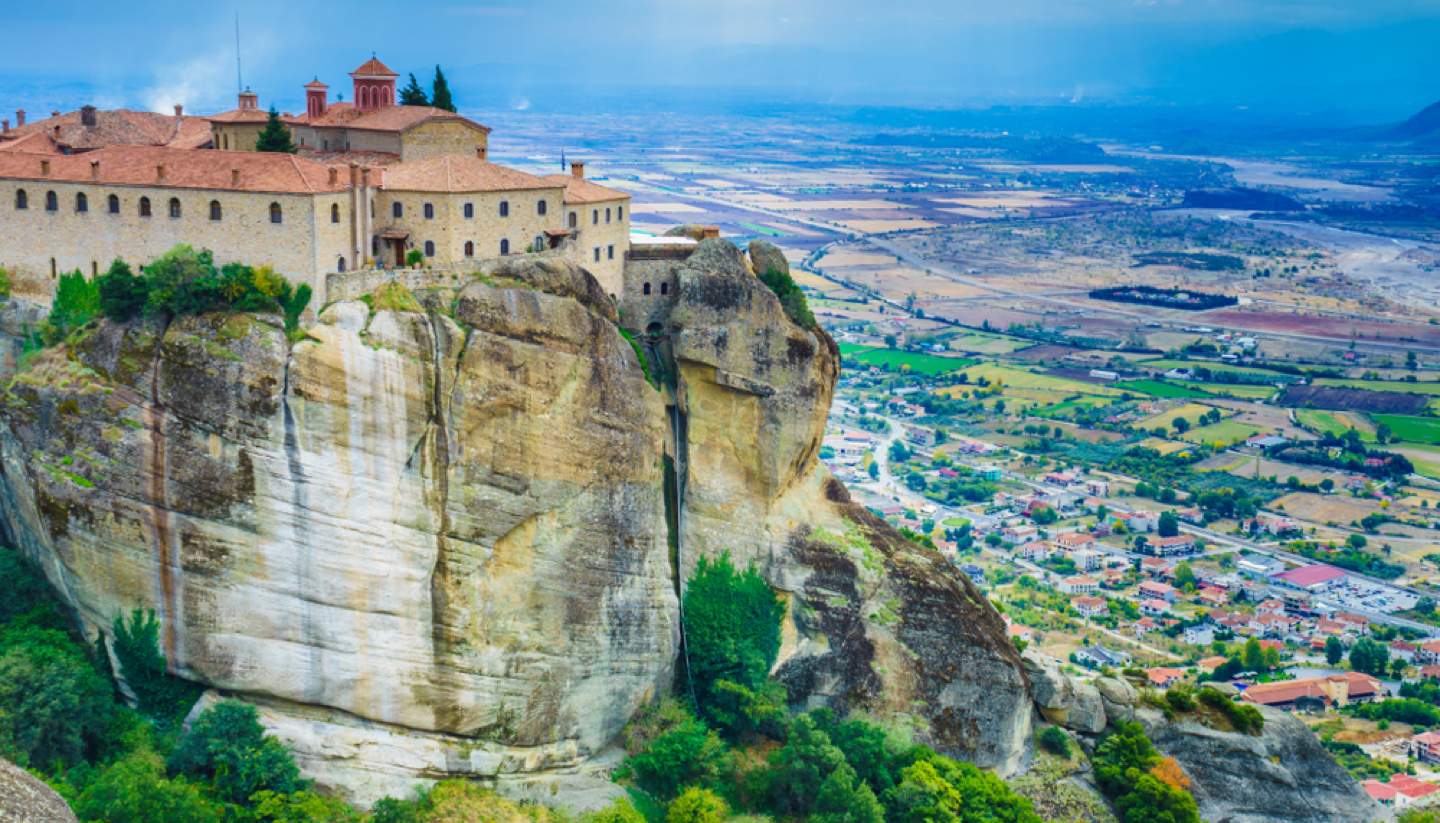
Introducing Greece
About greece.
- Images of Greece
- History, language & culture
- Weather & geography
- Doing business & staying in touch
Plan your trip
Travel to greece.
- Where to stay
While you’re there
- Things to see & do
- Shopping & nightlife
- Food & drink
- Getting around
Before you go
- Passport & visa
- Public Holidays
- Money & duty free
Book your flights
- Athens Eleftherios Venizelos International Airport
- Chania International Airport
- Corfu Ioannis Kapodistrias International Airport
- Heraklion International Airport – Nikos Kazantzakis
- Kos Island International Airport
- Mykonos Airport
- Rhodes Diagoras International Airport
- Thessaloniki International Airport
- Afandou Beach
- Agios Gordios Beach
- Agios Nikolaos beaches
- Dassia Beach
- Elounda beaches
- Faliraki beaches
- Halkidiki beaches
- Heraklion beaches
- Ipsos Beach
- Kalymnos beaches
- Kassiopi beaches
- Kavos Beach
- Kefalonia beaches
- Kos beaches
- Lindos beaches
- Malia beaches
- Mykonos Town beaches
- Pefkos beaches
- Plati Gialos Beach
- Santorini beaches
- Sidari beaches
- Skiathos beaches
- Thassos beaches
- Zante beaches
Cruise Locations
Greece travel guide.
A flavourful melting pot of sparkling nightspots, fresh seafood, sizzling Mediterranean passion and mythical legend, Greece is a fascinating and enchanting destination.
The country has long held appeal for travellers who flock to its shores to lounge on beaches, explore ancient relics and take advantage of the legendary Grecian hospitality.
Yet despite its popularity, there is still an undiscovered feel to parts of Greece with Mount Olympus, the Peloponnese coast and some of the more remote islands slipping, for now at least, under the radar of mass tourism.
The first port of call for most visitors is Athens, the country's stunning capital, which combines a modern centre with the stark ancient beauty of the Parthenon and a position overlooking a cerulean stretch of the Saronic Gulf.
Like the rest of the country, Athens was built on a classical civilisation that produced some of the world's greatest thinkers, philosophers and poets. The ancient Greeks also brought the world democracy, which locals cheerfully remind visitors about, and a pantheon of deities, who are celebrated through statues and local folklore.
Everywhere has its own legend; from the tiny island of Ithaca, home to the wanderer Odysseus, to the rugged stretch of the Peloponnese, the onetime playground of divine beings.
Though the glory days of the Ancient Greeks have passed, the country remains one of Europe's leading holiday destinations, thanks largely to its gorgeous collection of islands, which are scattered like confetti across the Mediterranean Sea.
Greece boasts 6,000 islands and islets in all, all of which only 277 are inhabited. Among them is Rhodes, which was home to the ancient Minoan culture and, legend has it, the terrifying Minotaur. Today it is better known for its stunning beaches, charming seaside towns and lively nightlife.
The islands of Corfu, Crete and Santorini are also established hangouts for sun-seekers and merrymakers, while Kos has begun to attract deities of a very modern kind – the world’s rich and famous. Ultimately, though, in democratic Greece, everyone is welcome.
131,957 sq km (50,949 sq miles).
10,473,455 (UN estimate 2019).
81.7 per sq km.
President Katerina Sakellaropoulou since 2020.
Kyriakos Mitsotakis since 2023.
Travel Advice
The Foreign, Commonwealth & Development Office ( FCDO ) provides advice about risks of travel to help British nationals make informed decisions. Find out more about FCDO travel advice .
Before you travel
No travel can be guaranteed safe. Read all the advice in this guide as well as support for British nationals abroad which includes:
- advice on preparing for travel abroad and reducing risks
- information for women, LGBT+ and disabled travellers
Follow and contact FCDO travel on X (formerly known as Twitter), Facebook and Instagram . You can also sign up to get email notifications when this advice is updated.
Travel insurance
If you choose to travel, research your destinations and get appropriate travel insurance . Insurance should cover your itinerary, planned activities and expenses in an emergency.
This advice reflects the UK government’s understanding of current rules for people travelling on a full ‘British citizen’ passport from the UK, for the most common types of travel.
The authorities in Greece set and enforce entry rules. If you’re not sure how these requirements apply to you, contact Greece’s embassy or consulate in the UK.
COVID-19 rules
Countries may restrict travel or bring in rules at short notice. Check with your travel company or airline for changes.
If you test positive for COVID-19, you may need to stay where you are until you test negative. You may also need to seek treatment there.
Visit TravelHealthPro (from the UK’s National Travel Health Network and Centre) for general COVID-19 advice for travellers .
Follow any instructions given on arrival at immigration or airport testing facilities. Check the Ministry of Tourism website for more information.
Passport validity requirements
If you are planning to travel to an EU country (except Ireland), or Switzerland, Norway, Iceland, Liechtenstein, Andorra, Monaco, San Marino or Vatican City, you must follow the Schengen area passport requirements .
Your passport must be:
- issued less than 10 years before the date you enter the country (check the ‘date of issue’)
- valid for at least 3 months after the day you plan to leave (check the ‘expiry date’)
You must check your passport meets these requirements before you travel. If your passport was issued before 1 October 2018, extra months may have been added to its expiry date.
Contact the embassy of the country you are visiting if you think that your passport does not meet both these requirements. Renew your passport if you need to .
Visa requirements
You can travel to countries in the Schengen area for up to 90 days in any 180-day period without a visa. This applies if you travel:
- as a tourist
- to visit family or friends
- to attend business meetings, cultural or sports events
- for short-term studies or training
If you are travelling to Greece and other Schengen countries without a visa, make sure your whole visit is within the 90-day limit. Visits to Schengen countries within the previous 180 days before you travel count towards your 90 days.
For a longer stay (to work or study, for business or for other reasons) you will need to meet the Greek government’s entry requirements. Check with the Greek Embassy before you make arrangements to travel about what type of visa and work permit, if any, you may need.
If you are travelling to Greece for work , read the guidance on visas and permits.
The entry requirements for touring creatives have recently changed, more details of the new rules can be found on the Greek Embassy website. If you stay in Greece with a residence permit or long-stay visa, this does not count towards your 90-day visa-free limit.
Passport stamping
Check your passport is stamped if you enter or exit the Schengen area through Greece as a visitor. Border guards will use passport stamps to check you’re complying with the 90-day visa-free limit for short stays in the Schengen area. If relevant entry or exit stamps are not in your passport, border guards will presume that you have overstayed your visa-free limit. If you do overstay, you may be fined on departure, and have restrictions placed on your ability to re-enter Greece whilst the fine remains unpaid.
You can show evidence of when and where you entered or exited the Schengen area, and ask the border guards to add this date and location in your passport. Examples of acceptable evidence include boarding passes and tickets.
You may also need to:
- show a return or onward ticket
- show you have enough money for your stay
If you are resident in Greece, read our Living in Greece guide for passport stamping information.
Vaccination requirements (other than COVID-19)
At least 8 weeks before your trip, check the vaccinations and vaccination certificates you may need on TravelHealthPro .
Customs rules
There are strict rules about goods that can be brought into and taken out of Greece . You must declare anything that may be prohibited or subject to tax or duty.
Taking food and drink into the EU
You cannot take meat, milk or products containing them into EU countries. There are some exceptions for medical reasons, for example certain amounts of powdered infant milk, infant food, or pet food required for medical reasons. Check the rules about taking food and drink into the EU on the European Commission website.
There is a high threat of terrorist attack globally affecting UK interests and British nationals, including from groups and individuals who view the UK and British nationals as targets. You should remain vigilant at all times.
UK Counter Terrorism Policing has information and advice on staying safe abroad and what to do in the event of a terrorist attack. Find out how to reduce your risk from terrorism while abroad.
Terrorism in Greece
Terrorists are likely to try to carry out attacks in Greece.
Attacks could be indiscriminate, including in places frequented by foreigners.
There have been several attacks involving explosives and automatic weapons against Greek institutions, shopping malls, banks, media offices, diplomatic premises and the police.
British nationals aren’t normally considered a specific target, but attacks could happen in places visited by foreigners.
UEFA Europa Conference League
Athens will host the semi-finals of the UEFA Europa Conference League on Thursday 9 May between Olympiacos and Aston Villa. If you are travelling to Athens for the match, you should:
- plan your movement around the city to arrive at the stadium well in advance of the match kick-off
- follow the instructions of the local authorities
- take care of your personal possessions including passports, especially in crowds and on public transport
Further information can be found on Aston Villa’s official website .
Political demonstrations
Greek authorities have increased security at some prominent locations, including tourist sites, due to events in Israel and the Occupied Palestinian Territories. Stay aware of your surroundings, stay away from demonstrations and follow the advice of local authorities.
Strikes and demonstrations
There are regular strikes, sometimes called at short notice that can cause disruption to public transport (including air travel and ports), as well as road networks and borders. Political demonstrations can also occur frequently.
Avoid demonstrations wherever possible and follow the advice of the local authorities. Some demonstrations in the past have turned violent. If you do find yourself unexpectedly near a demonstration, move away to the last known safe place. Security forces often use tear gas to break up demonstrations, which can harm your breathing and vision.
Demonstrations take place regularly around major squares in central Athens, in particular Syntagma Square. There is currently a heightened risk of demonstrations, particularly in central Athens, related to events in Israel and the Occupied Palestinian Territories. Nationwide strikes and protests can occur at any time and may disrupt road, air, sea travel and cause delays or diversions at border crossings.
Demonstrations may happen at short notice, and have traditionally happened on 1 May, 17 November and 6 December.
Theft of passports, wallets and handbags are common on the metro and in crowded tourist places, particularly in central Athens. Don’t carry all your valuables in one place, and remember to keep a photocopy or scanned copy of your passport somewhere safe. Maintain the same level of personal security awareness as in the UK.
When driving on holiday, keep your valuables out of sight and lock your vehicle at all times. Always park in a well-lit area or secure car park. Be alert to car crime.
Sexual assault
Sexual assaults and personal attacks may occur in Greece. This includes attacks on foreign visitors in tourist areas and cities.
We recommend that all travellers follow this advice:
- save the location of your accommodation on your maps app, so it’s easier to find at the end of the night
- set up a WhatsApp group to keep in touch with others in your group
- keep an eye on each other’s drinks to make sure they don’t get spiked
- don’t let a friend walk back to their hotel alone
- don’t give a drunk person more alcohol
You should immediately report anything you see that doesn’t feel right to local authorities or hospitality management.
Laws and cultural differences
Personal id.
Carry a copy of your passport or other photographic ID which confirms British nationality at all times, this is a legal requirement.
The majority of visitors experience no difficulties related to race, but there have been some racially motivated attacks, particularly in inner-city areas.
Public offences
The Greek police won’t accept behaviour they find rowdy or indecent, especially where excessive drinking is involved, this behaviour may be illegal. The police will make arrests and the courts are likely to give heavy fines or prison sentences if you behave indecently.
Some fancy dress costumes may be regarded as offensive and therefore against decency laws. Your travel insurance may not cover you after drinking.
It’s illegal to smoke in all indoor public places. The penalty for violating this law is a fine of up to 500 euros.
Possession of even small quantities of illegal drugs can lead to a long prison sentence.
Alcohol, drugs and use of nitrous oxide can make you less alert, less in control and less aware of your environment.
Nitrous oxide is illegal to buy or sell for recreational use in Greece. You can be arrested or fined if found in possession.
Public transport
It’s sometimes necessary to time stamp or validate your ticket on public transport for it to be valid. Check with local providers.
Buying goods or services
Make sure you get a receipt for any goods or services you buy.
Offensive items like pepper spray, knuckledusters or knives with a blade length of 10cm or above are listed as weapons in Greece and fall under the current weapon possession law. You need to have a special licence from the local police authority to carry any weapon otherwise you might face arrest and legal charges. You need to have a special licence to carry any knife that is not made for domestic, professional, artistic or hunting use.
LGBT+ travellers
Same-sex sexual relations are legal in Greece and civil unions between same-sex couples have been legal since 2015 and same sex marriage was legalised in February 2024. The age of consent in Greece is 15, this applies to partners of both the same sex and opposite sex. Transgender people are able to change their legal gender. Anti-discrimination and hate speech laws apply to gender identity.
Public attitudes towards same-sex sexual activity vary throughout the country; showing affection in public by same-sex couples may be frowned upon, especially in rural areas.
Attitudes are generally much more welcoming in Athens and on many Greek islands, particularly on Lesvos, Mykonos and Skiathos. See our information and advice page for the LGBT+ community before you travel.
Military service
Men, aged 19 and above, born to a Greek national parent may have military service obligations, regardless of any other nationality they hold. Authorities can prevent you leaving Greece until you complete military service obligations.
Using cameras or approaching sensitive locations
It is illegal to approach or take photos or videos of military installations, vehicles or buildings at any time. The Greek authorities will arrest and possibly prosecute anyone doing so. Certain border areas are also militarily sensitive. Although you can visit these areas, you should avoid taking photos or video footage.
Outdoor activities and adventure tourism
Music festivals.
Be aware of local laws and customs, and take extra care of your valuables if attending a festival or large concert. Read our festivals in Europe travel checklist for more advice.
Water sports and swimming safety
If you are considering taking part in water sports activities, do so through a licensed water sports centre and make sure paperwork is completed before starting the activity. Check the Safe Water Sports website for more information.
Make sure you follow any warning signs, adhere to instructions from lifeguards and observe the flag indicators on beaches. Follow local advice if jellyfish or urchins are present.
Quad biking and mopeds
Quad biking is considered an extreme sport and carries the risk of serious injury or death. Specific travel insurance to cover quad bike rental is essential. Always take care to read the details of your insurance cover before you travel on holiday, paying particular attention to the small print and exclusions on your insurance policy.
If you do rent a quad bike, choose a category in accordance with your driving licence and age. Drivers and passengers must wear helmets. Failure to do so may invalidate your insurance and if stopped you will be fined and your licence taken from you. If you intend to hire a moped you will need a valid driving licence with at least category A1 - ‘light motorcycle’. Category P, which is valid in the UK for driving mopeds up to 50cc, is not valid in Greece.
Transport risks
Road travel.
If you are planning to drive in Greece, see information on driving abroad and read the RAC guide .
Make sure any vehicle you hire is in good condition and check that you’re insured. When renting mopeds or quad bikes, insurance sold by the hire company usually only provides third party insurance, which only covers the cost of damage to another vehicle. Any damage sustained to the rental vehicle in many cases may need to be paid for by you, or you may face arrest if you do not pay and the hire company decide to press charges.
Traffic can be busy, fast and chaotic, especially in the larger cities. Take care when crossing roads. Pedestrians should cross roads using a crossing. Drivers don’t always stop, even though they are required to. The green pedestrian crossing signal sometimes also allows cars to turn right onto the crossing, so cross with caution.
Driving any vehicle while over the legal drinking limit can result in a heavy fine or imprisonment.
Licences and permits
You can drive in Greece with a UK driving licence.
Driving a British car abroad
You may need a UK sticker to drive your car outside the UK. Check the GOV.UK displaying number plates website for more information on what to do if you are driving outside the UK.
Extreme weather and natural disasters
Adverse weather conditions, including floods, are affecting some regions. The situation can change quickly. Follow “112 Greece” on X (formerly known as Twitter) for official updates
Forest fires
There are active wildfires across Greece, including in populated areas on the mainland and a number of islands.
Wildfires are highly dangerous and unpredictable. The situation can change quickly. Follow “112 Greece” on X (formerly known as Twitter) for official updates.
You should:
- take care when visiting or driving through woodland areas
- make sure cigarette ends are properly extinguished
- not light barbecues
Causing a forest fire is treated as a criminal offence in Greece even if unintentional. If you see a forest fire, call the emergency services on 112.
Forest fires can also cause travel disruption in wider areas.
Be cautious if you are in or near an area affected by wildfires. You should:
- follow the guidance of the emergency services
- call the Greek Emergency Services on 112 if you are in immediate danger
- contact your airline or travel operator who can assist you with return travel to the UK.
- enable the “Emergency Alerts” option to receive the Greek government’s emergency alerts. For:
- iPhones go to Settings > Notification. Enable the “Emergency Alerts” option at the bottom.
- Android 11 and higher go to Settings > Notifications > Advanced Settings > Wireless Emergency Alerts
- Samsung Devices go to Settings > Apps > Messages > Notifications > Emergency Notifications. Enable the “Emergency Alerts” option
- read the Greek Government’s protection guidelines in the event of a forest fire.
- register via the Greek government’s Emergency Communication Service (in Greek)
For further information on the risk of forest fires, visit the Civil Protection website .
Earthquakes
Greece can experience earthquakes and earth tremors. You should:
- familiarise yourself with safety procedures in the event of an earthquake
- follow advice given by the local authorities
- call the Greek Emergency Services on 112 if you are in immediate danger
The Greek General Secretariat for Civil Protection website has advice about what to do before, during and after an earthquake , and reports on incidents.
Before you travel check that:
- your destination can provide the healthcare you may need
- you have appropriate travel insurance for local treatment or unexpected medical evacuation
This is particularly important if you have a health condition or are pregnant.
Emergency medical number
Dial 112 or 166 and ask for an ambulance.
Contact your insurance or medical assistance company promptly if you’re referred to a medical facility for treatment.
For more information read guidance on healthcare when travelling in Europe .
Vaccinations and health risks
At least 8 weeks before your trip check:
- the latest information on health risks and what vaccinations you need for Greece on TravelHealthPro (from the UK’s National Travel Health Network and Centre)
- where to get vaccines and whether you have to pay on the NHS travel vaccinations page
The legal status and regulation of some medicines prescribed or bought in the UK can be different in other countries.
TravelHealthPro explains best practice when travelling with medicines .
The NHS has information on whether you can take your medicine abroad .
While pharmacies across the country stock a good supply of medicines, you should make sure you have sufficient medical supplies (including prescription medicines) for the duration of your stay and any unforeseen delays, adequate travel insurance and accessible funds to cover the cost of any medical treatment and repatriation.
Prescription medicine for uninsured individuals are only dispensed from pharmacies at hospitals or those pharmacies registered with the National Organisations for the Provision of Health Services (EOPYY).
Travelling into Greece with medication
Medication can be brought into Greece if you hold a letter from your doctor stating the quantity required during your stay as well as a copy of your prescription. Ensure that medication is packed in the original container with the full prescription printed on the container, the name on the prescription must match the name on your passport.
If you need to take controlled medicines in Greece, contact the dispensing agency via email .
For more information, contact the Greek National Organization of Medicines:
By telephone: 0030 213 2040 395 / 285 / 225 / 000
By email: [email protected] / [email protected]
Healthcare facilities in Greece
Treatment and facilities are generally good on the mainland, but may be limited on the islands. The standards of nursing and after care, particularly in the public health sector is not to the standard expected in the UK. The public ambulance service is basic. There are serious shortages of ambulances on some islands.
If you are uninsured, you may not be able to get medical treatment or diagnostic tests from private doctors in Greece, only from public hospitals and primary healthcare centres.
You can view a list of English speaking doctors in Greece.
COVID-19 healthcare in Greece
Wearing a mask.
It is mandatory to wear a mask in all healthcare and social care facilities (e.g. hospitals, clinics, health centres and care homes).
Health insurance cards
Apply for a free UK Global Health Insurance Card (GHIC) or European Health Insurance Card (EHIC) before leaving the UK. If you already have an EHIC, it will still be valid as long as it remains in date.
The GHIC or EHIC entitles you to state-provided medical treatment necessary during your trip. Any treatment provided is on the same terms as Greek nationals. If you do not have your EHIC with you or you’ve lost it, contact the NHS Overseas Healthcare Team .
It’s important to take out appropriate travel insurance for your needs. A GHIC or EHIC is not an alternative to travel insurance and you should have both before you travel. An EHIC or GHIC does not cover all health-related costs, for example, medical repatriation, ongoing medical treatment and non-urgent treatment. Read more about what your travel insurance should cover .
EHIC and GHIC cover state healthcare only, not private treatment. You will be responsible for the cost of any treatment provided by a private doctor or private clinic.
Travel and mental health
Read FCDO guidance on travel and mental health . There is also guidance on TravelHealthPro .
The Foreign, Commonwealth & Development Office ( FCDO ) cannot provide tailored advice for individual trips. Read this travel advice and carry out your own research before deciding whether to travel.
Emergency services in Greece
Telephone: 112 (ambulance, fire, police)
Calling 999 from a UK mobile in Greece will automatically transfer you to the Greek emergency services.
Contact your travel provider and insurer
Contact your travel provider and your insurer if you are involved in a serious incident or emergency abroad. They will tell you if they can help and what you need to do.
Refunds and changes to travel
For refunds or changes to travel, contact your travel provider. You may also be able to make a claim through insurance. However, insurers usually require you to talk to your travel provider first.
Find out more about changing or cancelling travel plans , including:
- where to get advice if you are in a dispute with a provider
- how to access previous versions of travel advice to support a claim
Support from FCDO
FCDO has guidance on staying safe and what to do if you need help or support abroad, including:
- finding English-speaking lawyers , funeral directors and translators and interpreters in Greece
- dealing with a death in Greece
- being arrested in Greece
- getting help if you’re a victim of crime
- what to do if you’re in hospital
- if you are affected by a crisis , such as a terrorist attack
Contacting FCDO
Follow and contact FCDO travel on X , Facebook and Instagram . You can also sign up to get email notifications when this travel advice is updated.
Help abroad in an emergency
If you are in Greece and you need emergency help from the UK government, contact the British embassy Athens or one of our consulates .
You can also contact FCDO online .
FCDO in London
You can call FCDO in London if you need urgent help because something has happened to a friend or relative abroad.
Telephone: 020 7008 5000 (24 hours)
Find out about call charges
Risk information for British companies
The Overseas Business Risk service offers information and advice for British companies operating overseas on how to manage political, economic, and business security-related risks.

Related Articles
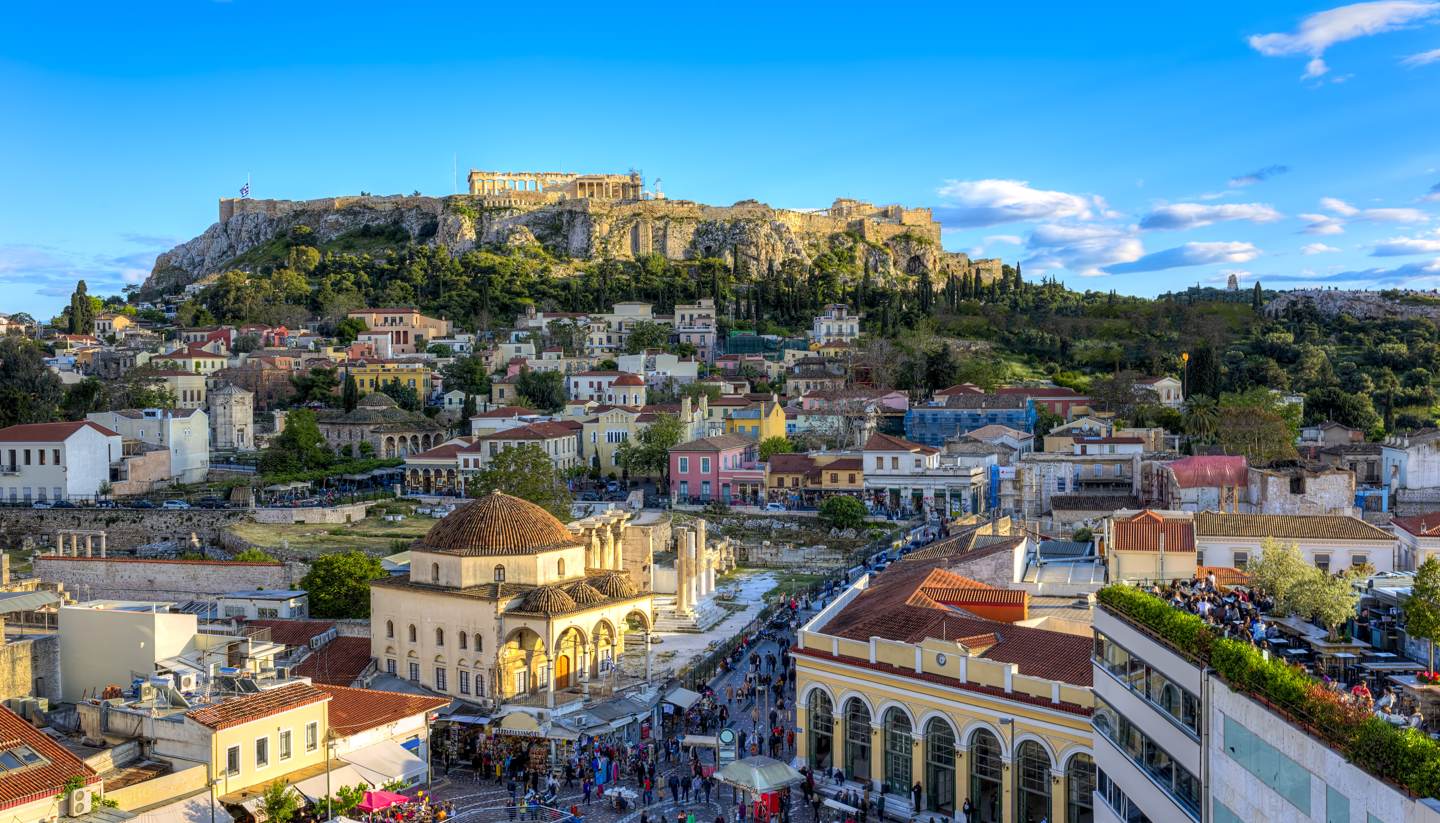
City Highlight: Athens
As the historical capital of Europe, Athens offers a stunning range of rich history, savoury cuisine, and a tangible feeling of culture
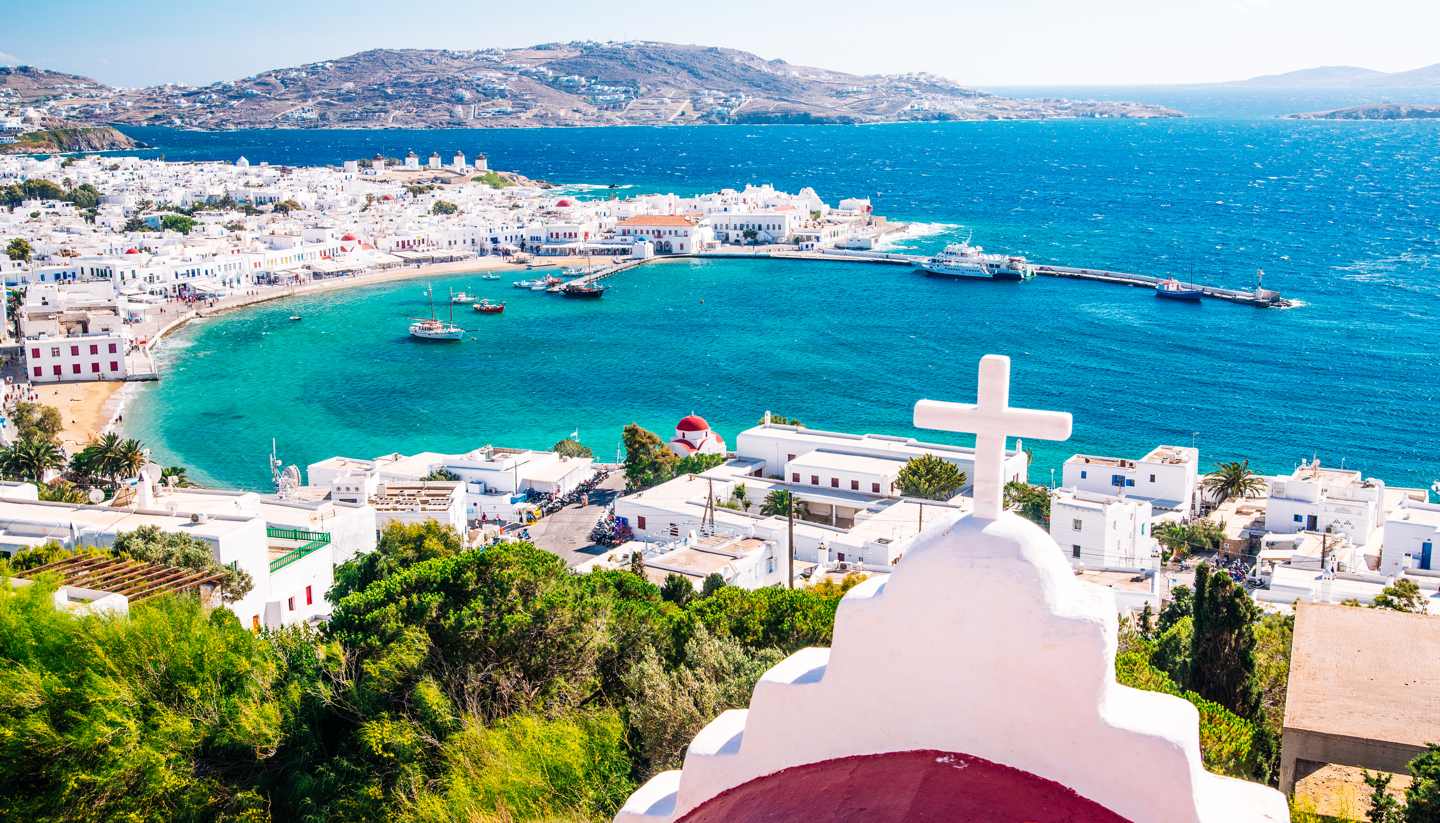
Which Greek islands are for you?
The Greek islands have it all - culture, clubbing, walking and water sports. The hardest thing is to choose which one to visit
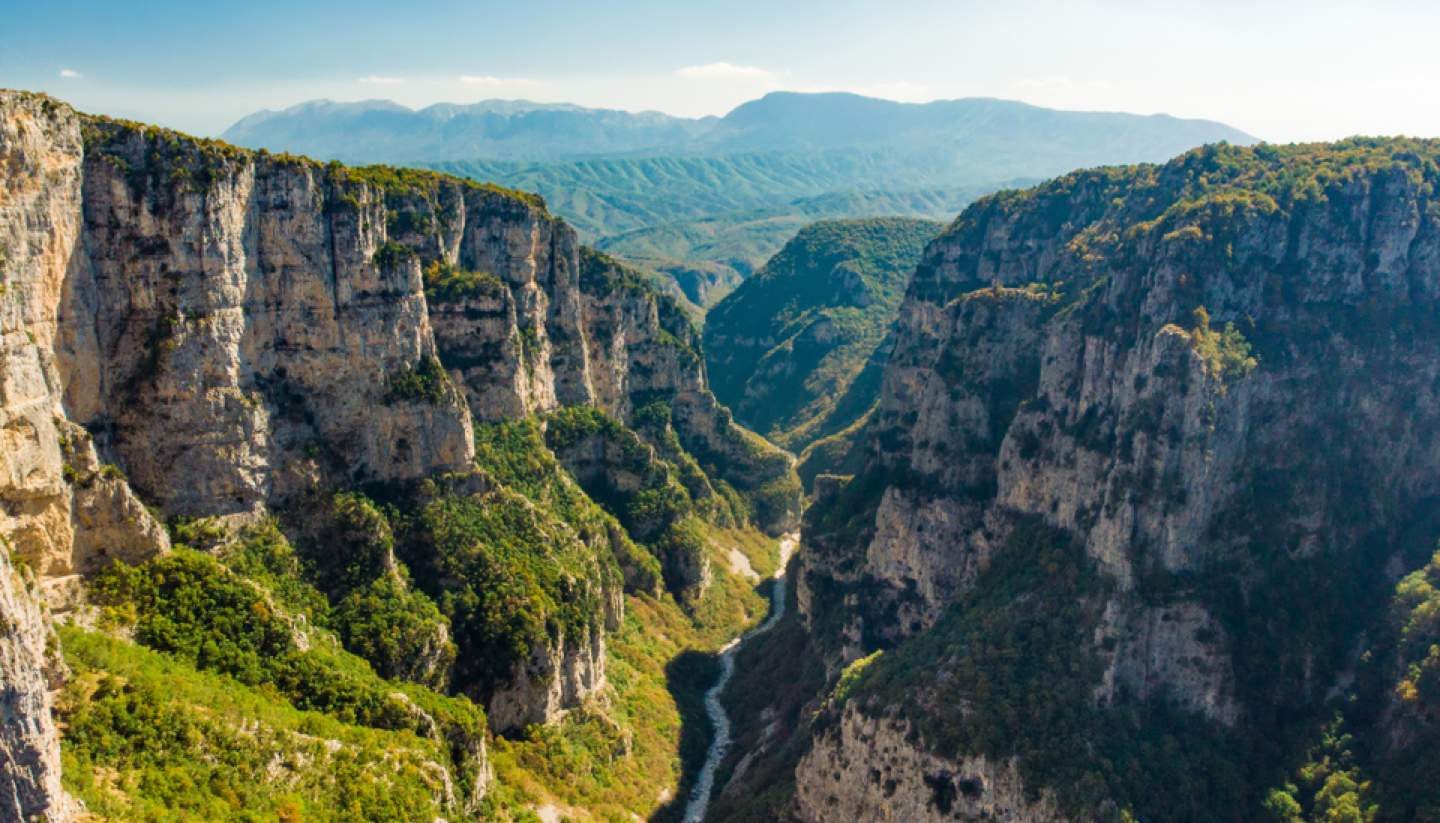

So you think you know Greece?
There’s more to Greece than sun, sea and ancient monuments. Try a farm stay that focuses on fleece-to-garment and farm-to-table experiences, writes Vivien Yap
Book a Hotel
© Columbus Travel Media Ltd. All rights reserved 2024
GUIDE TO GREECE
Organize your trip with the specialists!
Explore the most postcard-worthy Greek islands
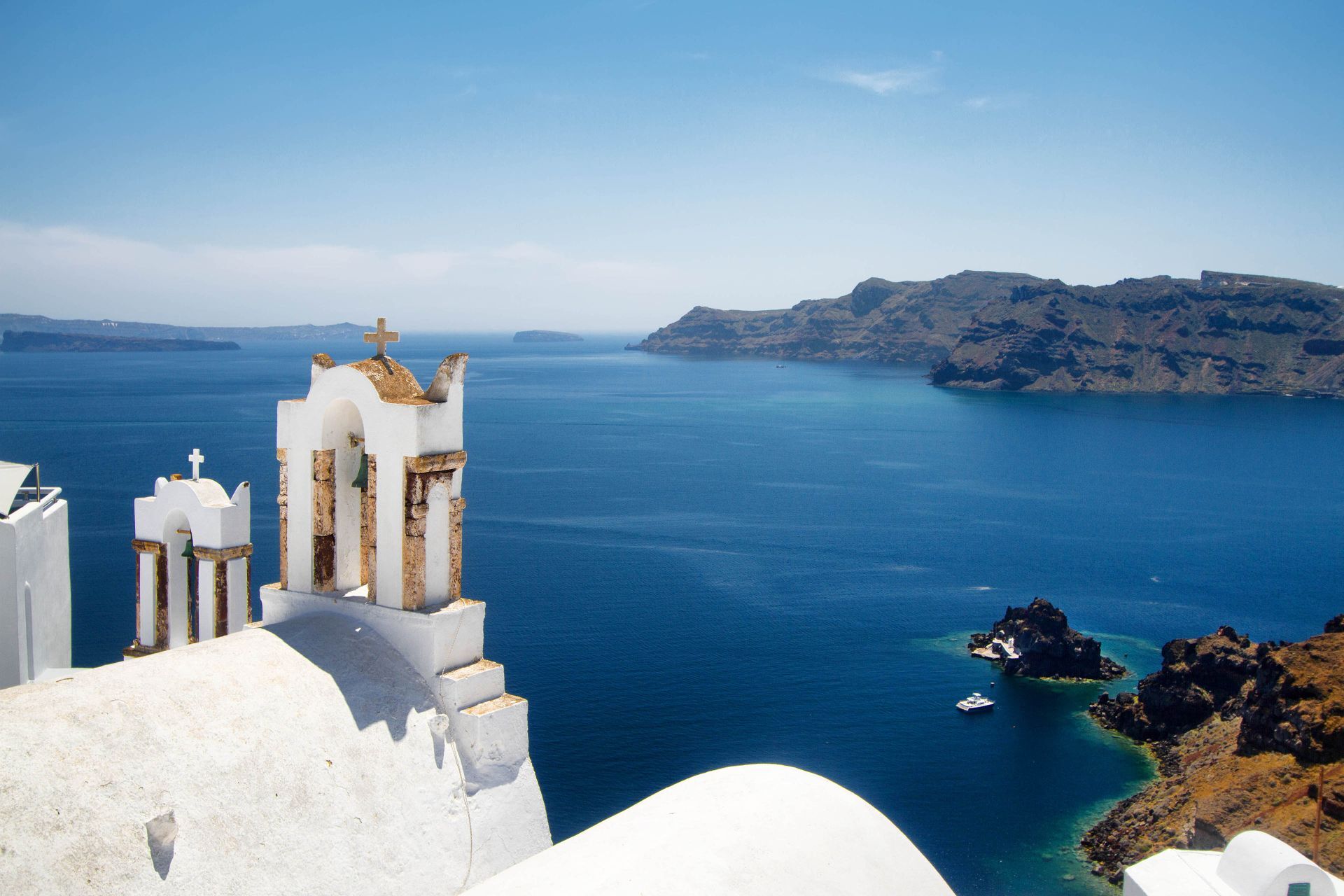
Discover the most famous Ancient Sites
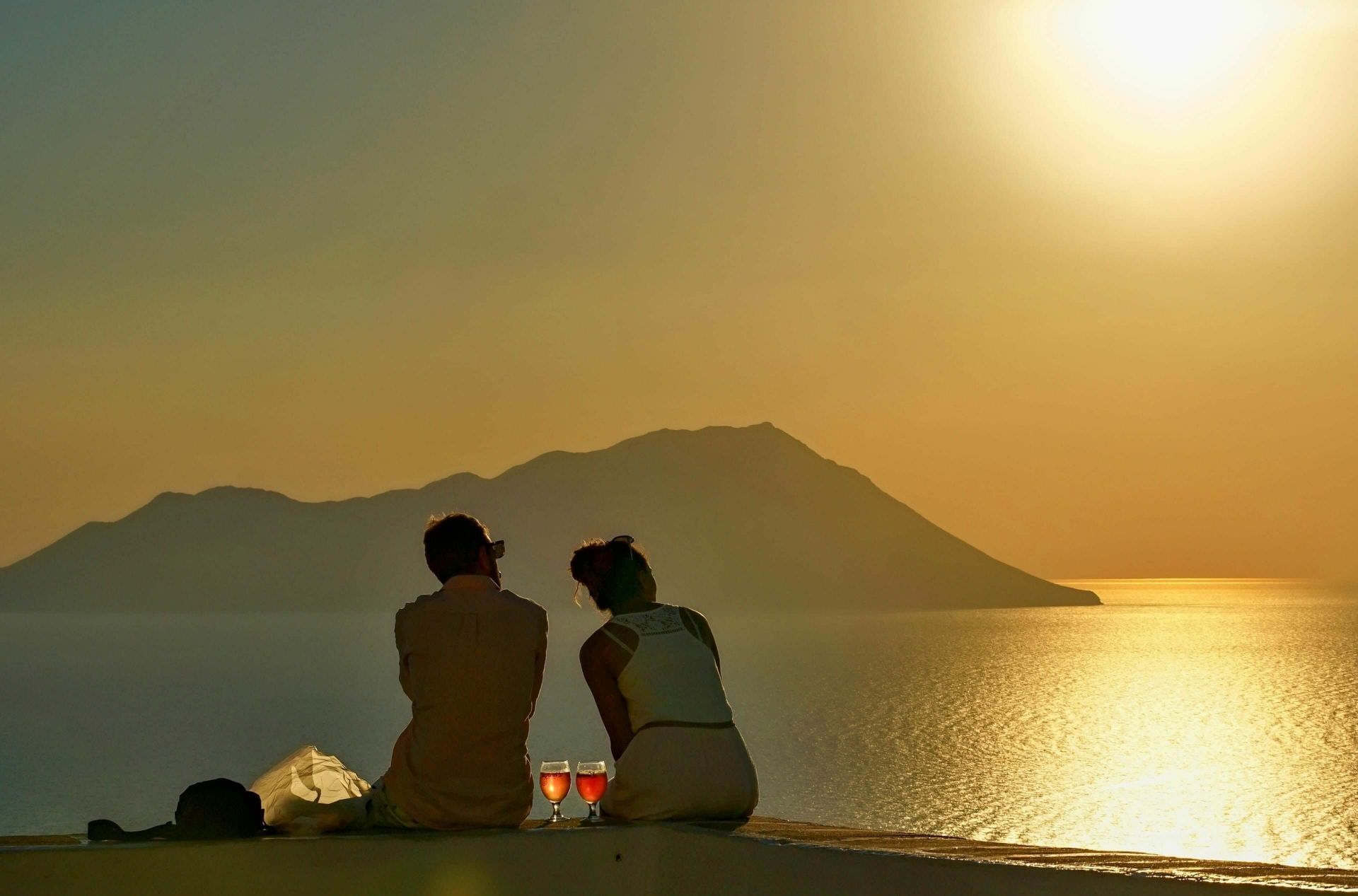
TRENDING TOPICS
Top Islands & Mainland
Island-Hopping Itineraries
- Best beaches
Selection of hotels
Join the community!

Our guide to Greece allows you to discover practical tips and facts about all your favorite destinations: Photos, must-see landmarks, beaches, villages, hotels & restaurants, tours & activities , and a lot more things to do in Greece.
DISCOVER GREECE
Find the best islands & mainland destinations for an unforgettable holiday in Greece. If you are looking for islands in the Aegean or the Ionian Sea, a mainland destination, a city, or an ancient site, we got you covered!
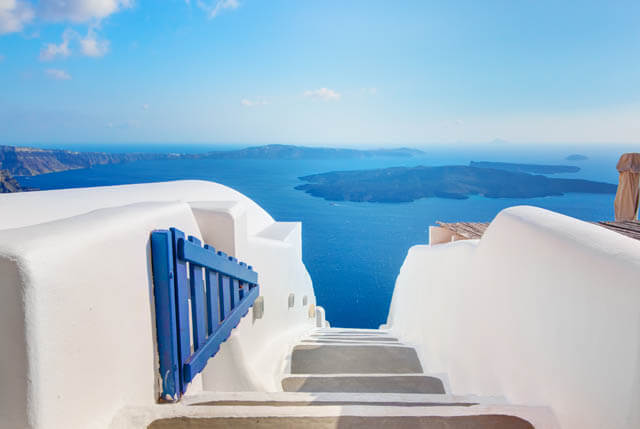
- Destinations by regions
- Famous Ancient sites
- Use our services
- Island-hopping Itineraries
- Things to do
- Ask the community
- Holidays by lifestyle
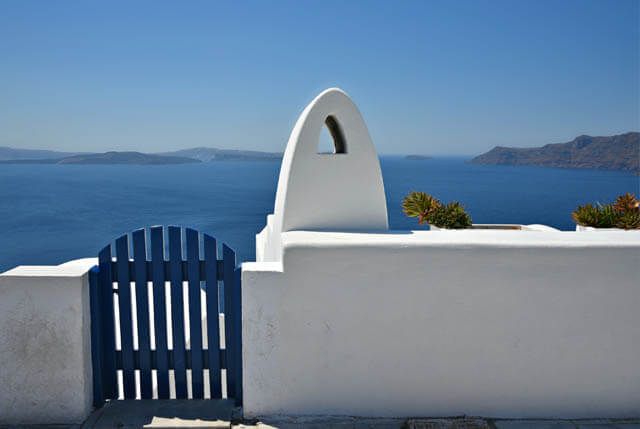
TOP PLACES TO VISIT
Cosmopolitan islands, exotic beaches, lush green landscapes, breathtaking sea views, ancient sites... we could go on forever! No matter how you imagine your dream trip in Greece, we are experts in helping you plan your trip .
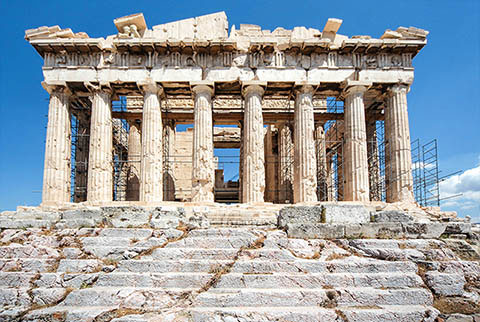
GREECE AS SEEN BY OUR COMMUNITY
Connect with an amazing group of photo enthusiasts and upload your best photos of Greece. You can also view thousands of photos in our many photo galleries . Alternatively, share your experience with us on social media using the tag #greekacom .
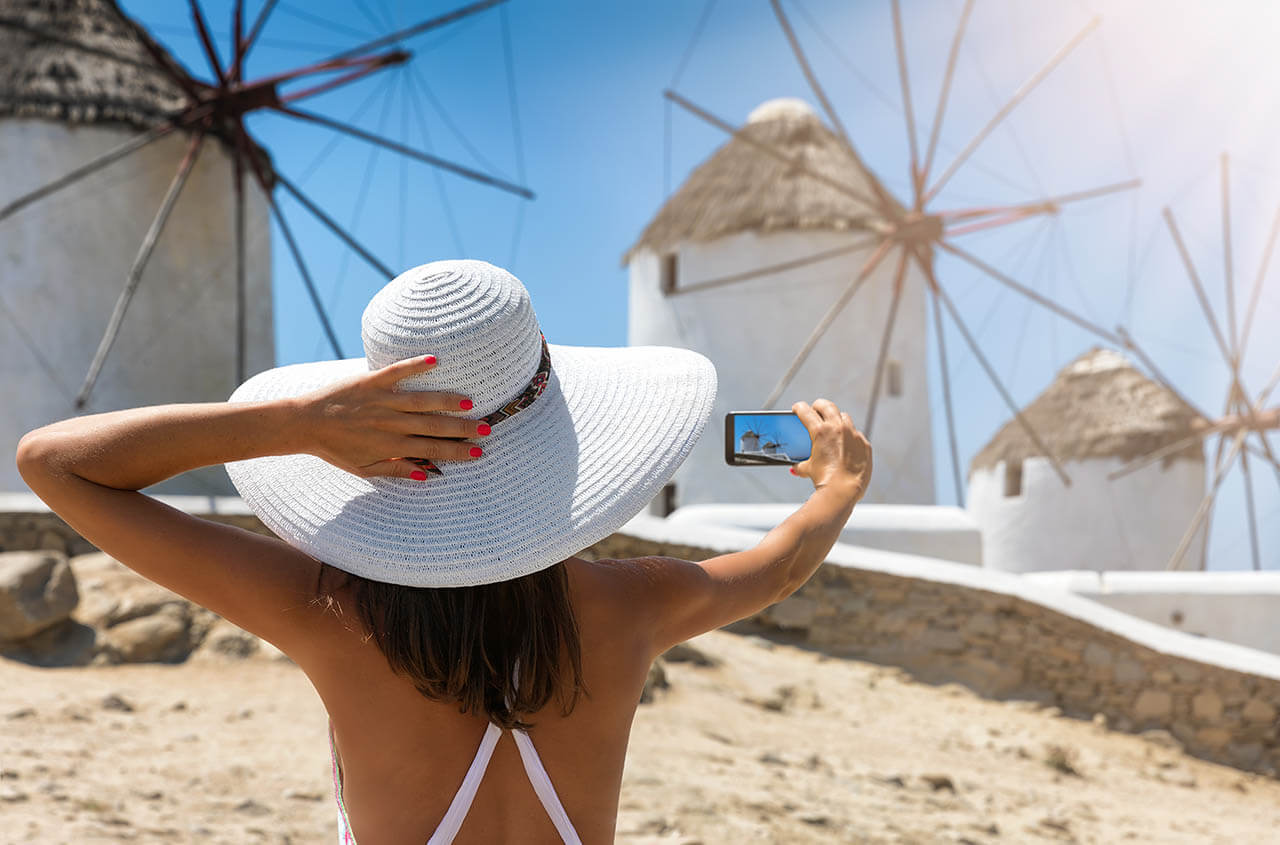
OUR LATEST ARTICLES
We've been everywhere and we share everything with you! So, we reveal all the hidden beauties, hot holiday tips and must-visit places, to experience your trip like a local!
GENERAL INFORMATION
Greece & its islands are famous for 3 things: ancient civilization, amazing landscapes, and well-established tourism.
Really beloved by people, the country is so rich in culture and beauty that it never seems to be completely explored, no matter how many times you visit it. After all, this is one of the reasons that brought it to the list of the top 20 tourist holiday destinations worldwide.
The country has become a must destination, according to the modern lifestyle. Over the last decades, it has been visited by jet-setters, including politicians, musicians, actors, artists, and other celebrities with a significant contribution to the popularity of the country. Our guide has gathered information about important aspects of the country.
ORGANIZE YOUR TRAVEL
It’s time to cross off your bucket list the travel to Greece and its best islands! It is one of the safest countries in Europe where you can lay under the hot sun, visit exotic beaches, dip in emerald waters, stroll around picturesque villages, watch magical sunsets, stay at luxurious hotels, visit worldwide famous archaeological sites… The list of things to do is never-ending!
A trip to Greece and the islands is something you should not worry about. Whatever type of traveler you are, you will not be disappointed in your trip. Whether you like beaches or mountains, winter or summer, relaxing or partying, it will be the best choice for your holidays, if you are alone, in a couple or in family. With an easy connection to Athens by ferry , the islands are the perfect places to gather precious holiday memories. Learn everything about Greece and organize your holidays: How to get there and move around, documents needed, the best time to visit, reasons to visit, and more.
ORGANIZE YOUR HOLIDAY
Book your holiday with Greeka.com, your local travel operator specialized in Greece and the Greek islands since 1999. Our services are rated . Read reviews about our services. Our guide and services won the Silver Award (2020) of the annual Tourism Awards .
Cancellation Guarantee! Book your next trip with peace of mind! Read more .

DISCOVER OUR HOLIDAY PACKAGES
Booking the perfect holiday package is the best way to enjoy your trip to its fullest and make sure you'll see all the famous islands of your bucket list! Choose one of our complete island-hopping and packages, to explore the most beautiful Greek islands carefree. What's better than enjoying your trip without minding the details?
WHAT PEOPLE SAY ABOUT US
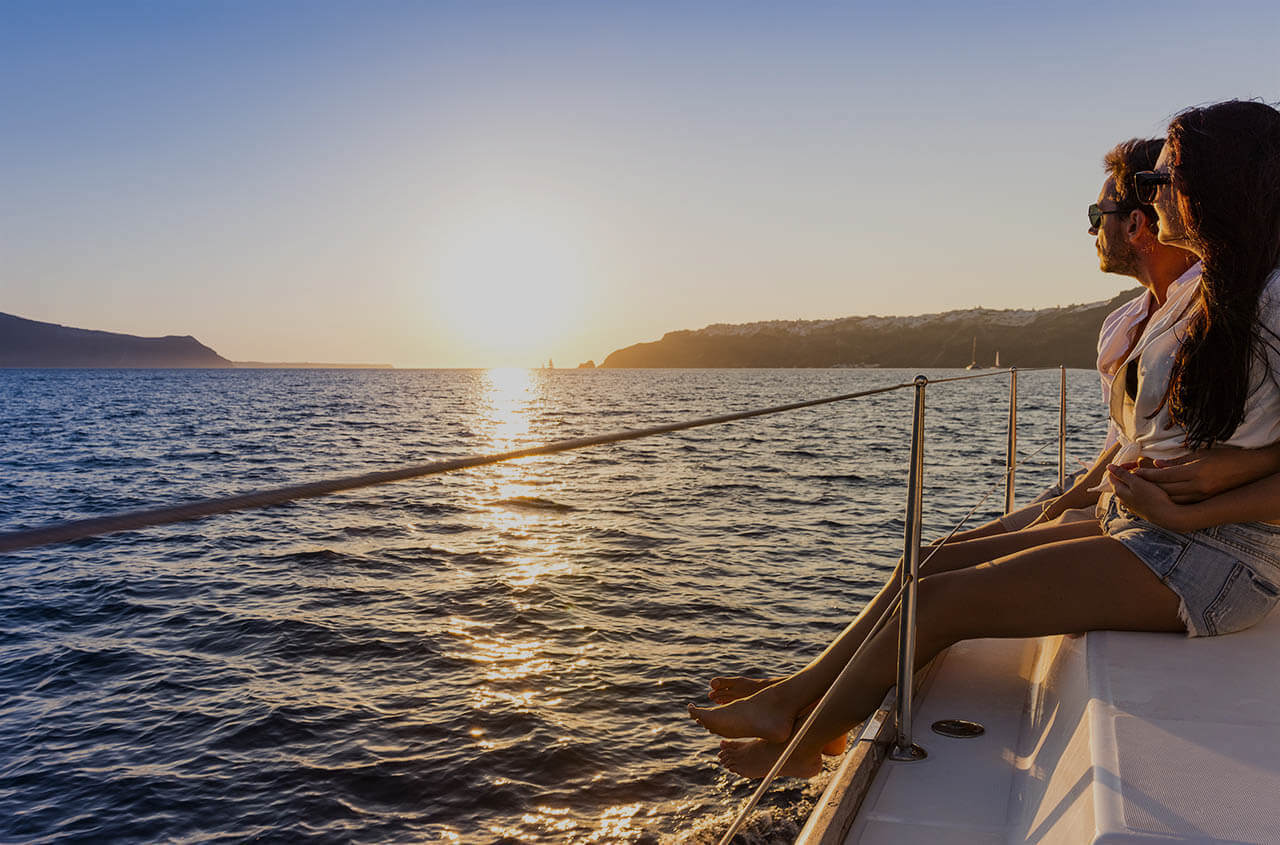
Excellent service
We booked all our Greek Island ferry tickets through Greeka.com. What a fantastic professional service. The tickets where even couriered to my office is Johannesburg, South Africa. They kep t me up to date on any changes. All when smoothly like clockwork. Thank you for an amazing service. Regards Raymond Roos
Everything was perfect: easy booking and fasts delivery! I recommend Greeka.com!!!
Sarah_Rossi2003
Excellent service before during and after the trip
You have a personal contact near you to solve your doubts and problems anytime. Fast and great service.
spastorquia
Had ordered tickets on line and picked up all tickets with no problems
- Share this page on Facebook
- Share this page on Twitter
- Copy the URL of this page
Sign in to the Greeka Community.
Upload your best photos of Greece and interact with other Greeka members!
- BUCKET LISTS
- TRIP FINDER
- DESTINATIONS
- 48HR GUIDES
- EXPERIENCES

- DESTINATIONS South Carolina 3 Ways to Get Wet and Wild in Myrtle Beach BY REGION South America Central America Caribbean Africa Asia Europe South Pacific Middle East North America Antarctica View All POPULAR Paris Buenos Aires Chile Miami Canada Germany United States Thailand Chicago London New York City Australia
- EXPERIENCES World Wonders 14 Landmarks That Should Be Considered World Wonders BY EXPERIENCE Luxury Travel Couples Retreat Family Vacation Beaches Culinary Travel Cultural Experience Yolo Winter Vacations Mancations Adventures The Great Outdoors Girlfriend Getaways View All POPULAR Cruising Gear / Gadgets Weird & Wacky Scuba Diving Skiing Hiking World Wonders Safari
- TRIP FINDER Peruvian Amazon Cruise BY REGION South America Central America Caribbean Africa Asia Europe South Pacific Middle East North America Antarctica View All POPULAR Colors of Morocco Pure Kenya Costa Rica Adventure Flavors of Colombia Regal London Vibrant India Secluded Zanzibar Gorillas of Rwanda
- Explore Bucket Lists
- View My Bucket Lists
- View Following Bucket Lists
- View Contributing to Lists
Greece Travel Guide

A land of myths, legends, beautiful coasts, and ancient remnants of its golden age and earlier civilizations, Greece is far more than holiday islands, ouzo, and sculptures. As one of the world’s top 20 travel destinations, its mainland and islands shimmer in the summer sun and echo to the sound of traditional Greek music. Crammed with attractions and things to do, Greece still sees 90 percent of its high season visitors from Europe, but is fast becoming a major destination for travel aficionados across the world.
Its premier attractions are world famous for their association with the Minoan, Mycenaean, and Ancient Greek periods, immortalized in the works of great poets, playwrights, and philosophers almost 2,000 years ago. Exploring Knossos on Crete , Mycenae in the Peloponnese, and the treasures of Athens are all-time favorites with visitors. The country’s not all ancient ruins, however, and modern draws such as great beaches, fun water sports, adventure and outdoor activities, and waterside tavernas all have their place in the perfect Greek getaway.
The Greek people are among the worlds most welcoming, friendly and helpful, dispensing their renowned hospitality to all with open arms and hearts. Whether you’re staying in a five-star resort or a locally-owned beachside b & b with a few rooms to rent, you’ll be immersed in the community in no time. Eating out and accommodation are both a good value for the money.
There’s a huge choice of destinations spread across the mainland and the Greek islands , catering for every style of vacation, from beach-hopping to history buffs. Travel between the islands is easy by ferry boat from the mainland ports, and most historic sites are centered in the immediate area of a prominent center of town.
The 3,000-year old Mycenae and Tiryns are set within an easy drive of Epidaurus’s magnificent theater and the Sanctuary of Asclepios, and Delphi and Olympia are within a day trip from Athens . Ancient Mount Athos and its crow’s-nest monasteries, perched on soaring cliff-tops, lie in the north of the country on the Chalkidiki peninsula.
Touring the many attractions Greece has to offer is best done by road or ferry, as rail services are sparse. Renting a car gives visitors the freedom to drive to remote sites since the local bus only stops at the nearest village, a long, hot walk from the landmarks. Aside from the twisting mountain roads, driving doesn’t present many problems, although in rural areas, domestic animals such as donkeys and goats may consider the roads their exclusive property! Bus travel is relatively inexpensive and, except in remote rural areas, is comfortable and air-conditioned. Ferries connect all the main islands with Piraeus, making for easy, scenic trips.
- The iconic 5th century BC Parthenon in Athens
- Knossos archeological site on Crete
- Delphi, home of the famous Oracle and Sanctuary of Apollo
- Volcanic Santorini Island and its whitewashed villages
- Mykonos for its vibrant nightlife and idyllic beaches
- Mount Olympus, home of the Gods
- The Byzantine ruins at Mystras
- Things To Do
- Attractions
- Food And Restaurants
- Shopping And Leisure
- Transportation
- Travel Tips
- Visas And Vaccinations
- History And Culture
- Festivals And Events
World Wonders
These are the most peaceful countries on the planet, the great outdoors, deserts in bloom: 6 spots for springtime wildflower watching, how to plan a luxury safari to africa, british columbia, yoho national park is the most incredible place you've never heard of.
- Editorial Guidelines
- Submissions
The source for adventure tourism and experiential travel guides.

19 Top-Rated Tourist Attractions in Greece
Written by Michael Law and Jane Foster Updated Sep 29, 2023
Home to some of the world's most important historical sites, along with some 6,000 islands, Greece is known for its natural beauty and fascinating culture. Ancient archaeological sites, cliffs tumbling into sparkling blue water, sand and pebble beaches, and a balmy Mediterranean climate make Greece one of Europe's prime places to visit for tourists .
Besides Athens, some of the top things to see on the mainland include Ancient Delphi and the monasteries of Meteora. But most people come here to catch a ferry or a flight to the islands: Santorini, Mykonos, Zakynthos, Corfu, and Crete are the most popular. Plan your trip with our list of the top attractions in Greece.
1. Acropolis, Athens
2. acropolis museum, athens, 3. santorini, 6. the towns and beaches of crete, 8. metéora monasteries, 9. rhodes town, 10. zákynthos, 11. samaria gorge, 12. nafplio, 13. thessaloniki, 14. corinth canal, 15. mount olympus, 16. palace of knossos, 17. mycenae, 21. víkos gorge.
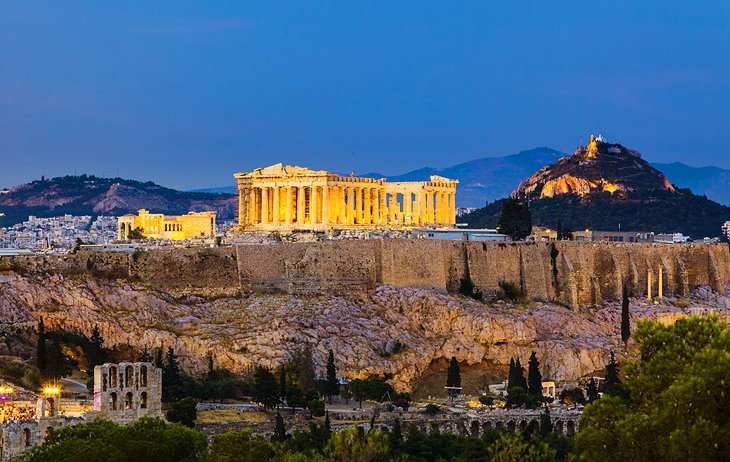
Considered the symbol of Athens and Greece, and indeed of Western civilization, the Acropolis is a rocky mound rising in the heart of modern Athens, crowned by three magnificent temples dating from the 5th century BC. The best known and most distinctive is the Parthenon , originally made up of 58 columns supporting a roof and decorated by ornate pediments and a frieze.
Although the Parthenon steals the show, other highlights on the Acropolis hilltop are also spectacular. The ornate Temple of Athena Nike, the Porch of the Caryatids, and the Propylaea are not to be missed. Tear yourself away from the historic sights and wander over to the edge, panoramic views of the seven historical hills of Athens and the city are laid out below you.
Skirting the foot of the Acropolis and connecting it to the city's other major ancient attractions — the Ancient Agora , the Roman Forum , Kerameikos , and the Temple of Olympian Zeus — is a 2.5-kilometer walking path known as the Archaeological Promenade .
Author's Tips: For a fantastic nighttime view of the Acropolis, make your way to one of the rooftop restaurant patios on the pedestrian-only Apostolou Pavlou . Plan on getting to the Acropolis early to avoid ticket lineups, bus tours, crowds, and the heat if you are visiting in summer.
- Visiting the Acropolis in Athens: The Essential Guide
- Top-Rated Attractions & Things to Do in Athens
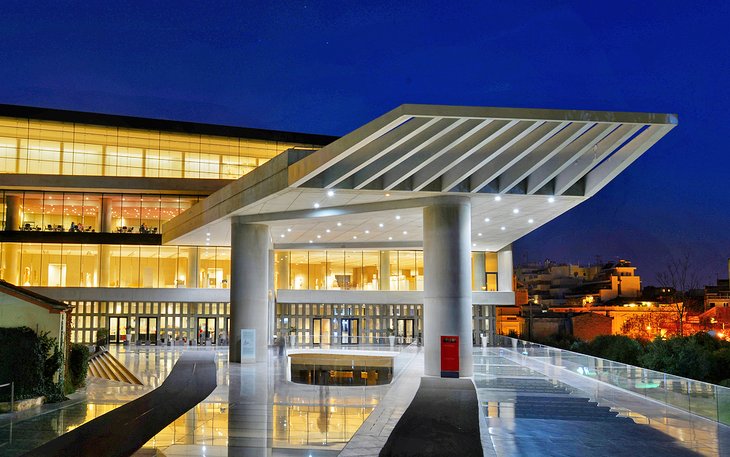
The Acropolis Museum is one of Athens' most-visited tourist attractions. Designed by Swiss architect Bernard Tschumi, it is an ultra-modern glass and steel structure with light and airy exhibition spaces, built specifically to display ancient finds from the Acropolis.
Top things to see here include the 6th-century-BC Moschophoros (statue of a young man carrying a calf on his shoulders), the Caryatids (sculptures of female figures that held up the Erechtheion), and the highly controversial Parthenon marbles . From the museum's cafe-restaurant terrace, you can enjoy amazing views of the Acropolis itself.
- Read More: Top-Rated Attractions & Things to Do in Athens
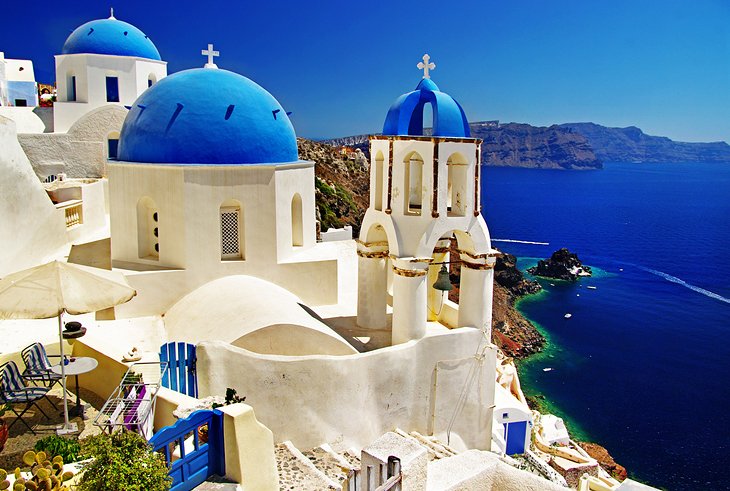
Stunning Santorini is the most dramatic of all the Greek isles. It is best known for the west coast cliff-top towns of Fira and Oia , which appear to hang over a deep, blue sea-filled caldera. Made up of typical Cycladic whitewashed cubic buildings, many of which have been converted into boutique hotels with infinity pools, both Fira and Oia are considered romantic destinations, popular for weddings and honeymoons.
Things to do in Santorini include sunbathing and swimming at the black volcanic-sand beaches on the south and east coasts and visiting the archaeological site of Akrotiri , an Ancient Minoan settlement buried below lava following the volcanic eruption that created the caldera, some 3,600 years ago. The island has an airport and is served by ferries and catamarans from Athens' port, Piraeus.
- Read More: Top-Rated Tourist Attractions on Santorini
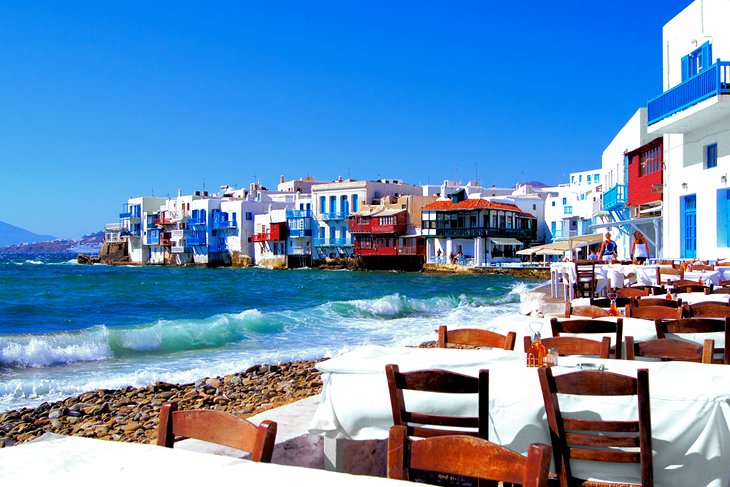
Many people consider Greece's most glamorous island destination to be Mykonos. After-dark activities center on Mykonos Town, noted for its chic boutique hotels, classy seafood restaurants, and live music venues. Other attractions include Paraportiani (a whitewashed church in Mykonos Town) and numerous sandy beaches along the island's south coast (served both by bus and taxi-boat from Mykonos Town).
The island is particularly popular with international celebrities. Mykonos has an airport and is connected by ferry and catamaran to Athens' port, Piraeus, and Rafina.
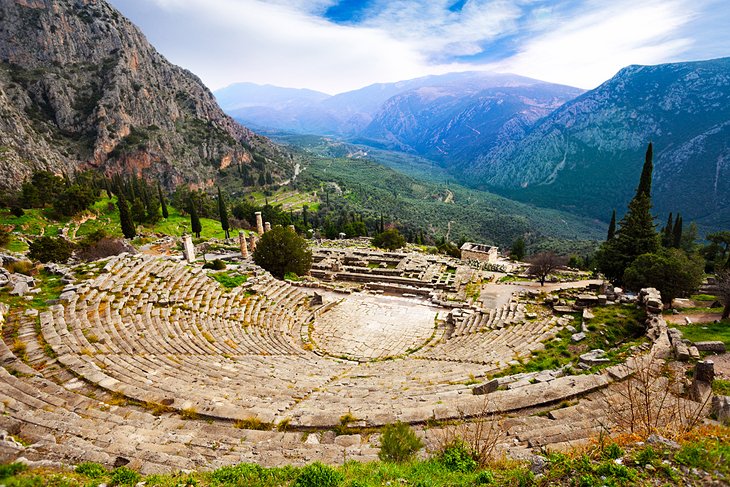
On the Greek mainland, Delphi is a UNESCO World Heritage site. Built on the lower slopes of Mount Parnassus, overlooking a dramatic ravine, the site was sacred to the ancients, who came here on pilgrimages to worship Apollo (god of light, prophecy, music, and healing) and to ask advice from the mythical Oracle.
It is made up of the crumbling ruins of numerous temples, a theater, and a stadium, dating from between the 8th century BC and the 2nd century AD. Nearby, stands the Delphi Archaeological Museum , displaying an impressive collection of finds from the site. Delphi lies 180 kilometers northwest of Athens.
Delphi is about a 2.5-hour drive from Athens. It can easily be done as an overnight trip from the city, or even a day trip if you don't mind a long day.
- Read More: Visiting Delphi from Athens: Highlights, Tips & Tours
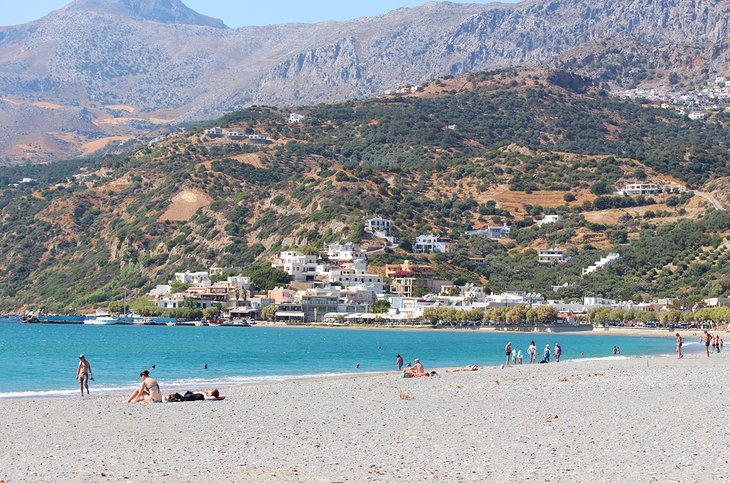
The massive island of Crete is one of the most popular vacation destinations in Greece. Blessed with some of the best beaches in Greece , the island draws visitors from around the world. Some of the most popular beaches on Crete range from small arcs of sand backed by restaurants and promenades to wide-open natural stretches lapped by incredibly clear waters and endless views across the sea.
But Crete is not all about beaches. It has its fair share of notable archeological sites, including the impressive Palace of Knossos, located near the pleasant city of Heraklion . The historical city of Chania and the laid-back town of Agios Nikolaos have wonderful old waterfront areas perfect for spending long afternoons on a café terrace getting lost in the views.
Get away from the bigger communities, and head to smaller towns like Plakias or Matala on Crete's south coast to find more remote beaches and beautiful mountainous backdrops.
If archeological sites, beaches, and historical towns weren't enough, the island has one of the most impressive hikes in the world : the Samaria Gorge.
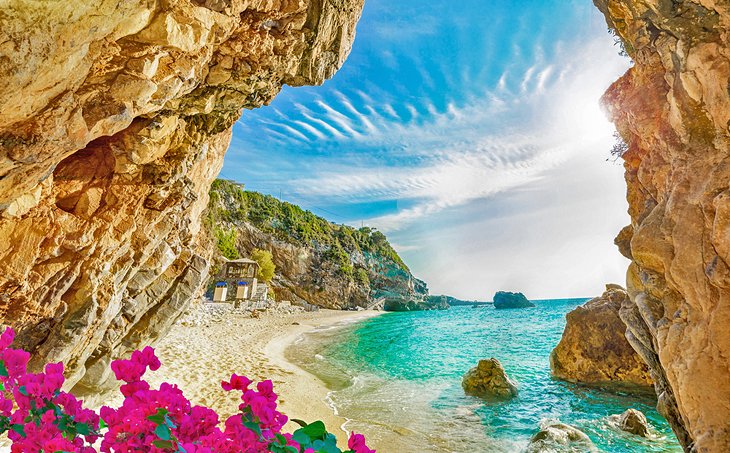
One of Greece's top tourist destinations, Corfu sits in the Ionian Sea off the west coast of the mainland. The capital, Corfu Town , is a UNESCO World Heritage site, thanks to its elegant Italianate architecture — it was ruled by the Venetians for several centuries. Explore its romantic pedestrian-only streets to discover two 16th-century fortresses and the arcaded Liston, lined by old-fashioned cafes.
Away from the main town, the island is lushly beautiful, with rugged limestone rocks tumbling into the sea in its north and velvety green hills in its south. The most popular beach area is Paleokastritsa , on the west coast, about 25 kilometers from Corfu Town. Here, you'll find a collection of deep, curving bays sheltering sand and pebble beaches stretching into a clear blue sea. Corfu is served by an airport and ferries from Igoumenitsa and Patras on the Greek mainland. In summer, ferries sailing from Ancona and Venice also stop here.
- Read More: Top-Rated Tourist Attractions & Things to Do on Corfu Island
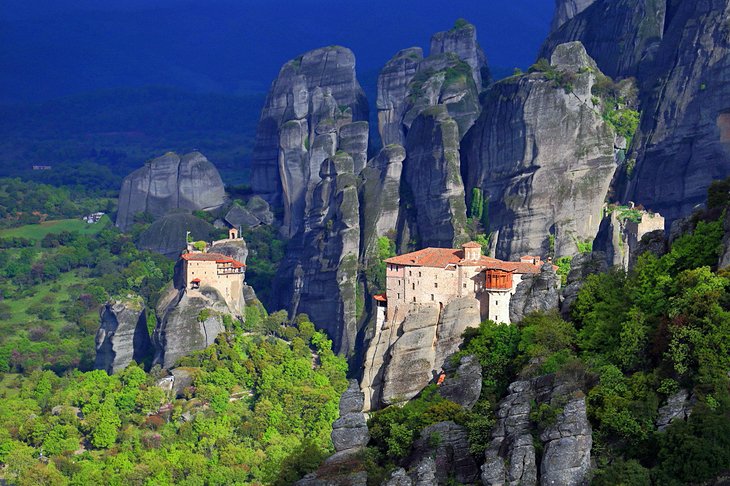
One of the most unusual things to see in Greece has to be the Thessaly Plain, where bizarre rocky outcrops are capped by the centuries-old monasteries of Metéora. On the UNESCO World Heritage list, six of the monasteries are open to the public. You need to climb up several flights of stone steps carved into the rocks to reach each monastery, and inside, you'll find flickering candles, religious icons, Byzantine frescoes, and burning incense.
Opening hours vary, and to see all six monasteries, you need to spend at least one day in the area. The nearest town is Kalambaka . Consider staying here, as it's a pleasant and relaxed place to visit, with small hotels and family-run restaurants serving traditional fare.
- Read More: Top-Rated Tourist Attractions in Metéora
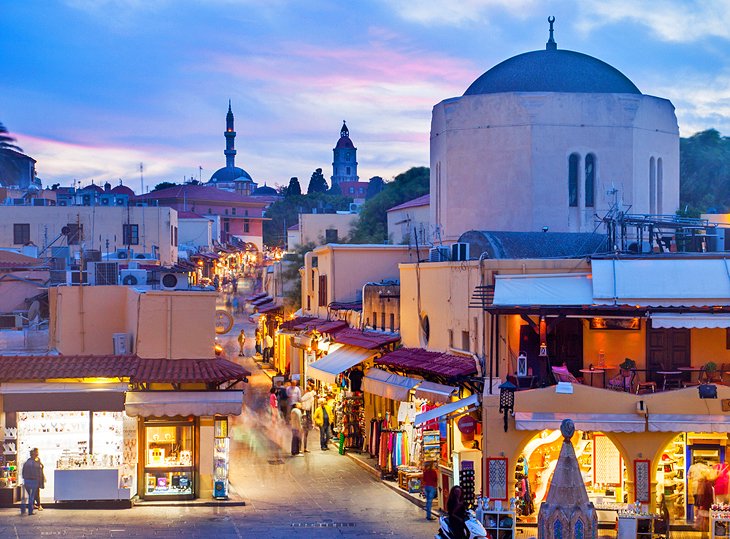
Lying on the Aegean Sea, close to Turkey, Rhodes is the largest of the Dodecanese islands. Its capital, UNESCO-listed Rhodes Town, is one of Greece's top tourist destinations. It is enclosed by an impressive fortification system, including monumental towers and gates built by the Knights of St. John after they took control of the island in the 14th century.
The car-free cobbled streets of the old town are a joy to explore on foot. Nearby attractions include the pretty hillside coastal town of Lindos, and Marmaris on the Turkish coast, which can be visited by excursion boat. Rhodes is served by an airport, as well as regular ferries from Athens' port, Piraeus.
- Read More: Top-Rated Tourist Attractions in Rhodes Town
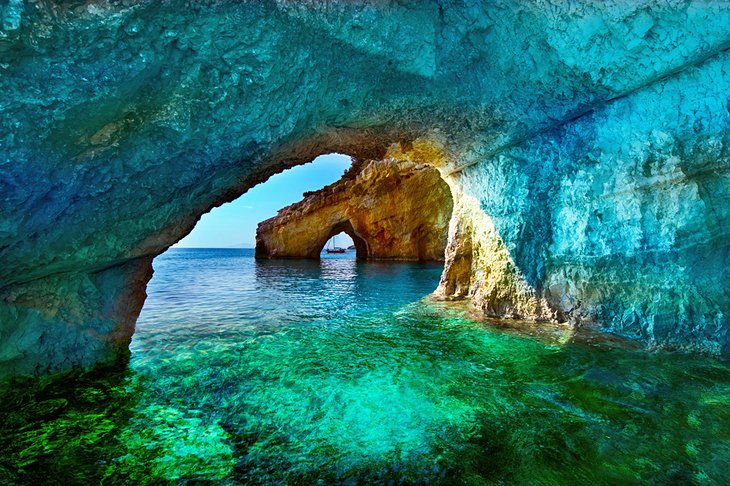
Home to gorgeous scenery both above and under the sea surrounding it, Zákynthos (Zante) island is another top tourist destination in Greece. It is also easy to access, located just 16 kilometers off Peloponnese's west coast in the Ionian Sea.
Two of the biggest boasts on this geographically intriguing island are its pebble and sand beaches — Shipwreck Beach is the most famous — and stunning sea caves like the Blue Caves , off the island's northern tip. Inside, the sparkling water reflects the color of the blue sky on the cave walls to create a magical glow. The Blue Caves are only one of the many watery attractions around this island. There is also excellent snorkeling and scuba diving.
- Read More: Top Rated Tourist Attractions & Things to Do in Zakynthos
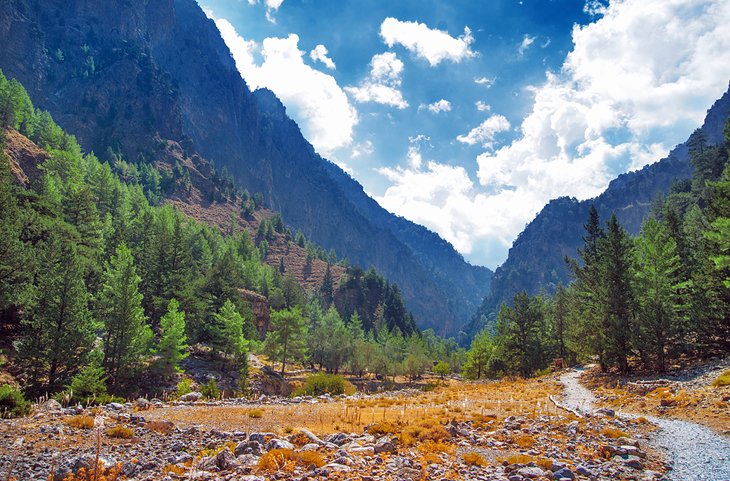
On the island of Crete, the Samaria Gorge is a top attraction for lovers of the great outdoors. Measuring 16 kilometers in length and, at its narrowest point, only four meters wide, it runs from Omalos (1,250 meters) in the White Mountains down to Agia Roumeli , on the Libyan Sea.
Depending on your level of fitness, it will take five to seven hours to walk. It is steep in parts and rocky, so you should wear good hiking shoes and carry plenty of water. The gorge lies within the Samaria National Park , and is on the UNESCO tentative list. Through summer, organized tours depart from Chania and Réthymnon .
- Read More: Top-Rated Tourist Attractions in Chania
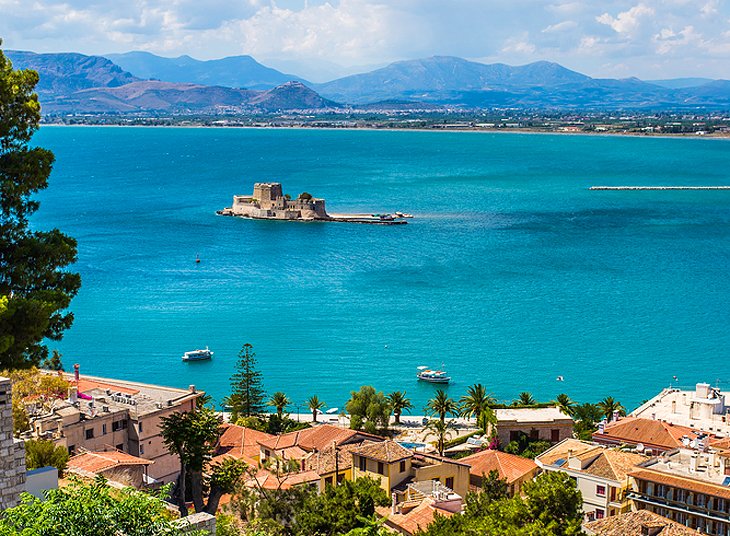
Often cited as Greece's most beautiful city, Nafplio is a popular weekend destination for wealthy Athenians. Built on a small peninsular on the east coast of the Peloponnese, it became the first capital of modern Greece in 1828 before Athens took over in 1834.
Take an afternoon or a day to wander through the old town, this car-free area is filled with Neoclassical mansions and proud churches and overlooked by the 18th-century Palamidi Fortress . Nearby attractions include Tiryns , Epidaurus Theater , and Ancient Corinth .
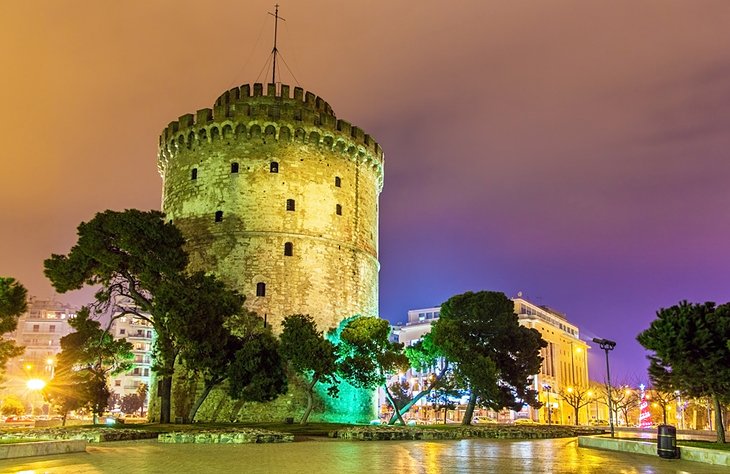
Thessaloniki doesn't seem to mind not being on most people's touring list. The locals are happy to have the place and all its sights to themselves. The main sightseeing attractions are its UNESCO-listed Byzantine churches , but worth investigating are several Roman monuments (including the Triumphal Arch of Galerius and the 4th-century Rotunda ), the 15th-century White Tower on the seafront, and an excellent Byzantine Museum .
Overlooking the Aegean Sea in northern Greece, Thessaloniki (Salonica) is the country's second biggest city after Athens. Founded in 316 BC due to its position close to both Bulgaria and Turkey, it has always been a crossroads of various cultures and religions.
One of the top day trips from Thessaloniki is to Mount Olympus , the highest mountain in Greece. Only 80 kilometers away on good roads, this impressive natural sight is well worth visiting. The most popular hiking trails depart from near the town of Prionia.
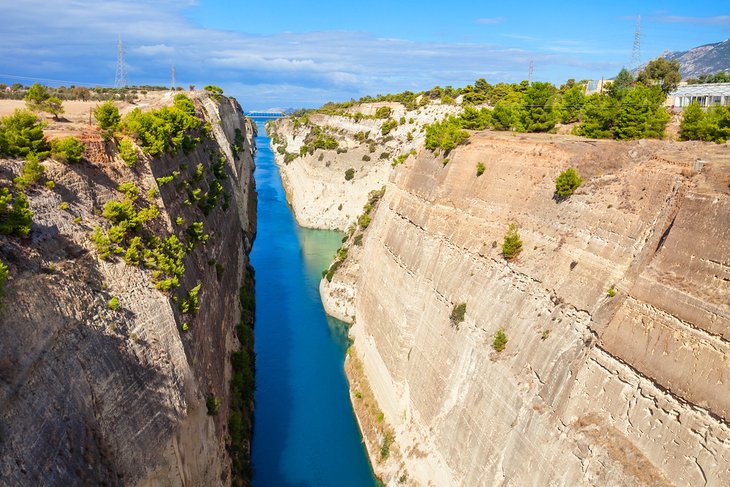
As you drive along the relatively flat highway 8 approaching the Peloponnese Peninsula, be sure to stop in at the lookout over the Corinth Canal. This canal, first dreamed about and attempted in 1 CE, was finally brought to fruition in 1883. Unfortunately for the builders, the canal was never particularly profitable or successful.
Park your car and walk out onto the bridge and give some thought as to how the original builders managed to dig down through the solid rock to carve out the canal.
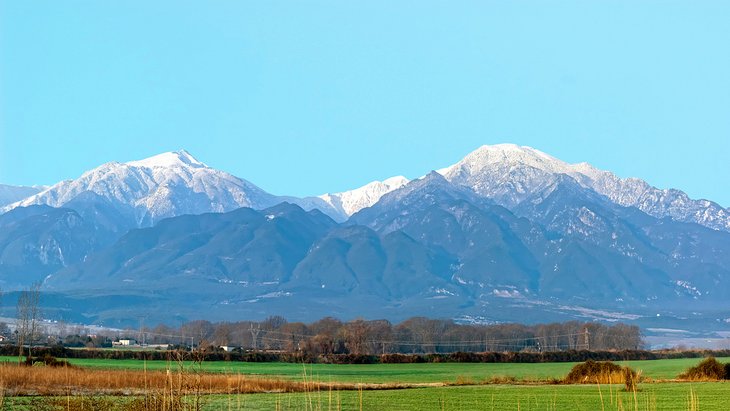
Mount Olympus, famous home of the god Zeus, lies about halfway between Athens and Thessaloniki. Towering over the surrounding countryside at an impressive 2,918 meters, this mountain is a top recreation destination in the summer.
Three hiking trails lead to its summit, although most people take the two-day, one-night Priona trail. From the top, the views are unparalleled and well worth the effort expended to get here. You do not need any special equipment to do this hike, just a good assortment of clothing, sturdy hiking boots, and a taste for adventure.
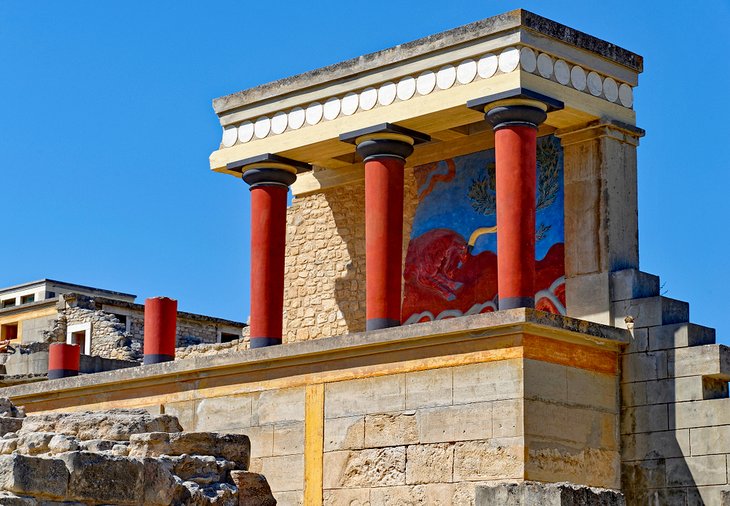
One of the top archeological sites here in Greece, the Palace of Knossos is a must-see when visiting Crete. The site dates from the Late Minoan time period and has been very well restored. Although the standing buildings give you a real sense of what this place once looked like, as with many archeological sites in Greece, some portions require a bit of imagination.
The site is well laid out, with walking trails that wind their way past the main buildings and plazas. Be sure to check out the colorful paintings on some of the major structures near the end of the walkway.
The Palace of Knossos is located just outside of Heraklion , one of the main gateways to Crete. Tours can be easily arranged.
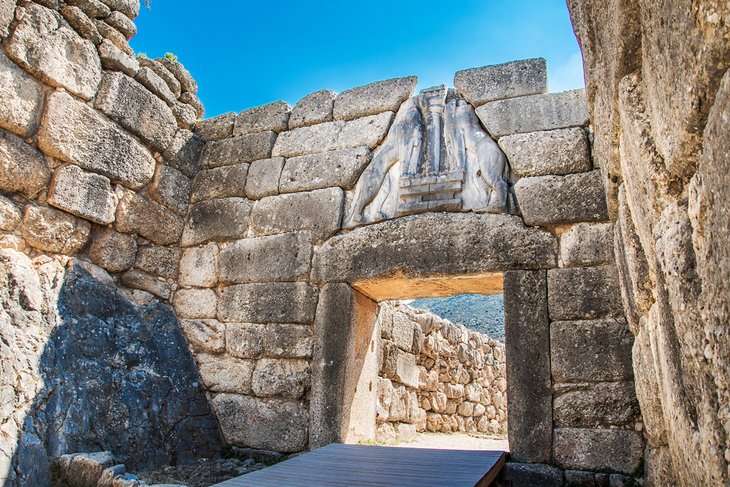
The impressive citadel of Mycenae is one of the top archeological sites south of Athens and well worth a visit for those interested in Greek history. Set impressively on a hill, Mycenae dates from around 1350 BCE, the peak of the Mycenaean civilization.
One of the key sights at Mycenae is the impressive Lion Gate. Set into the side of the hill, the gate is composed of perfectly inlaid stones over a rectangular doorway. This is the site where the famous gold mask was found by the explorer Heinrich Schliemann in the late 19th century. If the sun is getting to you, step inside the impressively domed Treasury of Atreus and enjoy some shade.
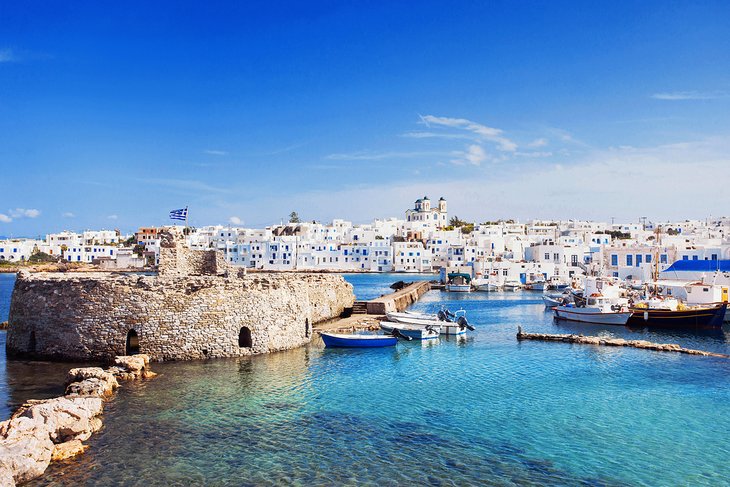
The island of Paros is sometimes overlooked by ferry travelers exploring the Cyclades, intent on visiting the more popular Santorini. However, this is a mistake. This laid-back island has everything that the busier islands offer farther south and north. The same whitewashed towns perched on the waterfront with patios full of laughing and smiling patrons are what you'll find here, but without the crowds.
Paros also has a fine selection of beaches and historical sites to explore. It's also a good spot to go if you are watching your costs; accommodation is cheaper here.
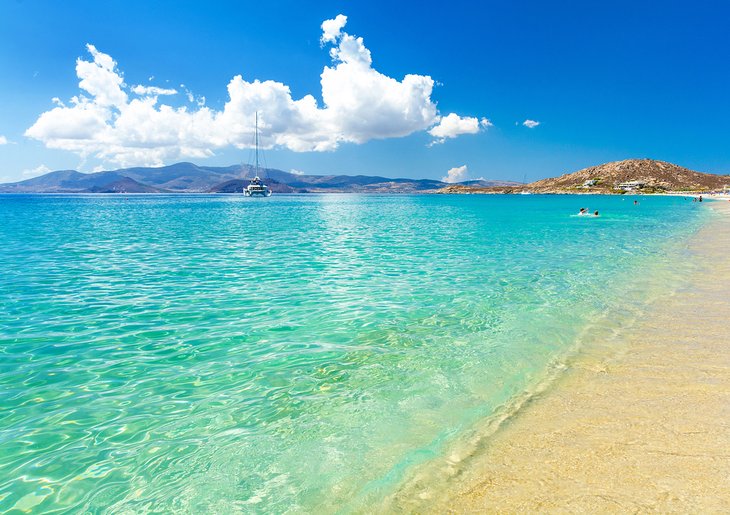
Another popular destination, Naxos is one of the largest Cycladic islands. This huge island is a fun place to explore, and with fewer tourists than places like Santorini or Mykonos. A couple of must-sees when exploring include the small towns of Filoti, Halki, and Apiranthos.
Take some time to wander through the main town, Chora of Naxos, especially the Kastro district. Here, you'll find a variety of shops selling all manner of souvenirs, along with cute restaurants with inviting patios.
If you want to hit the beach, Naxos does not disappoint. A couple to check out include Paradise Beach, Agia Anna, or Agios Prokopios. If you are into kiteboarding, the windswept Mikri Vigla is the place to go.
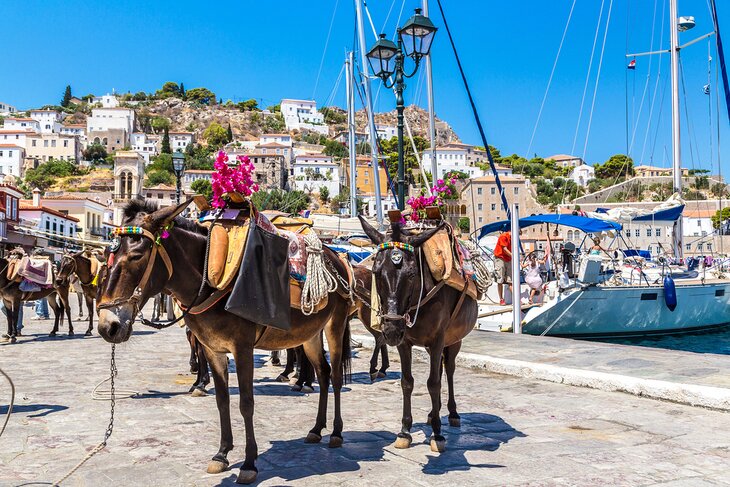
For a taste of quintessential Greece that's only a two-hour ferry ride from Athens , consider the delightful island of Hydra. Home to old mansions and white-washed houses adorned with bougainvillea and cobblestone streets the town has been attracting the creative set for decades.
The island is wonderfully car-free so walking is a pleasure, stroll the busy port area and be sure to check out the early 19th-century cannons along the waterfront. Should you need to get anywhere on the island, donkeys are the main mode of transport on land, and water taxis will be more than willing to take you to a secluded beach lapped by crystal-clear water.
Cat lovers will especially enjoy Hydra, it's known for its feline residents who are generally very friendly and always open for a tasty morsel of seafood.
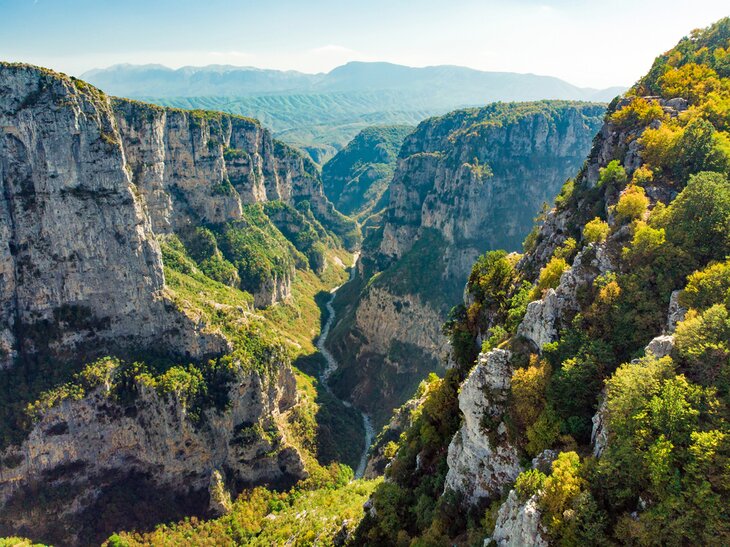
Another one of Greece's premier natural attractions is the Víkos Gorge. Lesser known than the above profiled Samara Gorge on Crete, this incredible natural phenomenon is commonly known as the Grand Canyon of Greece. The gorge is a UNESCO World Heritage site and part of the larger Vikos–Aoös National Park.
An astounding 1,000 meters deep the canyon is one of the most amazing and easily accessible natural sights in the northwest area of Greece. If you want to just see the gorge from a lookout, one of the best is located at Oxya Viewpoint , where you'll be treated to views into the deepest part of the gorge.
For the more adventurous, a well-signposted 13-kilometer hiking trail takes you down into the gorge and back up the other side. The trail starts at Monodendri and ends at Vikos. Halfway through you can go for a dip in the icy cold Voidomatis Springs to cool off. The trail is considered moderately difficult and takes most people 4.5 to 5 hours to complete.

More on Greece
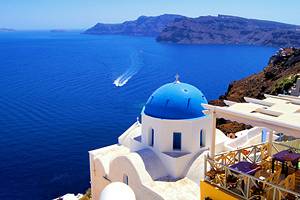
- Search Please fill out this field.
- Manage Your Subscription
- Give a Gift Subscription
- Newsletters
- Sweepstakes
- Beach Vacations
Everything You Need to Know to Plan Your Perfect Greek Islands Vacation
From choosing the right hotel to getting around, here's how to plan the ultimate island-hopping adventure in Greece.
Planning a trip to the Greek islands can be intimidating, even for the most seasoned travelers. With more than 200 inhabited isles (and about 6,000 islands and islets in total), the magnitude of the archipelagos is astounding. Each has its own character and aesthetic, from Cyclades islands dotted with white-and-blue houses to the lush and green Ionian Islands to the castle-lined Dodecanese.
Overall, Greece has six main island groups, plus a significant stand-alone: Crete. It's generally easiest to travel between islands within one group than to hop between archipelagos. In this guide, we'll break down the best Greek islands to visit, including what each island group is known for, and how to travel within each archipelago.
Getting Around the Greek Islands
While many of the Greek islands have airports, not all of them have international terminals. Many are serviced solely by domestic carriers like Aegean Airlines , and you can only fly from neighboring islands or Athens. However, some of the most popular islands (including Crete and Santorini) have international airports, where you can fly directly from cities in Europe or the Middle East.
Traveling by ferry simplifies island hopping, especially if you're just exploring one archipelago. In the Cyclades, Seajets is the high-speed ferry, though travelers can find all options (including less expensive ferries) via Greek Ferries . It is possible, of course, to rent a car in Athens — or on one of the islands — and drive it onto the ferry, essentially turning your island-hopping excursion into a seafaring road trip. However, it's easy to rent a car on the islands, too, provided you have an international driver's license with you.
When to Visit the Greek Isles
May, June, and late September are great times to travel if you're looking for nice weather but still hoping to avoid the crowds. The high season (mid-June to mid-September) offers more ferry routes, flight options, and open restaurants and beach bars, but it also means more tourists and higher prices. Each island group has its own weather to look into — Crete is warmest year-round, making it a great choice for late fall or winter. And while some Greek islands, such as Hydra, are full of locals and see tourists year-round, others, such as Santorini, get very quiet in the off-season (November to March). Here, we've put together an overview of each group of islands (and the highlights of each archipelago) to help you plan your next Grecian adventure.
The Cyclades Islands
Monica Farber/Travel + Leisure
This archipelago is the most common first stop for American travelers in Greece, with two of the most-visited islands: Mykonos and Santorini. A group of about two dozen inhabited islands (and 220 total isles), this bunch looks like all the postcards of Greece you've seen: white churches with blue domes and pink bougainvillea vines shading secluded side streets.
Mykonos is known for its nightlife and see-and-be-seen beaches, but it also has a gorgeous Cycladic village in its center, with windmills and winding lanes designed to confuse pirates centuries ago. Santorini is romantic and luxurious, beloved by honeymooners lounging in their private pools overlooking the caldera. For those looking for alternatives to Mykonos and Santorini, options abound. Up-and-coming Milos has otherworldly beaches and the famed sea caves, Tinos is the site of a famous Church of the Virgin Mary, and the rustic Lesser Cyclades (Koufonisia, Donousa, Schinoussa, and Iraklia) are great for camping. There are large islands, like Naxos and Syros, the archipelago's capital, and tiny ones with very little tourism, like Sikinos.
How to Travel the Cyclades Islands
The tourist season on the Cycladic islands runs from mid-April to mid-October (peaking in June, July, and August). If it's your first time in the area, you'll want to start by visiting Mykonos or Santorini. On Santorini, you'll find great wineries, like Venetsanos and Santo , while on Mykonos, it's the nightlife that will keep you coming back, with iconic clubs like Scorpios and Super Paradise Beach Club . When exploring some of the smaller islands, like Ios, Folegandros, and Milos, swim, snorkel, and wander the fortress-like capital of each island. The cobbled alleyways are home to shops, galleries, bars, and tavernas (on most islands the main town is called "Chora"; on Milos, it's "Plaka"). And don't miss sailing adventures around the Cycladic islands — look into companies like Polco Sailing on Milos and Sunset Oia Cruises on Santorini.
Where to Stay
On Santorini, start your trip by staying amid the iconic white-and-blue cliffside houses of Oia at Andronis Luxury Suites . Next, move along the caldera to the village of Imerovigli, where you'll find some of the most over-the-top and romantic hotels, including Andronis Concept Wellness Resort and Grace Hotel, Auberge Resorts Collection . Finally, stay a night in the old town of Pyrgos at Santorini Sky .
On Mykonos, start your vacation at The Wild Hotel by Interni , which has a luxurious boutique atmosphere and a private beach for guests. For an ideal honeymoon in Greece , spend a few exceptionally romantic nights at Kalesma Mykonos , where each suite has its own infinity-edge pool.
Elsewhere in the Cyclades, look for luxury boutique hotels (many, like The Wild and Kalesma, are family owned). Try Milos Breeze on Milos, Coco-Mat Eco Residences on Serifos, Calilo on Ios, and the Naxian Collection Luxury Villas & Suites on Naxos.
The largest Greek island (and the southernmost, roughly halfway between Europe and Africa), Crete could be its own country. Because there's so much to explore, many travelers focus their energy on the 160-mile-long island rather than straying to other archipelagos.
How to Travel on Crete
The island has two main airports, making Crete very easy to get to from Athens. Once you're on the island, it's a good idea to rent a car; it takes about six hours to drive from one end of Crete to the other.
The island boasts some of the best beaches in Greece , including Elafonissi, with its unparalleled pink sand, and Elounda, known for its five-star beach clubs. Hike the Samaria Gorge (which takes five to seven hours through streams and between cliffs), or walk through wildflowers along paths in the mountain villages. Visit the ruins of the Knossos Palace, home of the Minoan empire (and the dreaded Minotaur monster), and the Boutari Winery if you're interested in sampling Cretan wines. Finally, if you have time for a day trip, the isle of Spinalonga, off the coast of Elounda, is worth visiting for its wild beauty and tragic history — it was home to a colony of people affected by leprosy until 1957.
Where to Stay on Crete
With picturesque olive groves sloping down to sandy beaches, Elounda has become something of a Cretan Riviera. This stretch along the island's northeast coast is lined with swanky resorts including Crete's only Relais & Chateaux property, the Elounda Mare , and the contemporary Cayo Exclusive Resort & Spa .
Outside the island's capital city of Heraklion is the family-friendly five-star beachfront resort Amirandes , part of the national Grecotel chain (take a detour to have dinner on their farm, Agreco ). Moving west, you'll find the well-preserved Venetian town of Rethymno, and more historic boutique hotel options like Kapsaliana Village Hotel , built around an 18th-century olive oil mill, and Casa Delfino , a renovated 17th-century mansion inside the walled old town of Chania.
Saronic Gulf Islands
The closest island group to Athens is also home to some of the most scenic, under-the-radar isles. Hydra, Spetses, Poros, Aegina, and little Agistri are popular with Greek weekenders and European visitors but are less known to Americans.
How to Travel the Saronic Gulf Islands
The Nantucket of Greece, car-free Hydra is tiny but mighty. Spetses has green pine trees, yachts parked in the harbor, and traditional horse-drawn carriages along its waterfronts. Family-friendly Poros, with tree-shaded beaches and a charming town dominated by a clock tower, is popular among sailing aficionados. Aegina, the closest island to Athens, has a large port town, sandy beaches, and the ancient Temple of Aphaia dedicated to the goddess of Athena. Because the Saronic Gulf islands are so close to Athens, getting here is simple — a hydrofoil from the port of Piraeus ferries you from Athens to each of these destinations.
Hydra and Spetses are brimming with converted captains' homes (we like the Cotommatae on Hydra and Orloff Resort on Spetses). On Poros, Sto Roloi is a collection of traditional island houses turned into holiday villas, while Sirene Blue Luxury Beach Resort offers plush suites and villas with access to swimming pools and a private beach. Renting a villa through Five Star Greece is also an option, especially on Aegina where weekend homes outshine the hotels. The crown jewel of the Saronic Gulf is Spetses' harborfront Poseidonion Grand Hotel, established in 1914, which is just as lavish as its name suggests.
The Ionian Islands
Irjaliina Paavonpera/Travel + Leisure
Lush and green, the Ionian Islands (also known as "Eptanissia" or the "seven islands") offer unique local culture, music, art, cuisine, and architecture. While the Ionians are known, first and foremost, for Corfu, the six other main islands hold their own and attract their fair share of tourists, too.
How to Travel the Ionian Islands
On Corfu, you'll want to wander the streets of the island's UNESCO-protected Old Town . Near Corfu, tiny Paxos is covered in olive trees, with three charming bays and a satellite island, Antipaxos, known for its translucent waters. The largest of the Ionian Islands in size, Kefalonia is one of the most beautiful places to visit in Greece and has semi-wild horses running around Mount Ainos in its center. Zakynthos is home to Navagio Beach (also known as Shipwreck Beach), accessible only by sea, and iconic blue caves you can swim through. Lefkada, connected to the mainland by a bridge, has woodland villages and some of Greece's best beaches along its shores. Small Ithaka, known to Homer fans as the home of Odysseus, is still relatively undiscovered. Finally, Kythera is the outlier — it looks more Cycladic than Ionian and is more easily reached from the Peloponnese.
Corfu, Kefalonia, Zakynthos, and Kythera all have airports, which receive domestic flights from Athens as well as international charters and airlines.
On Corfu, options range from stylish seaside resorts like the Grecotel Corfu Imperial to historic 18th-century estates in the Tuscan-like interior such as the Pelecas Country Club . Near the Old Town, the first Banyan Tree Hotels & Resorts property in Europe, Angsana Corfu , offers a gorgeous seaside enclave with 159 rooms and lavish pool villas.
On Kefalonia, the ultra-modern Tesoro Blu is an adults-only oasis just outside the village of Skala, and the Emelisse Nature Resort is a gem outside the picture-perfect town of Fiscardo. Its sister property on Ithaka, the Perantzada , is a contemporary hotel within a 19th-century mansion on the harbor in Vathy. Little Paxos is all villa rentals and rooms to rent except for a few intimate hotels, like Agali Hotel Paxos and Paxos Club Resort & Spa . On Zakynthos, Porto Zante Villas & Spa is a swanky oasis on the busy eastern coast, and in the quiet north of the island, near the blue caves, Nobelos is a four-suite, family-run hotel beloved for its organic restaurant.
The Sporades Islands
There are 24 of these green islands off of the northeastern coast of mainland Greece, but only four are inhabited — and if you've seen "Mamma Mia , " you know what they look like. Dark green pine trees, white churches, and lots of sand, rocks, and singing. It's all part of the Sporades experience.
How to Travel the Sporades Islands
Buzzy Skiathos is famous for its gold-sand beaches and nightlife, while low-key Skopelos is a natural paradise of white pebble coves, oak forests, monasteries, traditional villages, and lots of shipwrecks off the coast in the National Marine Park of Alonissos and Northern Sporades . Alonissos is at the center of the National Marine Park, a great base for fishing, bird-watching, and spotting the protected Mediterranean monk seal. Finally, Skyros is known for its ceramics and local crafts, churches, and gorgeous Chora, a mountaintop capital crowned by a Venetian castle.
To get to the Sporades, you can fly directly from Athens to Skiathos and Skyros. Skiathos is also served by a ferry from Thessaloniki. In summer, hydrofoils sail to all four islands from the port of Agios Konstantinos on the mainland. You can travel between the islands by ferry or private boat.
On these four islands, tourism is all about sailing, swimming, mountain biking, sea kayaking, and hiking. Hit the beaches — Skiathos's swanky Ambelakia to see and be seen, Skyros's Kalamitsa for wind-surfing, Skopelos's Hovolo for pine-scented breezes. Above all, do not miss sailing, swimming, or scuba diving in the marine park.
There are villas to rent all over the islands (like the ones with private pools run by Poikilma Villas on Alonissos). For a more full-service hotel, try the family-run Atrium Hotel above Agia Paraskevi beach in Skiathos, or the Adrina Resort & Spa on the beach in Skopelos.
The Northeast Aegean Islands
This collection of more than a dozen islands (the five most notable being Ikaria, Samos, Lemnos, Lesvos, and Chios) is the area of Greece closest to Turkey. For your journey here, you'll be richly rewarded with incredible beaches and natural wonders (a petrified forest on Lesvos, volcanic rocks and sand dunes on Limnos, and thermal springs on Ikaria).
How to Travel the Northeast Aegean Islands
Lemnos, Lesvos (also known as Mytilene), and Samos all have international airports, and Chios and Ikaria have domestic ones. There are several ferries from the port of Piraeus in Athens that can take you to these islands as well.
Visit the archaeological sites of the Temple of Hera on Samos, the acropolis on Thassos, the ancient city of Ifestia on Lemnos, and the magnificent castle atop Lesvos. While these islands are famous for their history, they're also known for their water sports. Keros Beach on Lemnos is one of the best places to kite- or windsurf in Europe. As for swimming, it's hard to beat the Seitani coves on Samos, Kipos beach on Samothrace, white-sand Seychelles on Ikaria, and Vatera on Lesvos.
Time-travel back to when Genovese nobility ruled Chios and stay at the majestic Argentikon Luxury Suites in a 16th-century estate. Sleep above popular Tsamadou beach at the Armonia Bay Hotel on Samos, overlooking the sea at Toxotis Villas on Ikaria, or on the beach in a luxury safari tent through Surf Club Limnos .
The Dodecanese Islands
This archipelago gets its name from the Greek number 12 (dodeca) because it contains — you guessed it — a dozen main islands and multiple smaller ones. Rhodes and Kos are the two largest islands, while the smaller 10 are quieter and less discovered.
How to Travel the Dodecanese Islands
Rhodes and Kos have international airports (making them popular among travelers who fly in from England and Germany), and Astypalaia, Kalymnos, and Karpathos receive domestic flights. All 12 main islands are served by ferries from the port of Athens, Piraeus.
Rhodes is known for its beautifully preserved walled city with Crusader castles and an ancient synagogue. And in the town of Lindos, there's an ancient Greek acropolis at the top of the hill, a medieval village in the middle, and a modern town on the beach at the bottom. Highlights on adjacent islands include the mansions of Kasos, the brightly painted houses of Kastellorizo, and the hilltop Chora (historic center) of Astypalea, one of the prettiest fortified villages in all of Greece. For a more active Greek isles experience, retreat to Karpathos to hike or windsurf, or scuba dive amid the World War II wrecks on Leros.
On Rhodes, soak in the atmosphere at Melenos Lindos , a 17th-century building with a pebbled mosaic roof deck offering sea views, set into the hill just under the acropolis. On Astypalaia, the island's breathtaking Chora is both the inspiration for, and the location of, Pylaia Boutique Hotel & Spa , which has a pool, spa, and ocean views from the Plori restaurant at its peak. And finally, on Patmos, overlooking the sea (and the famous Kalikatsou rock), The Petra offers luxurious suites equally convenient for the beach and the Monastery of St. John the Theologian .
:max_bytes(150000):strip_icc():format(webp)/maya-kachroo-levine-author-pic-1-2000-1209fcfd315444719a7906644a920183.jpg)
Related Articles

Your Master Guide To All Greek Islands And How To Pick One
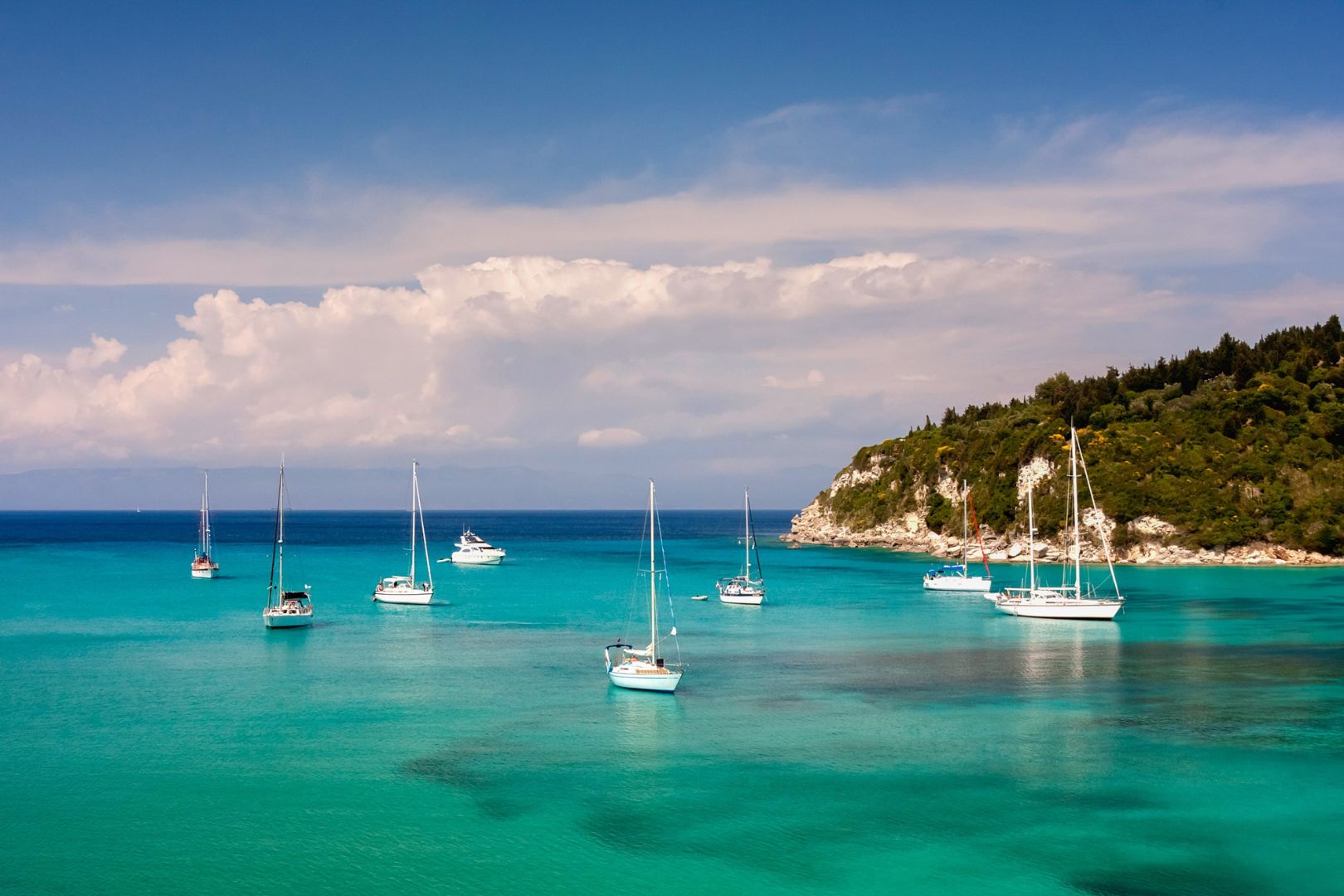
Related Posts
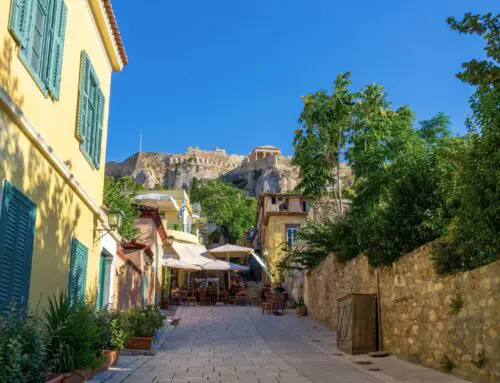
Your Guide to Dental Tourism in 5 Steps
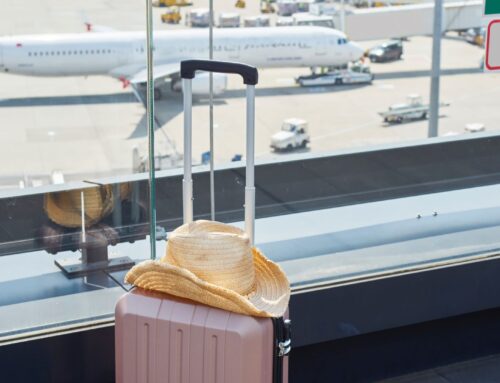
What is Dental Tourism and Is It Worth The Trip?
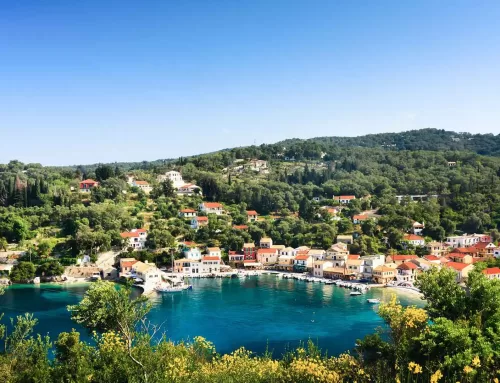
How To Get Around Greece
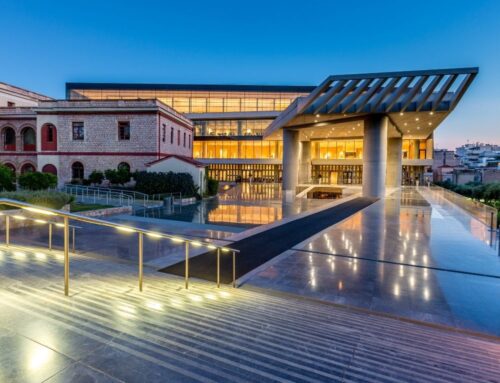
5 Museums in Greece That Will Amaze You
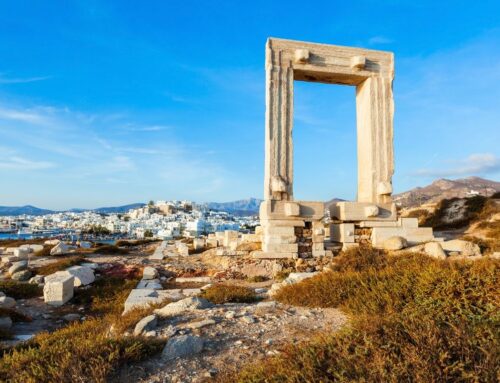
4 Lesser Known Greek Islands Known From Mythology

Visit Greece in the Fall: 3 Destinations You Will Fall In Love With
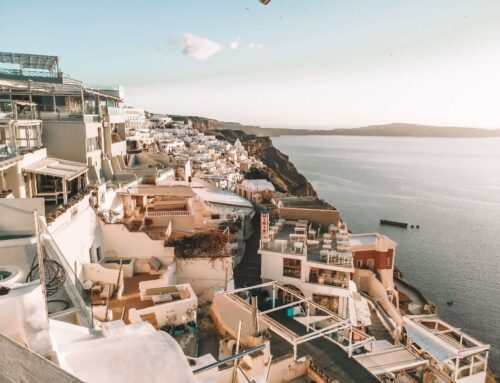
4 Greek Islands That Are Excellent Alternatives To Santorini
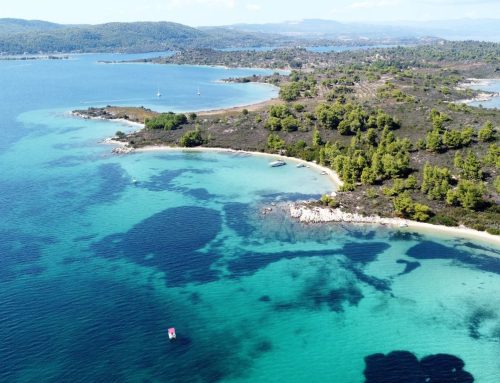
5 Reasons To Visit Greece in September
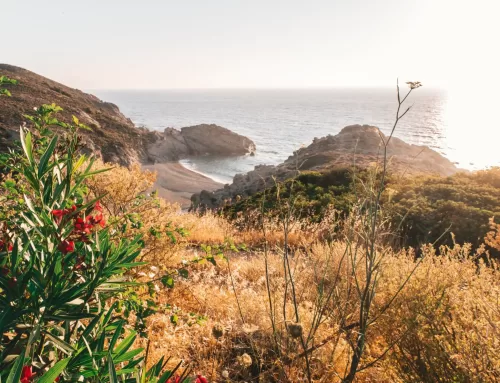
4 Crowd-Free Greek Islands for the Ultimate Slow Living Lifestyle

The Real Reason Behind Greece’s White Houses
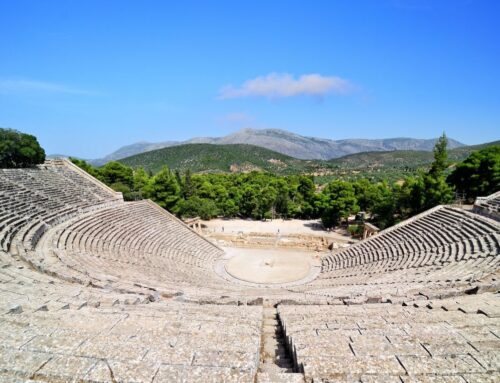
10 Fascinating Facts About The Epidaurus Ancient Theatre
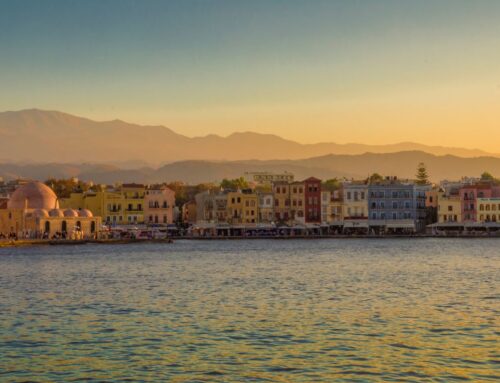
12 Facts About Crete You Need To Know Before You Go

10 Things To Know About The Assumption Of The Virgin Mary
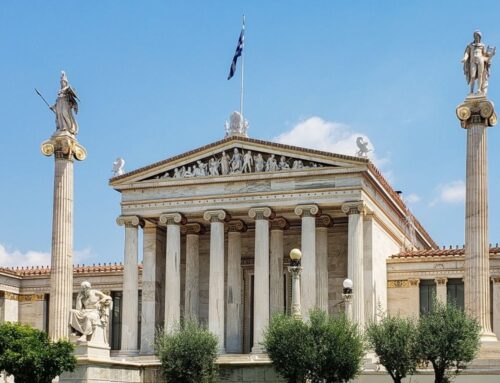
10 Of The Best Landmarks In Athens To See For Yourself

Everything You Need To Know About The Acropolis Museum In Athens
Search your next destination..., ☞ table of contents:, what complex of greek islands to pick or how to combine them, best greek islands to visit in the winter, best greek islands to visit in april or may, best greek islands to visit in september or october, best greek islands to visit close to athens, best greek islands to visit for nature lovers, 11 smallest greek islands to visit, 11 biggest greek islands to visit, 7 most popular greek islands to visit, greek islands that have airports, best greek islands for party lovers, best greek islands for families, best greek islands for couples & romantic holidays, most expensive greek islands, the inexpensive greek islands, best greek islands for history lovers, best greek islands to visit if you love watersports, best greek islands to visit if you don’t have a car, most insta-worthy greek islands to visit.
E verything you need from a guide to the Greek islands. How many Greek islands are there? More than 6,000 but only a couple of hundred are inhabited.
What are the best Greek islands to visit in the winter?
Islands in the south of Greece for better weather and with a large permanent population for easy accessibility.
Is April a good time to visit the Greek islands?
Yes, April is a great time to visit the Greek islands. The best weather is in the southern Aegean like Crete , Kos, Karpathos and Rhodes . There are less crowds but more Greek tourists due to the Easter celebrations.
The number of inhabited Greek islands varies between 150ish to 220ish depending on what size you consider an island to be. While all of them are stunning, some of them will fit your style of travelling more than others.
This guide was created to help you pick which of the Greek islands most suits your preferences, so let’s begin. We suggest grabbing a pen and paper to note down the islands that sound most like you as you go through the article.
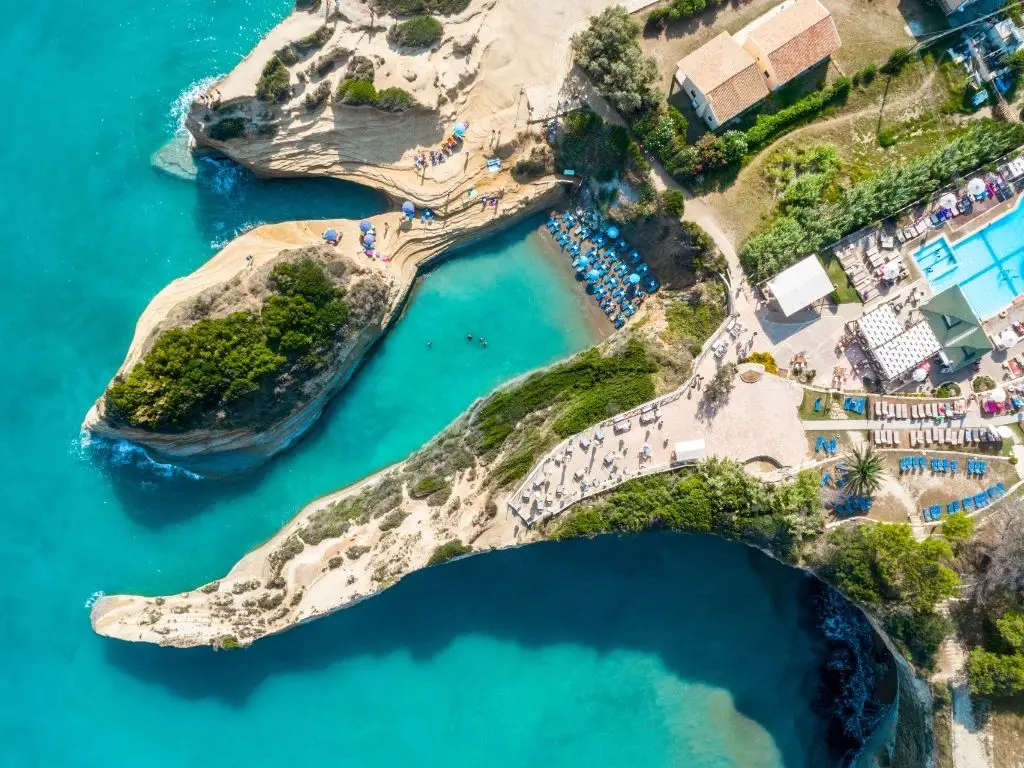
When you begin researching what island you want to visit in Greece, the easiest way to proceed is to narrow down which complex or cluster of islands you prefer. While there is no reason you can’t combine islands from different clusters, to do so you may need to add extra dates just for travelling to and from a location, which increases the cost and cuts down on the actual holiday time. There are 6 different complexes of Greek islands and some that belong to no category.
1. Eptanisa
The Ionian Sea is home to the first cluster which is also called Eptanisa, or 7 islands. This includes Corfu , Paxos & Antipaxos , Ithaka , Lefkada , Kefalonia and Kythira . Kythira is located under the Peloponnese Peninsula and while it is grouped together with the 7 islands it is under the administration of Athens . These islands share a lot of characteristics, like the Venetian architecture seen in houses, castles and churches, the lush greenery and turquoise waters.
2. Cyclades
The Cyclades is another complex of Greek islands which translates to circle due to the way the islands form a protective barrier around the sacred island of Delos. While the Cyclades counts more than 220 islands, only a handful are inhabited. The primary island list includes Amorgos , Anafi, Andros, Paros , Antiparos, Koufonisia , Milos , Naxos , Mykonos , Santorini or Thira, Kythnos, Kimolos , Kea, Ios, Folegandros, Serifos, Sithnos, Sikinos, Syros, and Tinos.
The Cyclades are famous for their distinctive architecture, the whitewashed cube shaped houses that are built close to each other usually at a high point for protection against intruders and the windmills which once were used to mill grains but now are mostly a tourist attraction.
3. Dodecanese
The Dodecanese complex of islands is another number-name, but while it translates to “twelve islands” there are fifteen major islands of the more than 100 in the area, that are included in the list. The location of the islands is between the Cyclades and the coast of Turkey. The largest of all the islands is Rhodes . There is also Symi, Tilos, Astypalaia , Kalymnos, Karpathos , Kasos, Kos, Leros, Nisyros, and Patmos. As well as the smaller Kastellorizo, Lipsi, Halki and Agathonisi. As the largest and most popular island, Rhodes is a good option to fly into and then set out to explore the other islands if you so choose. For off season travel, options may be limited so you need to give yourself more time to reach from one island to another.
4. Northern Aegean
The Northern Aegean islands are as the name states further up the north Aegean coast. They are Thasos, Samothraki, Lemnos , Lesvos, Chios , Ikaria and Samos. As well as the much smaller Psara, Fournoi, Agios Efstratios and Oinnousses. Most of the islands in the North Aegean are bigger in size but less popular holiday destinations with the exception of Ikaria that has become a mecca for “panigyria” the Greek religious festivals where people dance until the early hours of the morning. Island hopping between these islands is not easy and ferries to these islands are often slower and travel during the night.
5. Sporades
The name of the next group of islands is Sporades meaning “scatterred”. It is often used to describe four islands located close to the east coast of mainland Greece, however, the name applies to a lot of other islands outside of the Cyclades. The four islands that are inhabited are Allonisos, Skopelos , Skiathos and Skyros. During the summer high season there are regular ferries departing from the mainland. Flights can be organized for Skiathos Airport that receives both domestic and charter flights from some European countries. A much smaller airport operates in Skyros island that is located a fair distance away from the other three. You can only find domestic flights from Athens and Thessaloniki here.
6. Saronic Gulf
The Saronic Gulf islands are the ones located closest to Athens. They are Aegina, Salamina, Poros, Hydra, Spetses, Agistri, and Dokos. These islands are ideally located very close to the mainland and can be reached from Athens with high speed ferries, that often take less than 1 hour of travel. The gulf offers protection from the wind and so these islands also make ideal options for off season or winter destinations, even if the sea is not warm enough to swim in. There are plenty of day cruises leaving Piraeus port that visit Hydra, Poros and Aegina which is an ideal option if you have extra days in Athens .
7. Crete and Euboea
Two islands that don’t really fall under one category are Crete and Euboea. Crete is the largest island in Greece and it could be a separate country all together with its distinctive accent and traditional mantinades (a short of limerick with 15 syllables that locals can expertly whip up within seconds, either accompanied with music or when communicating with each other), the diverse natural scenery, with gorges, lakes, some of the best beaches in Greece and strong local flavours that make it a favourite destination for all. Euboea or Evia as is pronounced in Greek is the second largest island, however, it is seldom thought of as one, due to the two bridges that link it to the mainland.
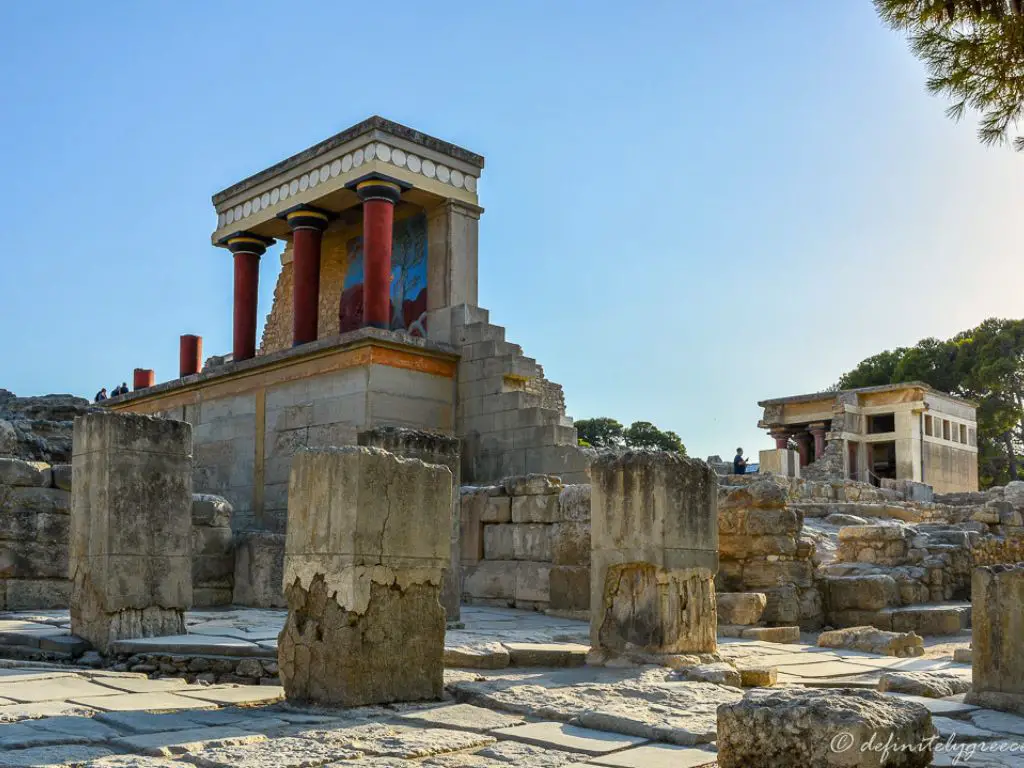
Dodecanese: Rhodes
Cyclades: Mykonos, Santorini
Saronic: Hydra, Poros, Aegina , Salamina
Other: Crete, Euboea
Greece has long marvelous summers and sunny winters but the temperature can still plunge to freezing temperatures especially on the northern part and high altitude cities like Thessaloniki and Kastoria . While less common, we have seen plenty of Greek islands and beaches covered with a dusting of snow throughout recent years.
That is because you are more likely to find restaurants and attractions open, there is a lower chance to be stuck on the island due to rough seas (if you were taking a ferry) and there is a large medical center in case of accidents.
- Tip: The best Greek islands then to visit in winter would be the one’s that have an airport, are considerably big and that have a steady amount of permanent residents throughout the year.
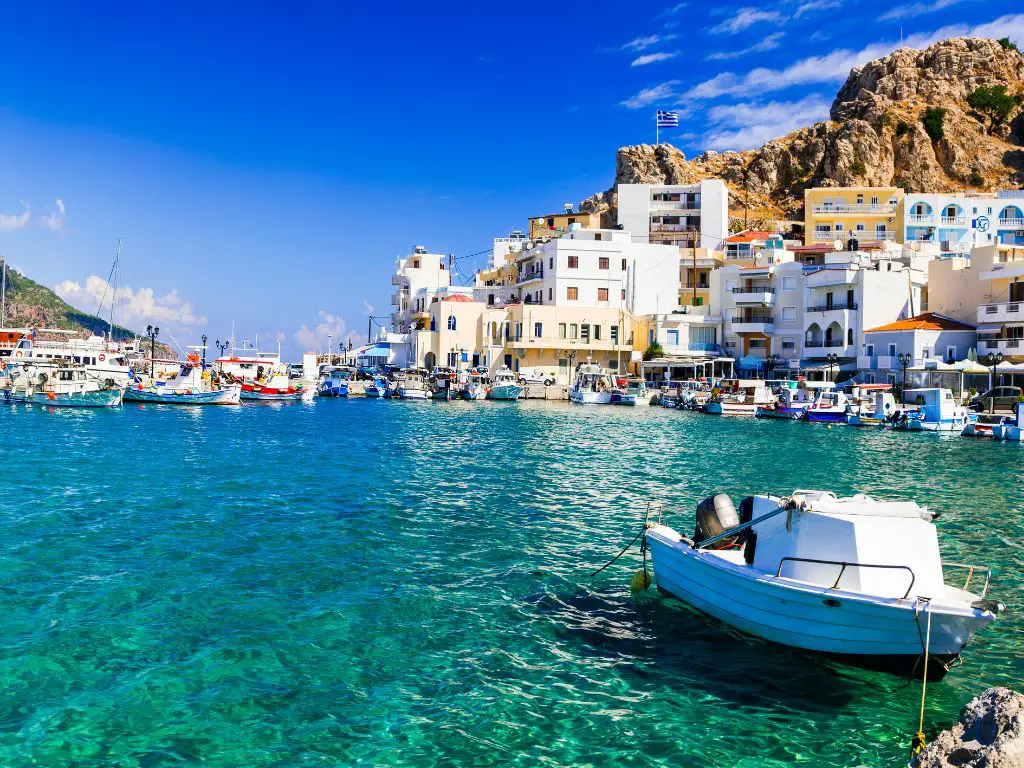
Dodecanese: Rhodes, Kos, Karpathos, Patmos, Kalymnos
Cyclades: Mykonos, Santorini, Paros, Naxos, Tinos, Milos, Syros, Sifnos, Folegandros
Eptanisa: Corfu
Other: Crete
The months of April and May are when spring starts to make its presence known. The temperature is mostly mellow and ideal for outdoor activities and excursions and there is a lesser chance of a crowd wherever you go. They also tend to be some of the cheapest months to travel in! In addition, travelling to Greece in April is special due to the number of festivities and events that surround Easter. The island of Chios hosts the Easter Rocket Wars, where two churches compete for the most impressive fireworks of the night. Mykonos and Santorini lack the summer crowds so you are more likely to run into locals and see the everyday rhythm of Greek people. While most Greeks don’t venture into the sea until June, plenty of visitors will find the waters pleasant and refreshing.
- Tip: The dates for Orthodox Easter change slightly every year so plan ahead if you want to combine your trip with some cultural experiences.
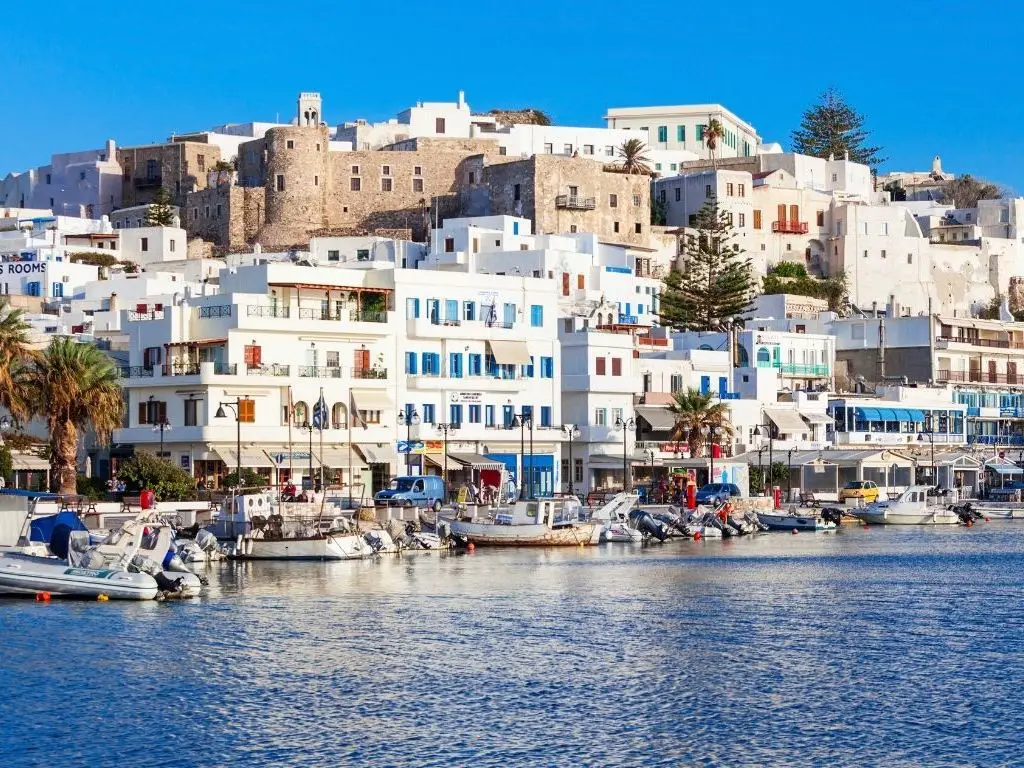
Saronic: All of them
Cyclades: Mykonos, Santorini, Paros, Naxos, Syros
Eptanisa: Corfu, Kefalonia
- Tip: If you wish to combine multiple islands on your visit to Greece in September or October make sure to pay close attention to ferry schedules since a lot of the routes are cut down substantially.
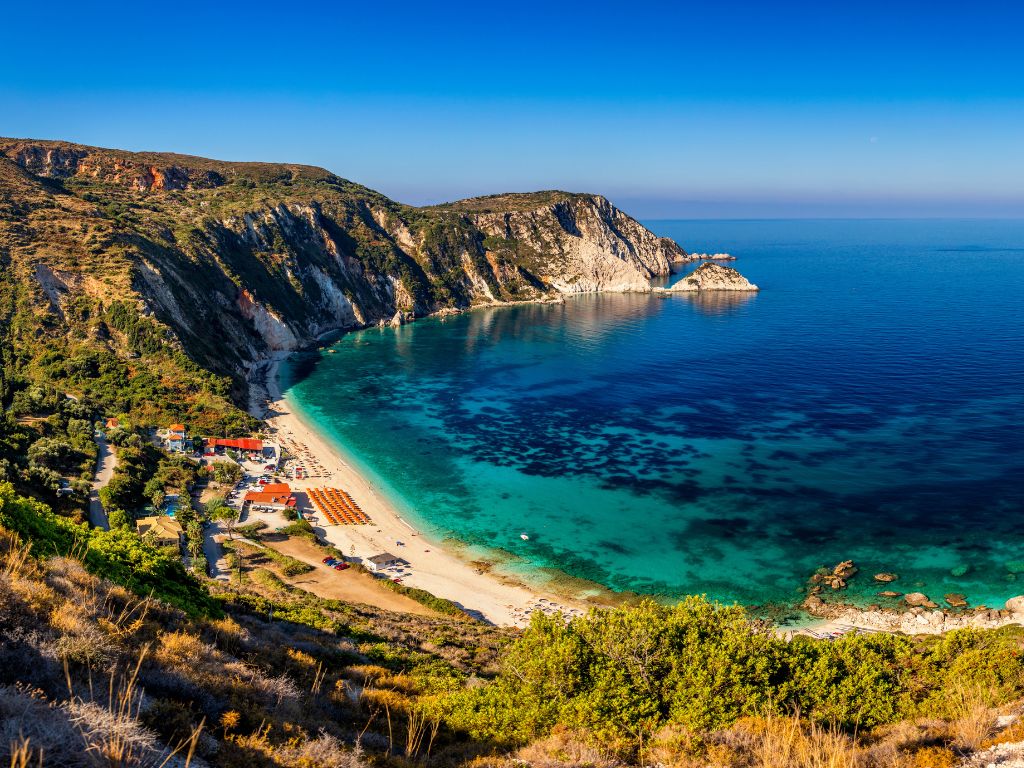
Other: Euboea
The Saronic islands are the best option for visitors that can’t venture too far away from Athens. Whether you are short on time or just prefer to spend more of your holiday at the beach rather than on a plane or boat, the Saronic Gulf islands offer glamour, tradition, aesthetics and unique experiences that are sure to captivate you. An island-hopping tour can also be a good option to see more islands within a short period of time, like the popular Aegina, Poros and Hydra tours. However, fast ferries departing from Piraeus port, can also take you to the ever popular Mykonos and Santorini. SeaJets and Golden Star Ferries offer the fastest option from Piraeus to Santorini, that take approximately 5 hours. The slower and less bumpy ride for those prone to sea sickness takes approximately 8 hours. There are usually more than 3 ferries leaving Piraeus towards Mykonos during the summer and at least 1 during the winter.
Euboea, the second largest island that you can reach by car, is only one hour from Athens and has incredible beaches, fantastic fish taverns and a rich history. Due to its size it may not feel like an island but you should dedicate at least 3 days to exploring this area.
- Tip: The port of Rafina is another excellent option for those travelling to Mykonos.
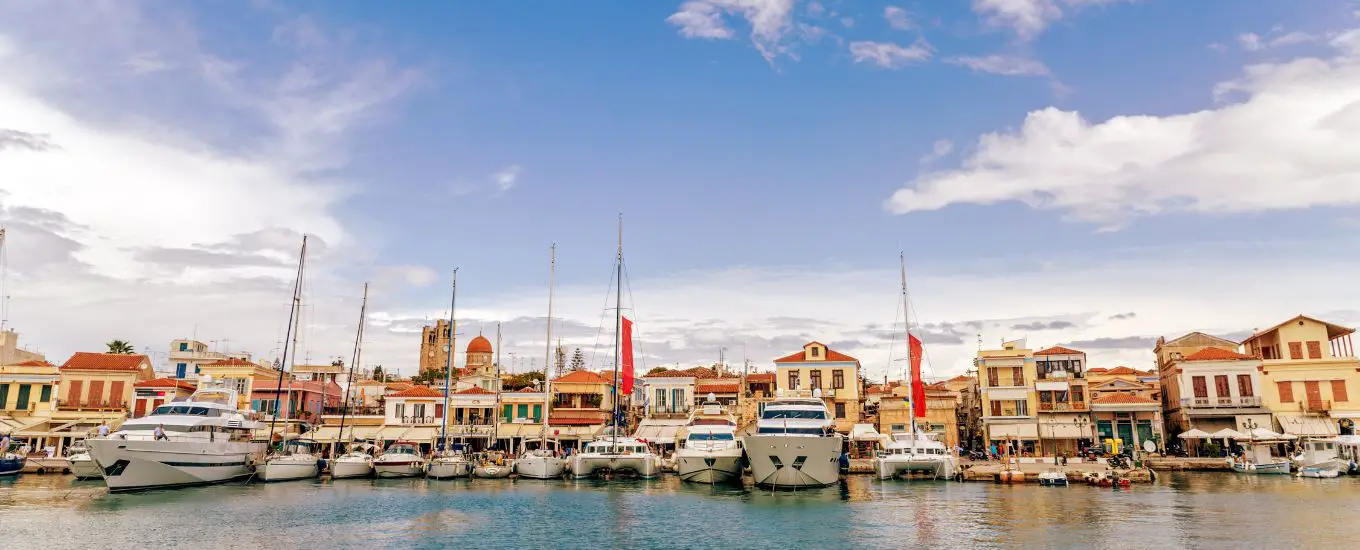
Dodecanese: Nisyros, Rhodes, Kalymnos
Eptanisa: Corfu, Cephalonia, Lefkada, Kithyra
Cyclades: Andros, Sifnos, Tilos, Milos
Other: Euboea, Crete
Sporades: Skyros, Allonisos
Northern Aegean: Samothraki, Chios
- Tip: If you want to explore nature consider travelling outside of July or August because the temperature can reach more than 40 Celsius making it uncomfortable and even dangerous to be under the sun the whole day.
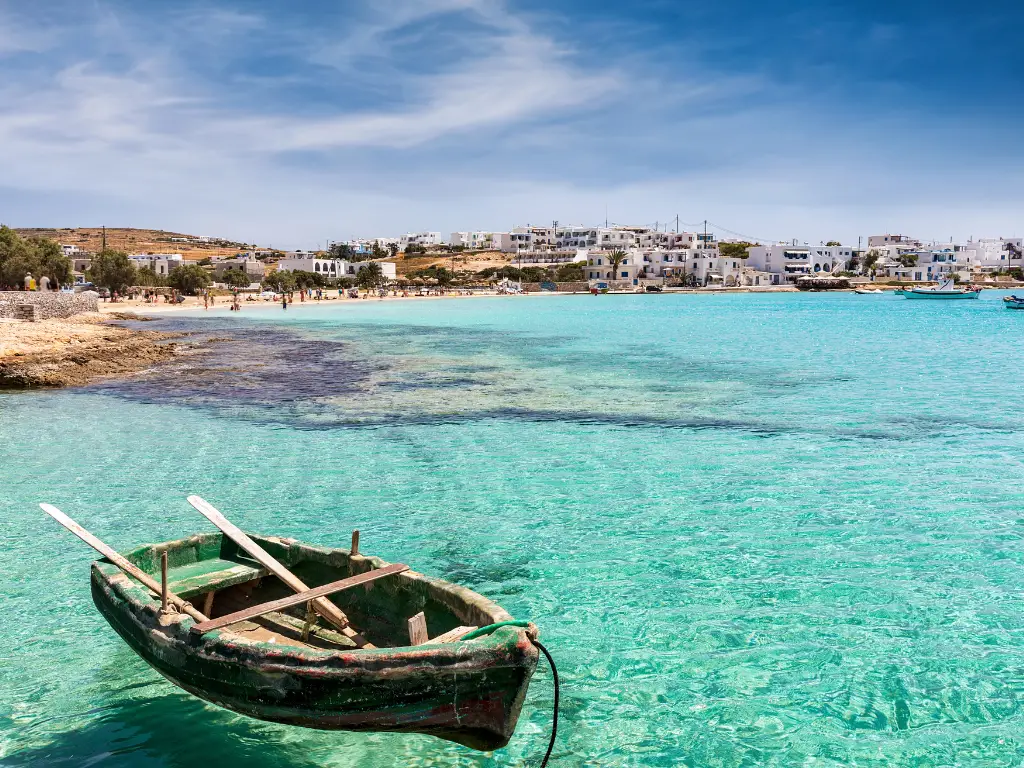
Dodecanese: Patmos, Nisyros, Kastelorizo, Halki, Lipsi
Eptanisa: Paxos Antipaxos
Cyclades: Koufonisia, Anafi, Folegandros
Saronic: Agistri
Northern Aegean: Fournoi, Psara
Visiting some of the smaller islands has both advantages and disadvantages. Almost all of the smaller islands lack airports and as such you will need to travel to a bigger island and then catch a ferry or else take a longer journey on the ferry from Piraeus. Some may take more than 15hours but they almost always travel over night and you can book a cabin. However, once you get there, smaller islands will reward you with their lack of tourists and authentic representation of life. You may be able to witness customs and traditions that you wouldn’t be exposed to elsewhere and taste local flavours that are truly homemade.
- Tip: If you have booked an international flight from Athens airport always plan to be back in the capital a few days in advance to avoid delays or strikes on the smaller island ferries.
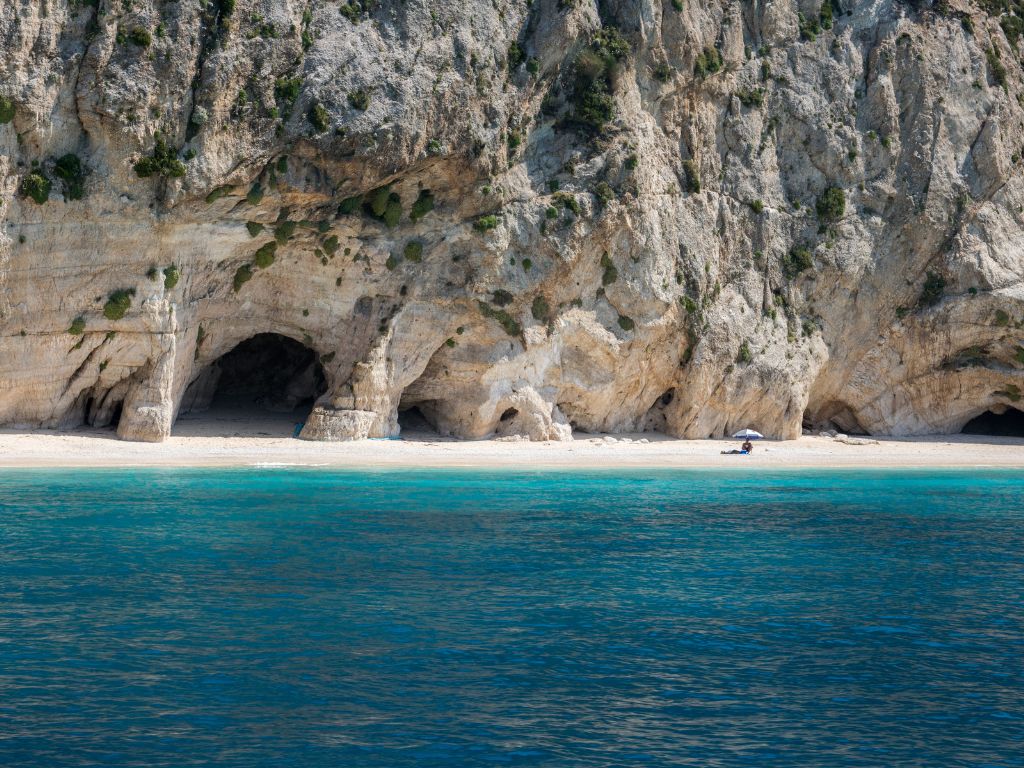
Eptanisa: Zakynthos, Cephalonia, Corfu
Cyclades: Naxos
Northern Aegean: Lesvos, Chios, Lemnos, Samos
The biggest island by far is Crete island. It is twice as big as the second largest island Euboia. Most of the other big islands can be found in the Ionian Sea. If you want to travel to one of the bigger islands of Greece you will be rewarded with more options for accomodation and activities and most of the times a smoother and more comprehensive infastructure for tourism compared to the tiny Greek islands. Most of the islands with a static population all-year-around will have a medical centre, but if you have specific health problems, it pays to inquire ahead of time.
- Tip: The biggest of the Greek islands like Crete and Euboia will certainly require for you to have a car. So, plan for that within your budget.
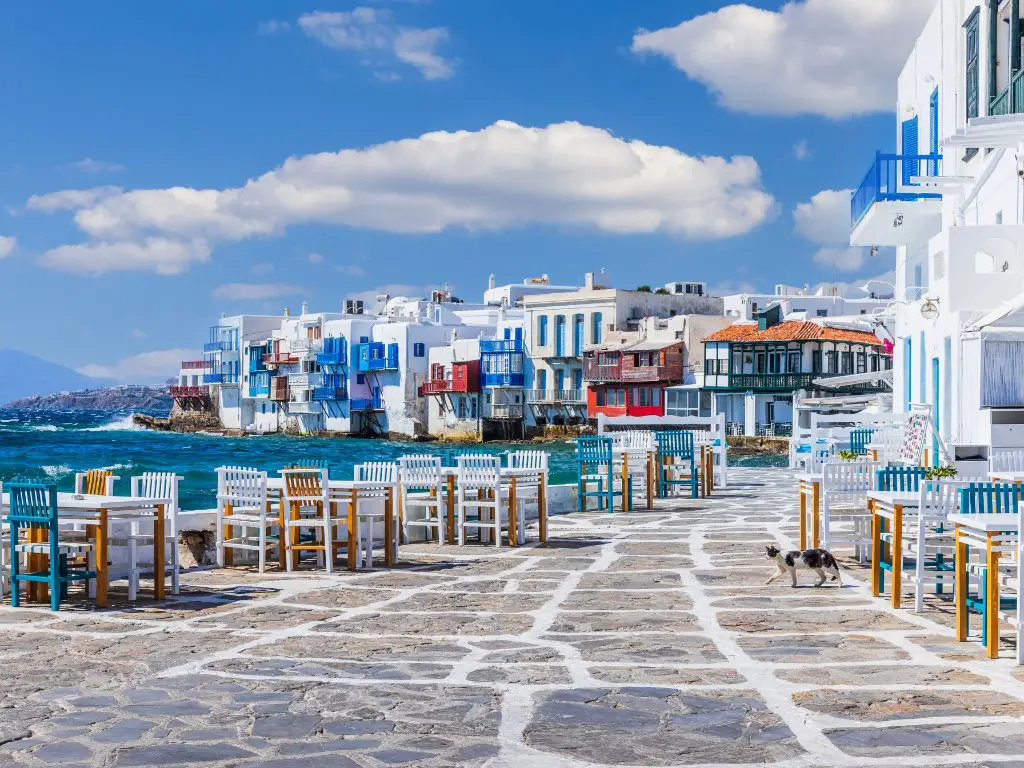
Cyclades: Mykonos, Santorini, Milos
Eptanisa: Zakynthos, Corfu
What suits one traveller will not suit another, so don’t rely only on the Greek islands that first come to mind. While undoubtedly beautiful and amazing destinations that we would always recommend, the most famous islands of Greece tend to get a bit overcrowded. If your heart is set on one of these islands and you are not a fan of crowds try to plan for late spring or early autumn. Your wallet will also thank you. The sweet-smelling Mykonian nights through cobblestoned labyrinths and stupendous sunsets of Santorini, will be there waiting for you!
- Tip: Because Crete is twice as large as the second largest island, Euboia, it is possible to visit in peak season and still find quiet beaches. To do that, head out of Chania and Rethymno and choose smaller towns on the east side of the island.
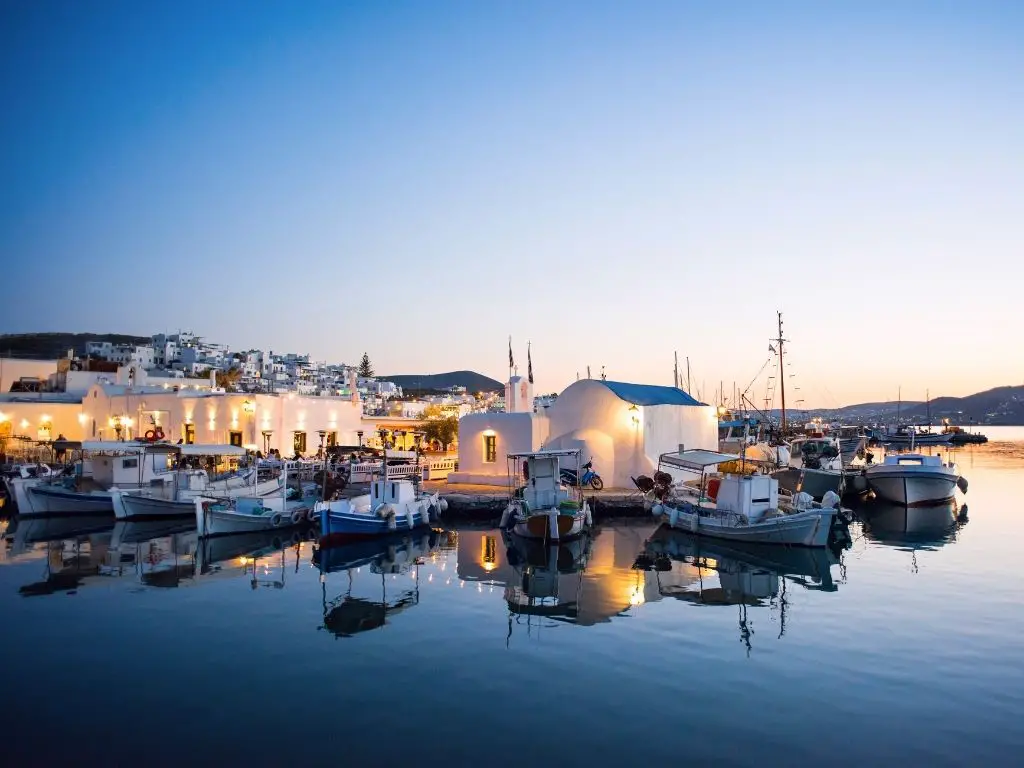
Dodecanese: Rhodes, Kos, Astypalaia, Kalymnos, Karpathos, Kasos, Leros
Cyclades: Mykonos, Santorini, Milos, Paros, Naxos, Syros
Sporades: Skyros, Skiathos
Northern Aegean: Samos, Lemnos, Lesvos, Chios, Ikaria
Eptanisa: Zakynthos, Corfu, Cephalonia, Kythira
All of the “biggest islands” you can find in the above section have airports. The bigger islands will also have more frequent routes, especially during the off season, and you can often find good deals. In comparison, the smaller and less popular islands have charter flights that may only operate during the busiest months and even then come with a hefty price tag. There is always one airport per complex of islands, however, with the exception of the Saronic Gulf islands. These islands are served by Athens International Airport and Piraeus port, from which they are only a couple of hours or less away.
- Disclaimer: Due to tourism and changes in the economy of Greece, information in this section may change. If you have information regarding an airport in the Greek islands or have spotted a mistake please contact us so we can make the necessary amendments.
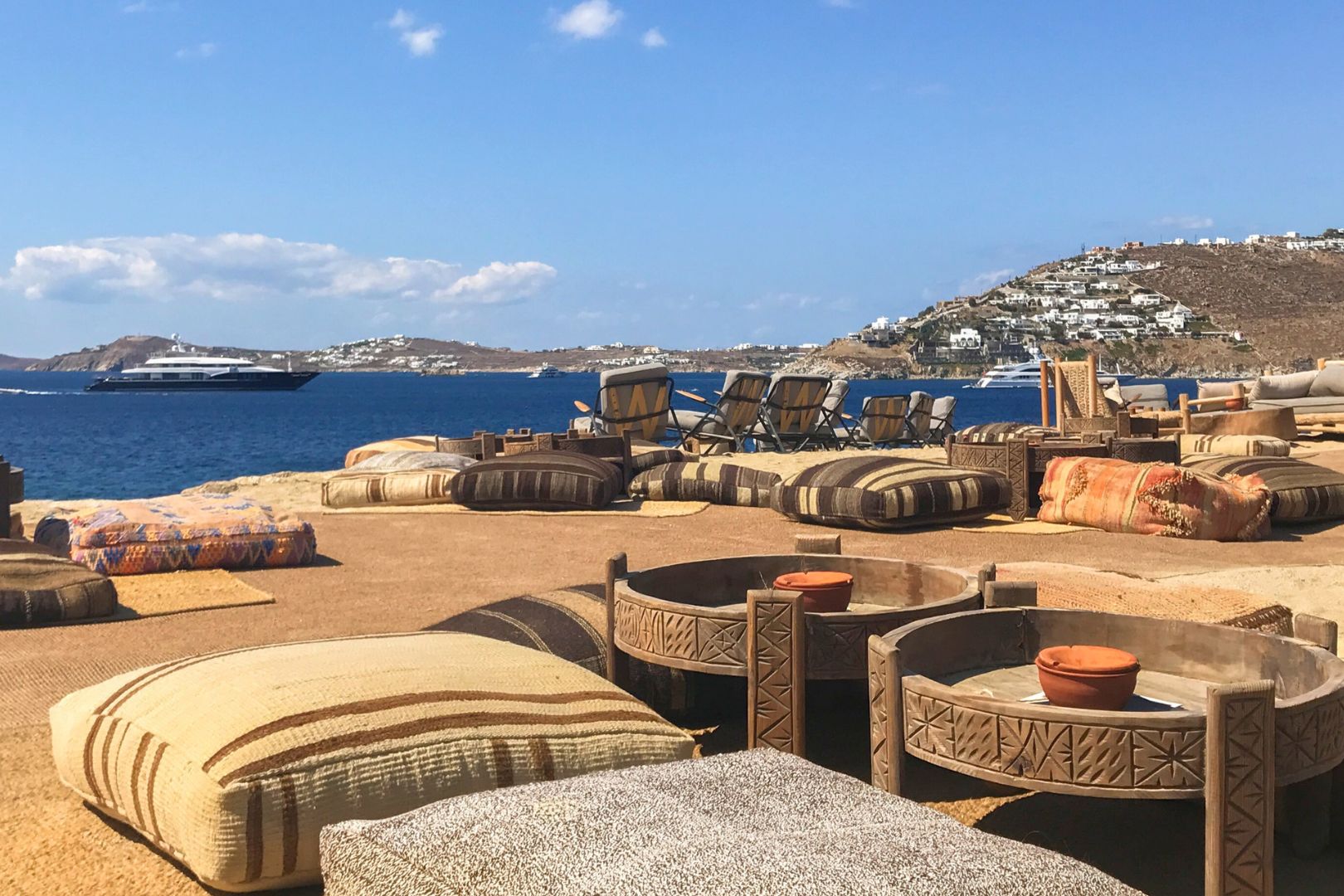
Sporades: Skiathos
Cyclades: Mykonos, Ios, Paros
Eptanisa: Zakynthos
Some of the Greek islands feature prominently on the radar of party lovers! Mykonos and Crete in particular have long been favourites for people that prefer to sleep during the day and party all night. Every island attracts a different crowd as though people organically started to favour one over the other and a niche market was created. In Crete you will find all-inclusive resorts that are a favourite package holiday for Brits in the summer. Mykonos was once called the Ibiza of the Aegean but now has achieved a spot of its own on the throne of nightlife entertainment and is LGBTQ+ friendly. Skiathos and Paros is where a lot of Greek students have their first away from home adventures.
- Tip: Even the above mentioned “party-islands” have a lot to offer for people that do not enjoy all-night outings. Try to stay away from the “Chora” or main village of the island or visit during the off season.
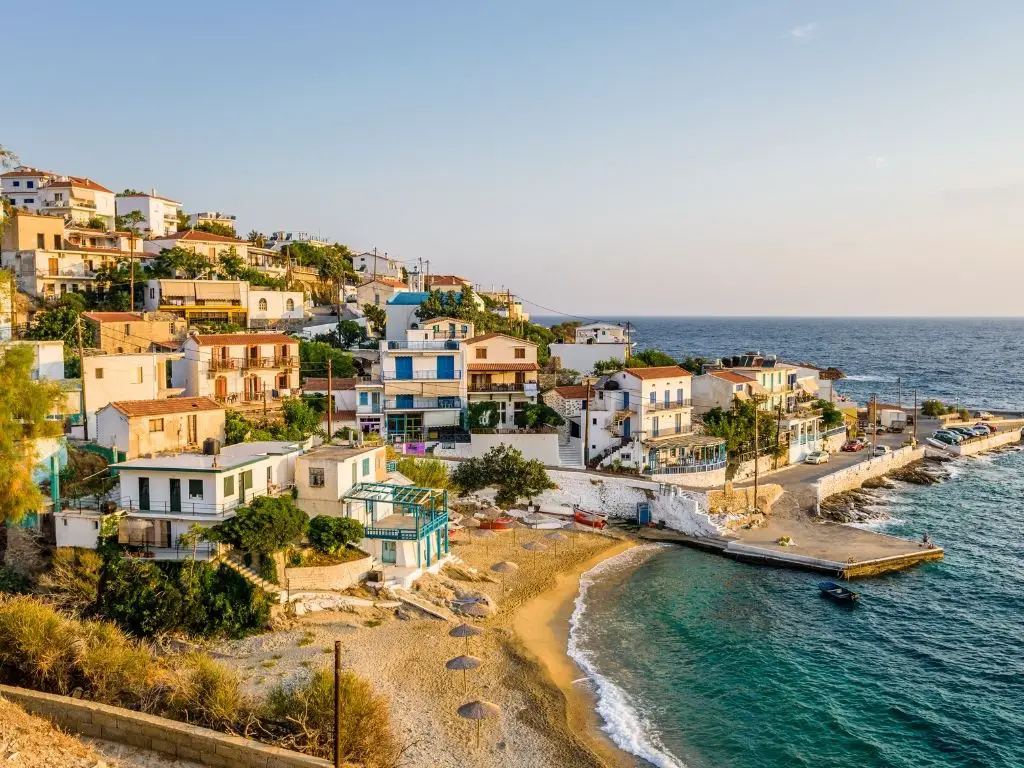
Sporades: Skyros
Dodecanese: Symi, Kos, Rhodes
Cyclades: Naxos, Sifnos, Syros, Andros, Paros
Other: Crete, Euboia
Eptanisa: All of them
For family friendly Greek island destinations location might be the biggest determining factor depending on how many kids or families are travelling, their ages and for how long. The biggest islands on the list like Rhodes, Crete, Cephalonia, Corfu and Lefkada (in the Eptanisa) have more options for family resorts and are better connected with flights. If you don’t want to spend more than a couple of hours in a ferry to reach an island and would rather fly, then the list above is a very good starting point. The complex of Eptanisa is another ideal choice, with lots of green and shade, adequate size to offer options for all and great accomodation options and well connected to the rest of Greece.
- Tip: Kythira island is technically part of the Eptanisa complex but you will find it under the Peloponnese peninsula away from the Ionian Sea. You can read more about family travel in Kythira here .
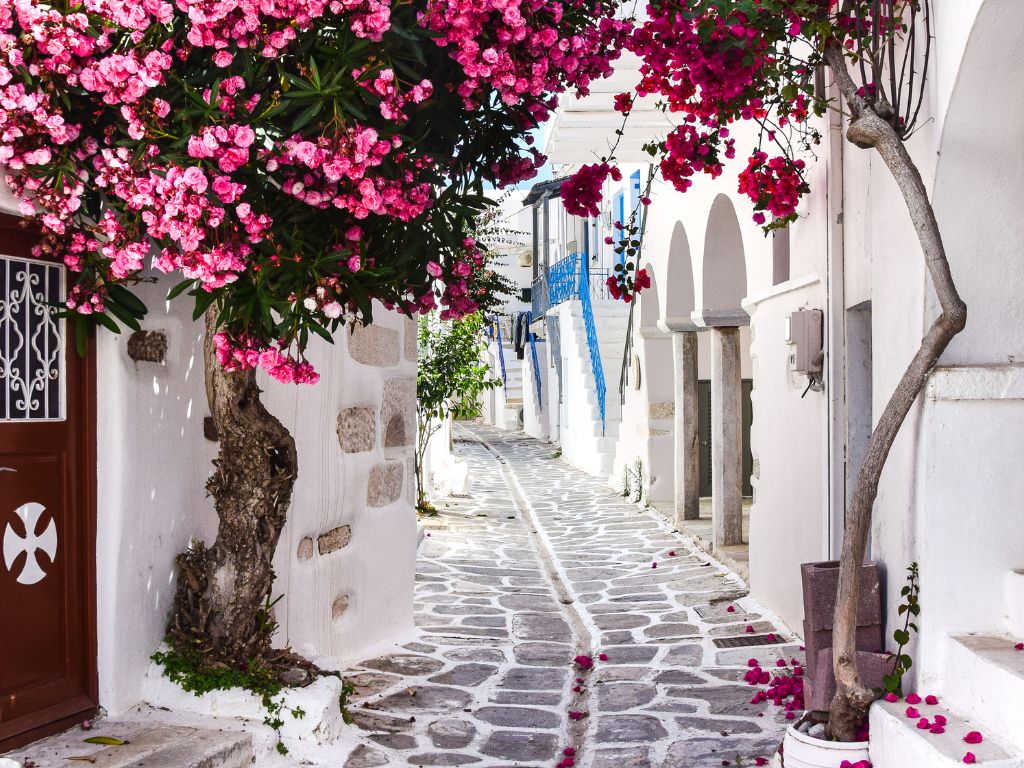
Dodecanese: Symi, Astypalaia
Cyclades: Santorini, Naxos, Milos, Amorgos, Folegandros, Mykonos, Koufonisia, Paros,
Saronic: Aegina,Hydra, Spetses
Eptanisa: Paxos Antipaxos, Corfu
Most destinations can become romantic if you visit them with the person that makes your heart flutter! Even so, some places seem to have a bit of extra magic in the air. The way the dark purple light hits the sea and the colour palette of the architecture join together to create a veil of romance that is hard to resist. Santorini is undoubtedly one of these places; a unique destination that is ideal for couples. If you are a fan of the sugar cube houses and colourful bougainvilleas then the Cyclades are a great option. Mykonos, Santorini, Naxos and Paros will be the busiest during peak summer season so if that is something you wish to avoid Folegandros and Amorgos or Astypalaia in the Dodecanese are exceptionally beautiful spots.
- Tip: Folegandros and Amorgos are great options if you also want to see Santorini for a few days. Ferry tickets are frequent during summer and only last 1 to 3 hours depending on the vessel.
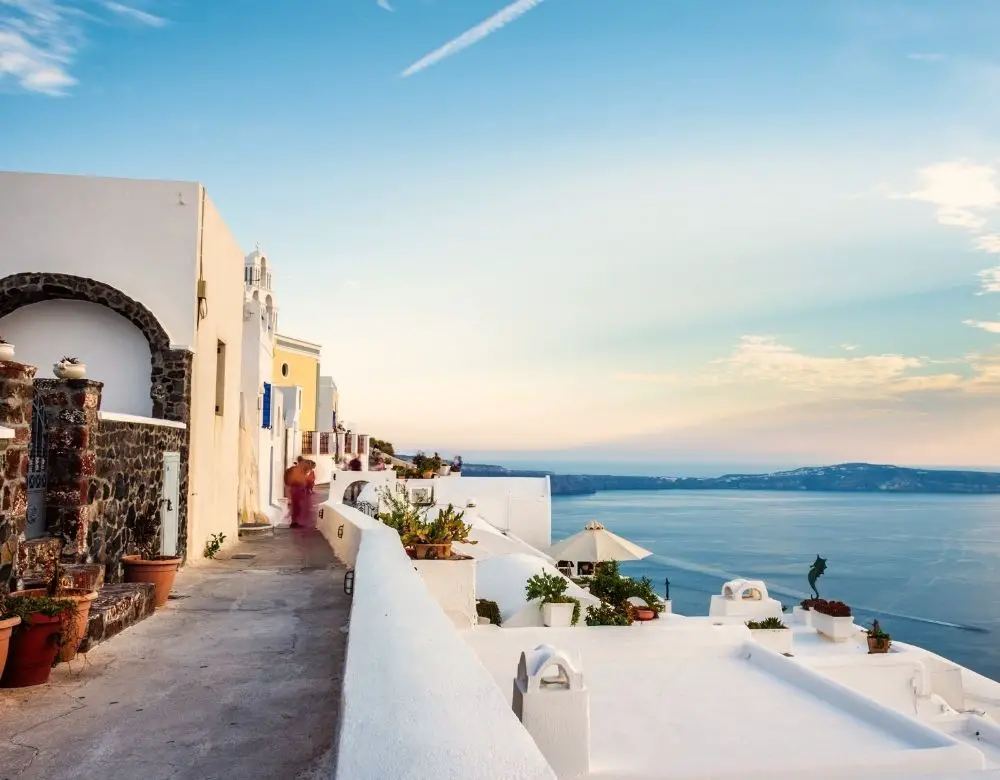
Cyclades: Naxos, Santorini, Mykonos
Eptanisa: Cephalonia, Zakynthos, Corfu
It is hard to answer this question without knowing the travel style of each visitor. But since people tend to ask for the “most expensive Greek islands” we will try our best to answer it. The most popular and biggest islands tend to also be the most expensive. Santorini and Mykonos are definitely at the top of the list. The demand is high, supplies, food are brought in from the mainland and drinking water from the tap is not possible. One exception in regards to size are the islands of the North Aegean that see far fewer international visitors than the Cyclades or the Ionian islands.
- Tip: Popular islands may have higher costs in accomodation but are easier and cheaper to reach than others. Smaller far away islands may have no airport and require more than 12hours in a ferry to reach. You should pick whatever sounds best for you!
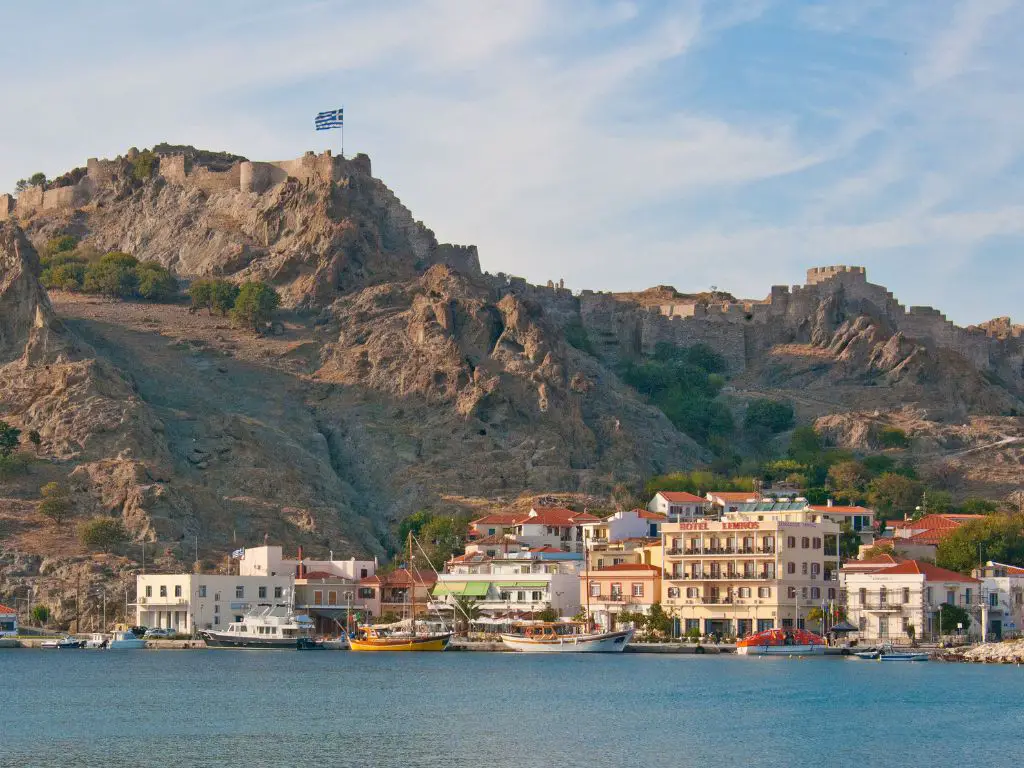
Dodecanese: Nisyros, Symi, Karpathos
Cyclades: Kythnos, Sifnos, Kea, Kimolos, Serifos, Andros,
Northern Aegean: Ikaria, Thassos, Lemnos, Lesvos, Samothrace
Eptanisa: Ithaka
Other: Euboea, Aegina
Greece is in general a very affordable destination for international visitors. Mykonos and Santorini can still be visited on a budget but if you want the most bang for your buck and are not after fine dining or luxury accomodation there are a lot of options for you. One general advice is to look at the “ Greek Islands With Airports ” list above, and remove them from your list. Smaller, harder to reach islands will be more traditional, authentic and representative of the pace and lifestyle of Greek people. Reaching these islands, however, may require more planning especially if you want to island-hop.
- Tip: In the most popular islands, locals that work in tourism work long hours from the start of the season in April till late October. If you want to meet and chat to locals try visiting smaller islands that are not dependant on tourism or come during the off-season.
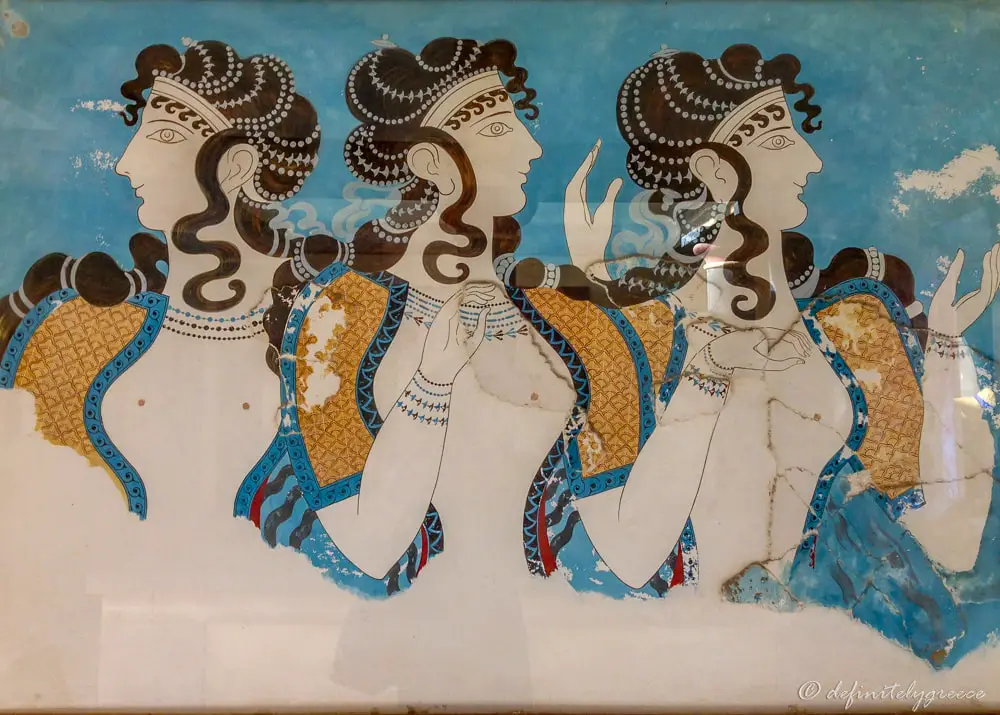
Dodecanese: Patmos, Kos, Rhodes
Cyclades: Naxos, Santorini, Delos
Northern Aegean: Lemnos, Chios
Eptanisa: Kythira, Corfu
Other Crete
For history lovers, Greece, in general, is full of traces of its ancient past. While most people know of the Parthenon in Athens and maybe the ancient theatre of Epidaurus, some of the Greek islands are home to imposing castles, ancient ruins and impressive monuments from different periods. Rhodes is home to the second most visited ancient site after the Acropolis in Athens. In Santorini, you can see the excavations that have been taking place at the Akrotiri peninsula that date back to the Minoan period. While in Crete, you will find the grand palace of Knossos that could very well be one of the earliest European cities.
- Tip: Delos is an island that has been uninhabited since the 7th century AD. To explore this archaeological place you need to travel from one of the neighborhing islands, like Mykonos, Naxos, Paros or Tinos.
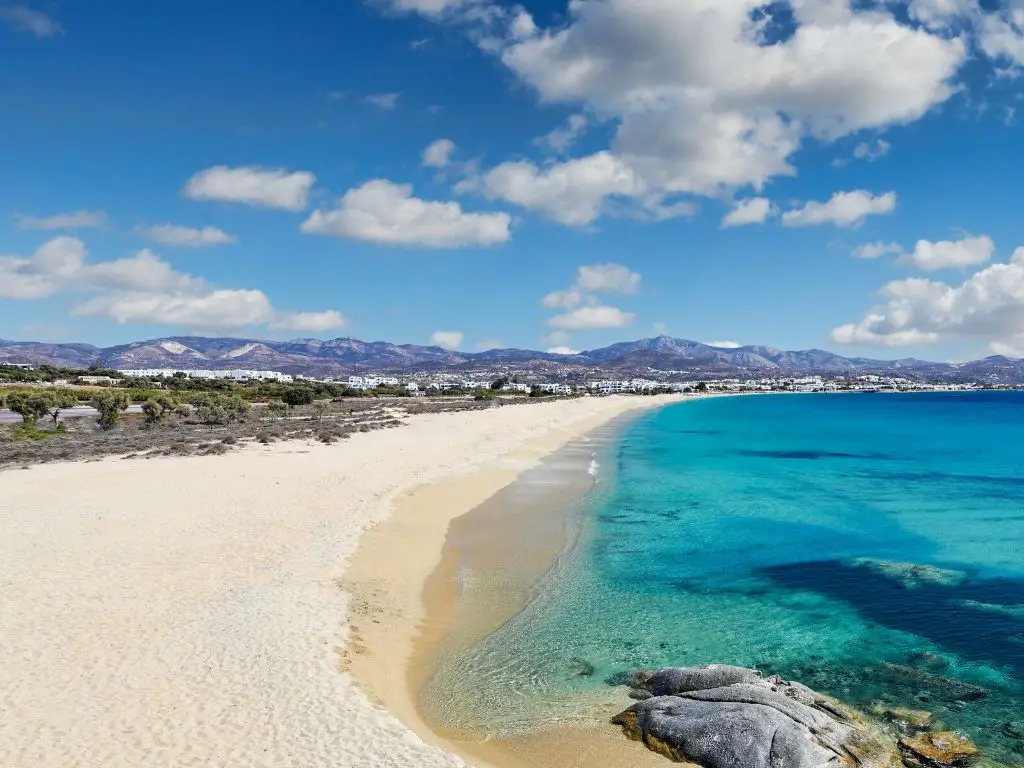
Dodecanese: Karpathos, Rhodes
Cyclades: Naxos, Paros, Antiparos
Northern Aegean: Lemnos
Eptanisa Lefkada
Naxos is arguably the most well known destination in Greece for windsurfing and kitesurfing. If you want to get amongst the action, the nearby Paros and Antiparos also offer ideal wind conditions and organized clubs whether you are an expert or a new fan that requires a few lessons. In the Northern Aegean, the vast Keros Beach in Lemnos is a favourite for locals and visitors. The beach is on the east coast of the island and is always windy, so if you are not planning to kite or surf, this might not be for you.
- Tip: If you want to experience the verdant landscape of the Ionian islands you should consider Lefkada. In addition to having some of the most beautiful beaches in all of Greece, Lefkada’s sandy Vassiliki Beach on the south coast, is the perfect spot for windsurfing enthusiasts.
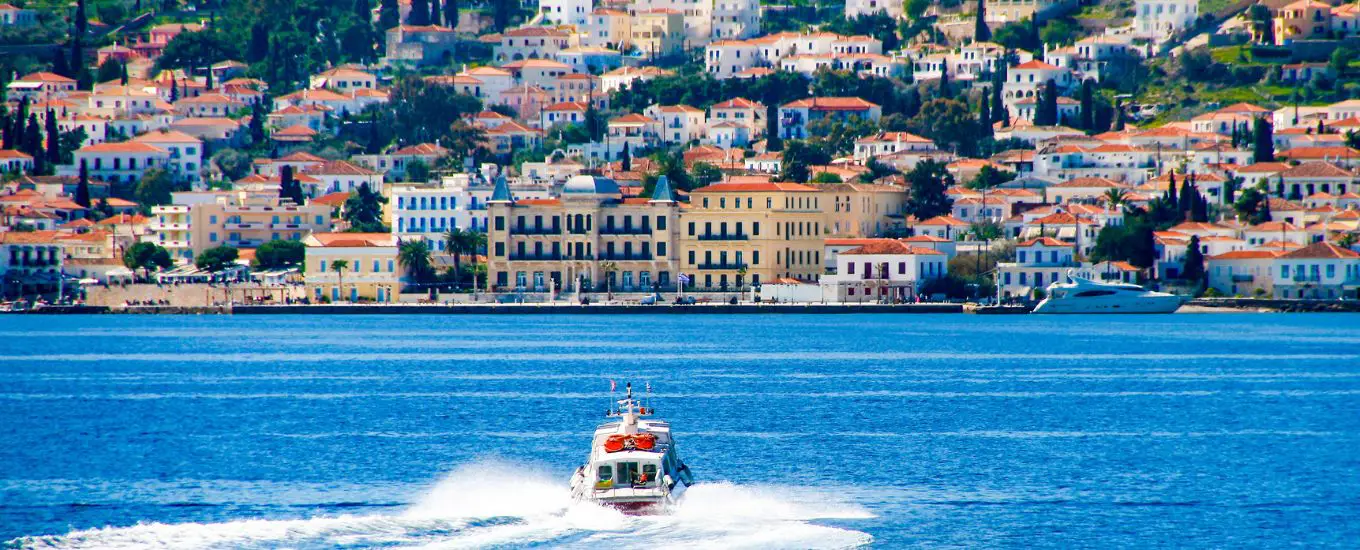
Cyclades : Santorini, Anafi, Naxos, Koufonisia
Saronic : Hydra, Spetses
There are two reasons why you travel somewhere without a car. The first is that cars are strictly not allowed on the island, just like in the case of Hydra and Spetses. Alternatively you may wish to spend your holidays free of cars because you have no drivers licence or would rather skip the cost of hiring a car. If that sounds like you, the smallest islands of the list like Koufonisia, Anafi or bigger islands like Naxos that has good public transport is ideal.
- Tip: Driving in Santorini is a good option for those that want the flexibility of exploring the whole island and are not scared to share the narrow alleyways with big tour buses. By not renting a vehicle you may need to stay around certain locations like Oia or Fira, or spend a bit extra on taxis and skip the hassle of finding a parking spot.
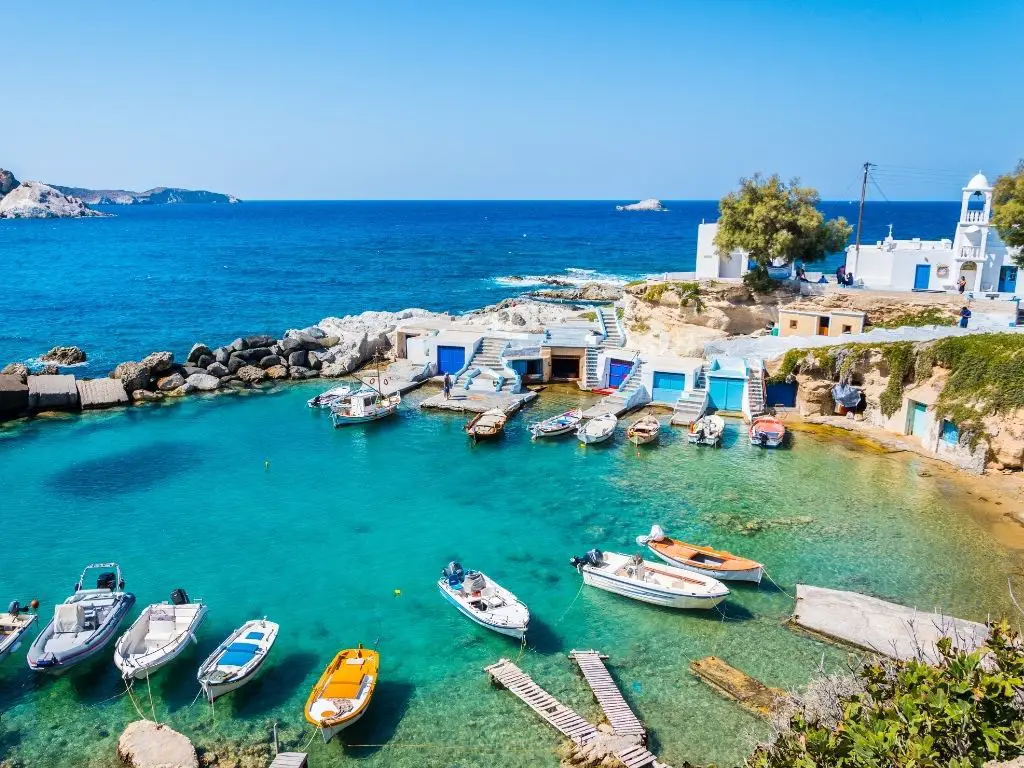
Cyclades: Santorini, Mykonos, Milos
Eptanisa: Kefalonia, Zakynthos
All of the Greek islands are incredibly beautiful! But it would hard to deny that some of them feature more prominently on Instagram feeds. As a result, there are certain images that have become iconic of these islands. In Mykonos, you think of the colourful houses of Little Venice getting bashed by the waves and that “alleyway” shot with the crisp white walls and Pinterest worthy cushions that look out to sea. Try to search for Santorini and we will be surprised if you don’t instantly spot a sea of blue church domes looking out at sunset light. And as far as Milos goes, the moon like reflections of the rocks around Sarakiniko beach are front and centre every time.
- Tip: One of the most famous beaches in Crete is Elafonisi with its unique pink-hued sand. The up and coming competitor is Seitan Limania. A small beach that until recently was inaccessible, now is there to reward visitors that brave the steep and windy ride.
*Disclaimer: This page includes affiliate links. If you decide to book something through one of them, I might get a little bonus, but it won't cost you anything extra.*
Discover the Athenian Riviera
Don't forget to use the discount code "DefinitelyGreece" and get 5% OFF
Related Articles
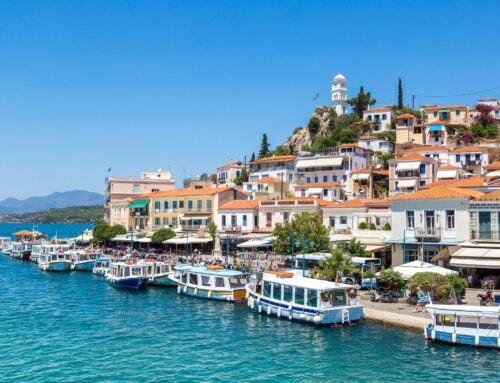
5 Islands Close To Athens For A Quick Getaway
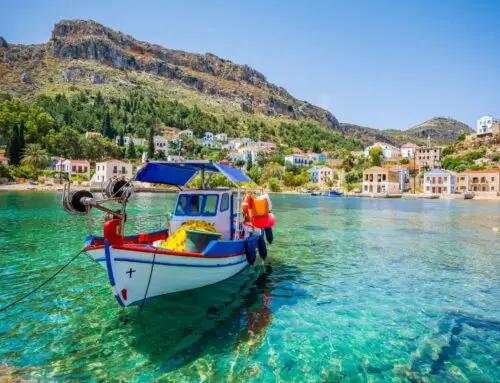
4 Small Greek Islands That Will Leave A Big Impression
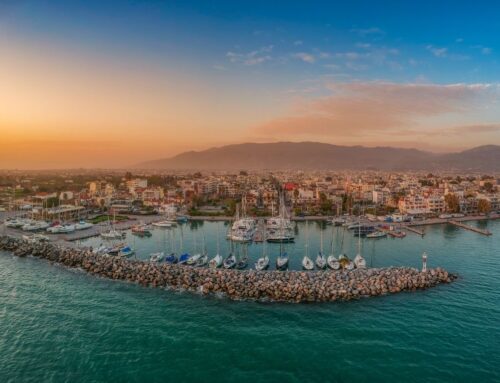
5 Magical Peloponnese Cities You Need To See
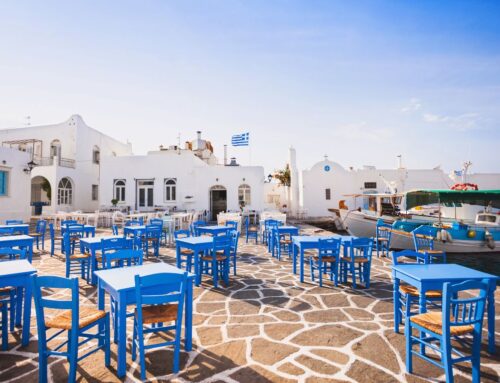
10 Of The Most Amazing Things To Do In Paros
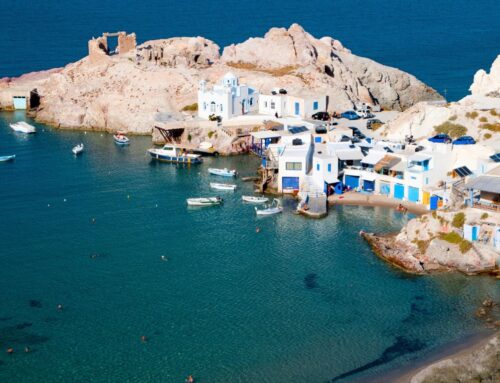
The Best Things To Do In Milos For Summer
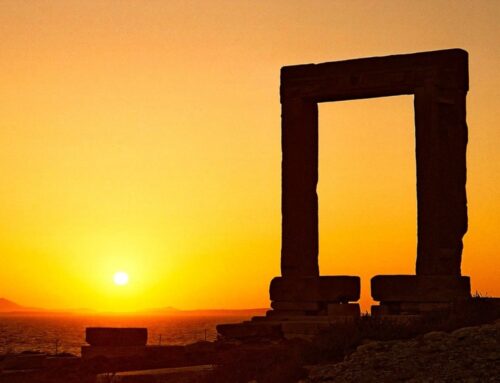
20 Impressive Landmarks In Greece You Have To See
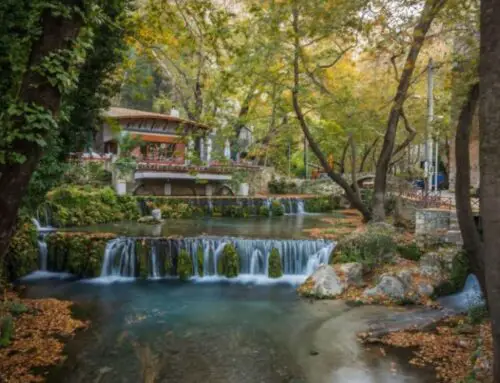
10 Things To Do In The Little Town Of Livadeia
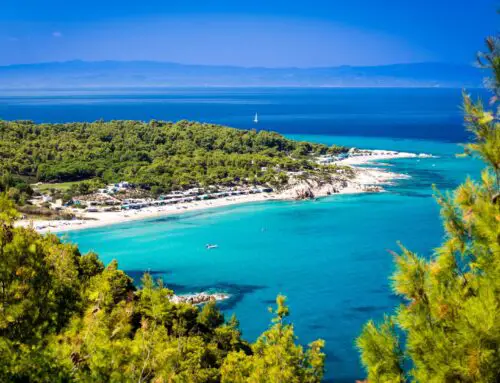
10 Places To See in Mainland Greece Before Leaving For The Islands
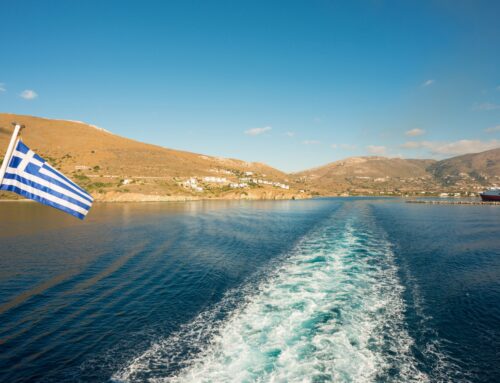
The Best Of Greece – The Perfect Greek Island Hopping Itinerary

10 Incredible Ancient Greek Sites To Add To Your Bucket List

One trip can last a lifetime. Let’s begin!
INFORMATION
GET IN TOUCH
© 2024 – All rights reserved. • Powered by WordPress
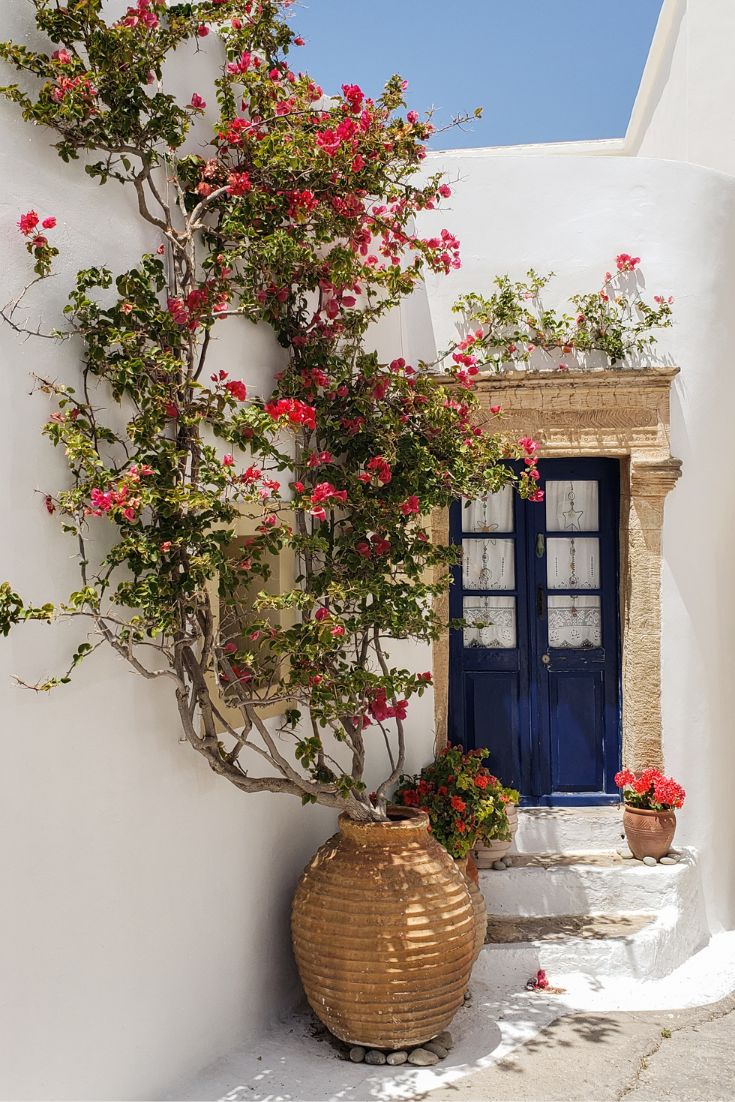
Greece has the longest coastline in Europe and is the southernmost country in Europe.
Greece has the longest coastline in Europe and is the southernmost country in Europe. The mainland has rugged mountains, forests, and lakes, but the country is well known for the thousands of islands dotting the blue Aegean Sea to the east, the Mediterranean Sea to the south, and the Ionian Sea to the west.
The country is divided into three geographical regions: the mainland, the islands, and Peloponnese, the peninsula south of the mainland.
The Pindus mountain range on the mainland contains one of the world's deepest gorges, Vikos Gorge, which plunges 3,600 feet (1,100 meters). Mount Olympus is Greece's highest mountain at 9,570 feet (2,917 meters) above sea level. Ancient Greeks believed it was the home of the gods . Mount Olympus became the first national park in Greece.
Map created by National Geographic Maps
PEOPLE & CULTURE
Family life is a very important part of life in Greece. Children often live with their parents even after they get married. Greeks live long lives and it is thought that their varied diet of olives, olive oil, lamb, fish, squid, chickpeas, and lots of fruits and vegetables keep them healthy.
Nearly two-thirds of the people live in large cities. Athens is the largest city, with over 3.7 million people crowding the metropolis. Nefos, the Greek term for smog, is a big problem in Athens. The Parthenon, the temple to goddess Athena atop the Acropolis, is deteriorating due to pollution and acid rain.
Olive trees have been cultivated in Greece for over 6,000 years. Every village has its own olive groves.
Most of the country was forested at one time. Over the centuries, the forests were cut down for firewood, lumber, and to make room for farms. Today, forests can be found mainly in the Pindus and Rhodope ranges.
Greece has ten national parks and there is an effort to protect natural and historic landmarks. Marine parks help protect the habitats of two of Europe's most endangered sea creatures, the loggerhead turtle and monk seal. The long coastline and clear water make Greece an ideal location to spot sea stars , sea anemones, sponges, and seahorses hiding in the seaweed.
The Greek landscape is covered by maquis, a tangle of thorny shrubs that don't need a lot of water. These plants include fragrant herbs such as thyme, rosemary, oregano, and bay and myrtle trees. Bird watching is popular in Greece where geese, ducks, and swallows stop over during their migration from Africa to Europe.
Greece abolished their monarchy in 1975 and became a parliamentary republic. Under the new constitution, there is a president and a prime minister. The prime minister has the most power, and is the leader of the party that has the most seats in the parliament. The president selects cabinet ministers who run government departments.
The parliament, called the Vouli, has only one house with 300 members who are elected every four years. Greece became part of the European Union in 1981.
Percy Jackson and the Olympians is now on Disney+.
The first great civilization in Greece was the Minoan culture on the island of Crete around 2000 B.C. Wall paintings found at the ruins of the palace Knossos show people doing backflips over a charging bull. The Minoans were conquered by the Myceneans from the mainland in 1450 B.C.
During ancient times the country was divided into city-states, which were ruled by noblemen. The largest were Athens, Sparta, Thebes, and Corinth. Each state controlled the territory around a single city. They were often at war with each other.
Athens became the most powerful, and in 508 B.C., the people instituted a new system of rule by the people called democracy. But during that time, only men could vote!
The first Olympic Games were held in the southern city of Olympia in 700 B.C. to honor Zeus, the king of the gods. Only men could compete in the events such as sprinting, long jump, discus, javelin, wrestling, and chariot racing. The games were banned by the Romans in A.D. 393, but began again in Athens in 1896.
Greece was ruled by foreigners for over 2,000 years beginning with the Romans conquering the Greeks in the 2nd century. Then, after almost 400 years under Turkish rule, Greece won independence in 1832.
The Walt Disney Company is majority owner of National Geographic Media.
More to explore
U.s. states and territories facts and photos, destination world.
- Terms of Use
- Privacy Policy
- Your California Privacy Rights
- Children's Online Privacy Policy
- Interest-Based Ads
- About Nielsen Measurement
- Do Not Sell My Info
- National Geographic
- National Geographic Education
- Shop Nat Geo
- Customer Service
- Manage Your Subscription
Copyright © 1996-2015 National Geographic Society Copyright © 2015-2024 National Geographic Partners, LLC. All rights reserved
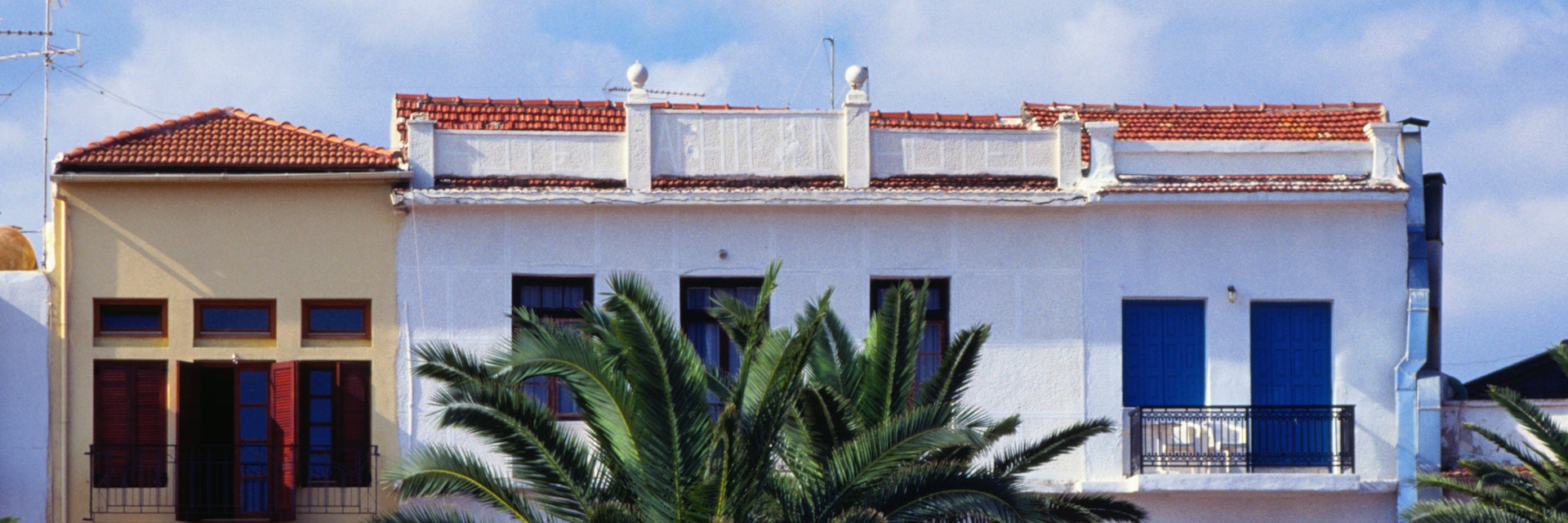
Greek Islands
The Greek islands ignite the imagination and satisfy the soul with a history laced in mythical tales and told through ancient, sun-bleached ruins.
Leave the planning to a local expert
Experience the real Greek Islands. Let a local expert handle the planning for you.
Attractions
Must-see attractions.
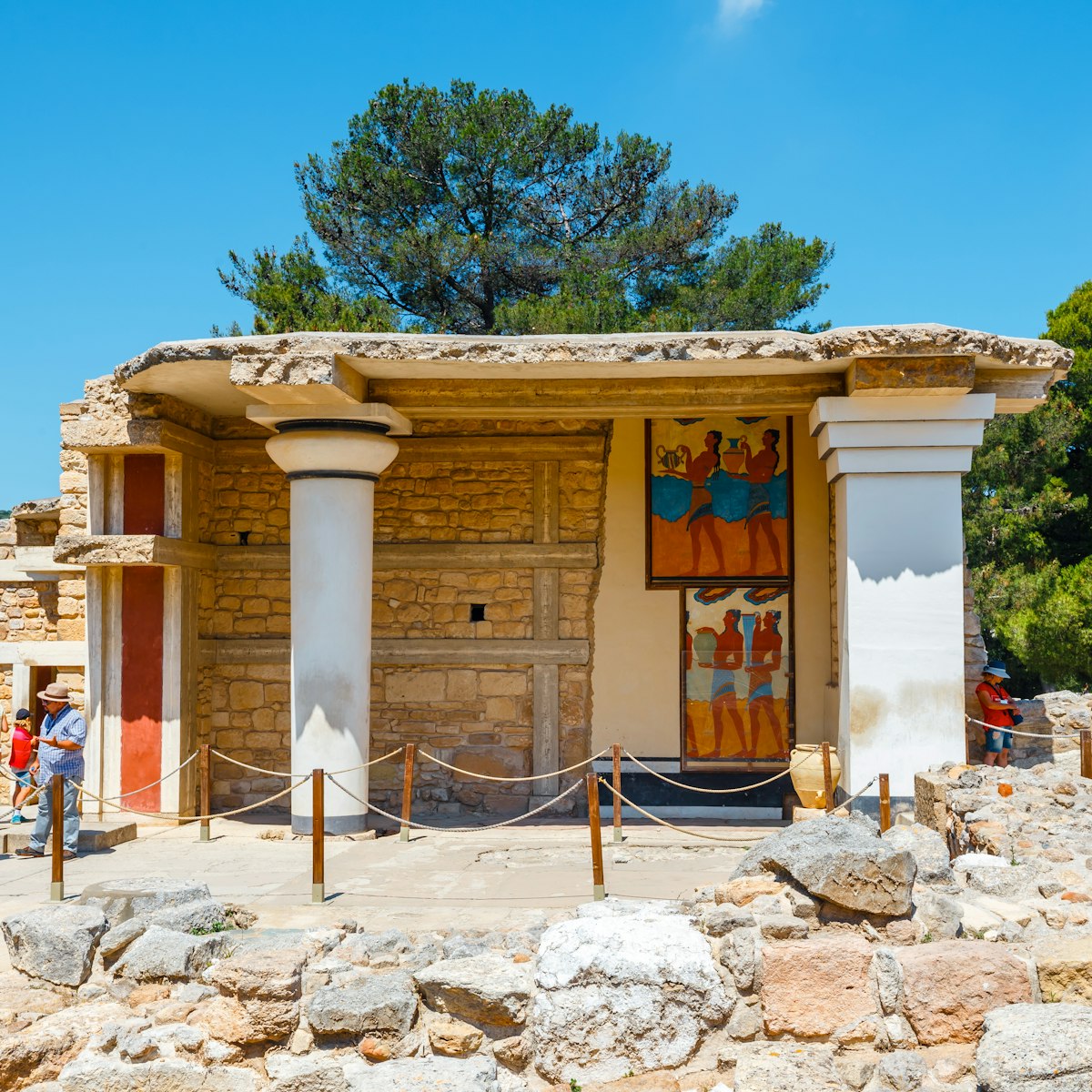
Palace of Knossos
Crete’s most famous historical attraction is the Palace of Knossos, the grand capital of Minoan Crete, located 5km south of the city of Iraklio. The…
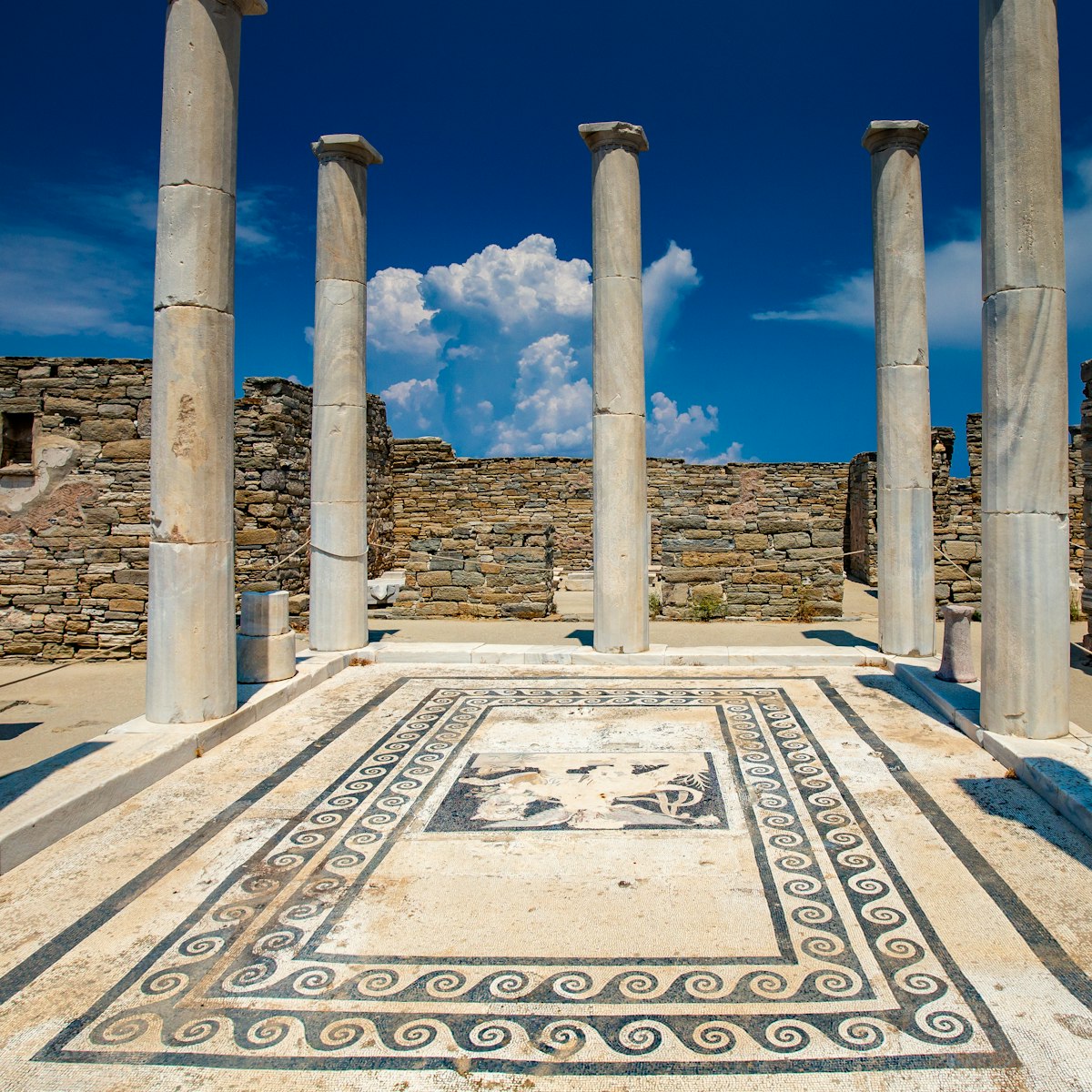
Ancient Delos
Delos has a special place in Greek mythology. When Leto was pregnant with twins Apollo and Artemis, she was relentlessly pursued by a vengeful Hera – the…
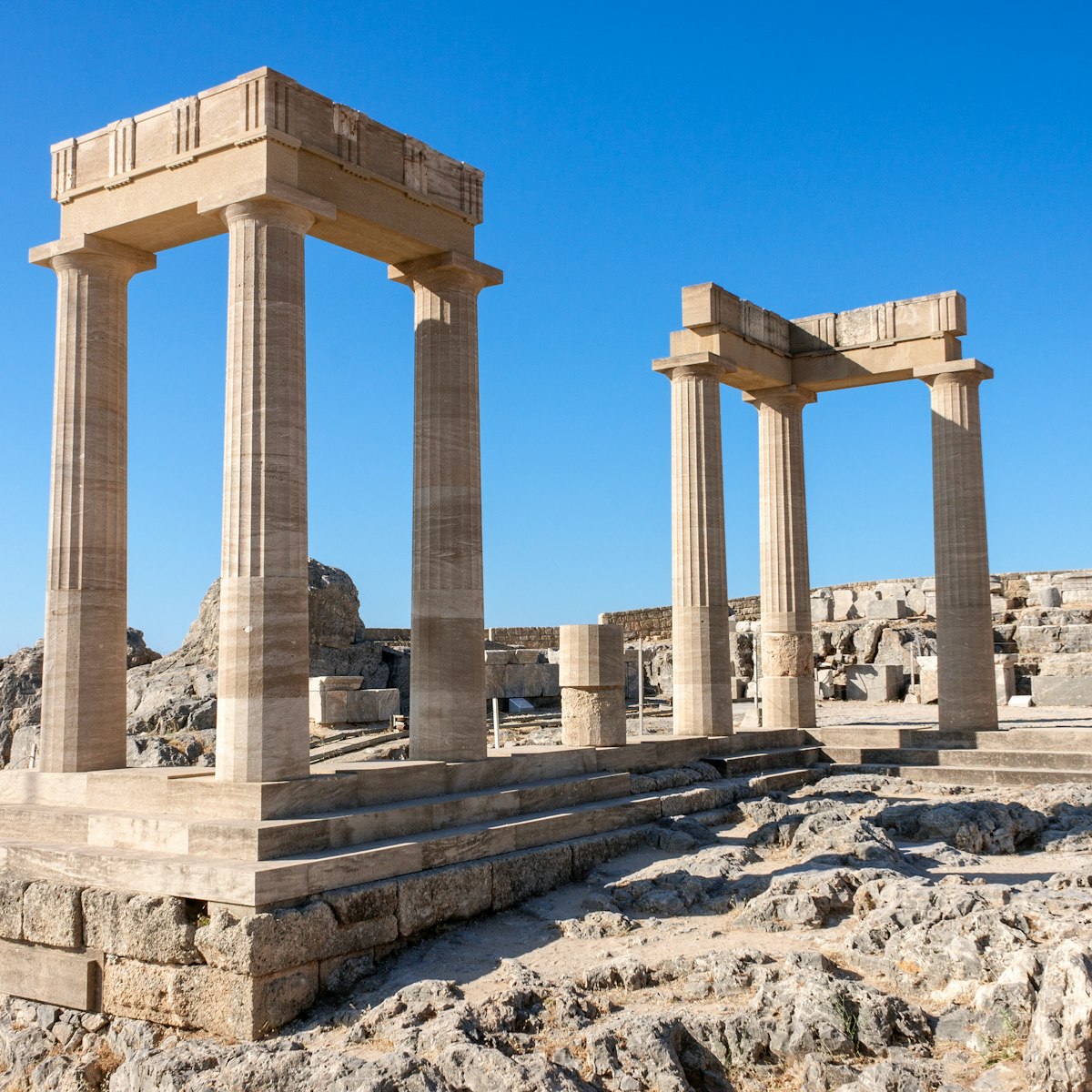
Acropolis of Lindos
A short, steep-stepped footpath climbs the rocky 116m-high headland above the village to reach Lindos’ beautifully preserved Acropolis. First fortified in…
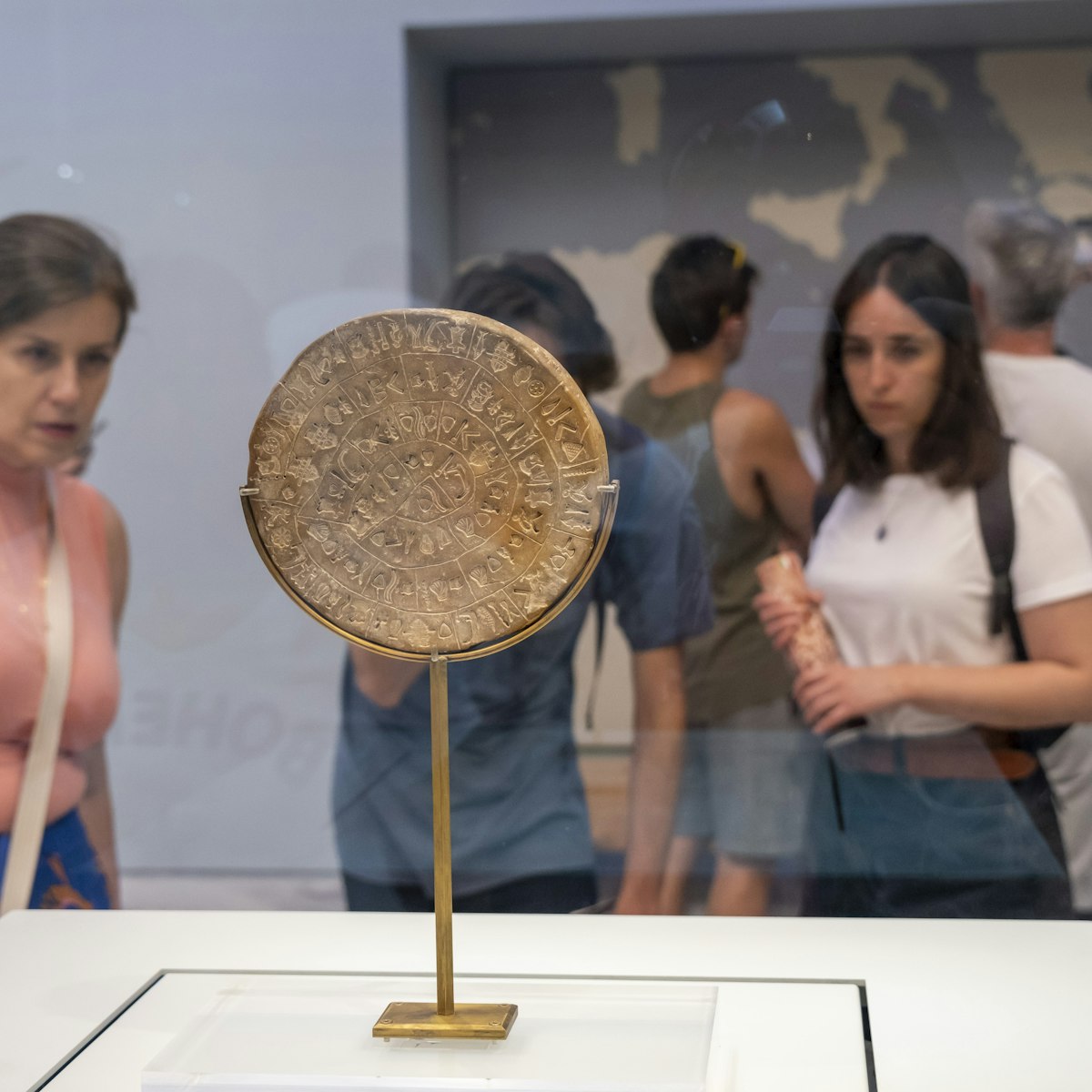
Heraklion Archaeological Museum
This state-of-the-art museum is one of the largest and most important in Greece. The two-storey revamped 1930s Bauhaus building makes a gleaming showcase…
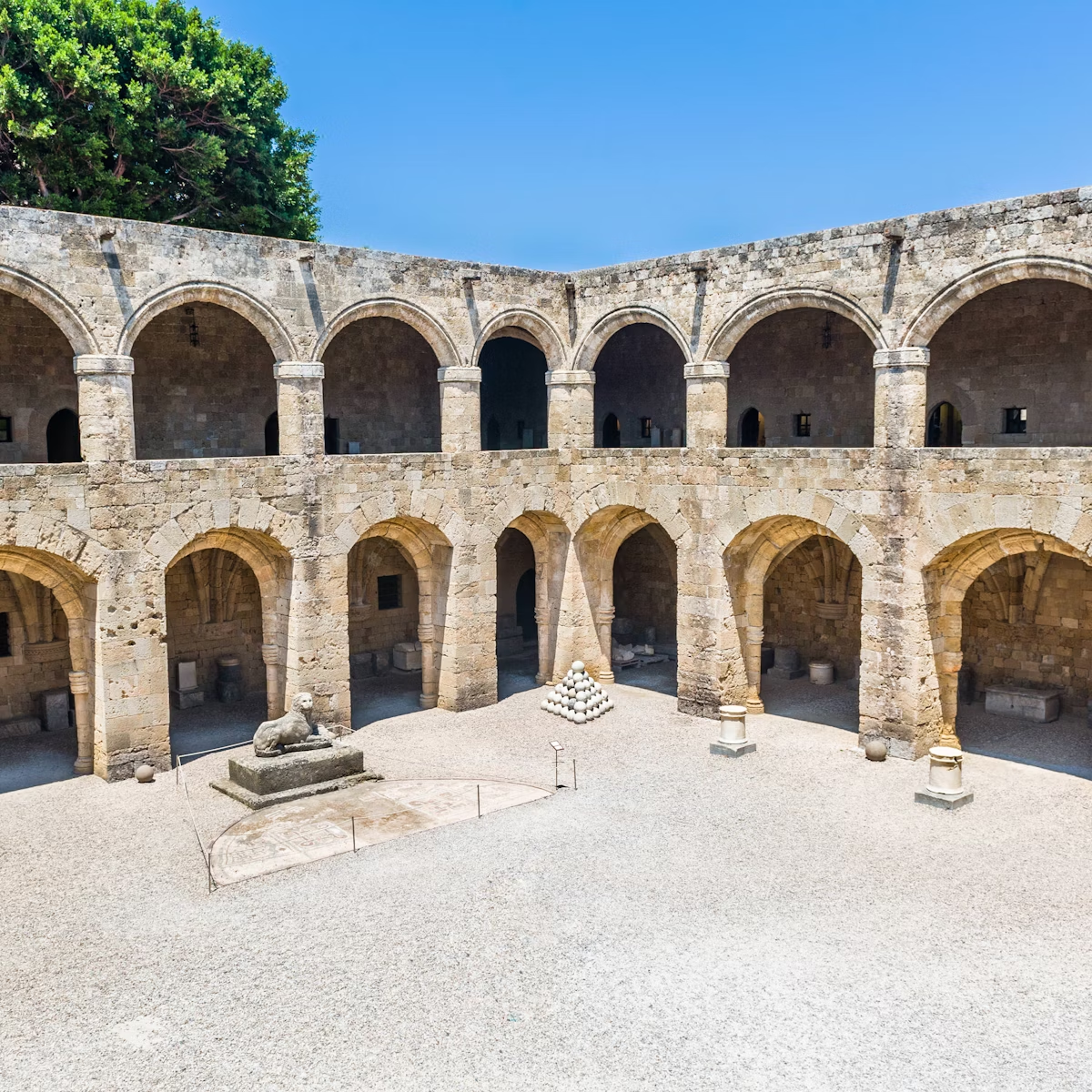
Archaeological Museum
Rhodes Town
A weathered, sun-kissed stone lion, visible from the street, invites visitors into the magnificent 15th-century Knights' Hospital that holds Rhodes’…
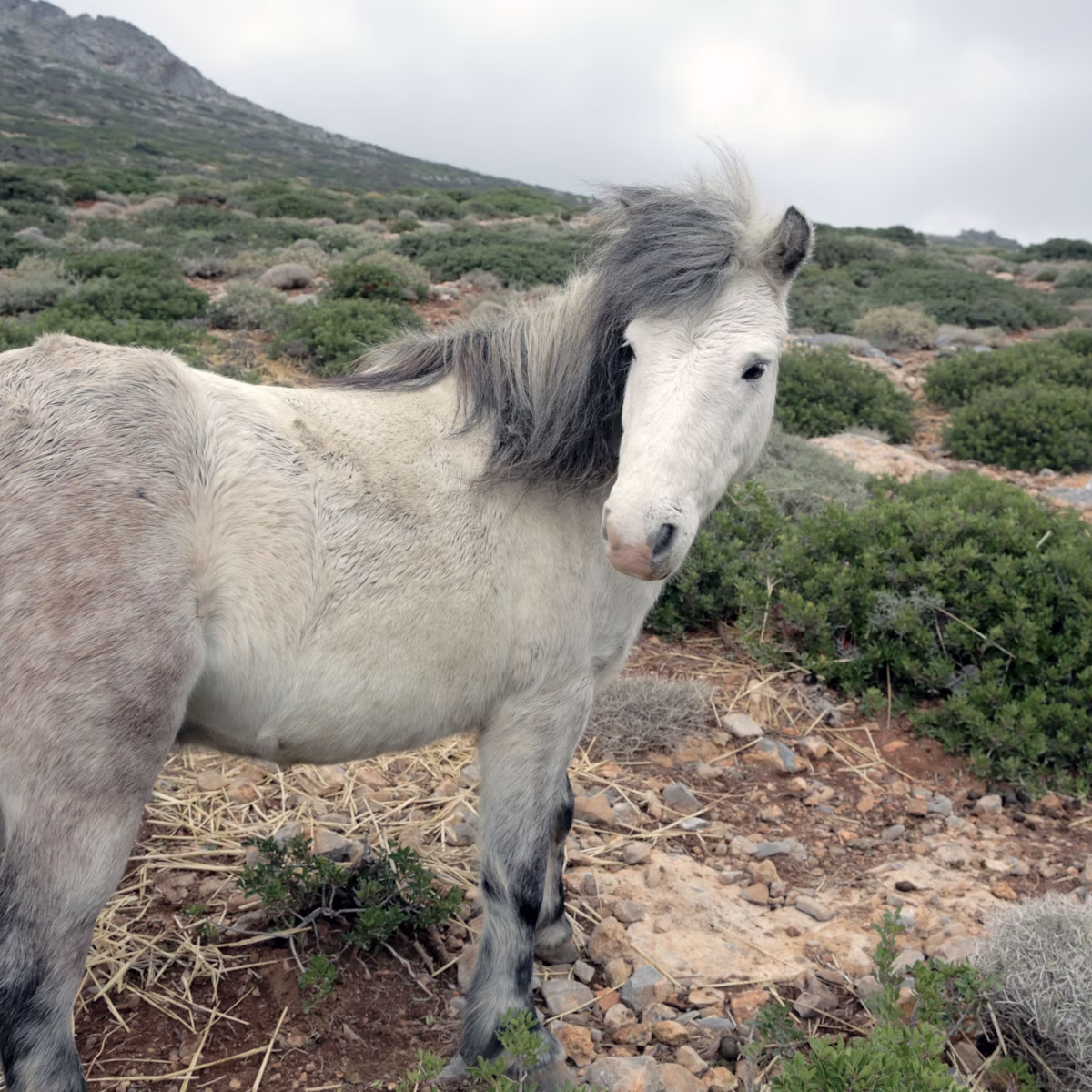
Skyros Island Horse Trust
At the forefront of efforts to protect the endangered Skyrian horse, this inspiring ranch, 10km northwest of Skyros Town in Trachi, is the brainchild of…
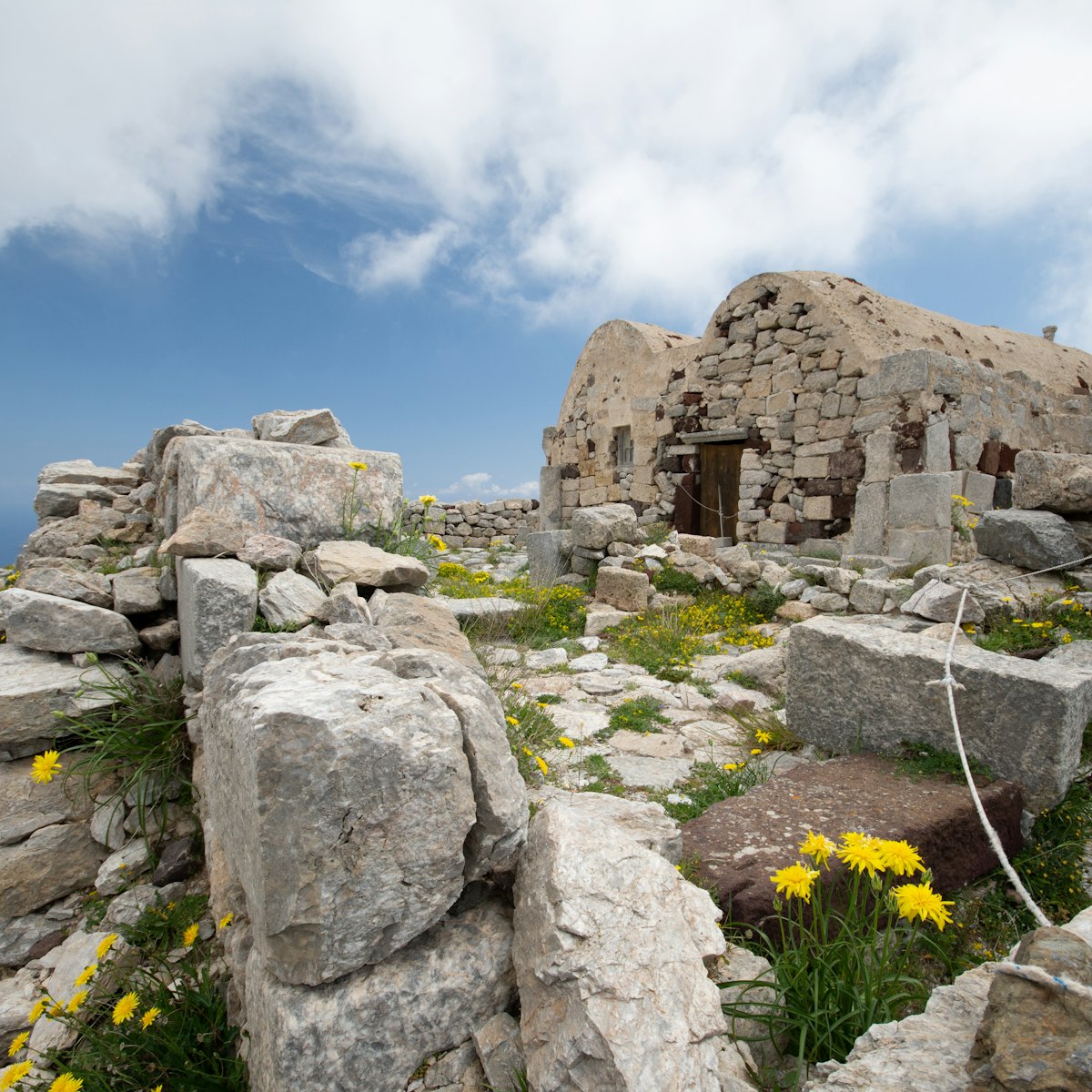
Ancient Thira
First settled by the Dorians in the 9th century BC, Ancient Thira consists of Hellenistic, Roman and Byzantine ruins and is an atmospheric and rewarding…
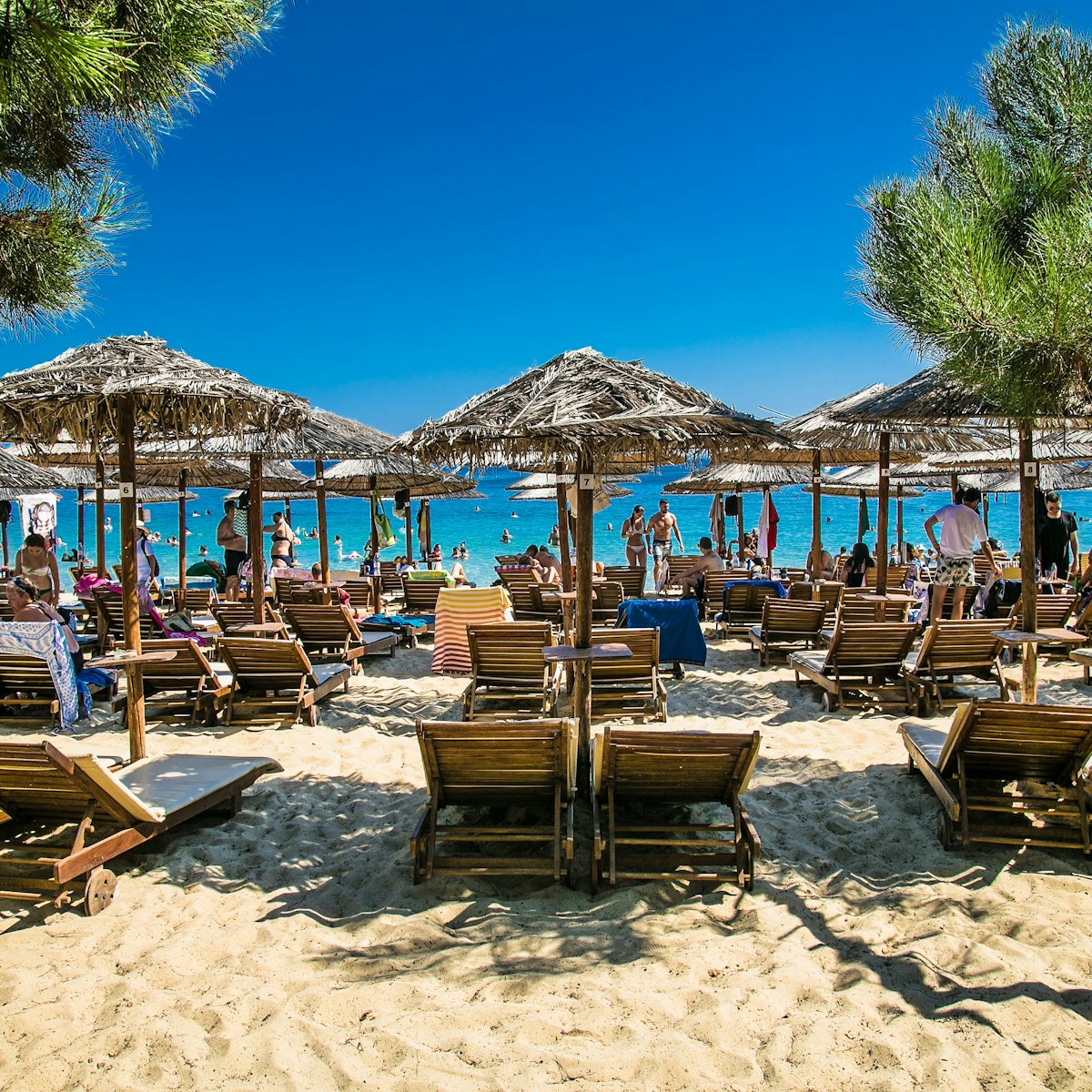
Koukounaries Beach
Framed by electric-green pine trees, two forested headlands and a small salt-water wetland, Koukounaries' silky 1200m-long sweep of bleach-blonde sand is…
Plan with a local
Experience the real Greece
Let a local expert craft your dream trip.
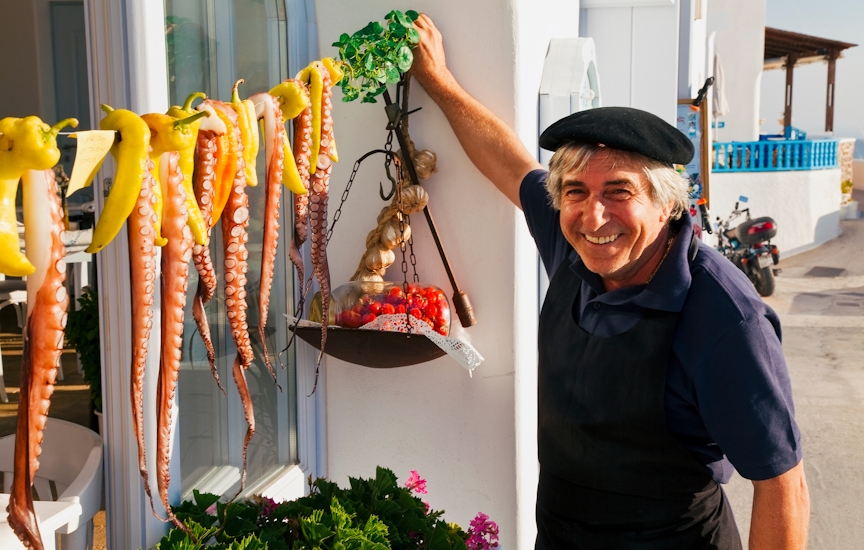
Latest stories from Greek Islands
Filter by interest:
- All Interests
- Adventure Travel
- Art & Culture
- Beaches, Coasts & Islands
- Food & Drink
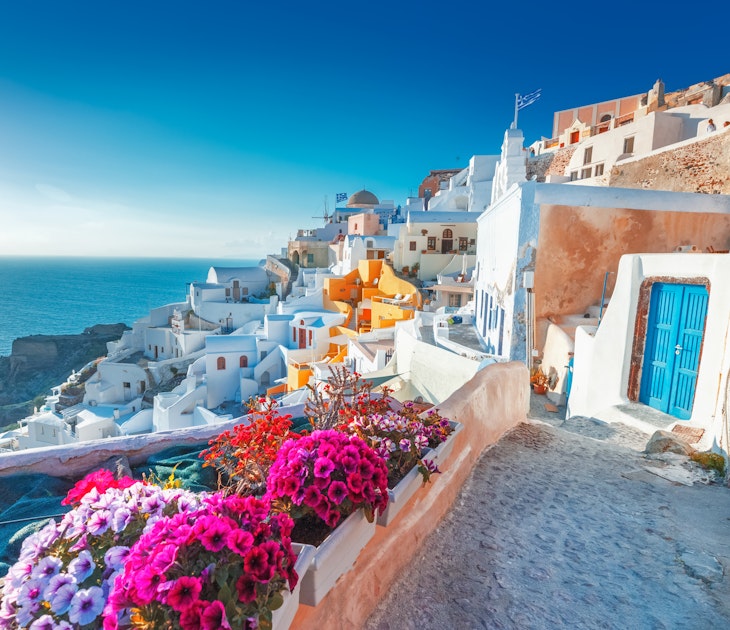
Sep 16, 2021 • 5 min read
The Greek islands offer deserted beaches, active volcanoes and everything in between. Let us help you decide on the perfect island paradise for you.
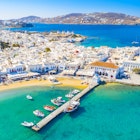
Aug 26, 2021 • 8 min read
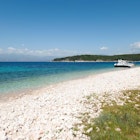
Dec 23, 2020 • 2 min read
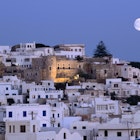
Apr 2, 2020 • 6 min read
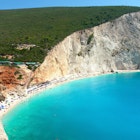
Jun 28, 2019 • 2 min read
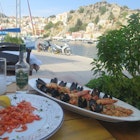
Feb 14, 2019 • 7 min read
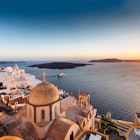
Jan 10, 2019 • 1 min read
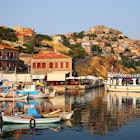
Jul 13, 2018 • 5 min read
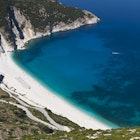
May 6, 2016 • 5 min read
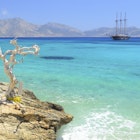
Feb 29, 2016 • 6 min read
in partnership with getyourguide
Book popular activities in Greek Islands
Purchase our award-winning guidebooks.
Get to the heart of Greek Islands with one of our in-depth, award-winning guidebooks, covering maps, itineraries, and expert guidance.
Greek Islands and beyond
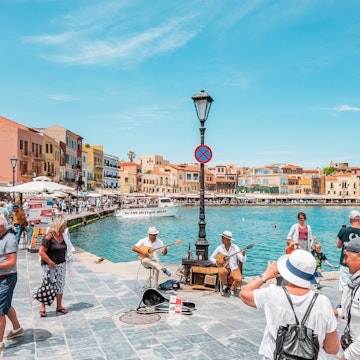
Going Awesome Places
Detailed itineraries + travel guides
The Best Greek Islands Travel Guide – The Ultimate Guide to Island Hopping The Greek Islands
Last Updated May 1, 2024 William Tang
You are here: Home » Travel Guides » The Best Greek Islands Travel Guide – The Ultimate Guide to Island Hopping The Greek Islands
The beautiful sandy beaches, coastal coves, and white-washed villages are what make legendary vacations. If it’s your first time here, it can be overwhelming. Covering multiple seas and thousands of islands, planning a Greek island hopping trip isn’t as straightforward without some research, especially if you plan on island hopping. This Greek Islands travel guide is a must-read for anyone heading there soon, there is also useful information that will be helpful to discover the best Greek Islands to visit for the first time
Let’s dig into the practical things you might already be making plans for, suggest a few things you may not have already thought of, and let’s delve deeper.
Read more about Greece
- 14 day itinerary Greek Island hopping in the Western Cyclades
- Athens 2 day itinerary
- How to get from Athens to Santorini
- Is Santorini worth it?
- Read more Greece travel tips
TOP TIPS FOR THE GREEK ISLANDS
- Where to stay – Our two favorite properties on our island hopping adventure were Prekas Apartments in Santorini and Giannoulis Hotel in Milos where one had epic views and the other just blew our expectations in terms of comfort and space. We used Booking.com for all of our stays. Alternatively, you can always see if hotel corporate codes might work for you.
- Car rentals – Rent a car to get around the Greek Islands. Save the most money through car rental coupon codes and always start your search with Discover Cars and RentalCars so you know what the best deals are.
- Ferries – You will need to use ferries for island hopping. Get your tickets and check ferry schedules using Ferries in Greece .
- Flights – International flights are never cheap, but with the Skyscanner “Everywhere” feature you can find the best deals. Check how much it would be for you to get to Greece!
- Insurance – Make sure you’re covered for all of your adventure activities with the best travel insurance .
- Hottest deals – Never be without our frequently updated travel deals page .
In This Article
Greek Islands geography
Which islands to visit, getting there, getting around the greek islands, where to stay in the greek islands, what to pack for the greek islands, when to visit the greek islands, how much does a trip to the greek islands cost, 5 main takeaways, frequently asked questions, travel resources for your next trip, the best greek islands travel guide.

This Greek Islands travel guide will primarily focus on The Cyclades Islands, but it will also have information relevant for those planning trips to the whole Greek Archipelago, which spans 6,000 islands and takes up 7,500 km of the country’s 16,000 km coastline.
WHAT YOU NEED TO KNOW
- 1€ EUR = $1.11 USD = $1.45 CAD
- ATMs can be found all over and the credit cards are widely accepted
- SIM card – The three main companies in Greece are COSMOTE , Vodafone, and WIND . All companies have some sort of pre-paid package available. Some are more aggressive about promoting in Athens with street stands but others you have to visit a shop for. As an example, Vodafone offers 9.2GB for 20 EUR or 4GB for 10 EUR on top of minutes.
- Alternative data options – Airalo is what we used in Greece because eSIMs are so easy nowadays. Make sure to use our code WILLIA9500 to save $3 USD.
- Measurement system – Metric
- Tipping – Not a strong culture of tipping but is expected in the service industry. In general 10% is the rule of thumb.
- L anguage – The official language is Greek .
Back to the top
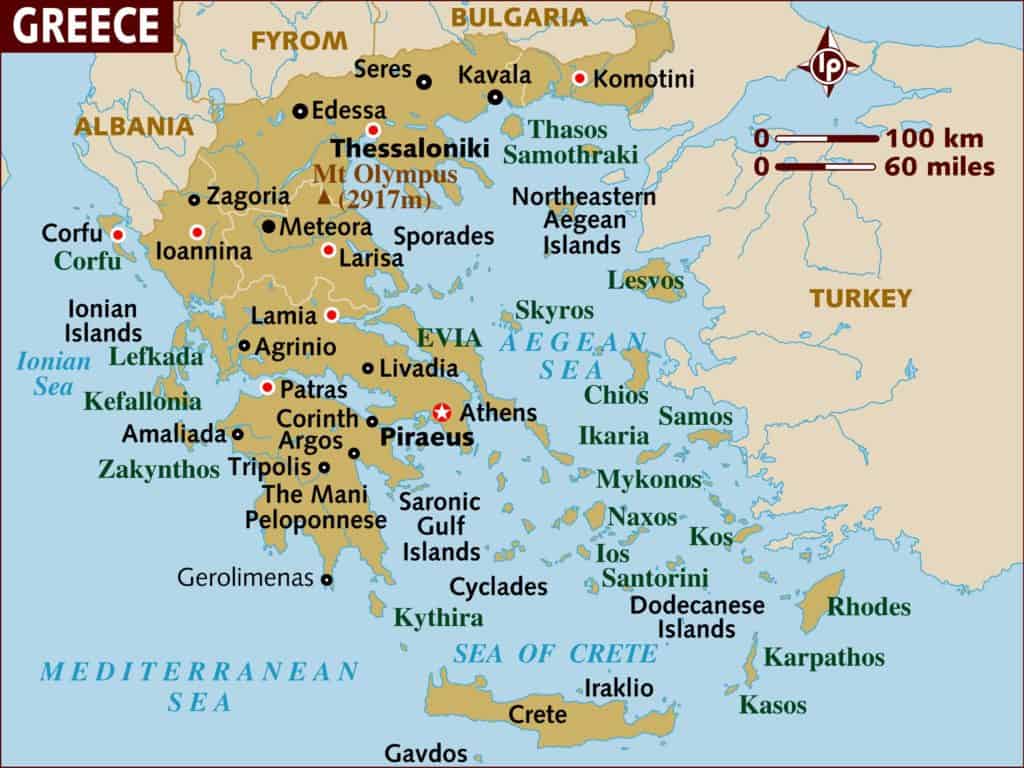
There are at least 6,000 islands in Greece scattered throughout two different seas. To grasp how wide it spans, you need to know the breakdown of these islands and the clusters that form this stunning archipelago.
In this free Greece travel guide we break it down between the two seas that are involved: Aegean and Ionian.
In the image below the boxes give you an idea of some of a few of the clusters of islands that you can visit in Greece.
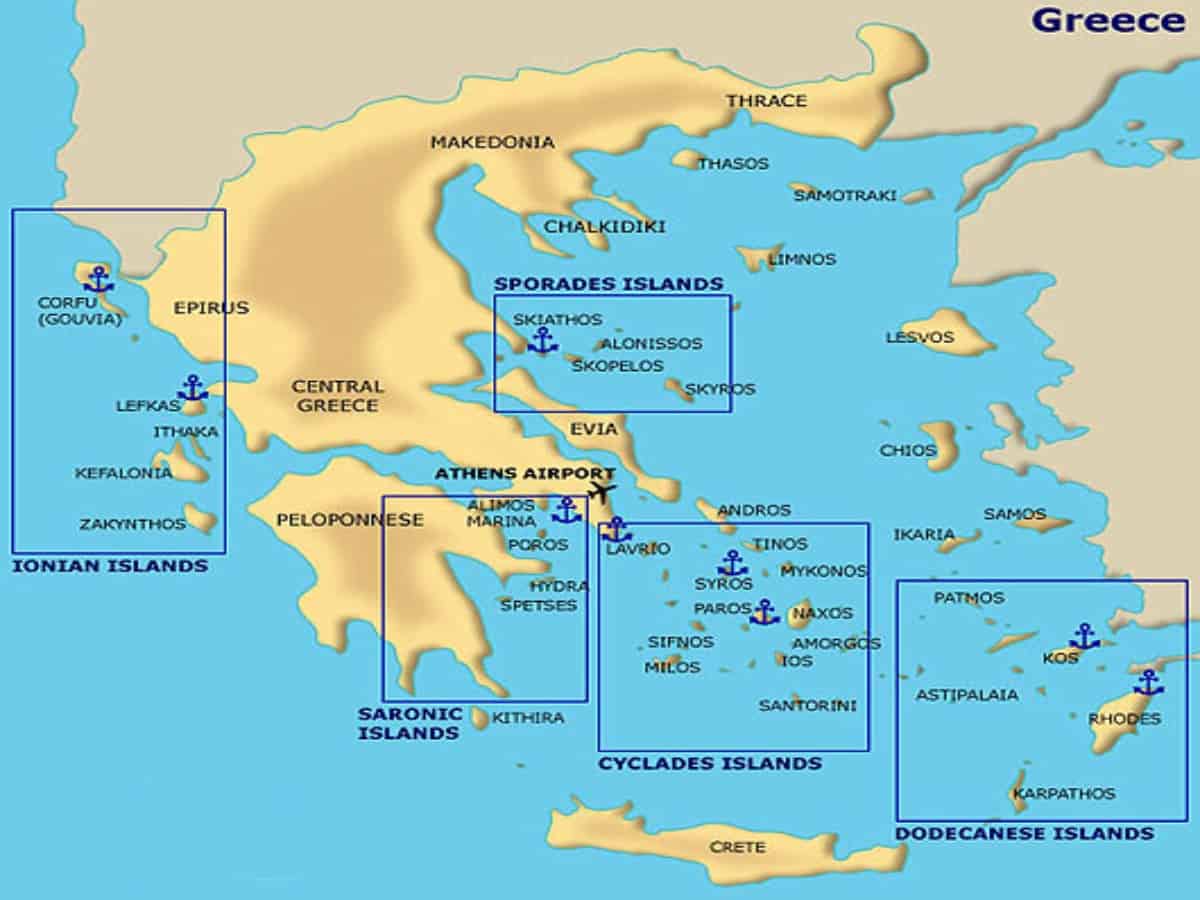
The Northeastern Aegean Islands – Agios Efstratios, Thasos, Ikaria, Lesbos, Limnos, Inouses, Samos, Samothrace, Chios, Psara.
The Sporades Islands – Alonissos, Skiathos, Skopelos, Skyros.
Evia – The island of Evia is the second largest Greek island after Crete and is also known by its ancient name of Euboea. Its close proximity to Athens on mainland Greece makes it a popular destination for the residents of Athens. It is bordered by the region of Viotia, (latinized as Boeotia or Beotia) to the east, with the south touching the Aegean Sea, before spreading into the Evian Gulf.
Islands of Argosaronic – Angistri, Aegena, Methana, Poros, Salamina, Spetses, Hydra.
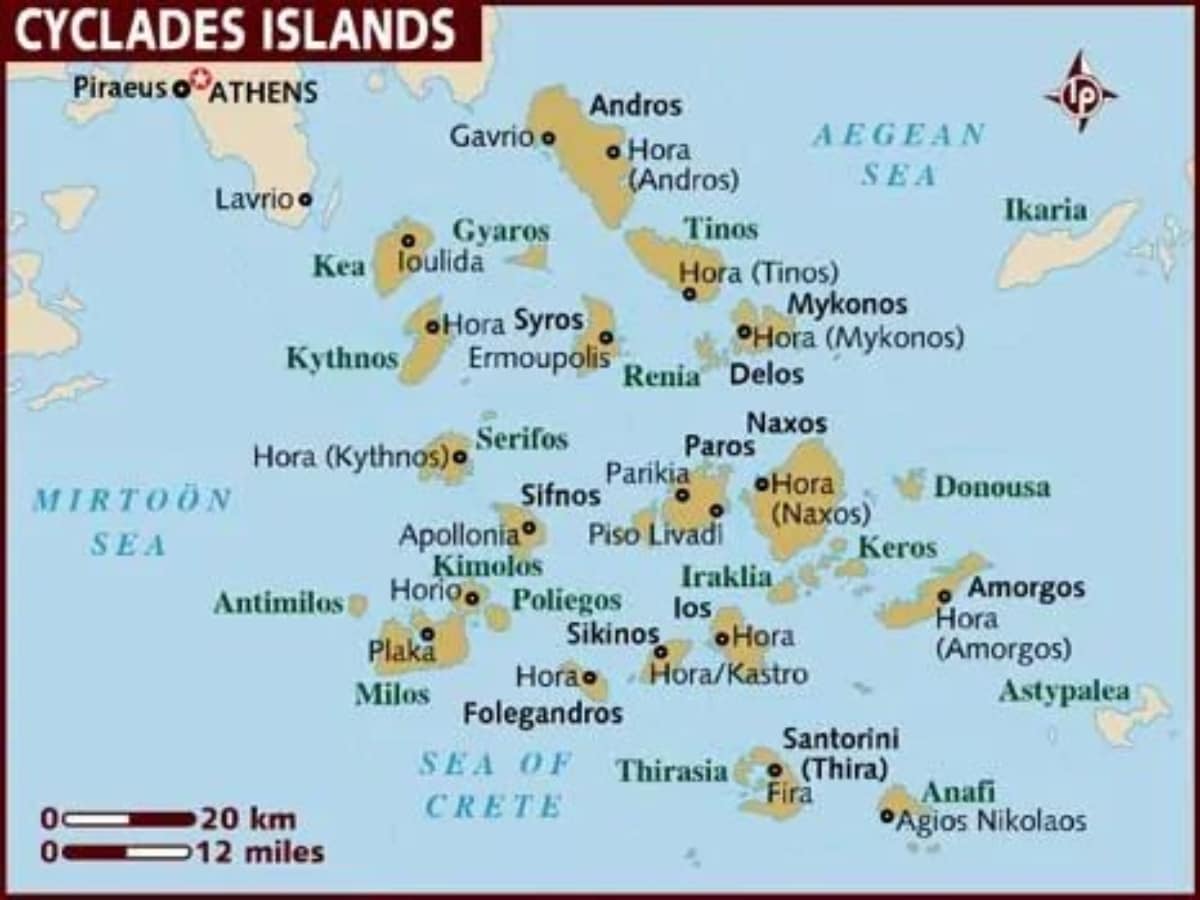
The Cyclades – By far the largest island group with a total of 56 islands, the most important ones being Andros, Antiparos, Delos, Ios, Milos, Mykonos, Naxos, Paros, Santorini, Syros, Folegandros and several others, as well as the ‘Minor Cyclades’ comprising Donousa, Irakleia, Koufonisia and Schinousa.

The Dodecanese – Astypalaia, Kalymnos, Karpathos, Kasos, Kastellorizo, Kos, Lipsi, Leros, Nisyros, Patmos, Rhodes, Symi, Tilos, Chalki.
Crete – Crete is the largest of the Greek islands and is divided into four prefectures: Chania, Rethymno, Heraklion and Lasithi.
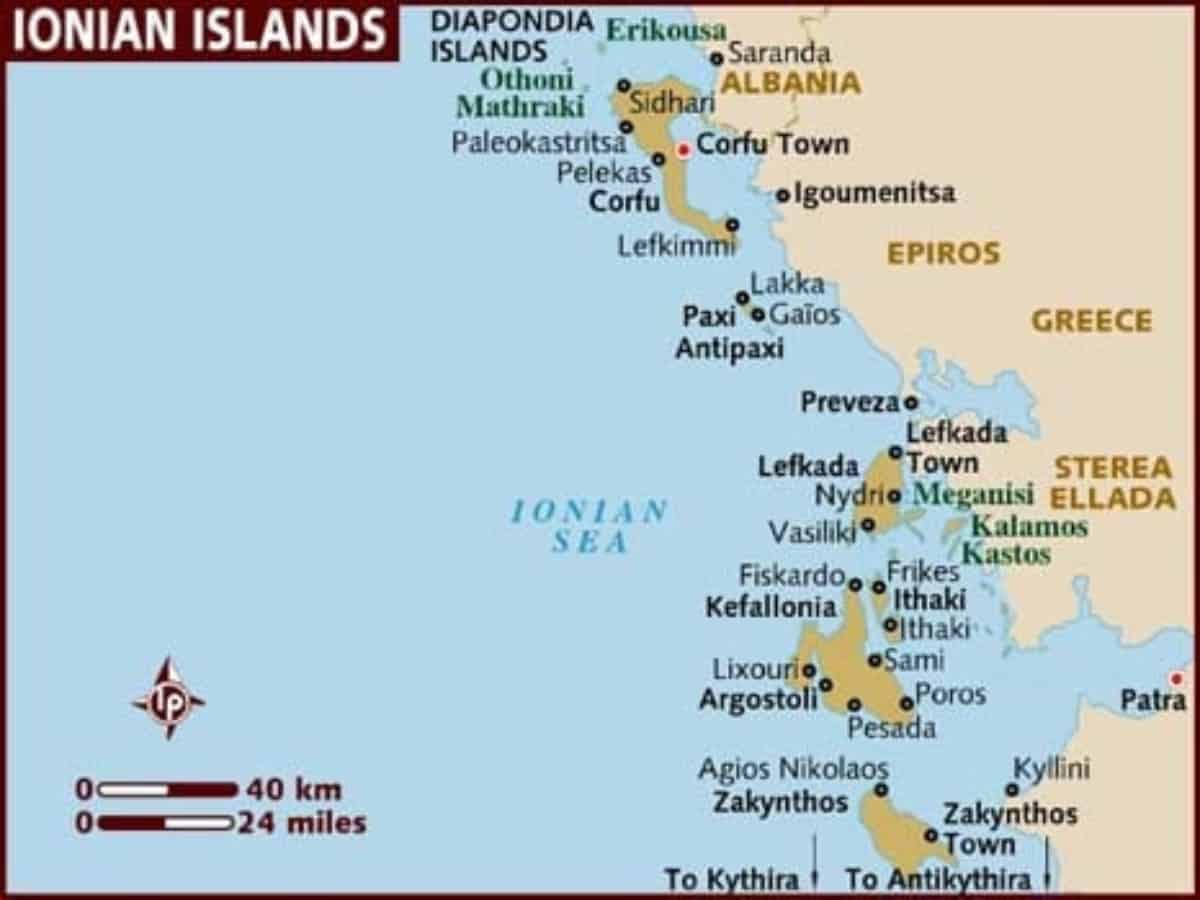
The Ionian Sea is to the west of mainland Greece, and while they may not be as famous as the ones in the Aegean Sea, they are equally beautiful and are often visited more by the local Greeks.
The Ionian Islands – Zakynthos, Ithaca, Corfu, Kefalonia, Lefkada, Paxi, and Kythira
From here, it breaks down into smaller islands – Antipaxi, Ereikoussa, Kalamos, Kastos, Mathraki, Meganissi, Othoni, Skorpios, and Strofades.
There are a few groups of smaller islands that don’t really belong anywhere, including the islands of Gavdos (situated south of Crete), Elafonissos (in the Gulf of Laconia), and Trizonis (in the Gulf of Corinth).
How do you choose which is the “best Greek island to visit”? We wanted to start with a few baseline itineraries. First we checked out the Greece travel itineraries of G Adventures and Intrepid Travel to get a few ideas to form our own Greek Islands travel guide.
To help you through that thought process we broke down how we ended up here in our 14 day Greece island hopping itinerary :
- Decide which sea you want to do – Ionian or Aegean?
- For a trip spanning 2 weeks, pick a cluster to focus on. Jumping between island groups makes ferries complicated, distances long, and time wasted. You want to optimize the time you have with minimal transport so you can spend precious time exploring and soaking up the islands.
- If there’s a specific island you want to visit, for instance Santorini, skip steps #1 and #2. It also helps to know whether Santorini is worth visiting , read that alongside this Greek Islands travel guide.
- Divide your number of trip days by 3. That’s how many islands to visit without rushing your way through. For example on our 14 day trip we could only fit in 4 islands comfortably. You could try to fit in more if you were really ambitious. Our guide how many days in Santorini you need should help give you an idea of how to gauge your time in each place.
- Research blog posts and look at photos. Here, we committed to visiting 2 popular islands and 2 lesser known ones of Greece .
With this guide and content created for your Greece travel, we hope it’ll make your trip planning easier.
BEFORE YOU CONTINUE
You need to read the the full 14 day Greek island hopping itinerary to get an idea of how to plan and choose the right islands in the Western Cyclades. Read that after this Greek Islands travel guide.
2 Week Greek Islands Itinerary

For our trip, we focused on how to get from Athens to Santorini , but for a more general look, you should learn about flying vs. ferry.

Greece’s primary international airport is Athens Eleftherios Venizelos International Airport (ATH). It’s your main way in and out of the country coming from an international destination.
As the capital of Greece, flying into Athens makes sense. If it’s your first time you should make some time to explore the city. It is also home to the ports that will take you down to the Western Cyclades area of the Greek Islands.
Not all islands have airports, but the larger ones do, including Santorini, Mykonos, Naxos and a few more. So if you can fly into these airports easily you can start your trip from one of these before moving onto your next destination.
There are direct flights to Santorini! From Europe you can grab one from Thessaloniki, Naples, Rome, Venice, Milan, Barcelona, Prague, Frankfurt, Paris, Amsterdam, and London.
Once in Greece, the main national carriers are Aegean and Olympic Air. RyanAir is a discount carrier that also services Athens and Santorini. We recommend using Skyscanner or the Skyscanner app to find the best prices on flight tickets.
When visiting the Greek Islands, you’ll likely fly in via Athens. If time is tight and cost is no issue, fly into Santorini and then fly out of another island with an airport. Then you’ll likely be taking ferries in between the islands.

The primary way to get around to the Greek Islands is by ferry. It’s not the fastest, but they run frequently, and they hit islands you can’t fly to. They also do run somewhat on time so you can plan your travel between islands fairly accurately.
Traditionally, visiting the Greek Islands means starting in Athens and island hopping with ferries exclusively. This is the most cost-effective method but takes time because the trip from Athens to any island is usually going to be your longest leg. Ferries function like buses and stop at multiple islands, they’re usually on time but delays and cancellations can sometimes happen.
Ferry companies
There are a number of ferry companies out there that operate between the islands and the mainland. The main ones that are relevant for The Cyclades are Blue Star Ferries, SeaJets, Golden Star Ferries, Hellenic Seaways and Aegean Speedlines. For the rest you can find out more information here .
Ferry itinerary
When planning your island hopping itinerary, using a tool like Ferries in Greece makes things easier. We dub this tool the “Skyscanner of ferries.” You can basically enter in the itinerary as you would a flight search tool, and it’ll give options and prices to choose from.
Use this Ferry Planning Tool
FerryHopper allows you to find out what ferry companies are operating to and from Santorini. We recommend using this to help with trip planning.
- Are there any discounts? – We found that if you aren’t a local or able to take advantage of a large pass, there weren’t any codes or promotions to take advantage of but it never hurts to check.
- Can you save money staying with one ferry line? – Even if you do a multi-leg journey, there are no discounts or reasons to use one particular line but you can also jump around between different companies. You don’t need to stick to one.
- Is there a point in waiting to book ferries? – Only if you’re still unsure of your plan. Once you have that there’s no point in waiting. Ferry prices don’t drop if you book last minute and you don’t want your specific route to sell out, which in peak seasons can easily happen well in advance. Make sure to use Ferries in Greece to get organized as soon as you have your plans confirmed.
Getting the ferry from Athens: Piraeus vs. Rafina
In Athens there are two ports:
- Located to the east of Athens
- Closest to the city center of the two ports
- There is a convenient direct bus from Athens Airport
- Takes 30-40 minutes to get here from Athens Airport by bus
- No metro options to get to Rafina
- Fewer ferries run from this port
- Bus from the airport costs 4 EUR
- Located to the south west of Athens
- Primary port from Athens
- There are more ferry route options that operate from here
- Various different options to get to Piraeus (bus, bus + metro, metro)
- Takes one to 1.5 hours to get here from Athens Airport by bus
- Bus from the airport costs 6 EUR
Taking the bus from Rafina
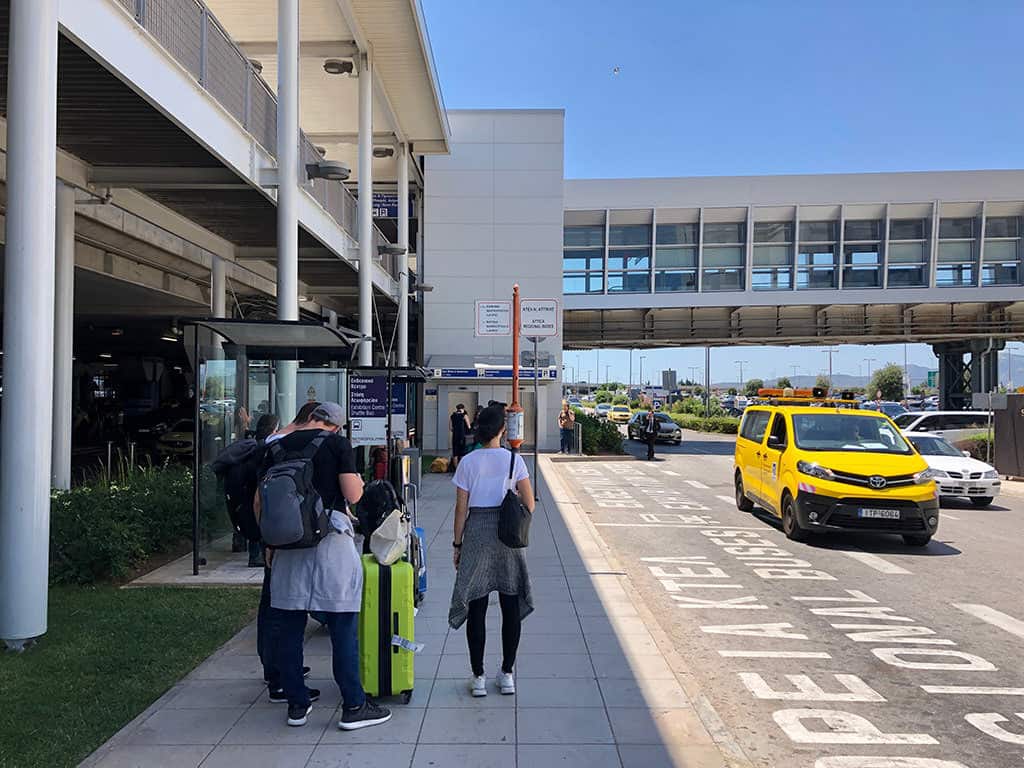
The Rafina bus is privately-run and the location isn’t where you may expect compared to the bus to Piraeus. The bus is located right across from the Mitsis Hotel at the airport, between Exits 2 and 3 where you’ll first cross the street.
The bus schedule can be found here . Note that this bus is not 24 hours, so check the schedule based on your flights. Credit card is accepted for booking.
Taking the bus from Piraeus
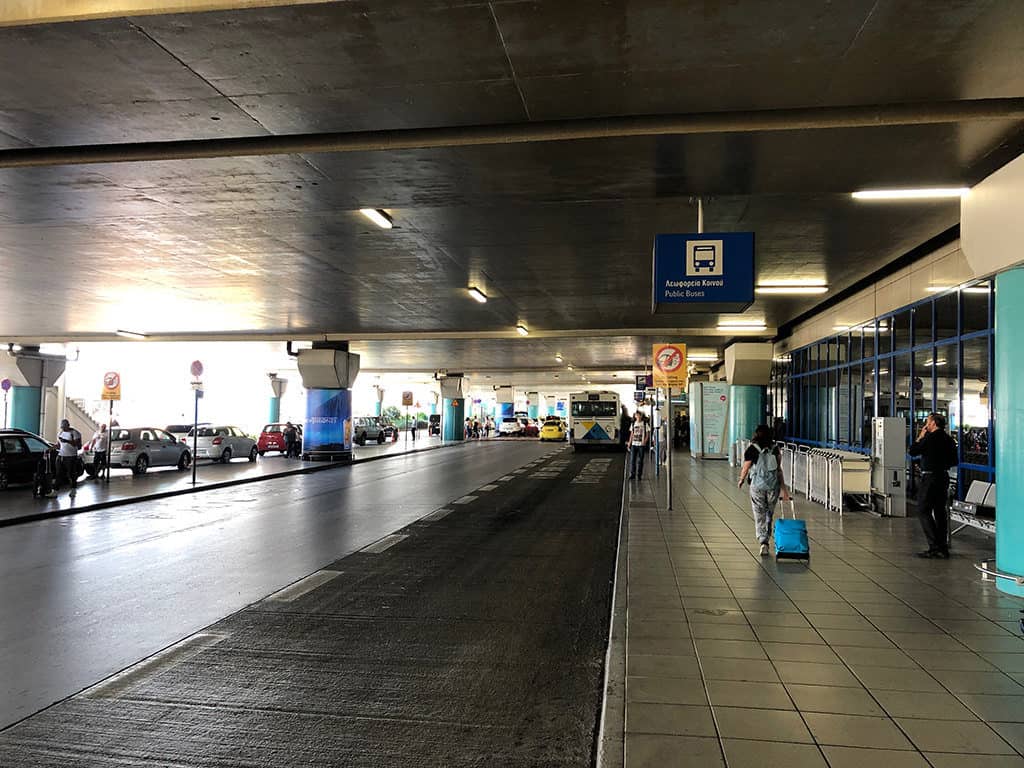
If you’re headed to Piraeus, look for public bus number X96. The ride is about an hour and the full schedule is here . This bus runs 24 hours.
Note that public buses on the arrival level are easy to find because all signs for public transportation will point you that way.
You can purchase your tickets at the booth and you are also able to pay by credit card.
Boarding and disembarking ferries
Every ferry company is slightly different because each ship is constructed and run differently. But there are general similarities that you can expect from boarding to disembarking.

On most islands there is a waiting area at the port where they have divided columns. Sometimes they’re labeled with the right ferry route and times but usually it’s not that organized . If in doubt, ask other people if you’re in the right place. Some waiting areas are just an open lounge and someone will yell out the next ferry when it comes in. Sometimes there’s no covered waiting area at all and you just find a random place to sit. This is all part of the charm of Greek island hopping!
As the boat arrives, everyone seems to automatically know to start a queue and the attendant lets you know when it is your turn to board.

Boarding – Once the ramp is down, cars and passengers that are arriving at the port exit first. Then they’ll call everyone waiting to board to walk up the ramp and put your luggage on the racks available in the cargo/car hold. There’ll be stairs on the left and right heading up to the main deck of the ship and there’ll be someone scanning tickets there. After that, head up and grab a seat or watch the action from the open rear of the ship.
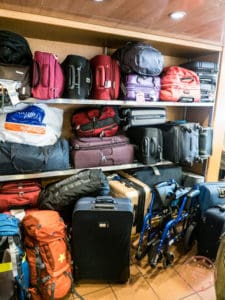
Disembarking – When the ferry is close to the destination port, they’ll make an announcement for everyone to gather in the cargo hold. You’ll then head back downstairs and grab your luggage. Once the ramp drops down, the crew will be yelling and ushering for everyone to quickly get off. So make sure you are organized and move fast!
About Piraeus
The boarding process is a little different in Piraeus because of its massive size and all of the unloading is done on arrival so they’re waiting for you to board. There’s no luggage held down below. Instead, you bring your luggage to the cabin and store it in shelving areas. These are relatively safe but we recommend dropping by your cabin when the boats start docking to make sure nobody takes their chances during disembarking.
Your ferry ticket will have a specific gate you need to go to so account for time to figure out where that is. If you take a look at the map below, the subway is closest to E5 and E6.

- Gate E1 – Ferries for Dodecanese Islands (Rhodes, Kos, Kastelorizo, Kos etc) – Blue Star Ferries / Superfast Ferries
- Gate E2 – Ferries for North Aegean Islands (Lesvos, Chios, Samos) (Blue Star Ferries & Hellenic Seaways)
- Gate E3 – Ferries for Crete. (Minoan, Anek, and Blue Star Ferries)
- Gate E4 – Ferries for Crete and other small islands such as V.Kornaros and Prevelis
- Gate E5-E6 – Blue Star Ferries for Cyclades
- Gate E7 – Speedrunner, Highspeed 4& 6, and Nissos Mykonos
- Gate E8 – Ferries for Saronic Islands, catamarans and hydrofoils
- Gate E9 – SeaJets and Zante Ferries (E10 is the exit, E9 is the entrance)
- Gate E11 & Gate E12 – Cruise ships gates, only for passengers of the cruise ships.
Onboard experience
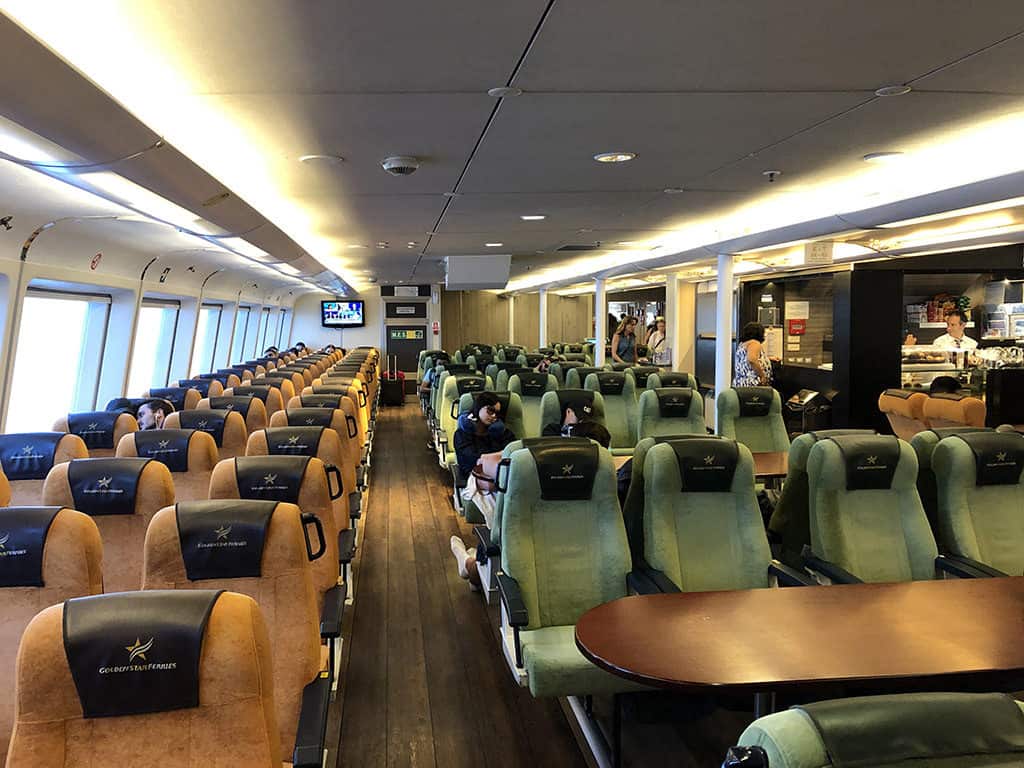
- Bringing food onboard – They didn’t seem strict on outside food at all so feel free to bring your own picnic.
- Assigned seats – Seats are automatically assigned with ticket purchase. For the less-crowded inter-island ferries, nobody checks your tickets for your assigned seats. They usually don’t care if you move somewhere else within the same class.
- Electrical outlets – There weren’t any by our seats.
- Bathrooms – Several onboard and we found all of them to be pretty clean.

- Announcing stops – There are announcements made in Greek and English so it’s clear what the next port is even if your Greek isn’t quite up to scratch.
- WiFi – Many offer paid wifi. On Golden Star Ferries it’s 3.50 EUR for 3 hours.
- Those that get sea sick easily – My wife gets sea-sick quite easily and she did okay for most ferries because the water was relatively calm. If this is an issue, sit on the outside rear deck for fresh air and the ability to focus on the horizon. You can also prepare with dramamine and sea sickness bands if you tend to suffer.
- Upgrading classes – The business-class section always had their own deck or closed off area but all we saw was that they had access to somewhat larger seats, maybe a window and a table if that’s important to you. For the longer distance ferries, some have cabins. This might be worth booking to get some sleep if your ferry is overnight.
Ferry Travel Tips:
- They run the AC pretty high inside the boat so make sure you have a jacket or sweater on-hand. Something light and packable like this is good to always have in your backpack .
- There is no access to the front of the ships, so you can only be outdoors if you stand on the rear deck.
- Set an alarm on your phone if you think you’re going to sleep. The disembarking process is very swift and you don’t want to miss it or be in a rush and forget to grab all your belongings.
- Make sure the phone number you put on your booking is the actual phone number you’re going to have when you are in Greece. We know that’s hard for those wanting to pick up a local SIM, which is why something like Airalo actually makes more sense because you know your number when you land. Ferry companies do send out SMS to let people know about delays, changes in schedule, and cancellations so it is really helpful to make sure your phone number is correct.
- Ferries are sometimes on time but not always. For us, some ferries were pretty on the dot, and others showed up 15 minutes late. Make sure you don’t plan your schedule to be so tight that you can’t absorb any delays.
Checking in online vs printing your tickets
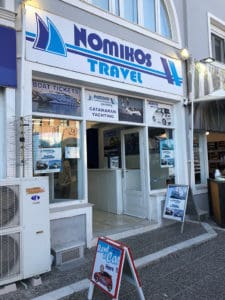
What you’ll find different from flying versus taking a ferry is that the technology hasn’t advanced very far in Greece.
You can purchase all of your ferry tickets online, but only a few companies have a way of checking in online. One of them is Golden Star Ferries . This was a pleasant surprise because we were able to check in weeks in advance and have tickets with a QR code printed.
Other companies use old-fashioned printed tickets which need to be picked up. You have to go to very specific offices to have these tickets printed. Plan around visiting the designated offices for the ferry tickets you don’t have. They usually have one by the port but don’t expect it to be the official ferry company. Instead, they partner with third-party travel agencies so make sure to read the instructions to collect your tickets.

As an example, we took Blue Star Ferries to Paros and Golden Star Ferries to Santorini. Our last set of ferries was with SeaJets and we didn’t get a chance to go to one of their offices to have physical tickets printed. In Santorini, the SeaJets partner is Nomikos Travel in Fira so we made sure to drop by our first day. Note that these offices charge 0.50 EUR per ticket . We aren’t sure if all agencies have this extra surcharge but it is something to keep in mind.
All of this is to say that you need to have physical ferry tickets in hand, whether they be digital or physical. When you book your ferry tickets with Ferries in Greece you can then arrange where to pick up each set of tickets you need.
BOOK YOUR FERRIES
Getting from Athens to Santorini
We found there to be a lot of intricacies when it came to our trip from Athens to Santorini . Be sure to read our full guide if this is part of your itinerary.
The main question you’ll have is – is it better to fly or take the ferry? All of that gets answered here .
You need to read the 14 day Greek island hopping itinerary if you’re having trouble figuring out which islands you should visit and honest feedback on how it all went.

When visiting the Greek Islands, you’ll want to explore. Luckily most islands aren’t overwhelmingly large, however, you can’t walk everywhere you might want to.
Unless you plan on exclusively staying at your resort, you’ll need to plan on which days you need a vehicle and note what type .
The challenge you’ll face is deciding whether you should rent a traditional car or an ATV. Scooters are also available but we wouldn’t recommend them unless you ride them frequently or have a ton of experience. Some of the roads are pretty basic and other drivers are likely more comfortable with the terrain and route, making it a hotspot for inexperienced riders having accidents.
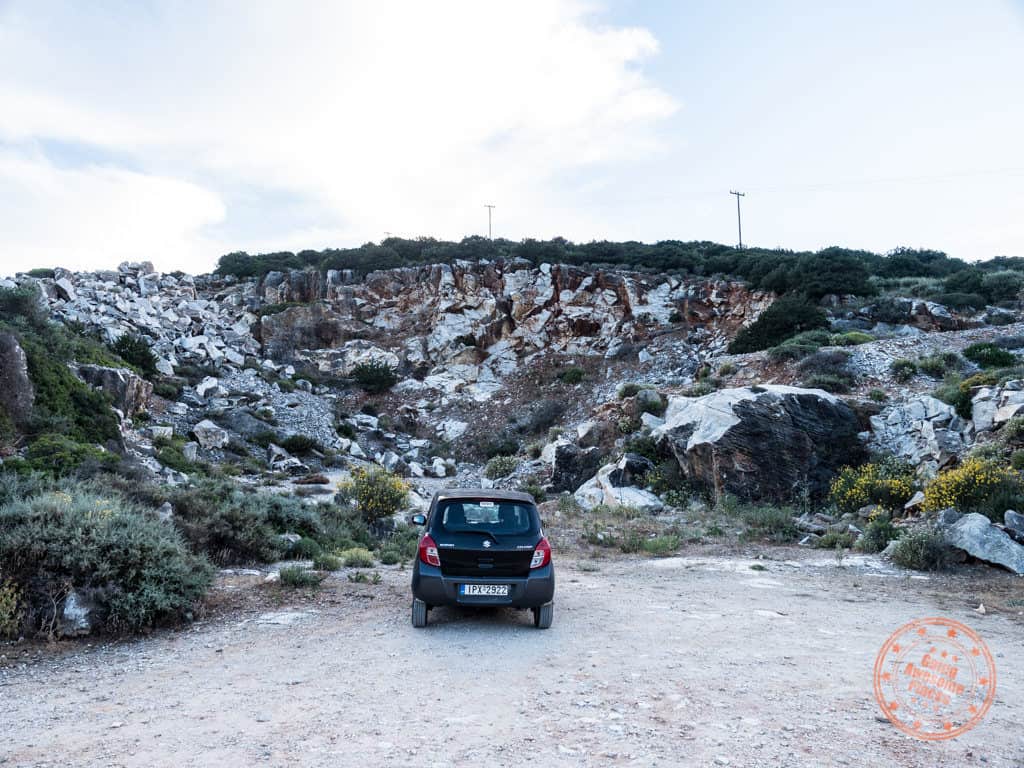
The tried and true method of getting around the island. Car rental companies are everywhere and the process to rent them is simple.
Depending on your requirements (having a larger group of people, moving luggage, comfort, experience, etc.), the car may be your only choice. With a car, you know what you’re getting and on most islands, all the places you’ll go are paved so there’s no issues getting around.
If Santorini is in your plans, check out this guide on where and how to rent a car in Santorini .
Pro: Fits more than 2 people, protects from the sun, stays cool with air condition, spacious and can transport more things.
Con: May not be as capable, or even possible, when it comes to off-road, uses slightly more gas and is less exciting than the alternative of an ATV. If you’re staying in old town areas the roads may not be accessible for cars.
- You need an international driver’s license . This is an absolute must so don’t forget to get one from CAA or AAA (if you’re from North America) before you go.
- Ask about car insurance and know your coverage options.
- When renting a car, make sure to ask for your transmission of preference because they will assume manual if you don’t say anything.
- Ask for recommendations on how much gasoline you should fill in the tank based on where you’re going and how many days.
- Most cars you will rent in Greece are never full so there’s always the worry about whether you’ll have enough and how much to fill off the bat. You will need a lot less than you think. As an example, in Paros we filled up to the max from 3 ticks down on the gauge and after 2 days we barely used one tick. Filling up 48 EUR was a big mistake because 10 EUR would’ve been enough.
- What you see listed by a car rental company isn’t always the price they offer. There’s always an element of negotiation or they would just offer up automatic discounts. Yes, this may have been because we were in Greece during low-season but never be shy about asking for a discount. The fluidity of the price is why some car rental companies didn’t even allow me to take photos of their pricing sheet.
- Discounts can only be had if you pay by cash.
- During low season, reservations don’t seem to be necessary but would recommend it during high season.
- With a car, you can take advantage of the extra storage by loading up on supplies at the grocery store.
- You might not need the car every day so plan your itinerary in a way where you only need it for a grouping of days to save money.
- Think about whether it makes sense to rent from the port or not. It’s advantageous for those wanting a round trip rental from the point you get off the ferry to when you need to get on it again. Alternatively, some car rental companies allow you to pick up a car from one place and drop it off at the port. These are called one-way rentals and some have a minimal charge for it and others might add a significant fee.
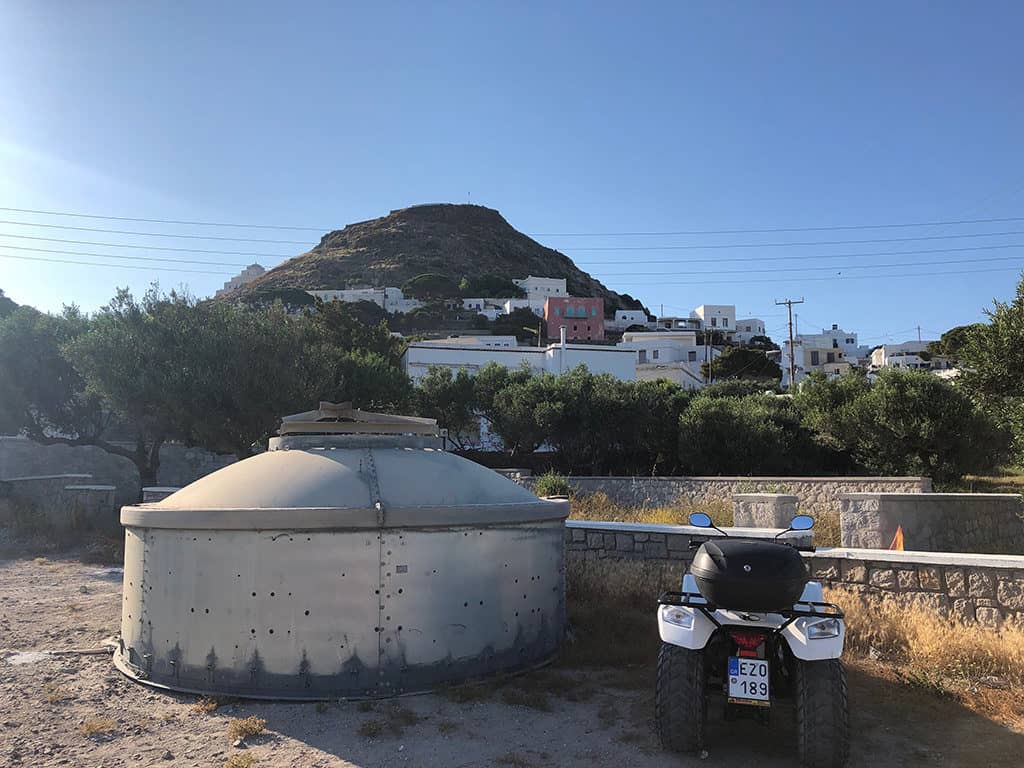
We don’t know any other place in the world where ATVs are this prevalent but it’s totally a “thing” on the Greek Islands. You’ll see them everywhere and be tempted to try it.
If there are two of you, and at least one is comfortable with driving an ATV, it’s a fun way to get around any island. They are incredibly handy when it comes to going off-road and in tight spaces because they are much smaller and more capable of handling all types of terrain.
The disadvantage is storage space. You’ll need to make sure your items can be strapped onto the vehicle or fit inside the storage compartment. We had lots of camera gear and things were tight but we managed to fit it.
If you’re not totally confident in driving an ATV on your own but still want to try the thrill of it, try this guided ATV tour through Santorini to get the hang of it while enjoying sights, local foods and wines along the way
We recommend trying the ATV on an island that has less traffic and large roads, such as Santorini, Milos or Paros, so you can get comfortable with driving around, especially if it’s your first time.
Pros: Off-road capabilities, great on tight turns (a factor in Milos ), uses less gasoline and loads of fun!
Cons: Minimal storage space, no cover from the sun, learning curve to learn how to drive, not as safe as a car and no AC.
ATV Travel Tips:
- You need an international driver’s license !
- Ask about insurance and know your coverage.
- Test the ATV and make sure that brakes work well before you leave the lot.
- Ask for a bungee cord if one isn’t provided to strap things to the front of the ATV.
- Similar to the car, most rental companies will offer discounts, especially during low season.
- The rear passenger on the ATV will be responsible for navigating by your phone’s GPS.
- Bring a sun hat and plenty of sun protection if you are visiting in the summer months. It is really easy to burn while cruising around in your ATV and you won’t feel it until you stop.
- Are ATVs easy to drive? It’s quite easy to drive because it’s automatic. You’ll just have to get used to making sure you hold the brake handle down when changing from Park to Drive and getting out of the habit of having your right foot rest on the secondary brake.
- Do you need more power than 170CC? We drove all over the island with our 170CC ATV and had no issues when off-road and climbing hills.
- How much fuel should I fill up for 2 days? On an island like Folegandros , we only used a fifth tank of fuel in two days.
Local buses
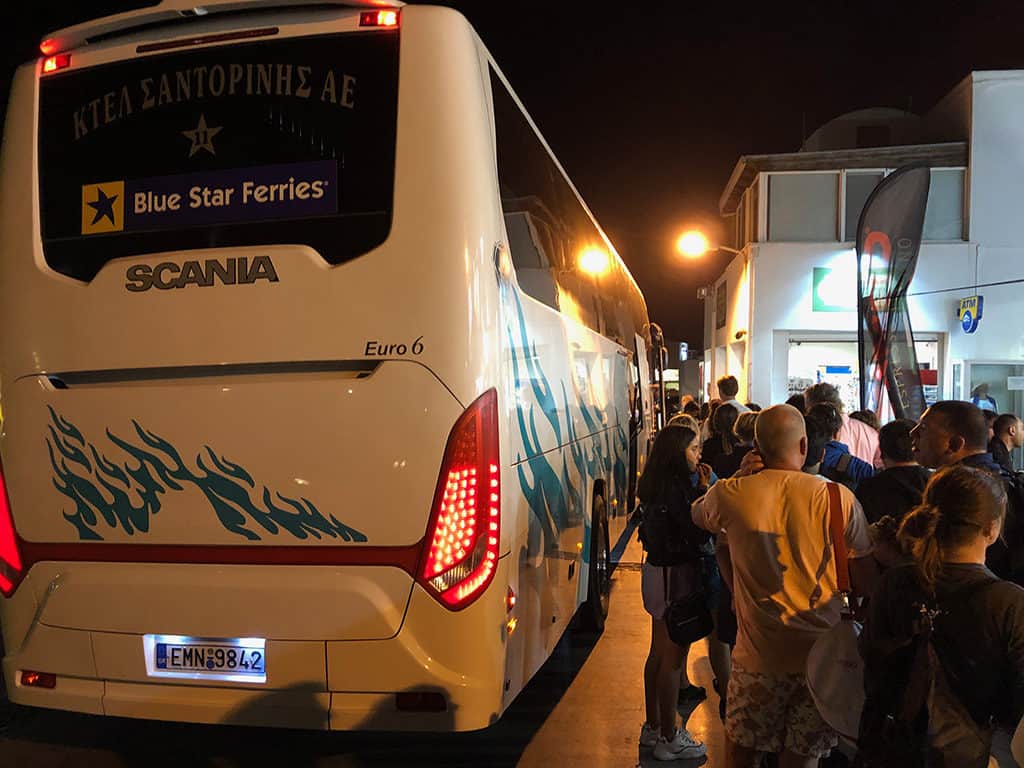
Every island has their own bus system – some better than others. It’s an economical option and possible to travel exclusively by bus.
The challenge you’ll face is you’ll be at the whim of their schedules and routes. It’ll get you to most places but some spots on the island you won’t reach.
Cost of the bus ranges from island to island but we’ve only seen it go as high as 3 EUR.
Where the bus works really well is in Santorini. There are multiple routes, they’re comfortable coach buses and they only cost 1.80 EUR .
Pros: Prices and one of the few options for those who don’t have a driver’s license.
Cons: Most buses don’t run 24/7, you are limited to their route schedule.
Bus Travel Tips:
- Cash only. Try to have smaller change or notes available.
- Payment is taken on the bus. You either pay the driver or the ticket attendant who goes around once the bus starts moving.
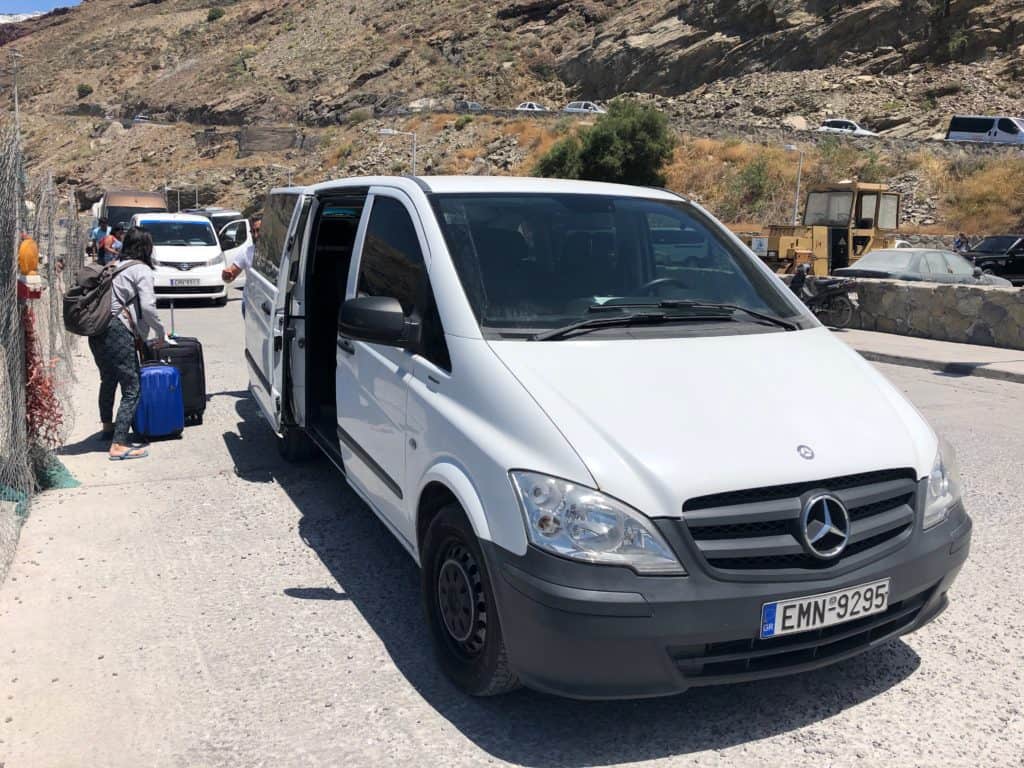
Taxis are the least cost effective way of getting around but may be necessary sometimes. Where it makes sense to take a taxi is when needing transport from your airport or ferry port to your hotel and you’re not renting a car right away.
Taxis work just like every other country. They normally run on a fixed fare system but we didn’t find this to be consisten t. In most cases, you’ll hop in one and hope for the best. If you read any of our individual island guides , you’ll see we’ve shared some of the rates we paid but keep in mind that rates can change over time so don’t take our rates as the set price for you to expect. Use them as a rough guideline.
There was no Uber coverage anywhere. This may change in the future but we wouldn’t plan on using Uber on the islands.
Pros: Door to door service and convenience.
Cons: Expensive, at the mercy of their rates, may require some pre-planning in terms of booking particularly in less built-up places.
Taxi Travel Tips:
- In some instances, it’ll be smart to book a shuttle service in advance. This can be done through your hotel or online . You can save money and you won’t have to deal with the chaos that ensues when you arrive. We find that GetYourGuide has plenty of shuttle service options for most of the destinations you will arrive at on your Greek island trip.
Where to book your hotels, car rental, ferries, flights, activities
- Hotels – Booking.com has the best inventory of properties and with their Genius tier, you can save even more money.
- Car Rental – If you’ve read our guide, you can book with the big brands combined with car rental coupon codes or you can use RentalCars to do a search of most companies. Make sure to also read the guide on how to rent a car in Santorini .
- Ferries – My go-to booking platform is FerryHopper .
- Flights – Use Skyscanner to look for cheap flights using the Everywhere feature and also setting price alerts.
- Activities – Always compare between Viator and GetYourGuide to get the best price.
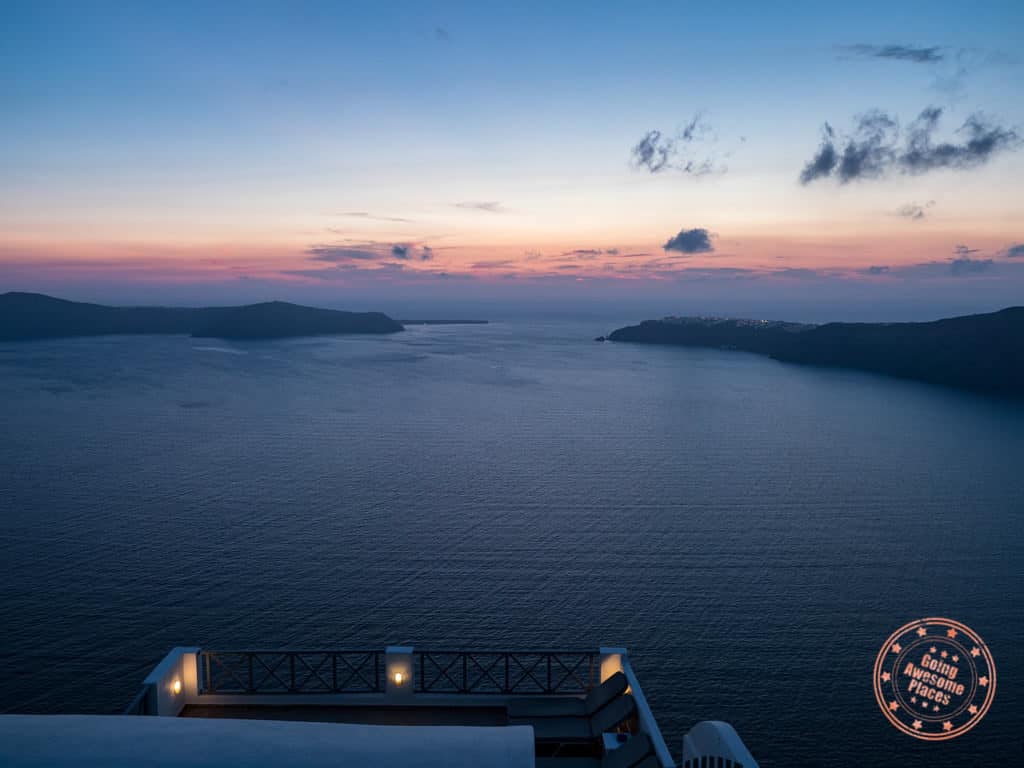
Depending on the island, you’ll have too many choices (Santorini, Mykonos, Milos), few choices (Folegandros, Sifnos, Serifos), or somewhere in between (Naxos, Paros).
Where You Should Stay in Santorini?
Where is the best area in Santorini to stay? Is Fira and Oia worth it? Read on to find out an honest look at each of the major towns and why you should consider each.
Where To Stay in Santorini
Instead of specific recommendations in this Greek Islands travel guide, we’ll share what we learned from planning our island hopping trip:
- Large chain hotels aren’t easy to find on the Greek Islands. Santorini and Crete are the exceptions. Everywhere else will be family-run hotels, villas, guest homes, B&Bs and budget-friendly hostels.
- There are Airbnb properties but many are the same listings you’ll find on Booking.com . We recommend Booking.com over Airbnb because there are better cancellation policies.
- We use Booking.com to book all of our accommodations. Getting up to Genius level only requires 2 bookings. Once you’re at that level many properties offer 10% (level 1 Genius) and 15% off (level 2 Genius).
- Book at least 8-12 months in advance in busier islands such as Santorini if you want something that has a view.
- For accommodation recommendations read our individual guides for each island we visited ( Paros , Santorini , Folegandros , and Milos ).

Traveling to the Greek Islands doesn’t require a highly technical packing list. But it is good to prepare so you don’t feel caught out while travelling.
- International Driver’s License – Hopefully we’ve got this drilled into your head. Make sure to get one before you go.
- Sunscreen – You can buy this there if you want to save on packing space. Between two people over 14 days, we’d recommend two full-sized bottles.
- Sunglasses – An obvious one, don’t forget these!
- Daypack: You always want to make sure you have a day pack when you’re travelling, particularly if you are planning a beach day. Those collapsable backpacks like the New Outlander are great for this. If you want something studier for camera gear the Thule Covert DSLR Rolltop Backpack is a great option, just less portable than the Outlander.
- Shirts: In the summer a shirt is great for throwing on as added sun protection, in the cooler months its something you would wear most days anyway. Pack them in the Eagle Creek Pack-It Specter Cube to keep them nice and tidy. If you haven’t yet started using packing cubes these will be a game changer.
- Pocket cap: The Outdoor Research Radar Pocket Cap is a great travel hat simply because you can fold the brim. This makes it incredibly easy to pack and even while on the road, I can easily stick the cap in my back pocket if I want to take it off but not go through the trouble of putting it into my daypack.
- Packable layers: It doesn’t make a lot of sense to bring an umbrella when you can bring a waterproof shell jacket which also doubles as an additional layer. Shells like this are perfect for travelling because they’re versatile, light and easily rollable. Whether it be on the ferries or windy up on the caldera of Santorini, you never know when you might need that extra layer. Hoodies are also a great option.
- Shoes: The Merrell Moab Ventilators Hiking Shoe have been the bread and butter of all my trips for years now. They’re incredibly comfortable and great in all situations. These ones aren’t waterproof but for city walking, this fits the bill. As a sandal the Rainbow Sandals, Double Layer Leather Sandal I have reviewed extensively before and I can’t go on a summer trip without these. They’re just so damn comfortable and great for extended periods of walking. An alternative is the KEEN H2 Newport Sandal – My review holds this as one of the best sandals on the market. I love them because they’re just so versatile in summer conditions. Amphibious is the word that comes to mind. Perfect for beach days.
- Packable Towel: Accommodation owners don’t like when guests use their towels at the beach. Ask for a beach-friendly one or pack your own . Don’t make the mistake I made with quick dry towels and buy a small one. It’s just not worth it to annoyingly dry yourself with something the size of a hand towel. This one is great because it’s large (XL in fact), packs into a small form factor, and dries quickly. While mostly used in hostels, this is the kind of thing that’s always nice to have with you as it doubles up for the beach if needed.
- Insect repellant: Big cities usually aren’t a problem but again it’s one of those things where you never know, particularly if spending time near the beach. Pack the Off Mosquito Repellent just in case.
- Travel toiletries case: I’ve been very happy with this Muji toiletries organizer because of it’s simplicity in design and comprehensiveness in terms of pockets, zippers and elastic holders. The must-have feature for any toiletries organizer is the hook. Hanging your bag is always a better option than letting it sit on the sink especially if you’re using communal hostel washrooms.
- Plug Adapters for UK and EU : I have a random assortment of plug adapters I’ve collected over the years. Always do your research beforehand but in Europe you’re mostly dealing with these two types of plugs. Universal adapters are good but the problem is with all the devices you have you’ll need multiple. I find that individual adapters like mine are more useful.
- Non-drowsy Gravol – If you get motion sickness pack this.
- Exchange Euros – It’s always a good idea to have Euros with you immediately after you land. Don’t leave the airport without at least some Euros otherwise you might find yourself scrambling around to find exchange offices and be at the mercy of their rates.

Low-season (November – March)
Let’s start with when not to go to the Greek Islands. Winters are pretty mild compared to other parts of Europe, but it’s quite variable with high chances of rain and dreary days.
In the low season the ferry and flight schedules are also reduced so your options are limited. Most of the islands are populated by seasonal workers, so you’ll have to contend with skeletal services, facilities and closures. Count on many hotels, restaurants, and activities (especially water-based ones) being closed.
The advantage is not many people travel to the islands in the winter so you won’t see many tourists. Things won’t be as lively as they normally are in other parts of the year, which if this is the kind of trip you are looking for, the low season is perfect.
Spring to Summer (April – Mid-June)
One of the best times to come. Flowers are blooming, the weather is warming and the large tourist hordes haven’t quite arrived yet.
Shoulder season means better prices and vacancies for hotels.
At this time of the year, flights and ferries switch to their full capacity schedule or close to it. Restaurants typically don’t need reservations and car rental companies are willing to offer additional discounts.
This applies even more for popular islands like Santorini. Make sure to read the best time to go to Santorini .
High-season (Mid-June – Mid-September)
This is the height of travel. Expect every aspect to be more challenging whether it’s hotels, car rentals, restaurants, ferries, flights or activities. You can also expect for prices to skyrocket for everything, this is the least economical time to travel and prices can get wild.
Not only are you contending with massive crowds, but the temperature is the hottest if that is a consideration for your trip to the Greek islands.
The only exception to this is in the north with islands like Samothraki and Thassos. They’re only super busy between July and August so you can get the summer heat with less of the volume of people. Some of the more popular islands are super busy and not as enjoyable in the summer so if tranquility is the aim of your trip add Mykonos, Crete, Kos, and Zakynthos to a list of Greek islands to avoid.
Summer to Fall (Mid-September – October)
The transition to Autumn is a great time to visit the Greek Islands. Similar to Spring, the weather is more temperate with the sea balmier than the air. Green lends its way to subtle Fall colors and that has its own beauty well worth experiencing while Greek island hopping.
If you’ve come from our Greek Island Hopping in the Western Cyclades itinerary , you’ll see the full breakdown of costs from that trip. Flights are excluded because they vary drastically from person to person depending on your starting point.
The category breakdown of our spending looked like this:

$2318.82/person or $165.63/person/day . Backpackers will look at this and say that’s too much and those looking for a luxury trip will think it’s too little. We’d say that we were pretty moderate when it came to making decisions on our trip.
Where we splurged:
- Getting a nicer hotel in Santorini
- Nicer dinners where it made sense
Where we saved money:
- Finding affordable properties outside of Santorini thanks to Booking.com .
- Avoided excursions and activities.
Cutting costs:
- Don’t rent a car/ATV – rely on buses or stay in an area where you can walk everywhere.
- Hop to fewer islands.
- Avoid big islands and focus on lesser-known ones.
- Find cheaper hostel accommodations through Hostelworld .
- Buy your own groceries to save money on meals where it makes sense (breakfast especially). There is something lovely about picking up pastries from a local bakery and enjoying it on a morning walk or sitting by the beach.

In short, this is what to know when planning a trip without reading this entire Greek Islands travel guide:
- You should have booked your Santorini hotel yesterday! This is the most popular island and gets booked up fast.
- Pick a good balance of popular and small islands – don’t be afraid to try the unknown ones like Folegandros .
- Always break change – you never know when you’ll need it.
- Fill no more than 5 EUR at a time with your car rental or ATV.
- It’s easy to let your guard down when you go back to Athens after spending time in the Greek Islands. Stay vigilant and beware of pick-pocketers immediately (read my story in the Athens 2 day itinerary ).
Santorini is the safest Greek Island to travel to, as it is one of the more popular islands, so there are always other tourists around. Here, locals are known to be very friendly and helpful to tourists, crime rates are low, and the transportation systems are highly rated as being reliable and safe to use.
The more affordable islands are Crete, Andros, Tinos, Corfu and Naxos, as they are less popular islands than some of the other well-known. Therefore, they are less travelled so prices on these islands are much cheaper than ones like Santorini.
Well you read this guide of course! Ultimately it depends on the type of experience you are looking for and the amount of time you are working with. For instance, if you don’t have much time during your travels the Saronic Islands are recommended since they are all close to Athens. If you are looking for the islands with the best nightlife, the Cyclades are for you. If you’re a foodie, you want to visit Crete! All islands offer something unique, so determining your visit will be unique to you!
Have specific questions about your upcoming trip to the Greek Islands? Drop a comment below in this Greek Islands travel guide!
What you should read next
- Best Places To Stay In Crete – A Guide Of The Best Towns And Areas!
- Best Area To Stay in Santorini Guide
- Best Places To Stay In Corfu – Top Areas And What To See When There
- How To Backpack Europe On A Budget
- Cheapest Way To Travel Europe – Getting Around On A Budget
If you’re in the process of planning your trip and putting together your itinerary, these are genuinely the best resources that the Going Awesome Places team stands by 100% .
Credit cards: Don’t get burned by hidden fees on top of terrible exchange rates. When we travel now, we use the Wise Card . Simply load it with the currency you need before you go and use it as a regular VISA or their digital wallet card. Use their free app to track how much you have and top up when you need to.
Flights: Of all the booking search engines, Skyscanner is the most helpful and easy to use thanks to their Everywhere feature . Kayak is also another that’s we will often check as well.
Car Rental: If you’re looking to save money, these car rental coupon codes will be a true game-changer. Otherwise, DiscoverCars and RentalCars are great places to start.

Airport Parking: You’ll need a spot to leave your car at the airport so why not book a spot at a discount. Use code AWESOME7 to get at least $5 off at Airport Parking Reservations or Park Sleep Fly packages.
Data: We’ve been a huge fan of wifi hotspot devices like PokeFi (use code GAP24300) because their rates are so good and you can use it globally but recently, we’ve really loved using eSIMs. The best one is Airalo . Save money by getting region-specific eSIMs and use referral code WILLIA9500 to get $3 USD credit on your first purchase. Ubigi is another one that we’ve had success with where they uniquely offer 5G coverage. Use code AWESOME10 to save 10% on your first order.
Hotels: Our go-to is Booking.com because they have the best inventory of properties including hotels and B&Bs plus they have their Genius tier discounts . The exception is Asia where Agoda always has the best prices. TripAdvisor is also useful for reviews and bookings.
Vacation Rentals: Your first instinct will be to check Airbnb but we always recommend checking VRBO as well if you’re looking for a vacation rental.
Tours: When planning our trips, we always check both Viator and GetYourGuide to at least see what’s out there in the destination that we’re going to. They often have different offerings and prices so check both.
Travel Insurance: Learn how to buy the best travel insurance for you. This isn’t something you want to travel without.
- Insured Nomads – Popular insurance provider for frequent travelers and comes with great coverage and special perks.
- RATESDOTCA – Search engine Canadians looking for the cheapest insurance including multi-trip annual policies.
- SafetyWing – A perfect fit for long-term nomads.
- Medjet – Global air medical transportation.
- InsureMyTrip – Best for seniors, families, and those with pre-existing conditions.
If you need more help planning your trip, make sure to check out our Travel Toolbox where we highlight all of the gear, resources, and tools we use when traveling.
Find us on social media
Next 5 days
- THURS 27 °C
Climatic Data
Source: National Observatory of Athens / meteo.gr
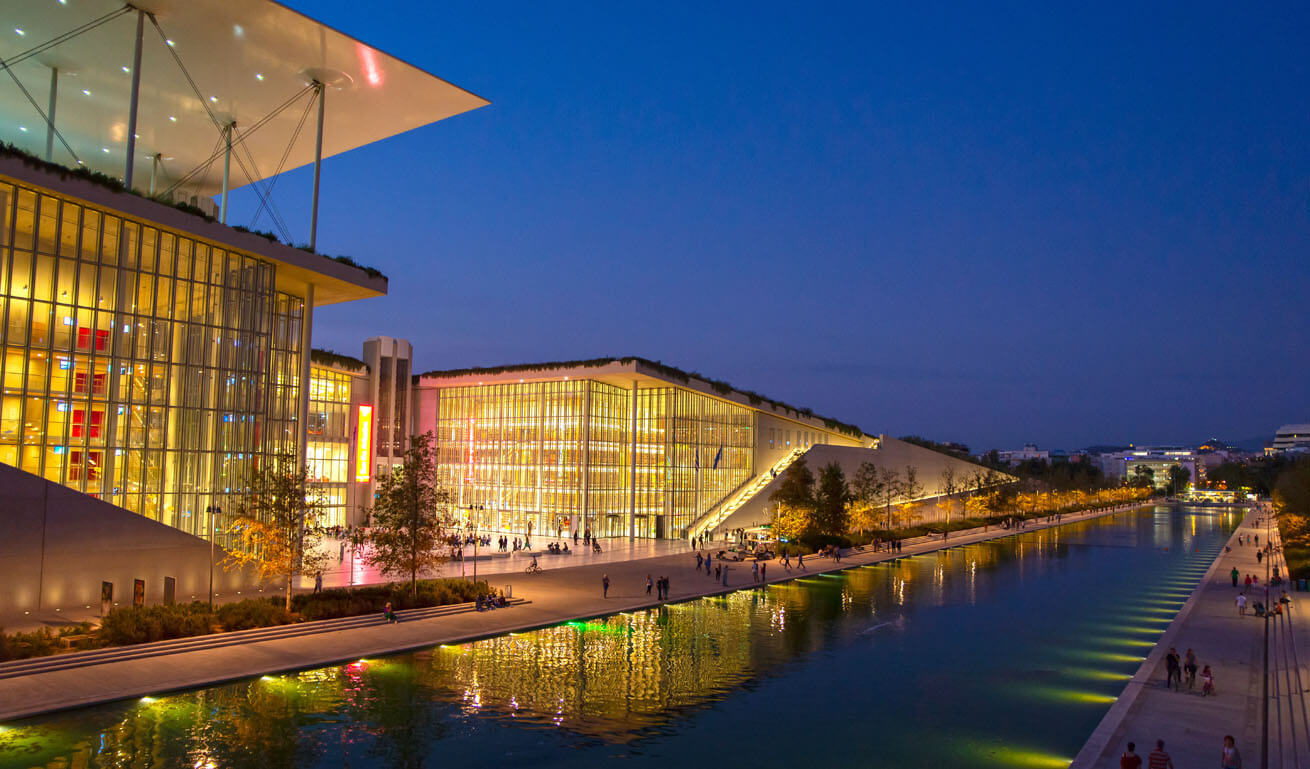
© Th. Gravanis
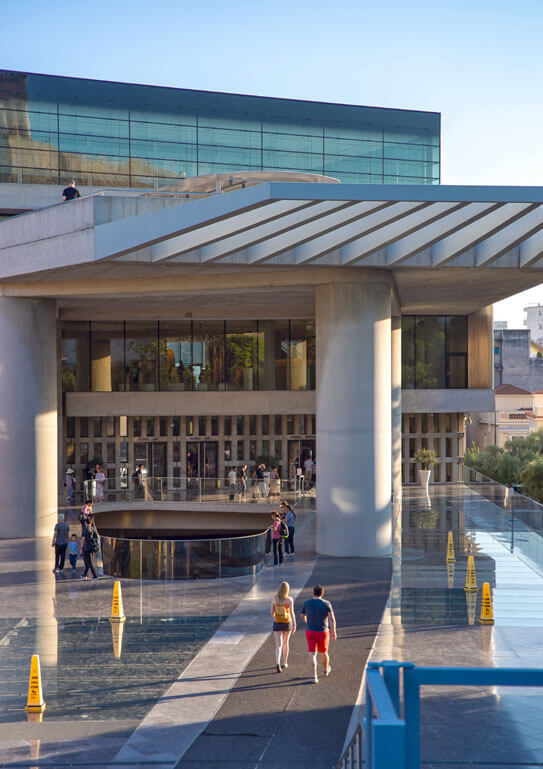
© Stian Rekdal
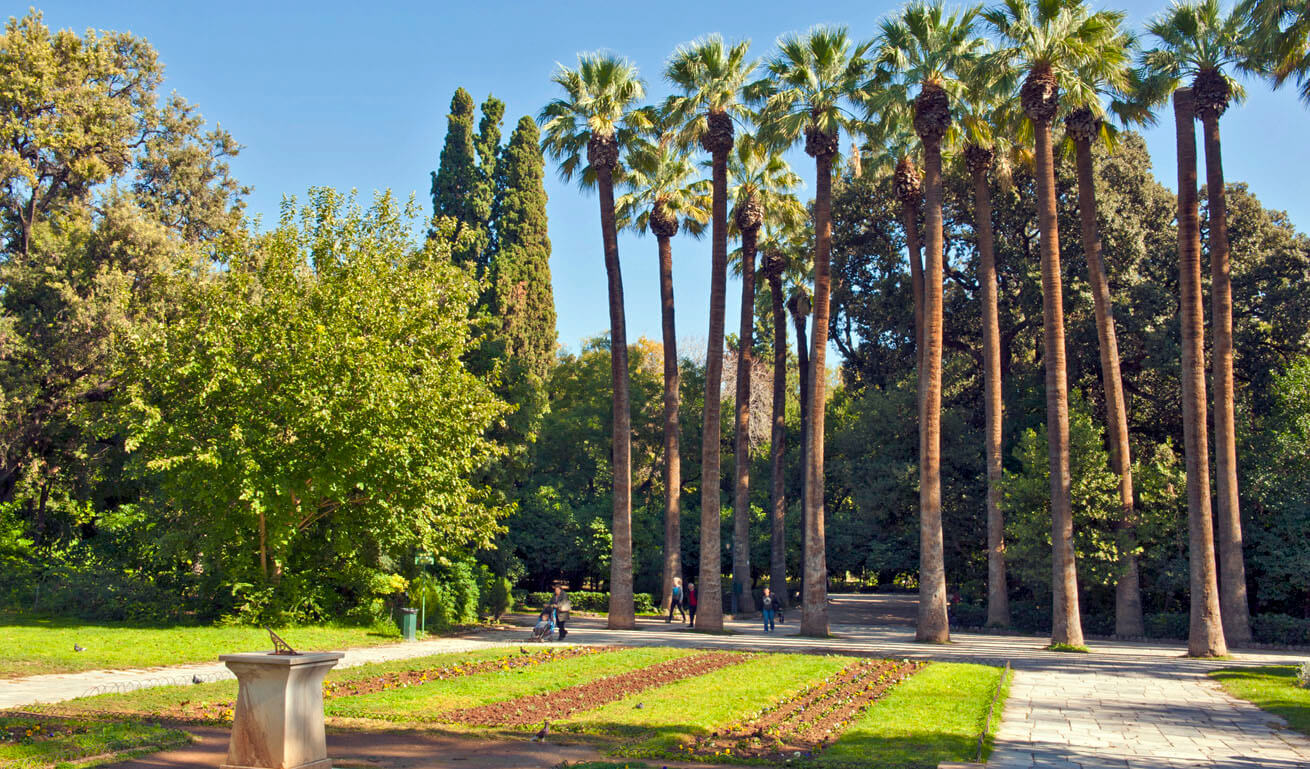
© Y. Skoulas
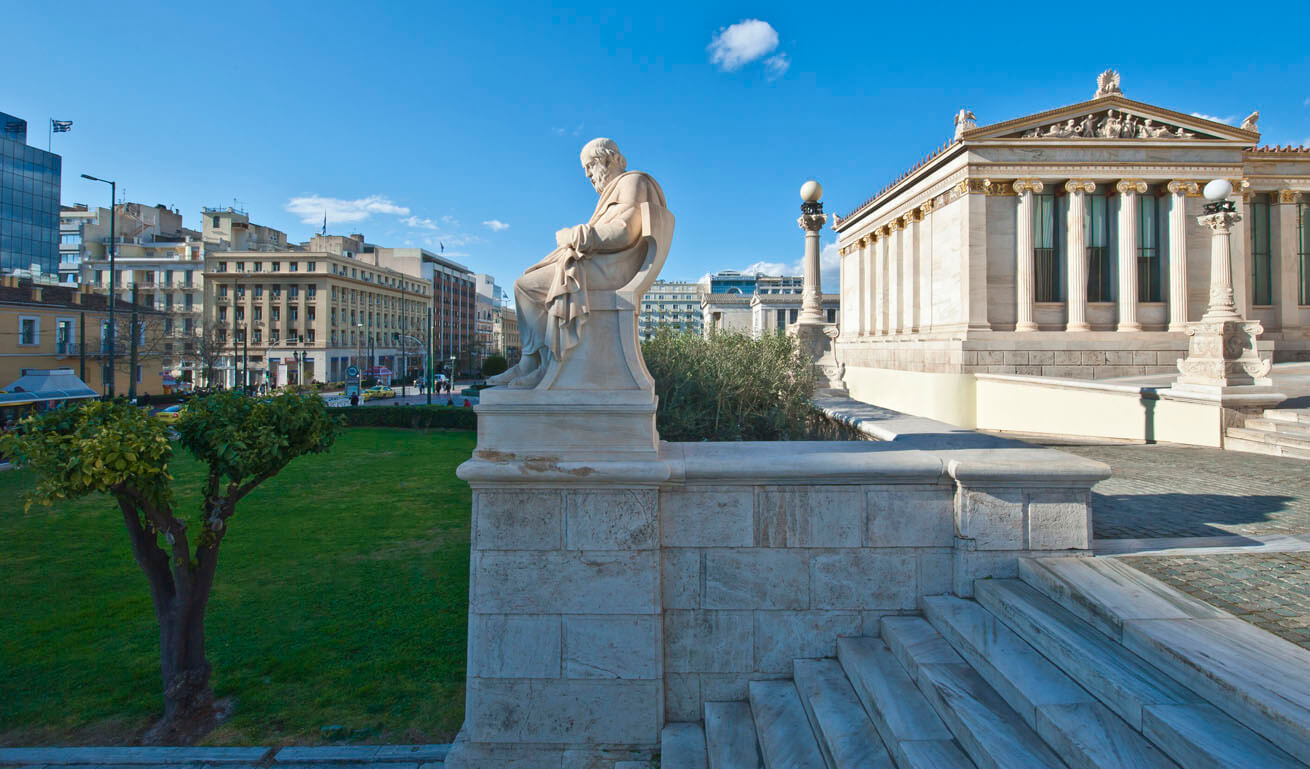
A journey through time
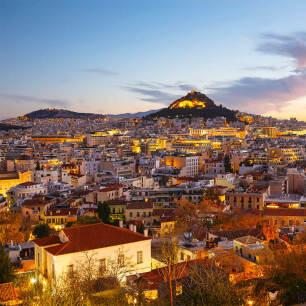
Points of Interest
- TRANSPORTATION

National Archaeological Museum
Acropolis Museum
Byzantine and Christian Museum
National Gallery - Alexandros Soutsos Museum
Museum of Cycladic Art
Panathenaic Stadium
Basil & Elise Goulandris Foundation, Athens
Benaki Museum of Islamic Art
Syntagma Square
Athens for shopping centre
National Garden
Biking in Athens
Pedion tou Areos
Nightlife in Athens
Bus Station Kifisou
Bus Station Liosion
Athens Railway Station
Unique Experiences
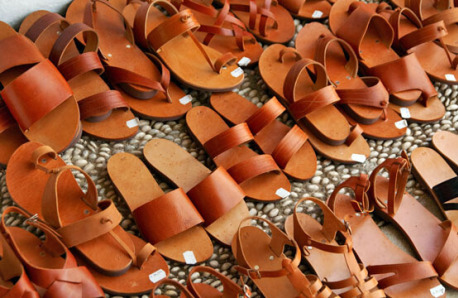
Historical Walkings in the city centre
Latest events.
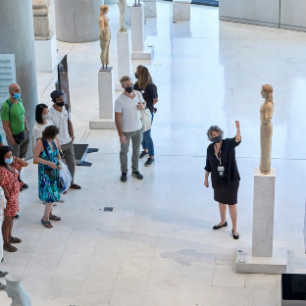
Saturday in the Museum with 20+1 masterpieces

Athens – City Festival 2024

The Parthenon and Byron
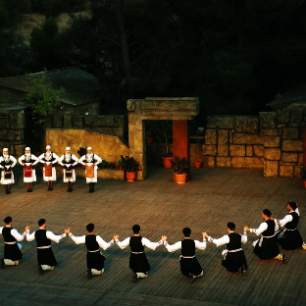
Dance Performances

Coppélia

Athens Digital Arts Festival

Piano City Athens

Athens Pride 2024

Release Athens Festival
Tips for your next trip.

A delicious visit to Athens' museums
Beautiful atriums and courtyards, balconies with breathtaking views and green gardens have been shaped as part of museum premises in Athens promise to offer you relaxing spots before or after your culture-oriented visits.

Athens Riviera
You don't need to get on a ferry to escape the bustle of the Greek capital: take a short bus ride and you'll find superb local beaches along the sheltered Saronic Gulf...

Museum cafés in Athens

LGBTQ+ Journeying to Athens
Filming in athens.

SUMMER HOLIDAY (1963)
Four London bus mechanics strike up a deal with London transport. They do up a double-decker London bus, drive it around Europe as a hotel and if they make it, they will in turn own and be in charge of a whole fleet. While on the road in France, they pick up three ladies whose car breaks down and offer to take them to their next singing job in Athens!
DIRECTOR: PETER YATES FILMING LOCATION: ATHENS

THE BOY ON A DOLPHIN (1957)
A sponge diver ( Sofia Loren) on Hydra island discovers a sunken ship filled with artifacts, including a priceless ancient gold statue of a boy on a dolphin. She and her boyfriend enlist the help of an American archaeologist, but her boyfriend can't afford the asking price and ends up turning to an art collector for help.
DIRECTOR: JEAN NEGULESCO FILMING LOCATION: HYDRA, ATHENS, RHODES, KORINTHOS, POROS, KALABAKA, DELOS, DELPHI, SANTORINI

IN THE COOL OF THE DAY (1963)
An English book publisher, who is taunted and tormented by a grudging, embittered, anti-social wife, falls hopelessly in love with a fragile American girl, who has been sheltered and protected to the point of absurdity by her adoring husband. The couple soon run off to Greece together to pursue their romance.
DIRECTOR: ROBERT STEVENS FILMING LOCATION: ATHENS, DELPHI

FOR THE LOVE OF BENJI (1977)
Even when he is supposed to be on holidays, Benji the dog is never far away from adventure. While traveling to Greece with his owners, Benji has a run-in with a secret agent (Ed Nelson), who hides something on him that a lot of unsavoury characters seem to want. Once in the foreign land, Benji becomes separated from his owners, and has to navigate his way through Athens with everyone chasing after him. All Benji wants is to be reunited with housekeeper Mary (Patsy Garrett) and the kids.
DIRECTOR: JOE CAMP FILMING LOCATION: ATHENS

AMERICA AMERICA (1962)
Somewhere around 1900, a young Greek man lives a miserable life in a small village in Turkey as a member of the Greek minority. When the oppression by the Turks increases, his father provides him with the family treasures and sends him to Constantinople. There, he is supposed to make money and get the family to join him. But his own dream is going to America...
DIRECTOR: ELIA KAZAN FILMING LOCATION: ATHENS

ATLAS (1961)
An evil king Praximedes is convinced to settle his dispute with his political rival by staging a battle to the death between their respective champions, and convinces superhero Atlas to fight for him. But Atlas eventually realises the king's true nature and turns against him...
DIRECTOR: ROGER CORMAN FILMING LOCATION: ATHENS

BACKFIRE (1964)
A gold smuggler hires our hero to transport a stolen fortune to a new hideout. The smuggler sends him moll to accompany (and spy on) the hero. The two set out for Beirut to get instructions as to where the gold is located. They travel throughout exotic southeast Europe and the Middle-East seeking further instructions, never realizing that they have had the gold with them all along...
DIRECTOR: JEAN BECKER FILMING LOCATION: ATHENS

GIRL ON THE BRIDGE (1999)
Adèle (Vanessa Paradis ) a waif who is unlucky in love decides to take her own life by jumping from a Paris bridge, when she gets a strange proposition from Gabor (Daniel Auteuil), a professional knife thrower. Together, their luck is unstoppable, and they have an almost psychic bond. But fidelity is not easy, even for those that are perfectly mached.
DIRECTOR: PATRICE LECONTE FILMING LOCATION: ATHENS

THE TWO FACES OF JANUARY (2014)
A con artist ( Viggo Mortensen)and his wife (Kirsten Dunst) find themselves in deep trouble in Greece after the former murders a detective. To escape from Greece, they must trust a stranger (Oscar Isaac) who is inherently untrustworthy.
DIRECTOR: HOSSEIN AMINI FILMING LOCATION: ATHENS, CHANIA, HERAKLION
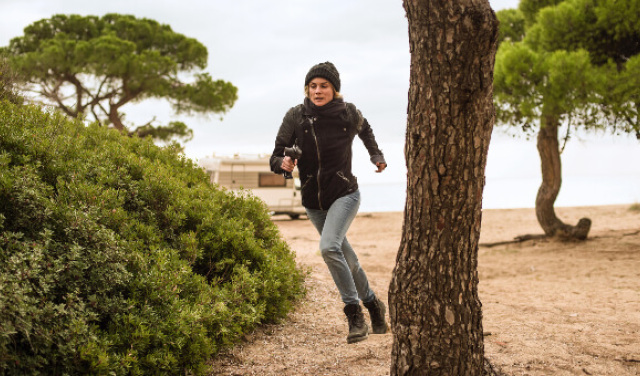
IN THE FADE (2017)
Katja's life falls apart in the blink of an eye when two neo-Nazis kill her husband and 6-year-old son in a bomb attack. Her quest for justice soon pushes her to the edge as the two suspects stand trial for murder. The movie has won the Golden Globe Award for Best Foreign Language Film while Diane Cruger won the award of Best actress at Cannes Festival.
DIRECTOR: FATIH AKIN FILMING LOCATION: ATHENS

IT HAPPENED IN ATHENS (1962)
During the first modern Olympic Games in Athens in 1896, a poor shepherd decides to complete in them, while a glamorous actress promises to marry one of the winners of one of the games.
DIRECTOR: ANDREW MARTON FILMING LOCATION: ATHENS
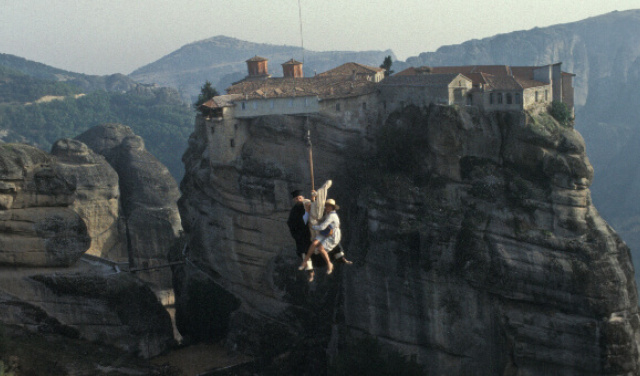
JUPITER'S THIGH (1980)
A honeymoon turns into a breathless country chase for a police inspector and a researcher of ancient Greek civilization.
DIRECTOR: PHILIPPE DE BROCA FILMING LOCATION: KALABAKA, PARGA, CORFU, ATHENS

MALE HUNT (1964)
A Frenchman is getting ready to marry the woman of his dreams. He begins to have second thoughts though when his best friend, a sworn bachelor, tells him that women only use marriage to exploit men. Under that influence, he leaves for Greece on his own.
DIRECTOR: EDOUARD MOLINARO FILMING LOCATION: ATHENS, RHODES
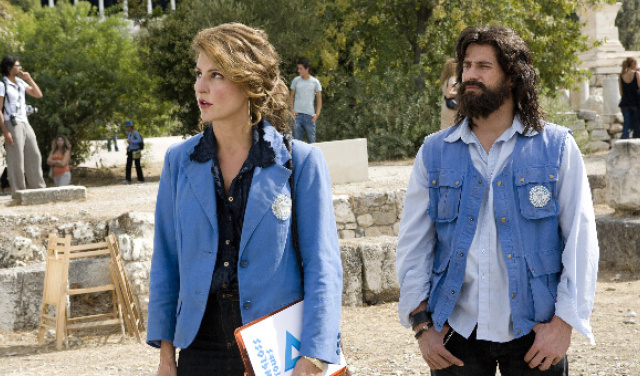
MY LIFE IN RUINS (2009)
A Greek-American tour guide (Nia Vardalos) leads and assorted group of misfit tourists around Greece. In a hysterical clash of personalities and cultures, everything seems to go wrong.Until one day, a very special tourist (Richard Dreyfuss) shows her how to have fun and take a good look at the last person she'd ever expect to find love with: her quiet and sexy Greek bus driver (Alexis Georgoulis).
DIRECTOR: DONALD PETRIE FILMING LOCATION: ATHENS, OLYMPIA, DELPHI

NEVER ON SUNDAY (1960)
A look at the life of Ilya, (Mercouri) a carefree Greek prostitute, who lives in the port of Piraeus and meets an American scholar Holmes (Dassin), an American tourist and classical scholar who adores all things Greek. The two try to change each others' perception and way of living for the better. The movie won the Academy Award for Best Original Song (Manos Hadjidakis for "Never on Sunday").
DIRECTOR: JULES DASSIN FILMING LOCATION: ATHENS, PIRAEUS

NEW YORK STORIES (1989)
Τhree stories happening in New York. The first, by Scorsese, is about a painter who creates his works helped by high volume music and an attractive assistant; second, by Coppola, is about a rich and bold 12 years old who helps her separated parents to reconciliate; third, by Allen, is a witty piece of comedy about the impossibility of getting rid of the son's role. The one of Coppola includes a concert on top of the Acropolis Hill.
DIRECTOR: WOODY ALLEN, FRANCIS FORD COPPOLA, MARTIN SCORSESE FILMING LOCATION: ATHENS

A WOMAN AT HER WINDOW (1976)
The wealthy Austrian-born wife of a penniless Italian diplomat and playboy in 1936's Greece, amuses herself pursuing a shallow loveless affair with a nobleman. Her life is changed when she rescues a political activist she finds hiding beneath her window and falls in love with him...
DIRECTOR: PIERRE GRANIER- DEFERRE FILMING LOCATION: ATHENS
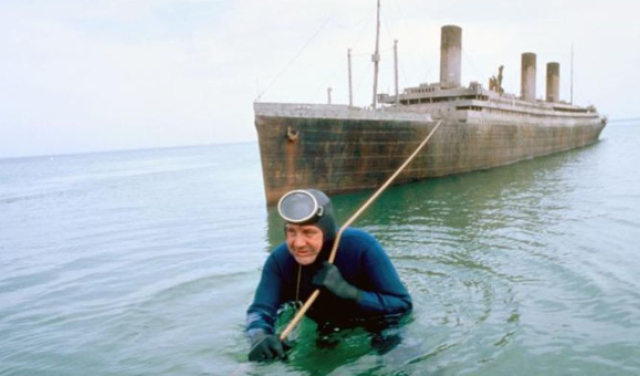
RAISE THE TITANIC (1980)
The American military is developing an experimental defence system that requires an extremely rare mineral in order to work. It is known that around the turn of the century a miner exported some of the mineral. Hopes are dashed they learn that he transported the mineral on the Titanic. But perhaps the Titanic can be salvaged...
DIRECTOR: JERRY JAMESON FILMING LOCATION: HYDRA, ATHENS

RUBY CAIRO (1992)
A young widow discovers that her late husband had stashed a fortune in secret bank accounts across Europe, and sets off to follow a trail of clues encoded in a set of baseball cards.
DIRECTOR: GRAEME CLIFFORD FILMING LOCATION: ATHENS

SIGNS & WONDERS (2000)
Alec (Stellan Skarsgard), an American living in Athens, leaves his wife (Charlotte Rampling) for another woman, Katherine (Deborah Kara Unger), but then tries to return to her over his guilt, but she's more interested in a Greek political activist (Dimitris Katalifos). He is under the influence of signs and premonitions with blue being his color, and yellow being the color of Katherine.
DIRECTOR: JONATHAN NOSSITER FILMING LOCATION: ATHENS

TEMPEST (1982)
A middle- aged architect is going through a difficult mi-life crisis. He abandons his wife, leaves New York, and moves to Greece with his teenage daughter. He meets a singer, they become lovers and they move to a Greek island. One day, a twist of fate brings his wife and her new lover to the island due to a shipwreck.
DIRECTOR: PAUL MAZURSKY FILMING LOCATION: ATHENS, PIRAEUS

THE 300 SPARTANS (1962)
In 480 BC Spartan king Leonidas led an extremely small army of Greek Soldiers (300 of them his personal body guards from Sparta) to hold off an invading Persian army more that 20 times as large. The actial heroism of those who stood (and ultimately died) with Leonidas helped shape the course of Western Civilization.
DIRECTOR: RUDOLPH MATE FILMING LOCATION: KORINTHOS, ATHENS

THE ANGRY HILLS (1959)
In 1941, an American journalist (Robert Mitchum) reporting from Greece is given a secret list og German collaborators to transport to British Intelligence headquarters. He is helped by Greek resistance fighters as he is pursued across the country by the Nazis...
DIRECTOR: ROBERT ALDRICH FILMING LOCATION: ATHENS

THE BURGLARS (1971)
A band of crooks, led by a professional jewel thief, break into a mansion on the outskirts of Athens to steal a priceless collection of emeralds. The robbery is a success, but the gang miss their escape transport out of the country. Meanwhile, their leader is pursued by a crooked police chief, who will stop at nothing to lay his hands on the stolen jewels...
DIRECTOR: HENRI VERNEUIL FILMING LOCATION: ATHENS, PIRAEUS, CORFU
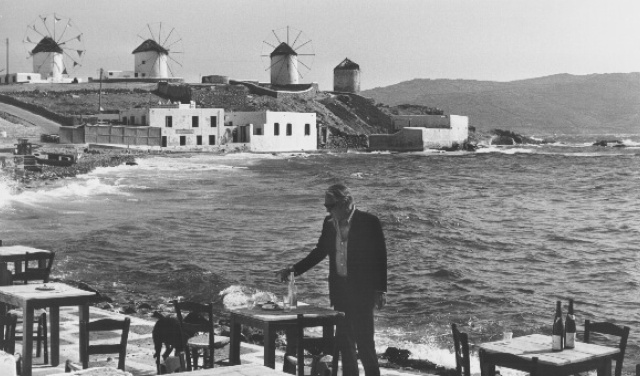
THE GREEK TYCOON (1978)
She was the most famous woman in the world. He was a peasant, a pirate, a shark. The Greek Tycoon is the story of their fiery romance. Liz Cassidy, the unhappy widow of an assassinated American president, is pursued by womanising millionaire businessman Theo Tomasis, who proves to be very persistent. Starring Jacqueline Bisset, Anthony Quinn, Edward Albert and James Franciscus.
DIRECTOR: J. LEE THOMPSON FILMING LOCATION: CORFU, ATHENS, MYKONOS

THE ISLAND OF LOVE (1963)
When their gangster- financed B- movie flops, two conmen flee to Greece to escape the mobster who's after them. Once there, they work up another scam to open a resort and one of them falls for the gangster's niece.
DIRECTOR: MORTON DA COSTA FILMING LOCATION: HYDRA, SPETSES, ATHENS

THE LITTLE GIRL DRUMMER (2018)
Brilliant young actress Charlie strikes up an acquaintance with an intriguing stranger while on holiday in Greece, but it rapidly becomes apparent that his intentions are far from romantic.
DIRECTOR: PARK CHAN- WOOK FILMING LOCATION: ATHENS, NAXOS

THE OTHER SIDE OF MIDNIGHT (1977)
A beautiful French woman falls in love with a dashing American pilot. She expects him to marry her, but instaed he abandons her. She later becomes a successful actress and manoeuvres to ahve him hired as the private pilot of her wealthy Greek lover, only to rekindle their passion.
DIRECTOR: CHARLES JARROTT

THE ROAD TO CORINTH (1967)
During the Cold War in Greece, NATO radar and missile systems experience mysterious Robert Ford and his wife, Shanny (Jean Seberg), takes over the investigation despite the opposition of the head of the secret service, Mr. Sharps (Michel Bouquet). The latter orders the intelligence agent Dex (Maurice Ronet), a friend of Robert and Shanny, to monitor Shanny's whereabouts. The film is also known as "Who's Got The Black Box?"
DIRECTOR: CLAUDE CHABROL FILMING LOCATION: ATHENS

THE STEPS (1966)
An artist returns to Santorini, where she spent her childhood, to face the ghosts of her past and her present. Starring Irini Papa, Umberto Orsini and Takis Emmanuel.
DIRECTOR: LEONARD HIRSCHIELD FILMING LOCATION: SANTORINI, ATHENS
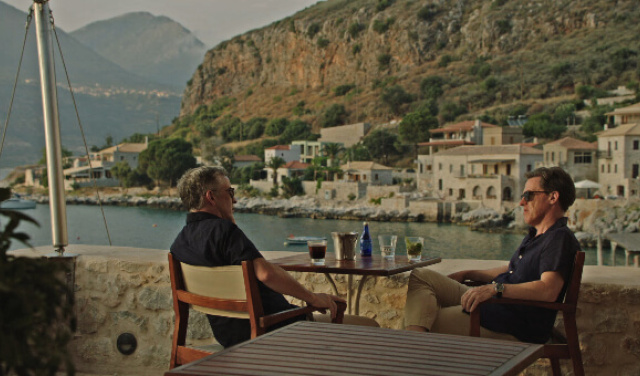
THE TRIP TO GREECE (2020)
When Odysseus left Troy it took him ten years to get back to his home in Ithaca. Steve and Rob have only six days on their own personal odyssey in THE TRIP TO GREECE. On the way they argue about tragedy and comedy, astronomy and biology, myth, history, democracy and the meaning of life!
DIRECTOR: MICHAEL WINTERBOTTOM FILMING LOCATION: LESVOS, HALKIDIKI, ATHENS, HYDRA, ITHACA

CHALTE CHALTE (2003)
This romantic Bollywood movie starring Shah Rukh Khan was extensively shot in the beautiful destination of Greece. Its famous romantic number, 'tauba tumhare yeh ishare,' was shot around Athens University, Lycabetos Hill, the Olympic Stadium and concludes on the picturesque island of Mykonos.
DIRECTOR: AZIZ MIRZA FILMING LOCATION: ATHENS, MYKONOS

TINTIN ET LE MYSTERE DE LA TOISON D'OR (1961)
The famous Belgian reporter Tintin, along with his dog Snowy (Milou) and Captain Haddock, sail to Greece in an old rust bucket called the Golden Fleece. Soon enough though, the ship's hidden secret gets them all in big trouble.
DIRECTOR: JEAN JACQUES VIERNE FILMING LOCATION: ATHENS, KALABAKA
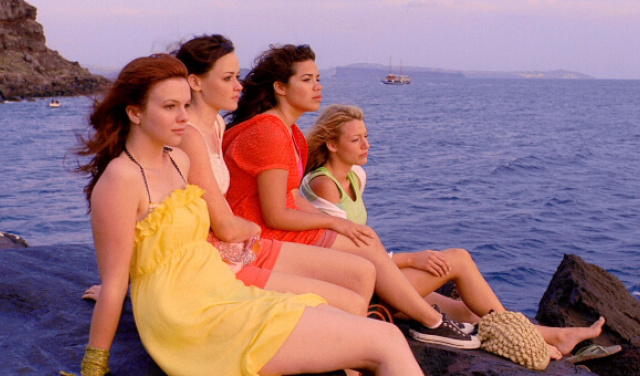
THE SISTERHOOD OF THE TRAVELLING PANTS 2 (2005)
For the first time since their friendship began, four young girls are separated for a summer. One of them, Lena, visits her grandparents in Greece and meet Kostas, with whom she falls in love...
DIRECTOR: KEN KWAPIS FILMING LOCATION: SANTORINI

27 MISSING KISSES (2000)
A young woman's passion has a remarkable effect on a Russian village in this comedy-drama with fantasy elements. Sybill (Nino Kuchanidze) is a teenager who is sent to a small town in the country to spend the summer with her aunt. Despite her tender age, Sybill is ripe and sexually aware, and while the initial object of her attention is Alexander (Eugenji Sidichin), a widower in his early 40s, she instead pairs up with Mickey (Shalva Iashvili), Alexander's teenage son.
DIRECTOR: NANA DZHORDZHAZDE FILMING LOCATION: ATHENS, KALAVRYTA

40 CARATS (1973)
A forty-year-old conservative divorcee Manhattan realtor finds herself attracted (while on holidays in Greece) to a twenty-two year old New Yorker and they spend the night together. She then turns to New York and she is stunned to learn that he is her daughter's boyfriend. He then pursue her, and is uncertain of what to do...
DIRECTOR: MILTON KATSELAS

FANTASIES (1981)
Set on Mykonos Island, the story is about a sister (Bo Derek) and brother (Peter Hooten), who return home after years abroad. Falling under the island's erotic spell, the girl and boy discover that their love goes beyond filial. The incestuous nature of the story evaporates when it is discovered that the two aren't actually related after all.
DIRECTOR: JOHN DEREK
Other destinations
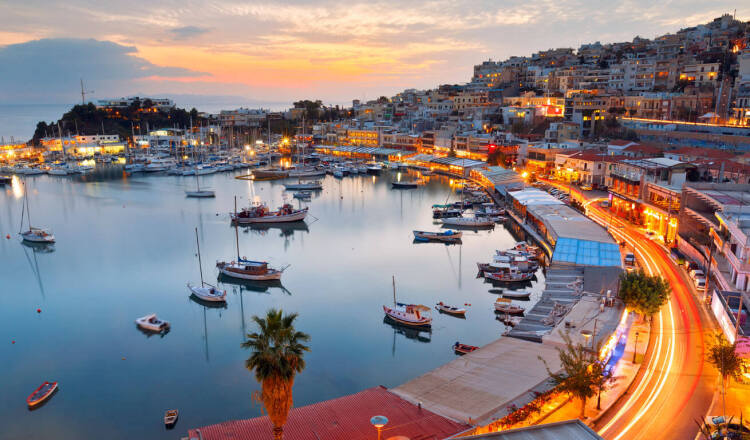
Elefsina

IMAGES
VIDEO
COMMENTS
5. Book everything in advance during peak season. In peak season, prices are high, and demand for car hire, accommodations and ferry tickets is even higher - this is not the time for ad hoc bookings on the fly. Greece is an incredibly popular summer destination, and the best options get snapped up well in advance. 6.
Did you know that in Greece you can enjoy skiing with a sea view? Did you know that Greece has around 6,000 islands, islets and rocky islets? 2,000 of them are islands and only 107 of them are inhabited! Did you know that in Greece, 47 mountains are over 2000m., 105 mountains between 2000 and 1500m., 155 mountains are between 1500m. and 1000m.
Tourism in Greece is a must! It is a beautiful country standing out for its mountainous landscapes, incredible weather, numerous beguiling islands, long sandy beaches, uncountable attractions of all kinds and many more! This is the perfect place to plan your holidays in one or many of the famous holiday destinations - Take a look at our travel guides!
We have a number of suggested itineraries for Greece but as a general rule of thumb would say you need the following minimums ; Greece - 4 days. And you will likely only see Athens and a day trip somewhere else. Greek Islands - 5 days, which will give you 2 islands. Athens and islands - 7 days. Crete - 7 days. Ideal minimum - 2 weeks.
A visit to Greece can be a dream vacation as long as you know what your dream really is and plan for it. The country's beautiful beaches and world-famous archaeological sites are just two (of many!) reasons to visit Greece.But whatever your reason, use this guide to learn more about the various regions of Greece, how to travel around the country and what to expect of Greece's food, culture ...
Greece (Greek: Ελλάς, Hellas or Ελλάδα, Ellada) is a country with a captivating history and culture that has influenced the world for thousands of years.. Ancient Greece, home to one of Europe's first urban civilizations, was the origin of Western culture.Travelers from all over the world visit Greece to view its rich cultural past and magnificent natural settings, which include ...
If Greece isn't on your bucket list, we're not sure you're paying attention: head there for ancient history, incredible cuisine, and jaw-dropping scenery. Delta Air Lines Is Now Flying Nonstop to Greece. Your Trip to Greece: The Complete Guide. The Best Time to Visit Greece.
5. Epiros. In Greece's west lies Epiros, a remote region of soaring mountain peaks, fast-flowing rivers and hidden rock canyons. Hike to the alpine heights of Mt Tymfi's Dragon Lake, which freezes over in winter, or traverse the thick forests, inclines and descents of spectacular Vikos Gorge.
Hydra, with its soft bowl of marble stairways and seafarers' houses, is one such place. Sail in and stay awhile to people-watch on the chic harborfront, walk on the rough mountain trails and swim in the sea. 11. Solve the mysteries of Knossos and Minoan culture. History loves a mystery.
Check with your travel company or airline for changes. If you test positive for COVID-19, you may need to stay where you are until you test negative. You may also need to seek treatment there. Visit TravelHealthPro (from the UK's National Travel Health Network and Centre) for general COVID-19 advice for travellers. Travel to Greece
Book your holiday with Greeka.com, your local travel operator specialized in Greece and the Greek islands since 1999. Our services are rated . Read reviews about our services. Our guide and services won the Silver Award (2020) of the annual Tourism Awards. Cancellation Guarantee! Book your next trip with peace of mind! Read more.
Greece Travel Guide. A land of myths, legends, beautiful coasts, and ancient remnants of its golden age and earlier civilizations, Greece is far more than holiday islands, ouzo, and sculptures. As one of the world's top 20 travel destinations, its mainland and islands shimmer in the summer sun and echo to the sound of traditional Greek music.
The islands are the main reason that many people pen Greece into their travel bucket lists in the first place. This 10 days in Greece itinerary takes you to some of the most beloved Greek island destinations. From the romantic sunsets of Santorini to the glamorous beaches of Mykonos, and the secluded paradise of Koufonisia. Days One and Two: Athens
Knossos. Do yourself a favor and book a full guided tour of this sprawling ancient site, which covers roughly 185 acres. Known as the seat of power of King Minos (and by association, the myth of ...
20. Hydra. 21. Víkos Gorge. 1. Acropolis, Athens. Acropolis, Athens. Considered the symbol of Athens and Greece, and indeed of Western civilization, the Acropolis is a rocky mound rising in the heart of modern Athens, crowned by three magnificent temples dating from the 5th century BC.
The largest of the Ionian Islands in size, Kefalonia is one of the most beautiful places to visit in Greece and has semi-wild horses running around Mount Ainos in its center. Zakynthos is home to ...
6. Saronic Gulf. The Saronic Gulf islands are the ones located closest to Athens. They are Aegina, Salamina, Poros, Hydra, Spetses, Agistri, and Dokos. These islands are ideally located very close to the mainland and can be reached from Athens with high speed ferries, that often take less than 1 hour of travel.
GEOGRAPHY. Greece has the longest coastline in Europe and is the southernmost country in Europe. The mainland has rugged mountains, forests, and lakes, but the country is well known for the thousands of islands dotting the blue Aegean Sea to the east, the Mediterranean Sea to the south, and the Ionian Sea to the west.
Beaches. Crete, Corfu or Kefallonia: find the perfect Greek island for you. Sep 16, 2021 • 5 min read. The Greek islands offer deserted beaches, active volcanoes and everything in between. Let us help you decide on the perfect island paradise for you. Beaches. Island-hopping in Greece: everything you need to know.
Currency - Euros (EUR) . 1€ EUR = $1.11 USD = $1.45 CAD; ATMs can be found all over and the credit cards are widely accepted; SIM card - The three main companies in Greece are COSMOTE, Vodafone, and WIND.All companies have some sort of pre-paid package available. Some are more aggressive about promoting in Athens with street stands but others you have to visit a shop for.
Santorini is an island-phenomenon whose reputation precedes it. And for good reason. On this legendary island in the Cyclades, all your senses seem magnified, a product of its many contrasts: black earth against whitewashed homes clinging to the cliff-side, or wild volcanic sculptures against sleek Cycladic lines.. Also known as Thera in Greek, Santorini is an island immortalised by poets and ...
When their gangster- financed B- movie flops, two conmen flee to Greece to escape the mobster who's after them. Once there, they work up another scam to open a resort and one of them falls for the gangster's niece. DIRECTOR: MORTON DA COSTA. FILMING LOCATION: HYDRA, SPETSES, ATHENS.
Travellers, who decide to fill out the simplified form, will receive the PLF with their unique Quick Response (QR) code via email (the QR code will be provided in a link in the email). The PLF can also be found on the Visit Greece app and at travel.gov.gr. It is strongly recommended that all visitors download the Visit Greece app (GDPR ...